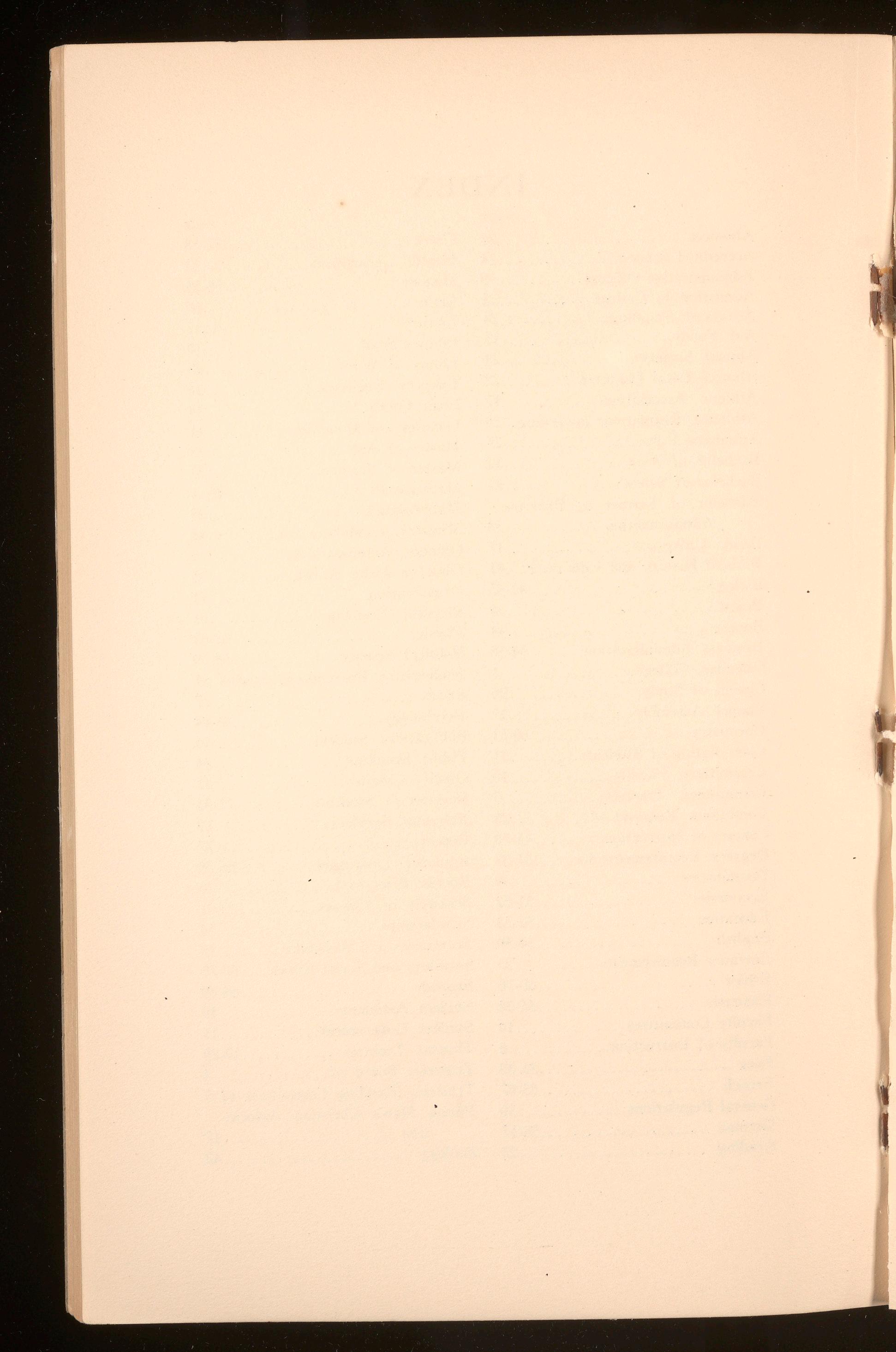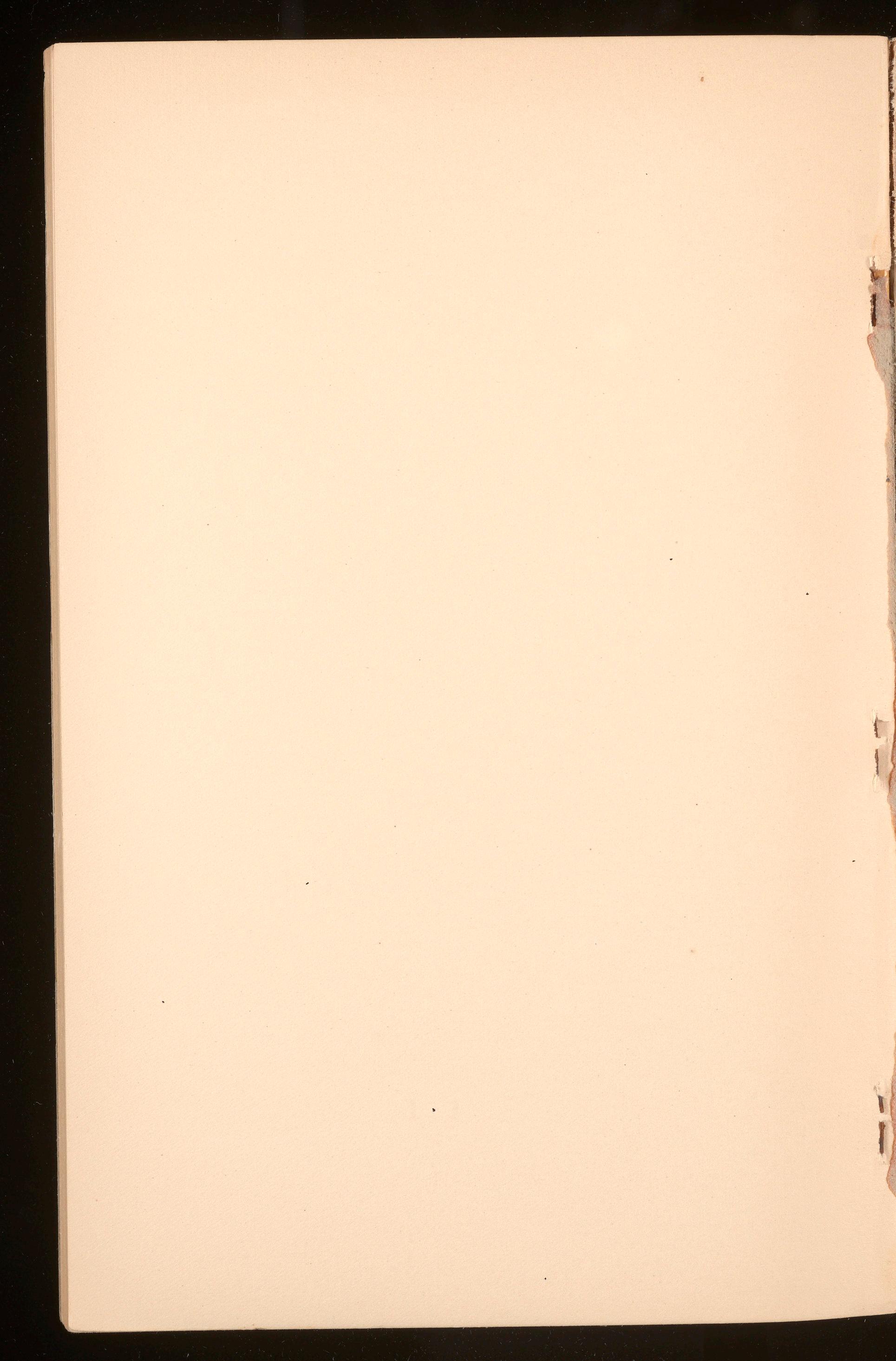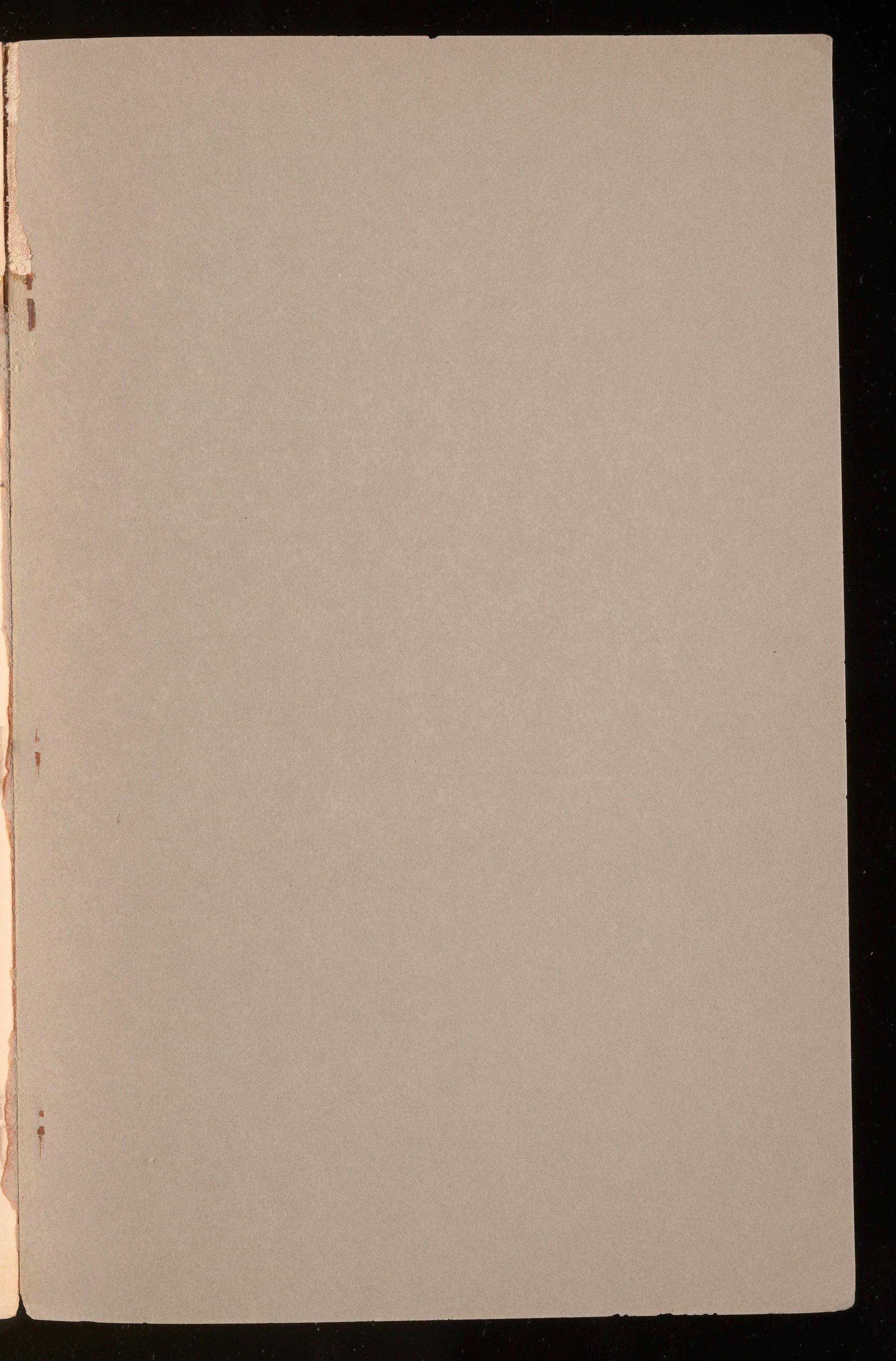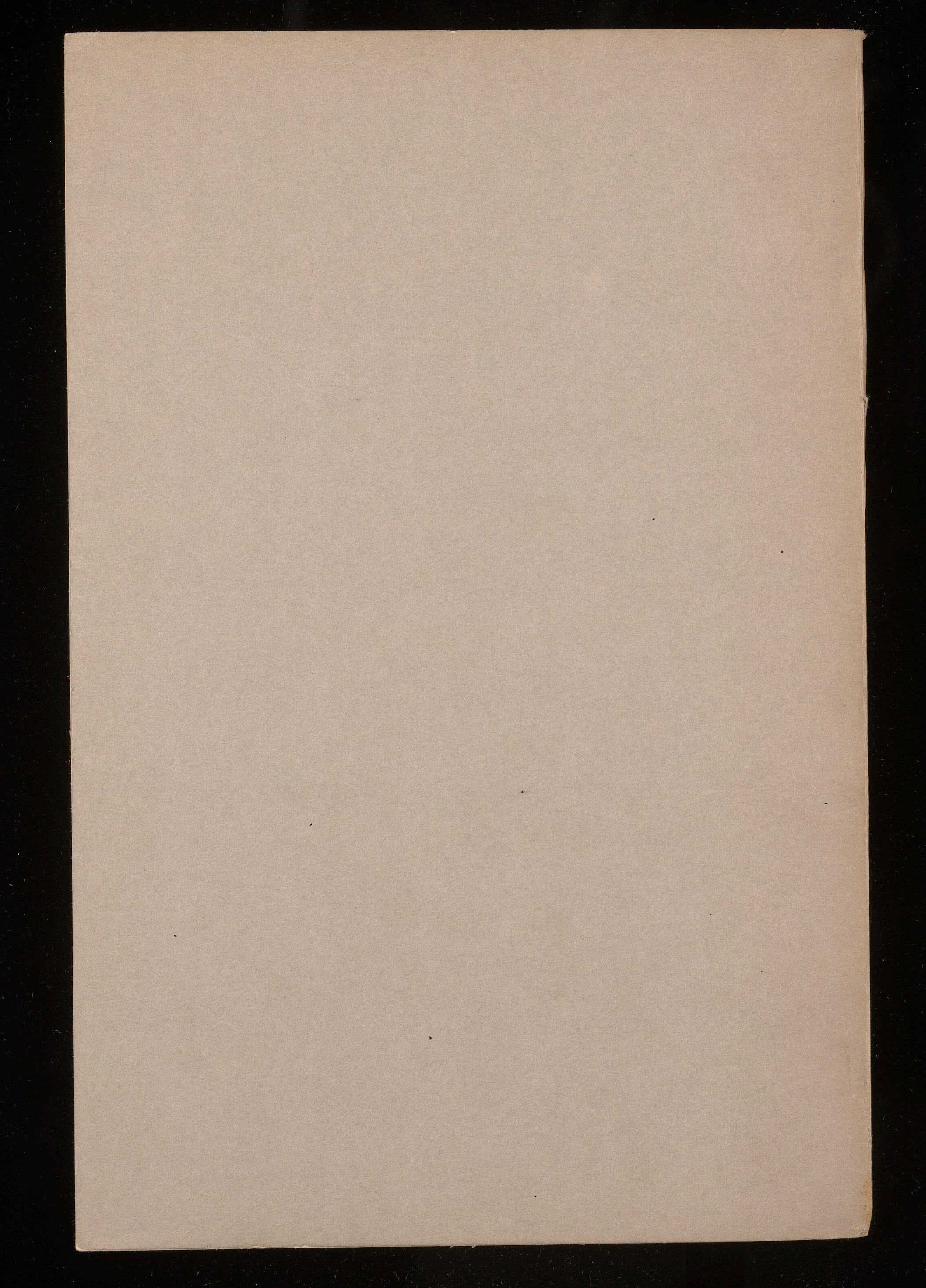Universityof Richmond Bulletin
Vol. XXIX MARCH, 1927
CATALOGUE of RICHMOND COLLEGE
No. l
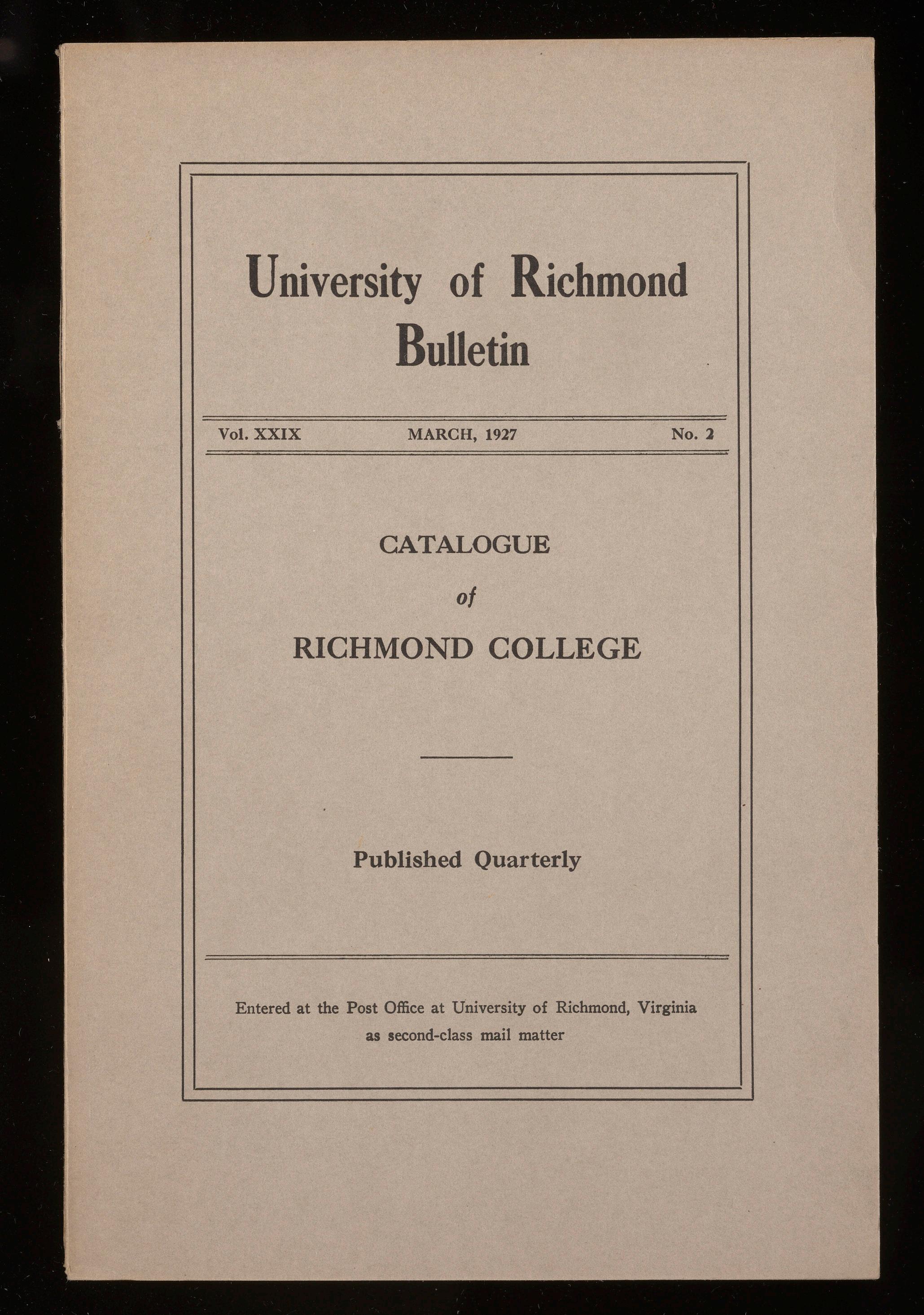
Published Quarterly
Entered at the Post Office at University of Richmond, Virginia as second-class mail matter
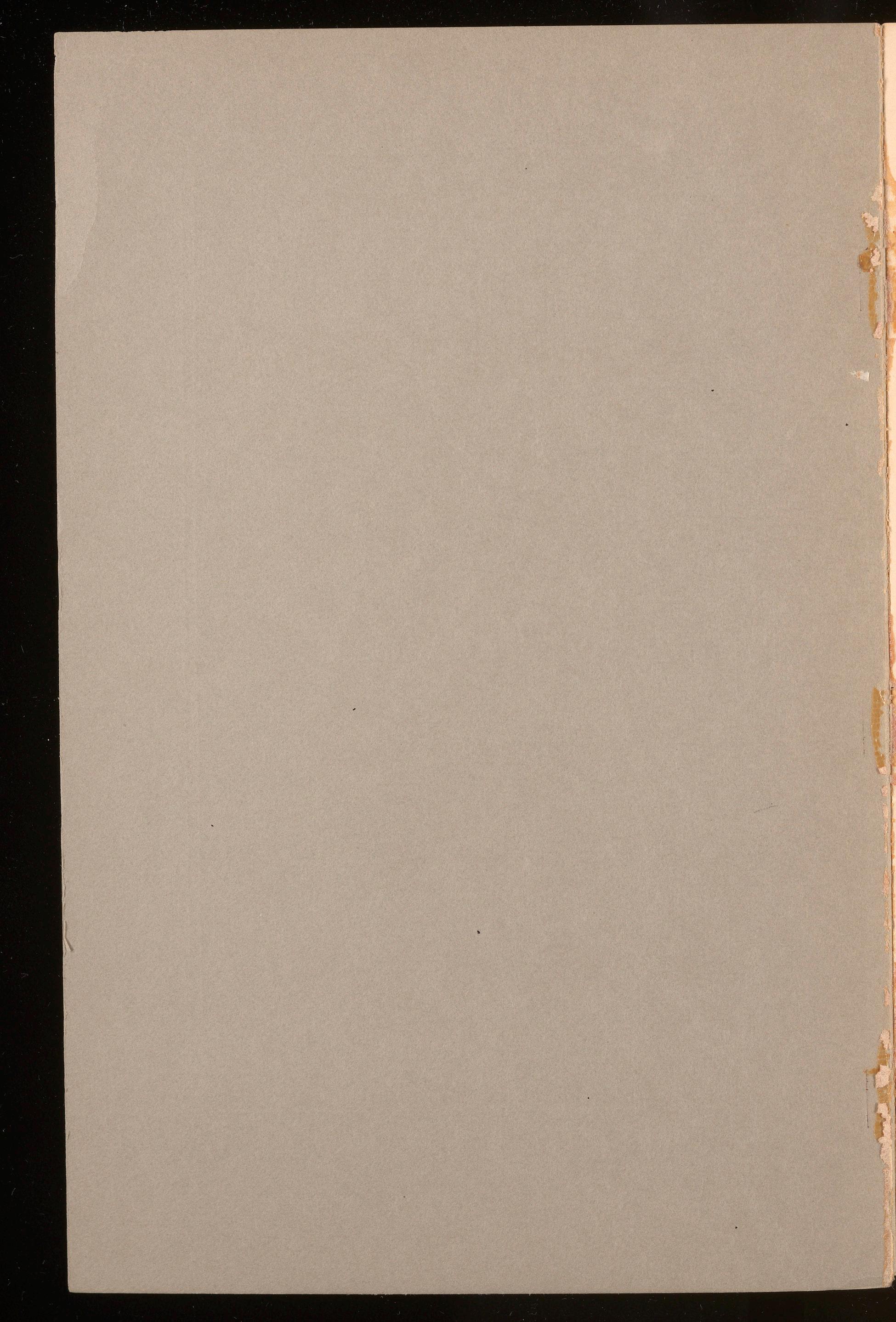

Vol. XXIX MARCH, 1927
No. l

Published Quarterly
Entered at the Post Office at University of Richmond, Virginia as second-class mail matter

UNIVERSITY of RICH1\t10ND, VA.
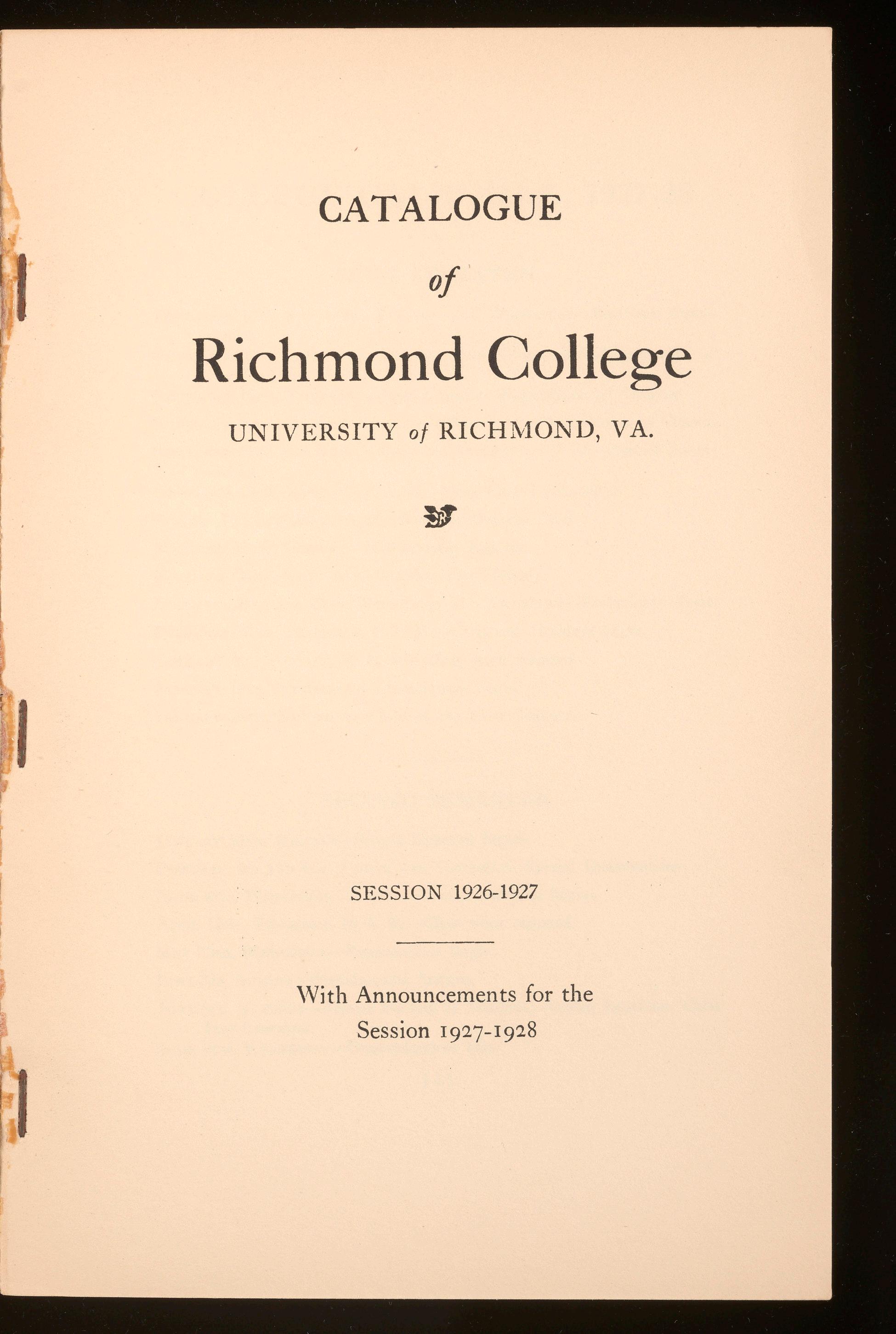
SESSION 1926-1927
\.Yith Announcements for the Session 1927-1928
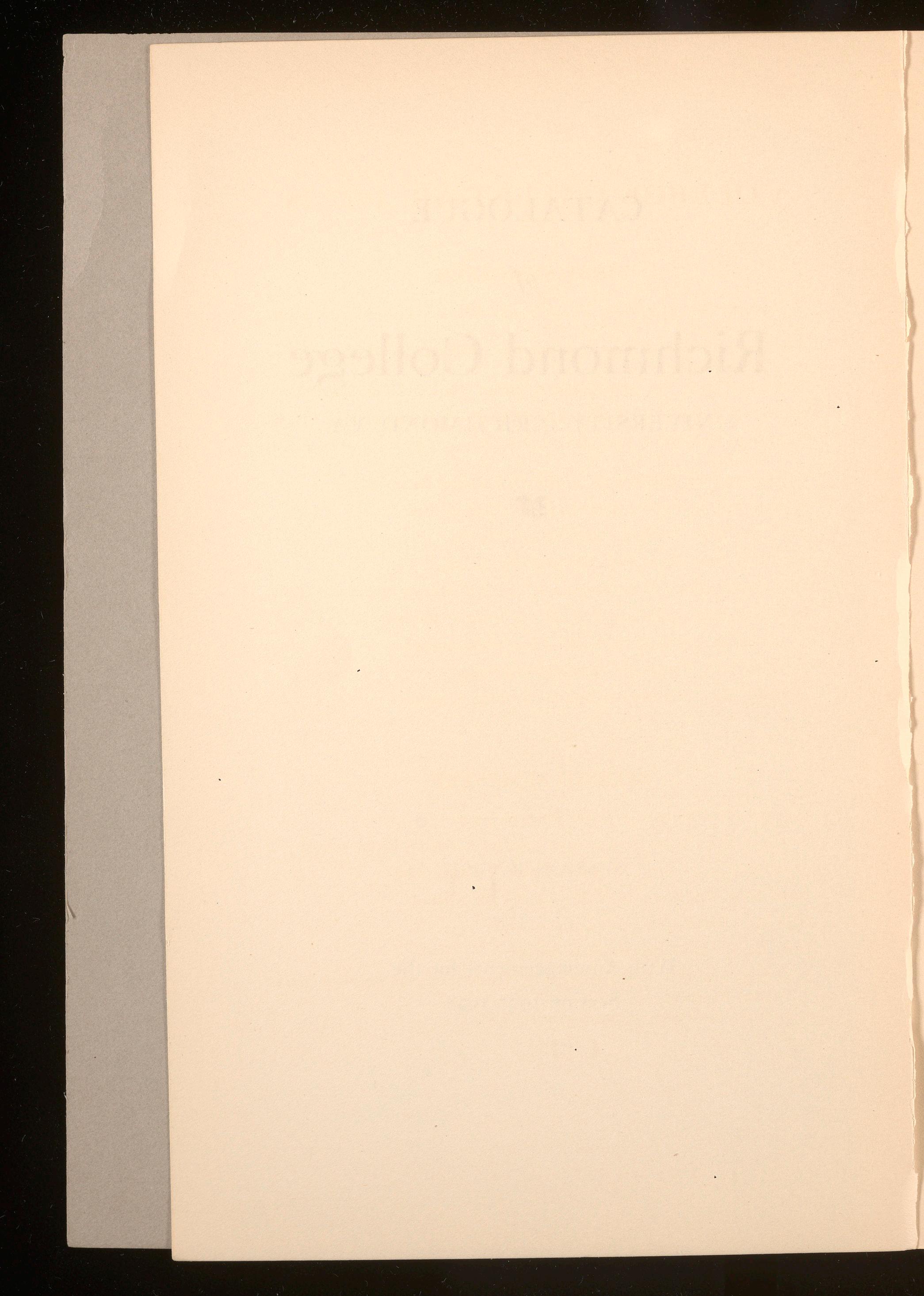
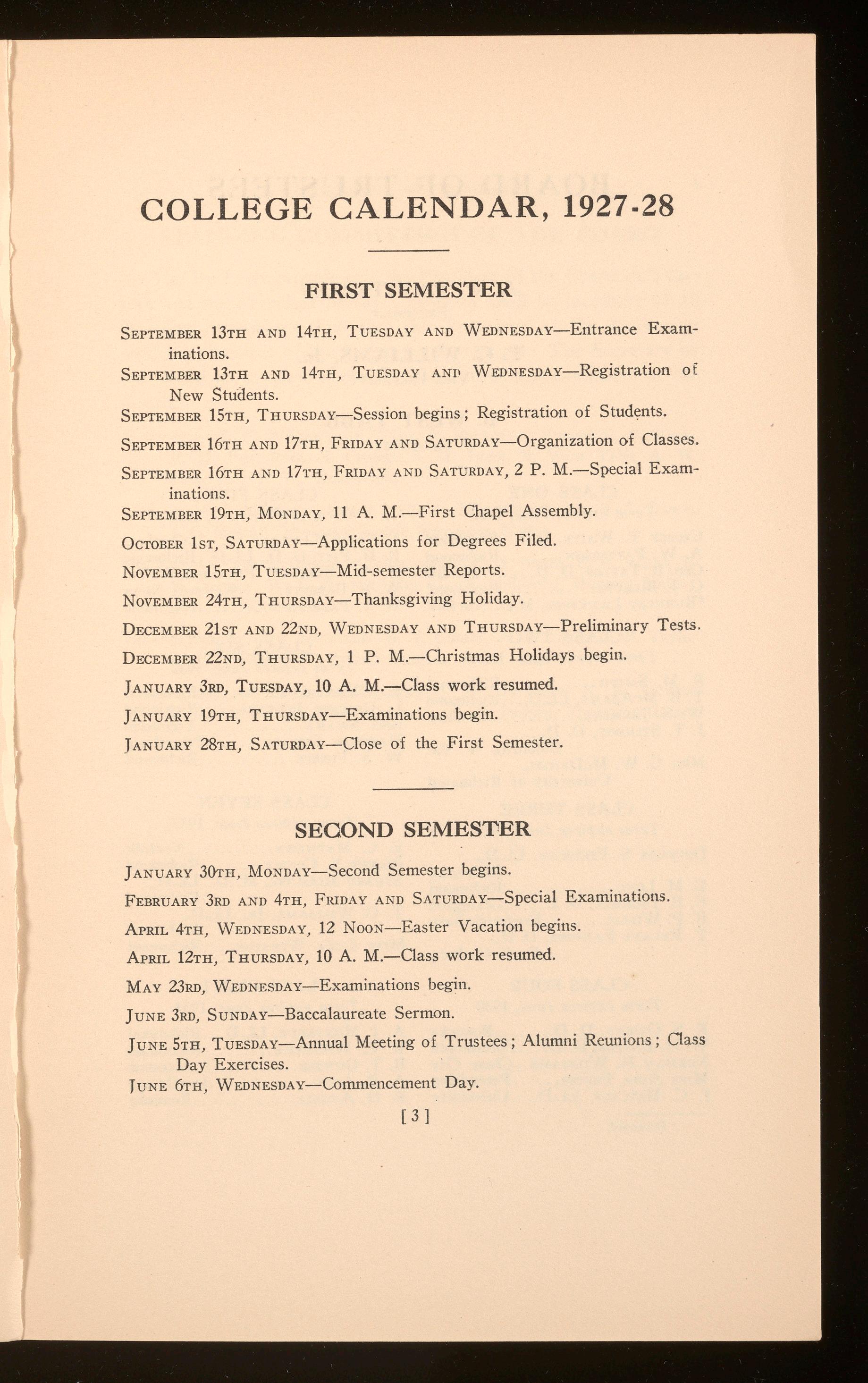
SEPTEMBER13TH AND 14TH, TUESDAY AND WEDNESDAY-Entrance Examinations.
SEPTEMBER 13TH AND 14TH, TUESDAY ANI• WEDNESDAY-Registration of New Students.
SEPTEMBER15TH, THURSDAY-Session begins; Registration of Students.
SEPTEMBER16TH AND 17TH, FRIDAYAND SATURDAY-Organization of Classes.
SEPTEMBER16TH AND 17TH, FRIDAY AND SATURDAY,2 P. M.-Special Examinations.
SEPTEMBER19TH, .MONDAY , 11 A. M.-First Chapel Assembly.
OCTOBERlsT, SATURDAY-Applications for Degrees Filed.
NOVEMBER15TH, TUESDAY-Mid-semester Reports.
NOVEMBER24TH, THURSDAY-Thanksgiving Holiday.
DECEMBER21ST AND 22ND, WEDNESDAYAND THURSDAY-Preliminary Tests.
DECEMBER22ND, THURSDAY, 1 P. M. - Christmas Holidays begin.
JANUARY 3RD, TUESDAY, 10 A. M.-Class work resumed.
JANUARY 19TH, THURSDAY-Examinations begin.
JANUARY 28TH, SATURDAY-Close of the First Semester.
JANUARY 30TH, MONDAY-Second Semester begins.
FEBRUARY3RD AND 4TH, FRIDAY AND SATURDAY - Special Examinations.
APRIL 4TH, WEDNESDAY,12 NooN-Easter Vacation begins.
APRIL 12TH, THURSDAY, 10 A. M.-Class work resumed.
MAY 23RD, WEDNESDAY-Examinations begin.
JuNE 3RD, SUNDAY-Baccalaureate Sermon.
JUNE 5TH, TUESDAY-Annual Meeting of Trustees; Alumni Reunions; Class Day Exercises.
JUNE 6TH, WEDNESDAY-Commencement Day. [ 3 l
A. W. PATTERSON PRESIDENT
T. C. WILLIAMS, JR. VICE-PRESIDENT
B. \VEST TABB SECRETARY
CLASS ONE
Term expires June, 1927
GEORGET. WAITE, D.D ... Richmond
A. W. PATTERSON........ Richmond
Gm. B. TAYLOR,D. D ....... Hollins
C. J. BILLUPS ............ Richmond
"'BURNLEYLANKFORD,M.D Norfolk
CLASS TWO
Term expires Jmie, 1928
R. M. SMITH Richmond
T. B. McADAMS, LL.D .... Richmond
W. S. JENKINS ........... Leesburg
J. T. STINSON, D. D., Bluefield, W. Va.
MRs. G. W. McDANIEL, University of Richmond
CLASS THREE
Term expires June, 1929
DOUGLASs. FREEMAN, LL.D., Richmond
E. M. LoNG .............. Richmond
E. B. JACKSON, D. D Lexington
B. P. WILLIS ........ Fredericksburg
T. RYLAND SANFORD,D. D., Fredericksburg
CLASS FOUR
Term expires June, 1930
R. S. OWENS, D. D ........ Roanoke
W. H. BAYLOR,D. D .... Portsmouth
NORMAN H. WILLIAMS .. Chase City
Miss ALTA FOSTER...... Petersburg
J. C. METCALF, LL.D .... University
* Deceased.
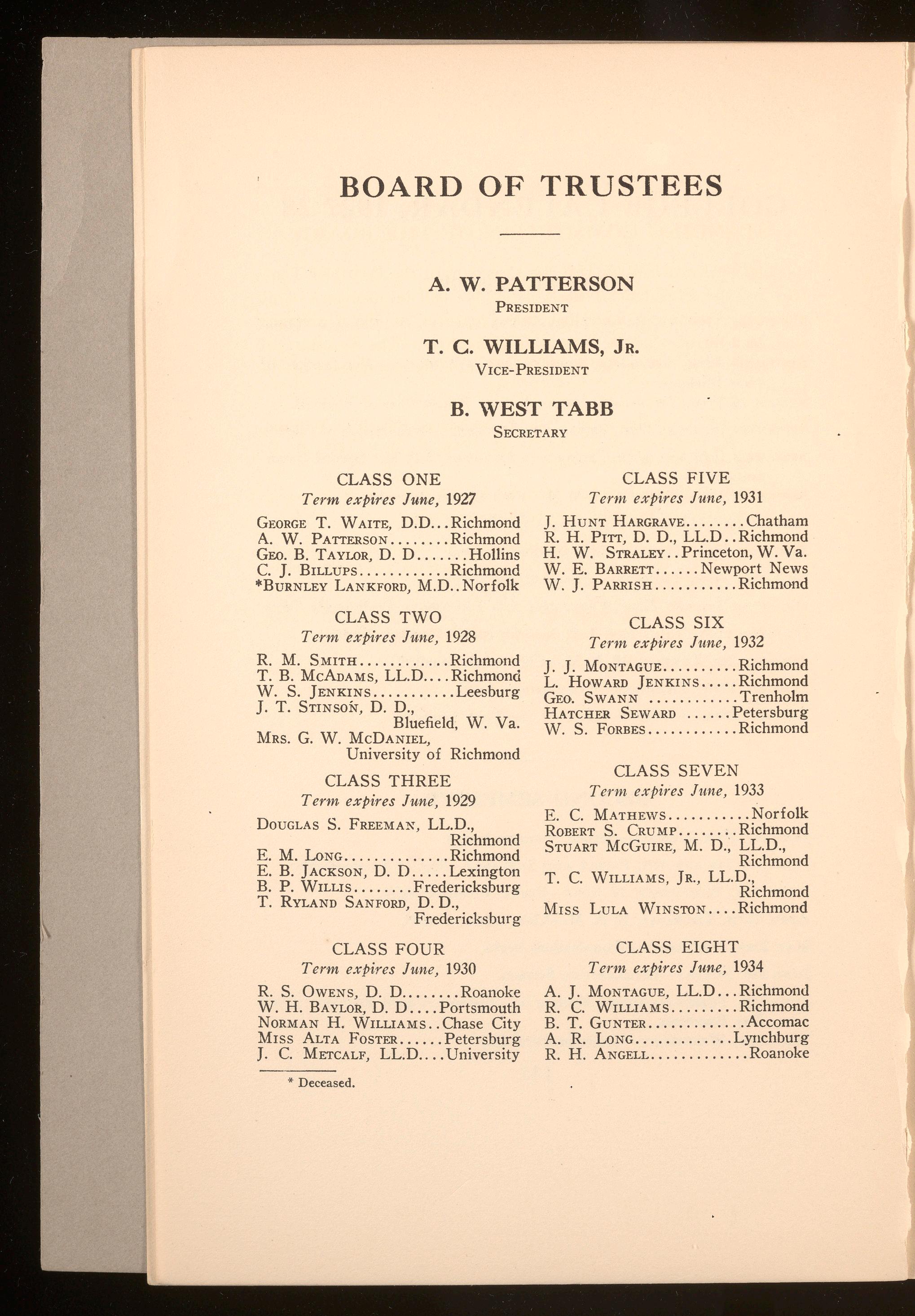
CLASS FIVE
Term expires June, 1931
J. HUNT HARGRAVE........ Chatham
R. H. PITT, D. D., LL.D .. Richmond
H. W. STRALEY.. Princeton, W. Va.
W. E. BARRETT Newport News
W. J. PARRISH ........... Richmond
CLASS SIX
Term expires June, 1932
J. J. MONTAGUE Richmond
L. How ARD JENKINS Richmond
GEO. SWANN Trenholm
HATCHER SEWARD ...... Petersburg
W. S. FORBES............ Richmond
CLASS SEVEN
Term expires lime, 1933
E. C. MATHEWS ........... Norfolk
ROBERT S. CRUMP..... . Richmond
STUART McGUIRE, M. D.; LL.D., Richmond
T. C. WILLIAMS, JR., LL.D., Richmond
Miss LULA WINSTON .... Richmond
CLASS EIGHT
Tenn expires June, 1934
A. J. MONTAGUE,LL.D ... Richmond
R. C. WILLIAMS Richmond
B. T. GUNTER............. Accomac
A. R. LONG............. Lynchburg
R. H. ANGELL............. Roanoke
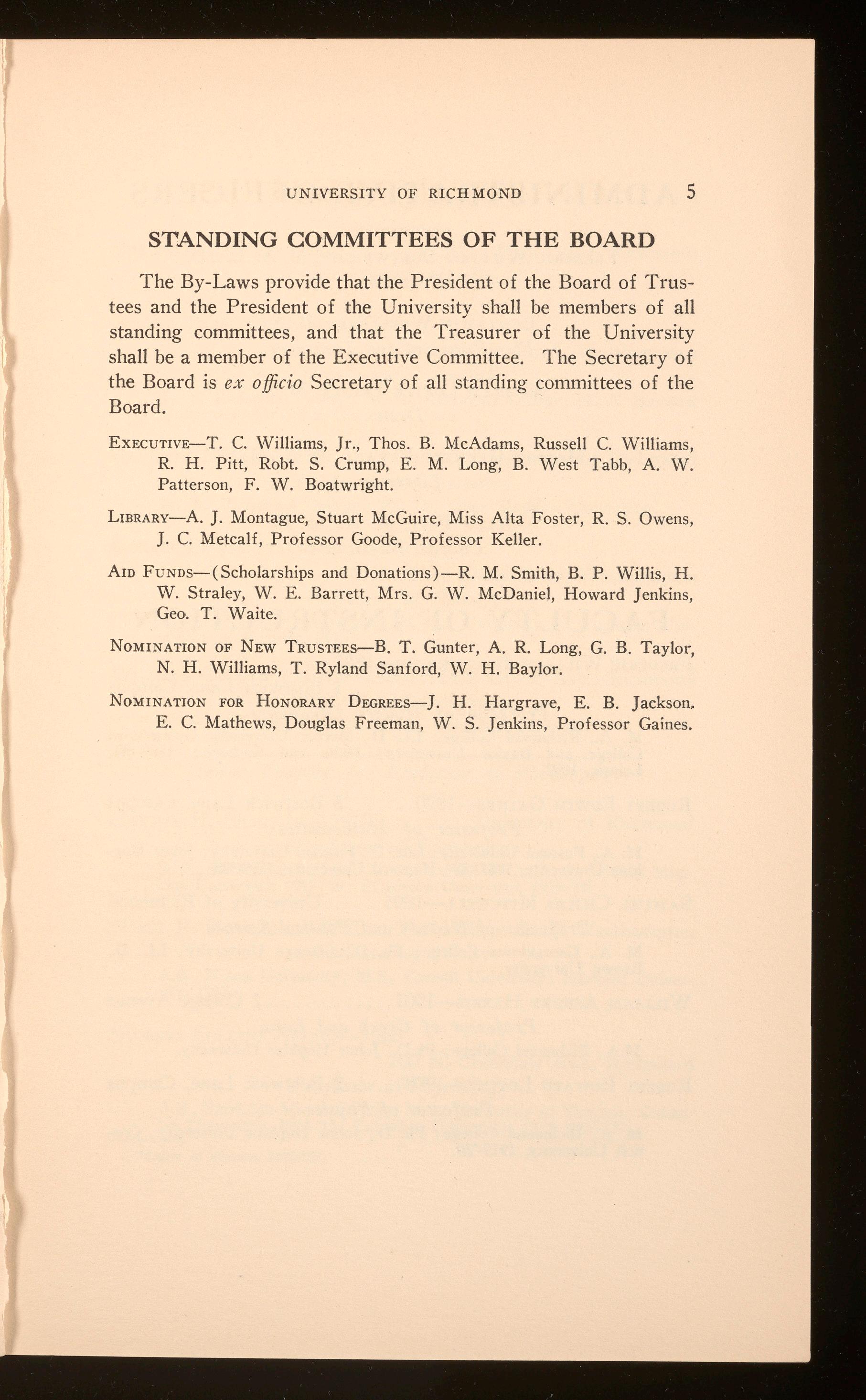
The By-Laws provide that the President of the Board of Trustees and the President of the University shall be members of all standing committees, and that the Treasurer of the University shall be a member of the Executive Committee. The Secretary of the Board is ex officio Secretary of all standing committees of the Board.
ExECUTIVE-T. C. Williams, Jr., Thos. B. McAdams, Russell C. Williams, R. H. Pitt, Robt. S. Crump, E. M. Long, B. West Tabb, A. W Patterson, F. W. Boatwright.
LIBRARY-A. J. Montague, Stuart McGuire, Miss Alta Foster, R. S. Owens , J. C. Metcalf, Professor Goode, Professor Keller.
Am FuNDs-(Scholarships and Donations)-R. M. Smith, B. P. Willis, H. W. Straley, W. E. Barrett, Mrs G. W. McDaniel, Howard Jenkins, Geo. T. Waite.
NOMINATIONOF NEW TRUSTEEs-B. T. Gunter, A. R. Long, G. B. Taylor, N. H. Williams, T. Ryland Sanford, W. H. Baylor.
NOMINATIONFOR HONORARYDEGREES-]. H. Hargrave, E. B. Jackson. E. C. Mathews, Douglas Freeman, W S. Jenkins, Professor Gaines.
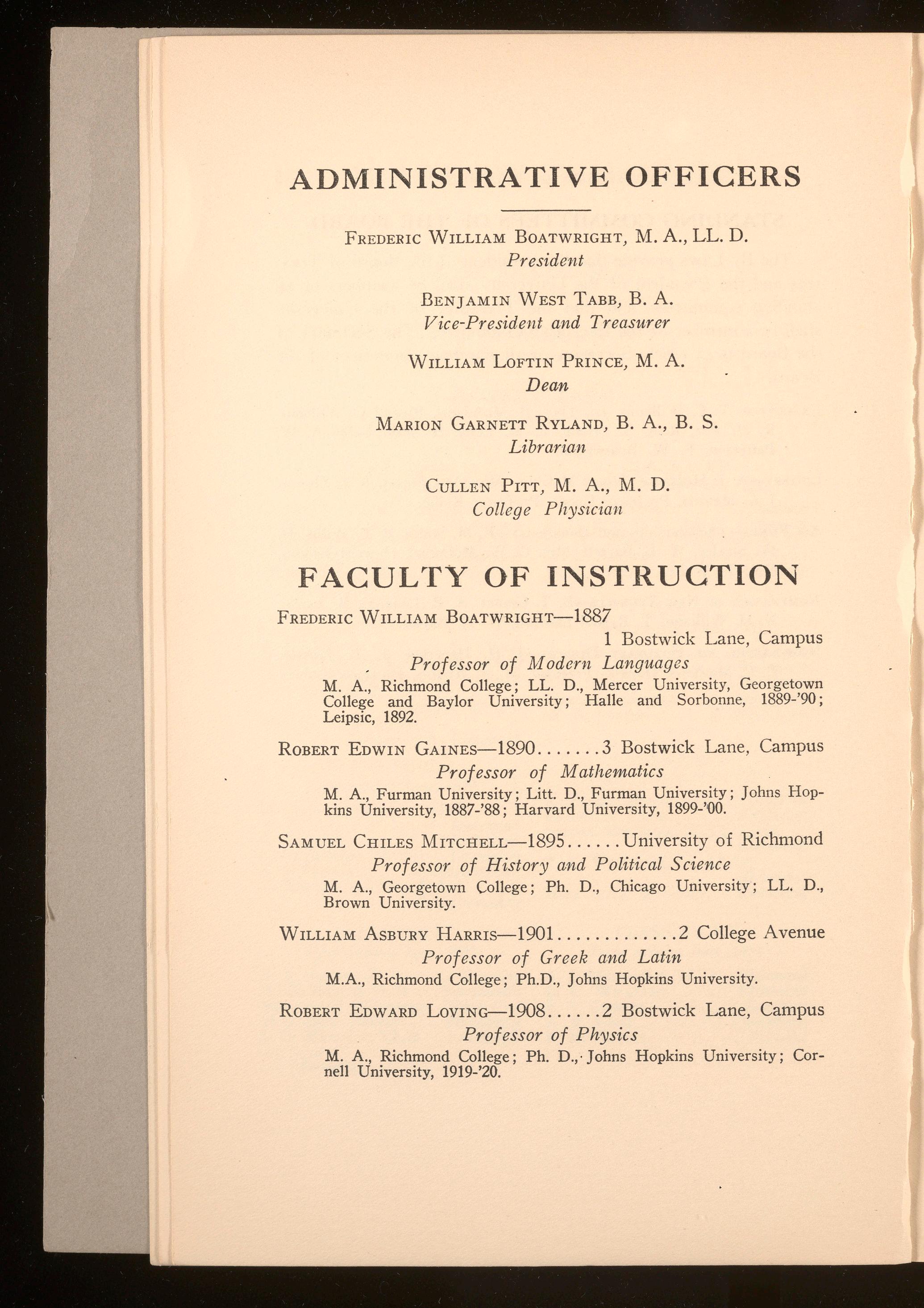
FREDERICWILLIAM BOATWRIGHT,M.A., LL. D. President
BENJAMIN WEST TABB, B. A. Vice-President and Treasurer
WILLIAM LOFTIN PRINCE, M. A. Dean
MARION GARNETT RYLAND, B. A., B. s. Librarian
CULLEN PITT, M. A., M. D. College Physician
FREDERICWILLIAM BOATWRIGHT-1887
1 Bostwick Lane, Campus
Professor of Modern Languages
M. A., Richmond College; LL. D., Mercer University, Georgetown College and Baylor University; Halle and Sorbonne, 1889-'90; Leipsic, 1892.
ROBERTEDWIN GAINEs-1890 ....... 3 Bostwick Lane, Campus Professor of Mathematics
M. A., Furman University; Litt. D., Furman University; Johns Hopkins University, 1887-'88; Harvard University, 1899-'00.
SAMUEL CHILES MITCHELL-1895 ...... University of Richmond Professor of History and Political Science
M. A., Georgetown College; Ph. D., Chicago University; LL. D., Brown University.
WILLIAM ASBURYHARRis-1901 ............. 2 College Avenue Professor of Greek and Latin M.A., Richmond College; Ph.D., Johns Hopkins University.
ROBERTEDWARDLovING-1908 ...... 2 Bostwick Lane, Campus Professor of Physics
M. A., Richmond College; Ph. D.,- Johns Hopkins University; Cornell University, 1919-'20.
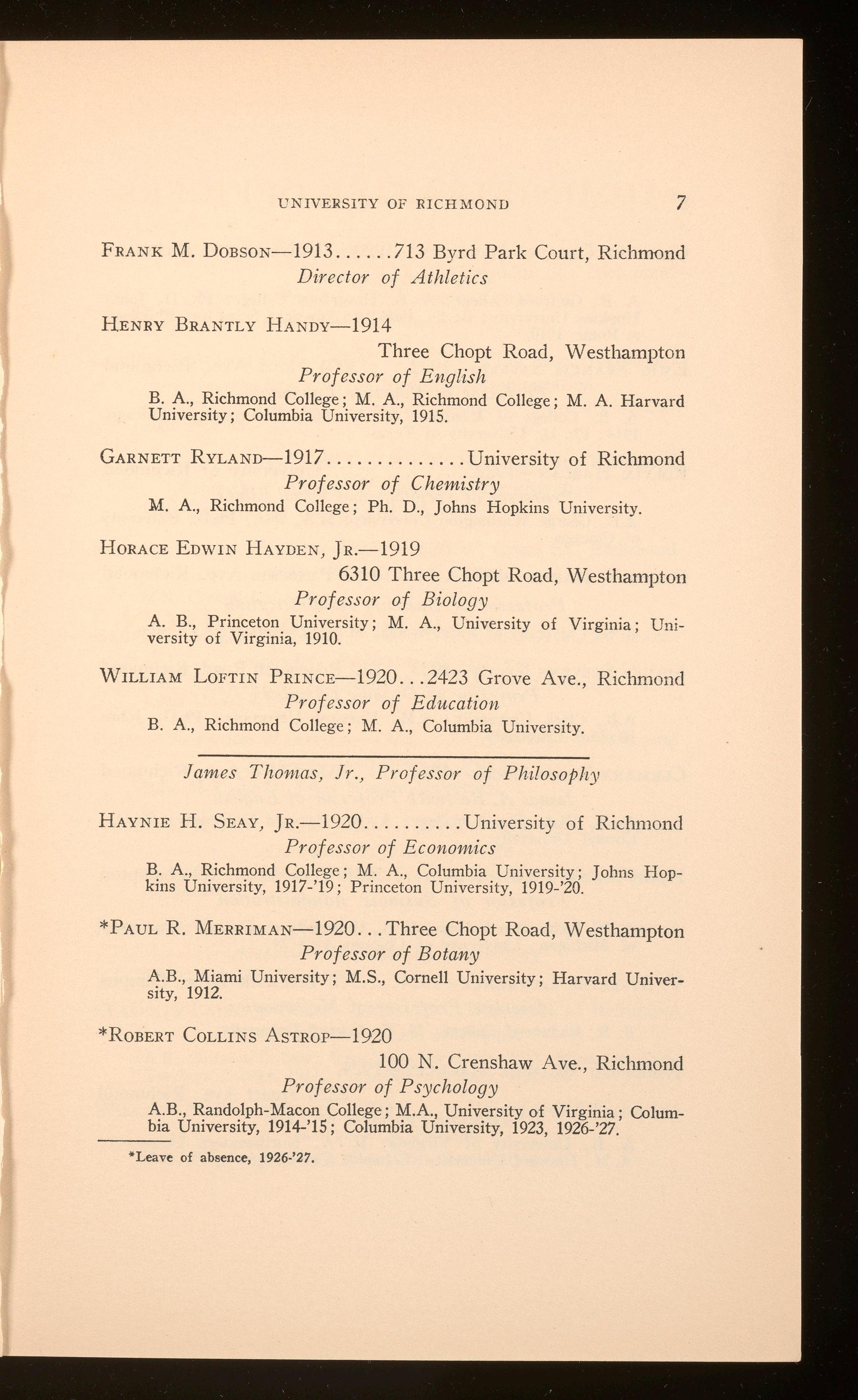
FRANK M. DoBSON-1913 ...... 713 Byrd Park Court, Richmond Director of Athletics
HENRY BRANTLY HANDY-1914
Three Chopt Road, Westhampton Professor of English
B. A., Richmond College; M. A., Richmond College; M. A. Harvard University; Columbia University, 1915.
GARNETT RYLAND-1917 .............. University of Richmond Professor of Chemistry
M. A., Richmond College; Ph. D., Johns Hopkins University.
HORACEEDWIN HAYDEN, JR.-1919
6310 Three Chopt Road, Westhampton Professor of Biology
A. B., Princeton University; M. A., University of Virginia; Uni- versity of Virginia, 1910.
WILLIAM LOFTIN PRINCE-1920 2423 Grove Ave., Richmond Professor of Education
B. A., Richmond College; M. A., Columbia University.
James Tfio,mas, Jr., Professor of Philosophy
HAYNIE H. SEAY, JR.-1920 .......... University of Richmond Professor of Economics
B. A., Richmond College; M. A., Columbia University; Johns Hop- kins University, 1917-'19; Princeton University, 1919-'20.
*PAUL R. MERRIMAN-1920 ... Three Chopt Road, Westhampton Professor of Botany
A.B., Miami University; M.S., Cornell University; Harvard Univer- sity, 1912.
*RoBERT CoLLINS AsTROP-1920
100 N. Crenshaw Ave., Richmond Professor of Psychology
A.B., Randolph-Macon College; M.A., University of Virginia; Colum- bia University, 1914-'15; Columbia University, 1923, 1926-'27.
*Leave of absence, 1926-'27.
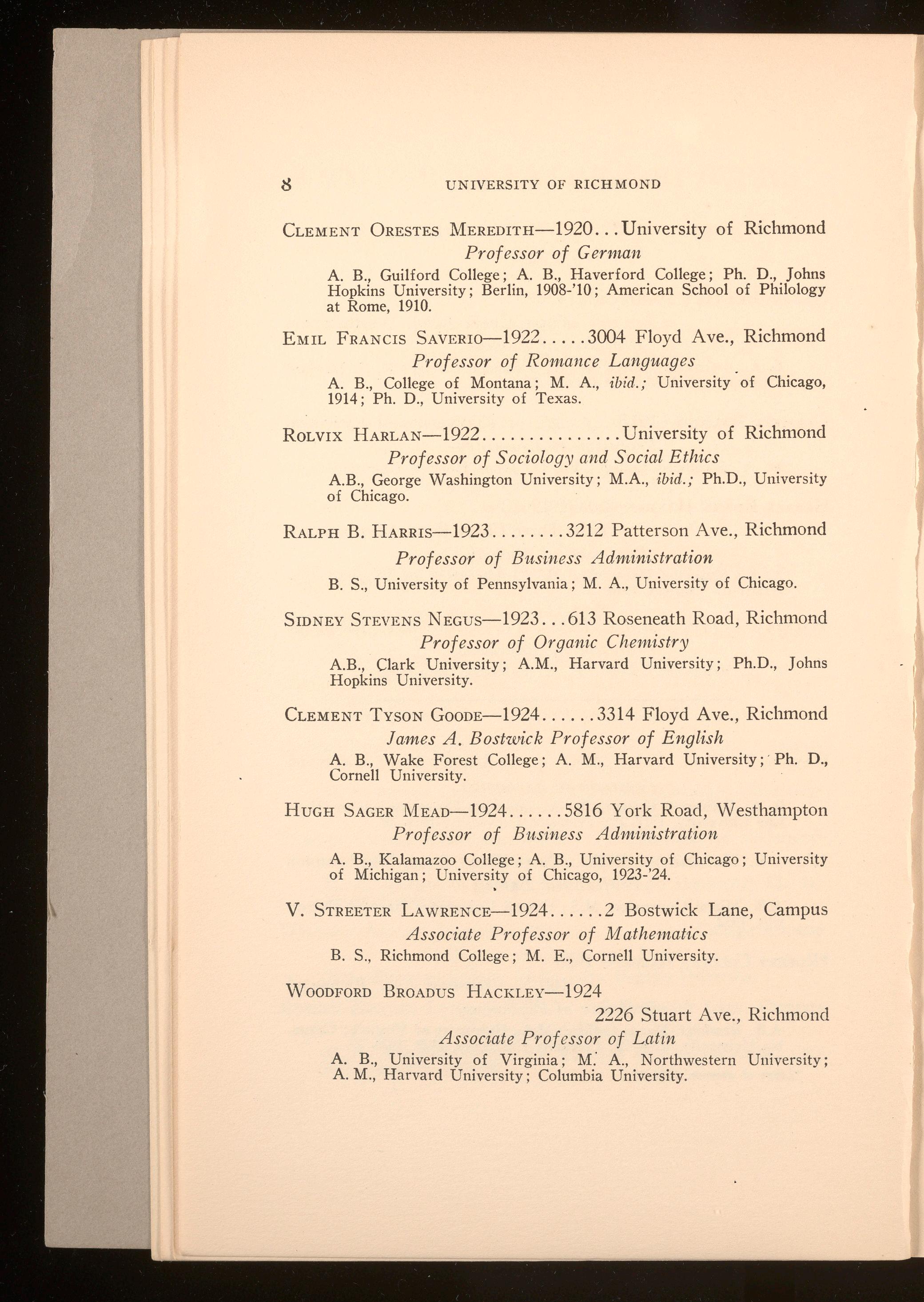
CLEMENT ORESTES MEREDITH-1920 ... University of Richmond Professor of German
A. B ., Guilford College; A. B., Haverford College; Ph. D , Johns Hopkins University; Berlin, 1908-'10; American School of Philology at Rome, 1910
E:r.nL FRANCIS SAVERio-1922 ..... 3004 Floyd Ave., Richmond Professor of Romance Languages
A B., College of Montana; M. A., ibid . ; University· of Chicago, 1914; Ph. D , University of Texas.
RoLVIX HARLAN-1922 ............... University of Richmond Professor of Sociology and Social Ethics
A.B ., George Washington University; M.A ., i bid.; Ph.D., University of Chicago.
RALPH B. HARRis-1923 . ....... 3212 Patterson Ave., Richmond Professor of Business Administration
B. S. , University of Pennsylvania; M A., University of Chicago.
SrnNEY STEVENSNEGUs-1923 ... 613 Roseneath Road, Richmond Professor of Organic Chemistry
A.B., Clark University; A.M., Harvard University; Ph D ., Johns Hopkins University.
CLEMENTTYSON GoooE-1924 ...... 3314 Floyd Ave., Richmond
James A. Bostwick Professor of English
A. B., Wake Forest College; A . M., Harvard University; · Ph. D., Cornell University .
HuGH SAGERMEAn-1924 ...... 5816 York Road, Westhampton Professor of Busin ess Administration
A. B., Kalamazoo College; A B., University of Chicago; University of Michigan; University of Chicago, 1923-'24.
V. STREETERLAWRENCE-1924 ...... 2 Bostwick Lane, Campus Associate Professor of Mathematics
B. S., Richmond College ; M. E., Cornell University
vVoonFoRn BRoAnus HAcKLEY-1924 2226 Stuart Ave., Richmond
Associate Prof essor of Latin
A. B., University of Virginia; M.' A. , Northwestern University; A. M., Harvard University; Columbia University .
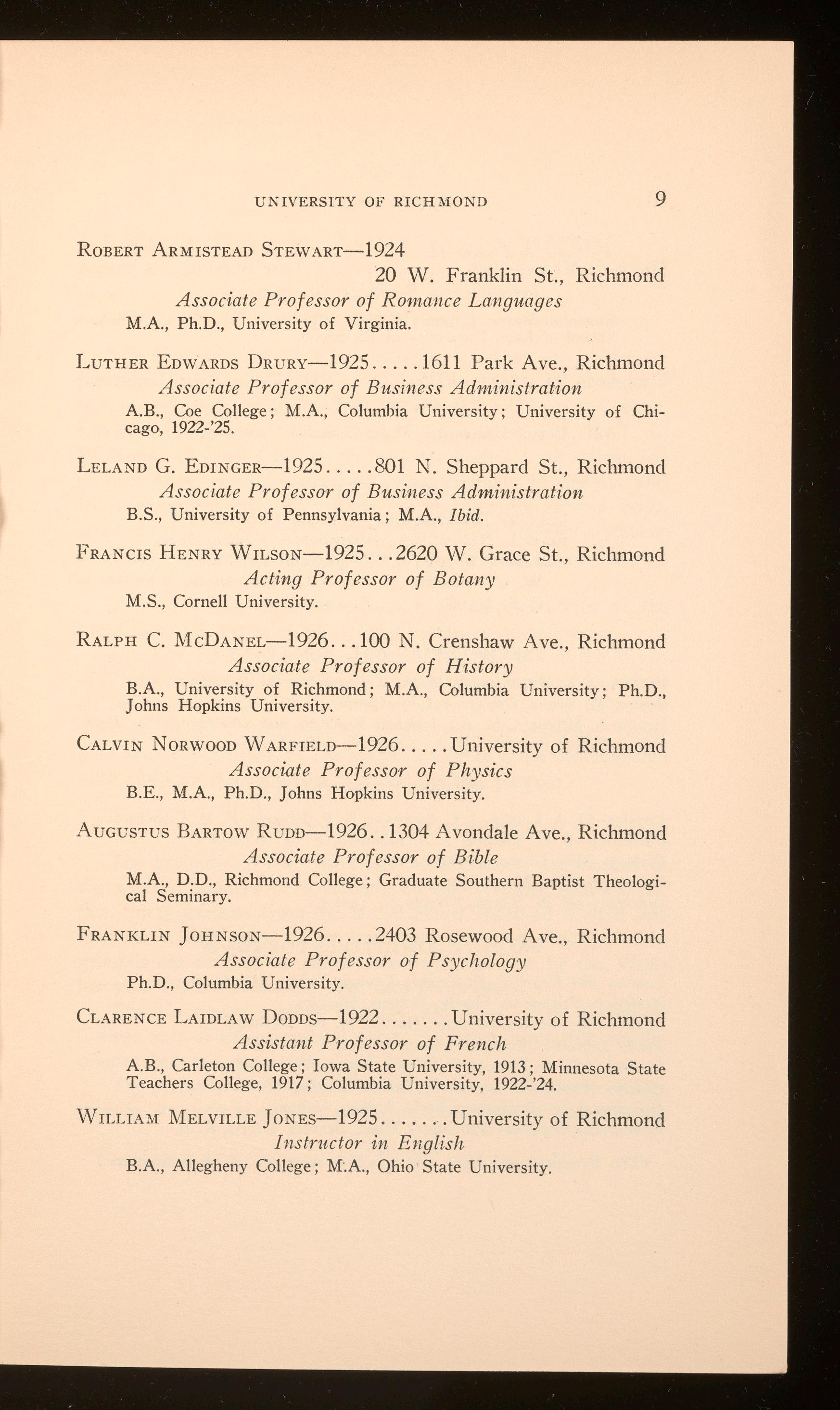
ROBERTARMISTEADSTEWART-1924
20 W. Franklin St., Richmond
Associate Professor of Romance Languages
M.A., Ph.D., University of Virginia.
LUTHER EDWARDSDRURY-1925 ..... 1611 Park Ave., Richmond Associate Professor of Business Administration
A.B., Coe College; M.A., Columbia University; University of Chicago, 1922-'25.
LELAND G. EDINGER-1925 ..... 801 N. Sheppard St., Richmond Associate Professor of Business Administration
B.S., University of Pennsylvania; M.A., lb-id.
FRANCIS HENRY WILSON-1925 ... 2620 vV. Grace St., Richmond Acting Professor of Botany
M.S., Cornell University.
RALPH C. McDANEL-1926 ... 100 N. Crenshaw Ave., Richmond Associate Professor of History
B.A., University of Richmond; M.A., Columbia University; Ph.D., Johns Hopkins University.
CALVIN NORWOODWARFIELD-1926 ..... University of Richmond Assodate Professor of Physics
B.E., M.A., Ph.D., Johns Hopkins University.
AUGUSTUSBARTOWRuDD-1926 .. 1304 Avondale Ave., Richmond Associate Professor of Bible
M.A., D.D., Richmond College; Graduate Southern Baptist Theological Seminary.
FRANKLIN JoHNSON-1926 ..... 2403 Rosewood Ave., Richmond Associate Professor of Psychology
Ph.D., Columbia University.
CLARENCELAIDLAWDoDDs-1922 ....... University of Richmond Assistant Professor of French
A.B., Carleton College; Iowa State University, 1913; Minnesota State Teachers College, 1917; Columbia University, 1922-'24.
vVILLIAM MELVILLEJoNEs-1925 ....... University of Richmond Instructor in English
B.A., Allegheny College; M.A., Ohio State University.
UNIVERSITY OF RICHMOND
DAVID J. MAYs-1926 ................ Law Building, Richmond
Instructor in Business Administration
Randolph-Macon College 1914-'16, 1919-'20; LL.B., T. C. Williams School of Law, University of Richmond.
THEODORE M. HART-1926
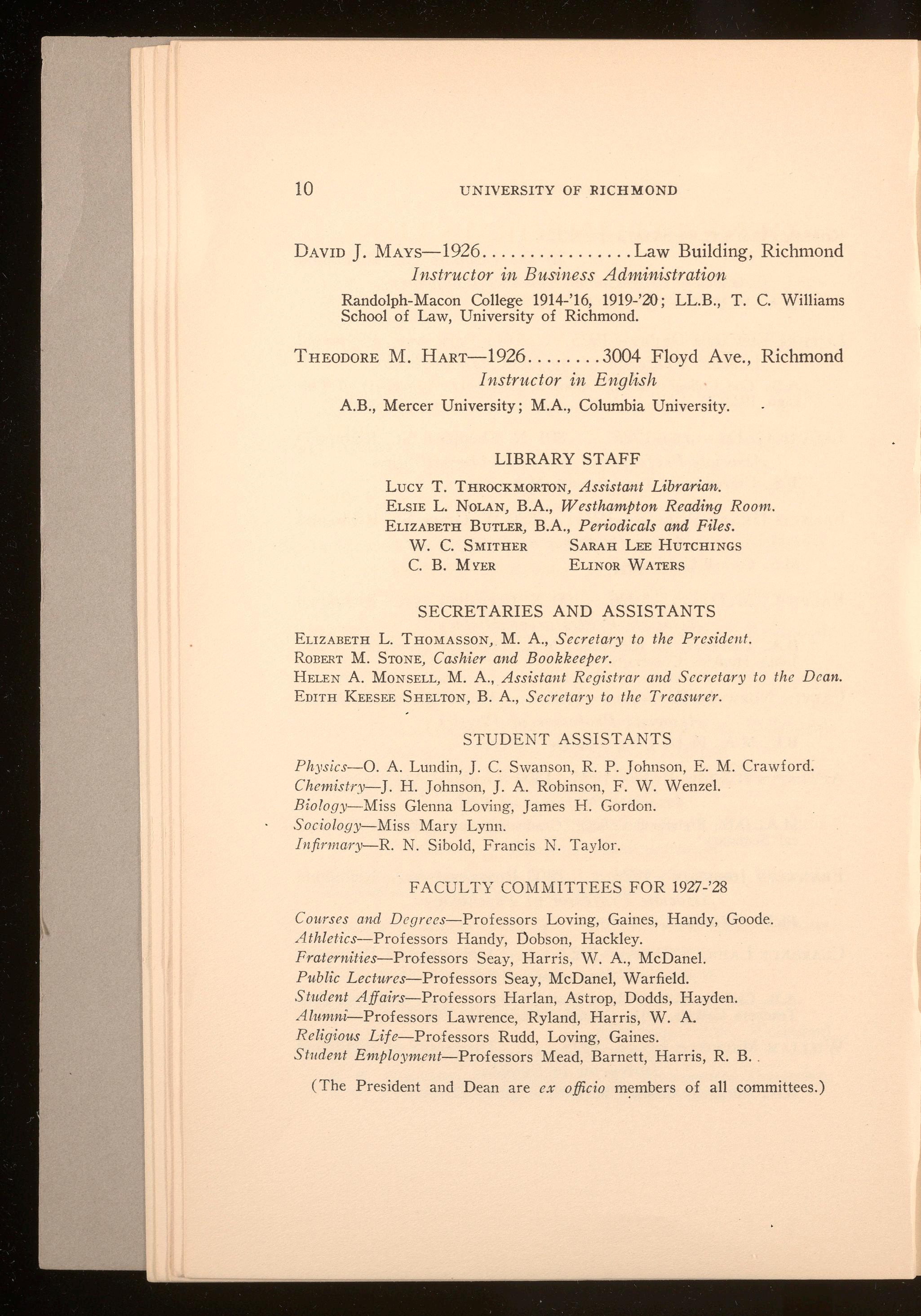
3004 Floyd Ave., Richmond
Instructor in English
A.B., Mercer University; M.A., Columbia University.
Lucy T. THROCKMORTON, Assistant Librarian.
ELSIE L. NOLAN, B.A., Westhampton Reading Room.
ELIZABETH BUTLER, B.A., Periodicals and Files. w. C. SMITHER SARAH LEE HUTCHINGS
C. B. MYER ELINOR WATERS
SECRETARIES AND ASSISTANTS
ELIZABETH L THOMASSON, M. A., Secretary to the President. RonERT M. STONE, Cashier and Bookkeeper.
HELEN A. MoNSELL, M. A., Assistant Registrar and Secretary to the Dean.
EDITH KEESEE SHELTON, B. A., Secretary to the Treasitrer.
Ph) ,sics-O . A. Lundin, J. C. Swanson, R. P. Johnson, E. M. Crawford. Chemistry-]. H. Johnson, J . A. Robins0n, F. W. Wenzel. Biology-Miss Glenna Loving, James H. Gordon. Sociology-Miss Mary Lynn. lnfir111ary-R. N. Sibold, Francis N Taylor.
FACULTY COMMITTEES FOR 1927-'28
Cow·ses and D egrees-Professors Loving, Gaines, Handy, Goode. Athletics-Professors Handy, Dobson, Hackley. Fraternities-Professors Seay, Harris, Vv. A., McDanel. Public Lectures-Professors Seay, McDanel, Warfield. Stndent Affairs-Professors Harlan, Astrop, Dodds, Hayden. Alu.-mni-Professors Lawrence, Ryland, Harris, W. A.
Religious Life-Professors Rudd, Loving, Gaines. St11dent Employment-Professors Mead, Barnett, Harris, R. B . .
(The President and Dean are ex officio members of all committees.)
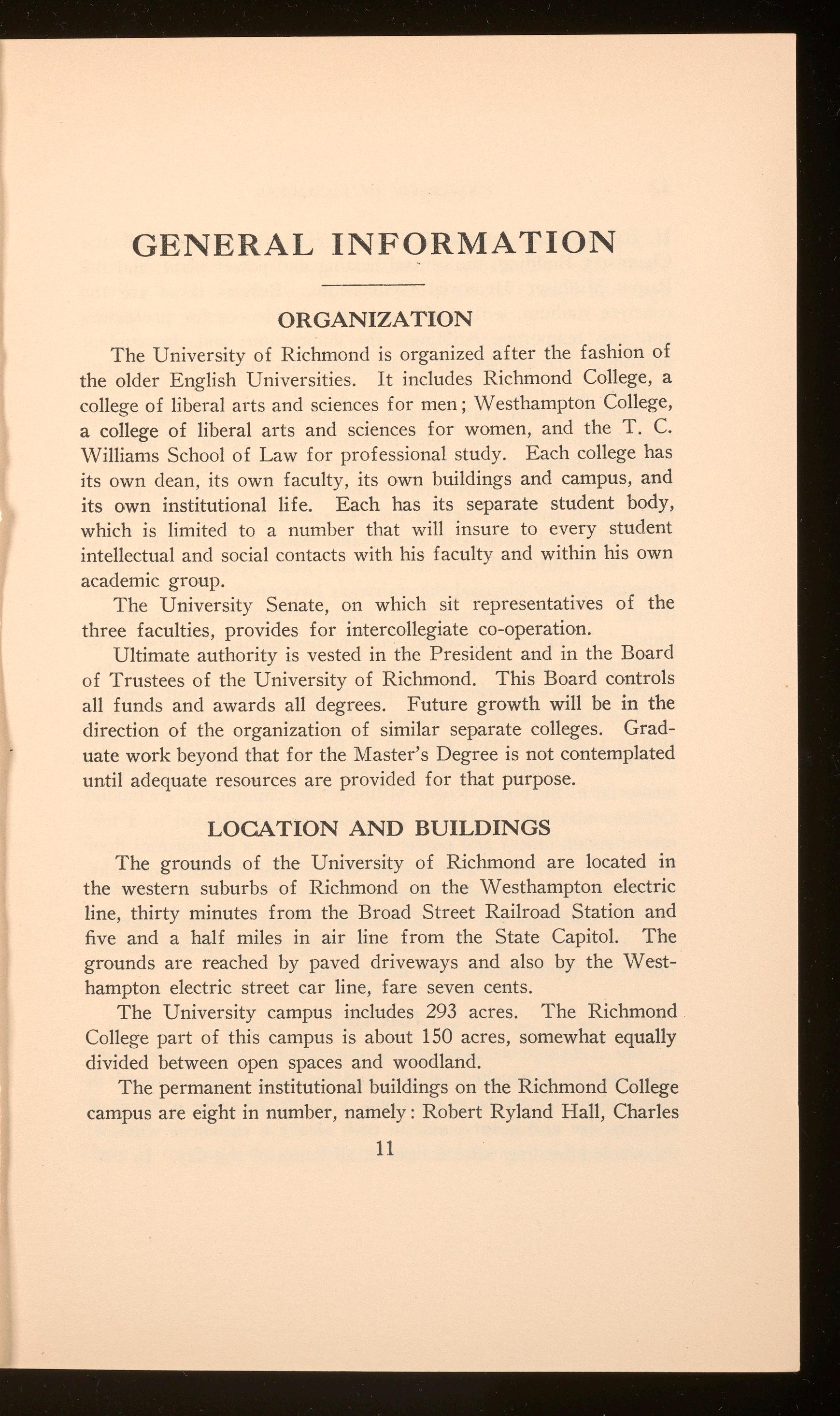
The University of Richmond is organized after the fashion of the older English Universities. It includes Richmond College, a college of liberal arts and sciences for men; Westhampton College, a college of liberal arts and sciences for women , and the T. C. Williams School of Law for professional study. Each college has its own dean, its own faculty, its own buildings and campus, and its own institutional life. Each has its separate student body, which is limited to a number that will insure to every student intellectual and social contacts with his faculty and within his own academic group.
The University Senate, on which sit representatives of the three faculties, provides for intercollegiate co-operation.
Ultimate authority is vested in the President and in the Board of Trustees of the University of Richmond. This Board controls all funds and awards all degrees. Future growth will be in the direction of the organization of similar separate colleges. Graduate work beyond that for the Master's Degree is not contemplated until adequate resources are provided for that purpose.
The grounds of the University of Richmond are located in the western suburbs of Richmond on the Westhampton electric line, thirty minutes from the Broad Street Railroad Station and five and a half miles in air line from the State Capitol. The grounds are reached by paved driveways and also by the Westhampton electric street car line, fare seven cents.
The University campus includes 293 acres. The Richmond College part of this campus is about 150 acres, somewhat equally divided between open spaces and woodland.
The permanent institutional buildings on the Richmond College campus are eight in number, namely: Robert Ryland Hall, Charles
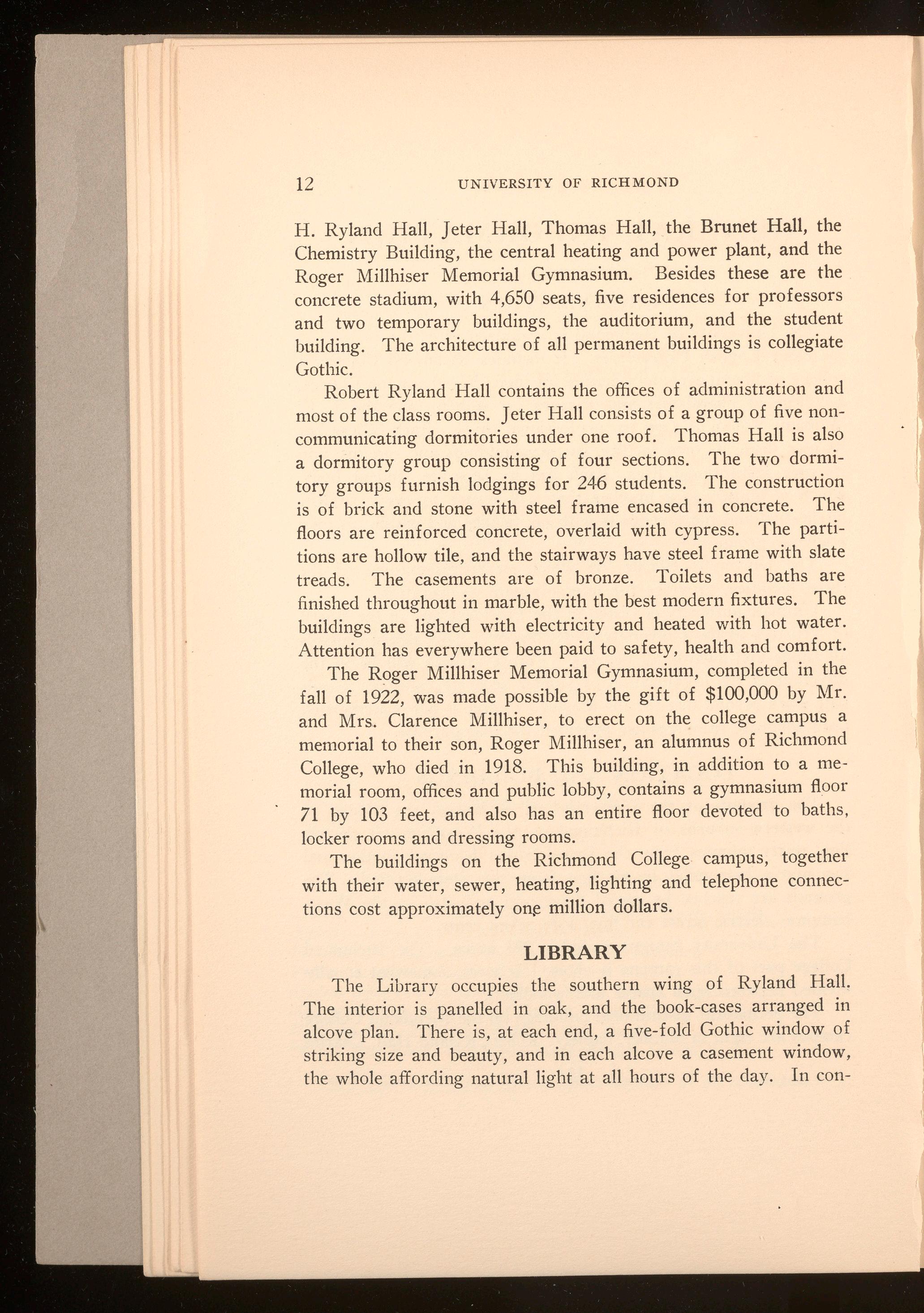
H. Ryland Hall, Jeter Hall, Thomas Hall, the Brunet Hall, the Chemistry Building, the central heating and power plant, and the Roger Millhiser Memorial Gymnasium. Besides these are the concrete stadium, with 4,650 seats, five residences for professors and two temporary buildings, the auditorium, and the student building. The architecture of all permanent buildings is collegiate Gothic.
Robert Ryland Hall contains the offices of administration and most of the class rooms. Jeter Hall consists of a group of five noncommunicating dormitories under one roof. Thomas Hall is also a dormitory group consisting of four sections. The two dormitory groups furnish lodgings for 246 students. The construction is of brick and stone with steel frame encased in concrete. The floors are reinforced concrete, overlaid with cypress. The partitions are hollow tile, and the stairways have steel frame with slate treads. The casements are of bronze. Toilets and baths are finished throughout in marble, with the best modern fixtures. The buildings are lighted with electricity and heated with hot water. Attention has everywhere been paid to safety, health and comfort.
The Roger Millhiser Memorial Gymnasium, completed in the fall of 1922, was made possible by the gift of $100,000 by Mr. and Mrs. Clarence Millhiser, to erect on the college campus a memorial to their son, Roger Millhiser, an alumnus of Richmond College, who died in 1918. This building, in addition to a memorial room, offices and public lobby, contains a gymnasium floor 71 by 103 feet, and also has an entire floor devoted to baths, locker rooms and dressing rooms.
The buildings on the Richmond College campus, together with their water, sewer, heating, lighting and telephone connections cost approximately ont million dollars.
The Library occupies the southern wing of Ryland Hall. The interior is panelled in oak, and the book-cases arranged in alcove plan. There is, at each end, a five-fold Gothic window of striking size and beauty, and in each alcove a casement window, the whole affording natural light at all hours of the clay. In con-
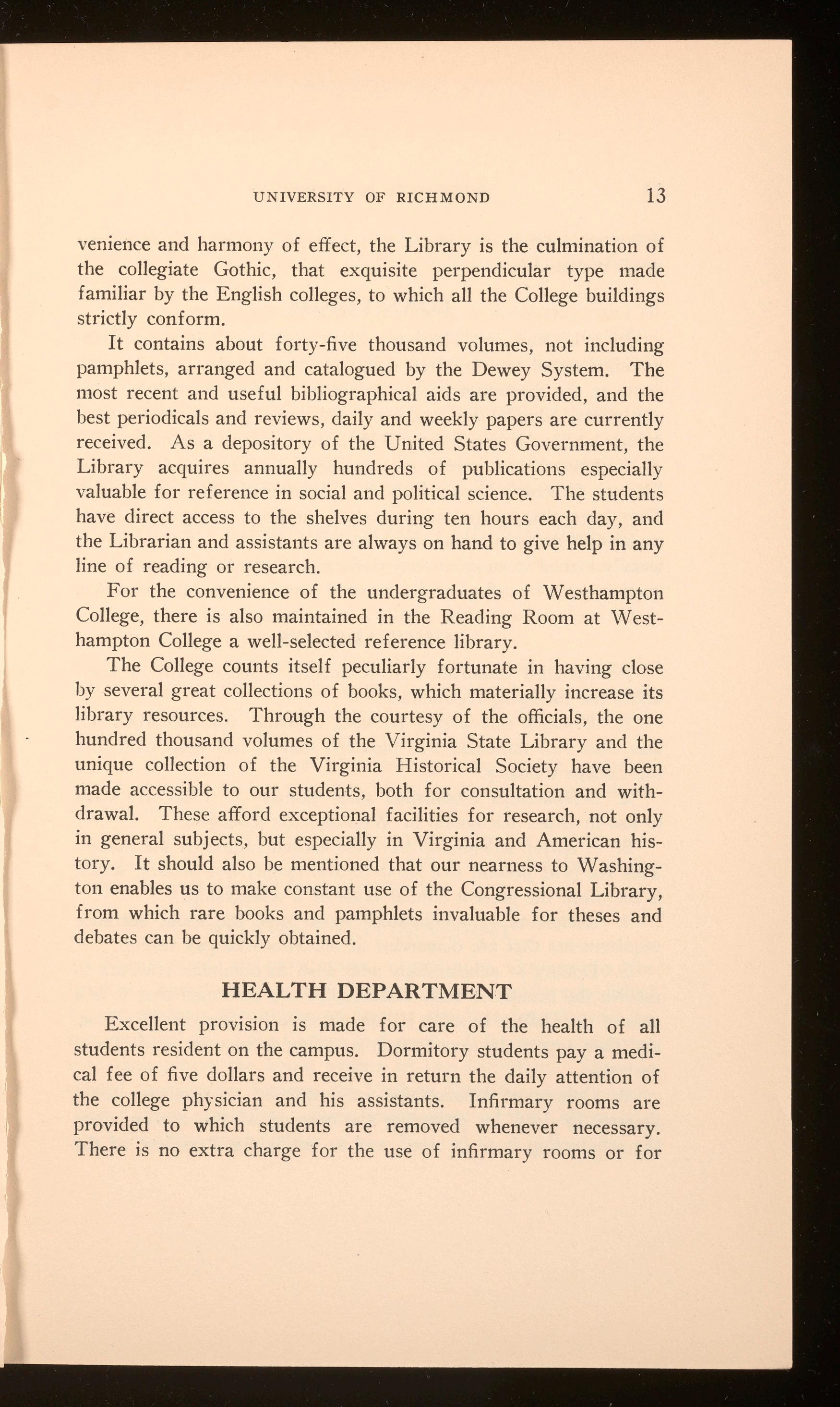
venience and harmony of effect, the Library is the culmination of the collegiate Gothic, that exquisite perpendicular type made familiar by the English colleges, to which all the College buildings strictly conform.
It contains about forty-five thousand volumes, not including pamphlets, arranged and catalogued by the Dewey System. The most recent and useful bibliographical aids are provided, and the best periodicals and reviews, daily and weekly papers are currently received. As a depository of the United States Government, the Library acquires annually hundreds of publications especially valuable for reference in social and political science. The students have direct access to the shelves during ten hours each day, and the Librarian and assistants are always on hand to give help in any line of reading or research.
For the convenience of the undergraduates of Westhampton College, there is also maintained in the Reading Room at Westhampton College a well-selected reference library.
The College counts itself peculiarly fortunate in having close by several great collections of books, which materially increase its library resources. Through the courtesy of the officials, the one hundred thousand volumes of the Virginia State Library and the unique collection of the Virginia Historical Society have been made accessible to our students, both for consultation and withdrawal. These afford exceptional facilities for research, not only in general subjects, but especially in Virginia and American history. It should also be mentioned that our nearness to Washington enables us to make constant use of the Congressional Library, from which rare books and pamphlets invaluable for theses and debates can be quickly obtained.
Excellent provision is made for care of the health of all students resident on the campus. Dormitory students pay a medical fee of five dollars and receive in return the daily attention of the college physician and his assistants. Infirmary rooms are provided to which students are removed whenever necessary. There is no extra charge for the use of infirmary rooms or for
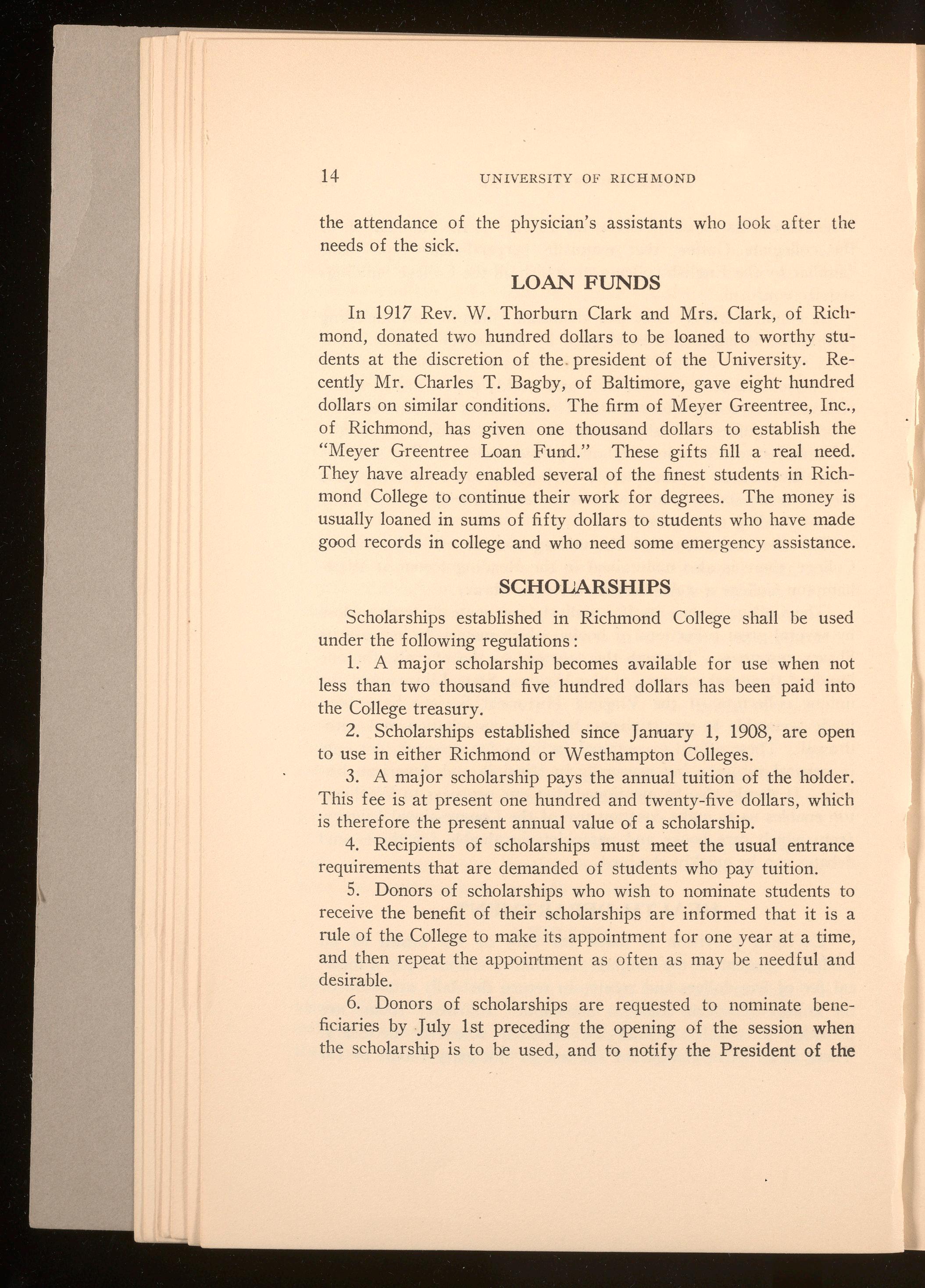
the attendance of the physician's assistants who look after the needs of the sick.
In 1917 Rev. W. Thorburn Clark and Mrs. Clark, of Richmond, donated two hundred dollars to be loaned to worthy students at the discretion of the president of the University. Recently Mr. Charles T. Bagby, of Baltimore, gave eight- hundred dollars on similar conditions. The firm of Meyer Greentree, Inc., of Richmond, has given one thousand dollars to establish the "Meyer Greentree Loan Fun:d." These gifts fill a real need. They have already enabled several of the finest students in Richmond College to continue their work for degrees. The money is usually loaned in sums of fifty dollars to students who have made good records in college and who need some emergency assistance.
Scholarships established in Richmond College shall be used under the following regulations :
1. A major scholarship becomes available for use when not less than two thousand five hundred dollars has been paid into the College treasury.
2. Scholarships established since January 1, 1908, are open to use in either Richmond or Westhampton Colleges.
3. A major scholarship pays the annual tuition of the holder. This fee is at present one hundred and twenty-five dollars, which is therefore the present annual value of a scholarship.
4. Recipients of scholarships must meet the usual entrance requirements that are demanded of students who pay tuition.
5. Donors of scholarships who wish to nominate students to receive the benefit of their scholarships are informed that it is a rule of the College to make its appointment for one year at a time, and then repeat the appointment as often as may be needful and desirable.
6. Donors of scholarships are requested to nominate beneficiaries by July 1st preceding the opening of the session when the scholarship is to be used, and to notify the President of the
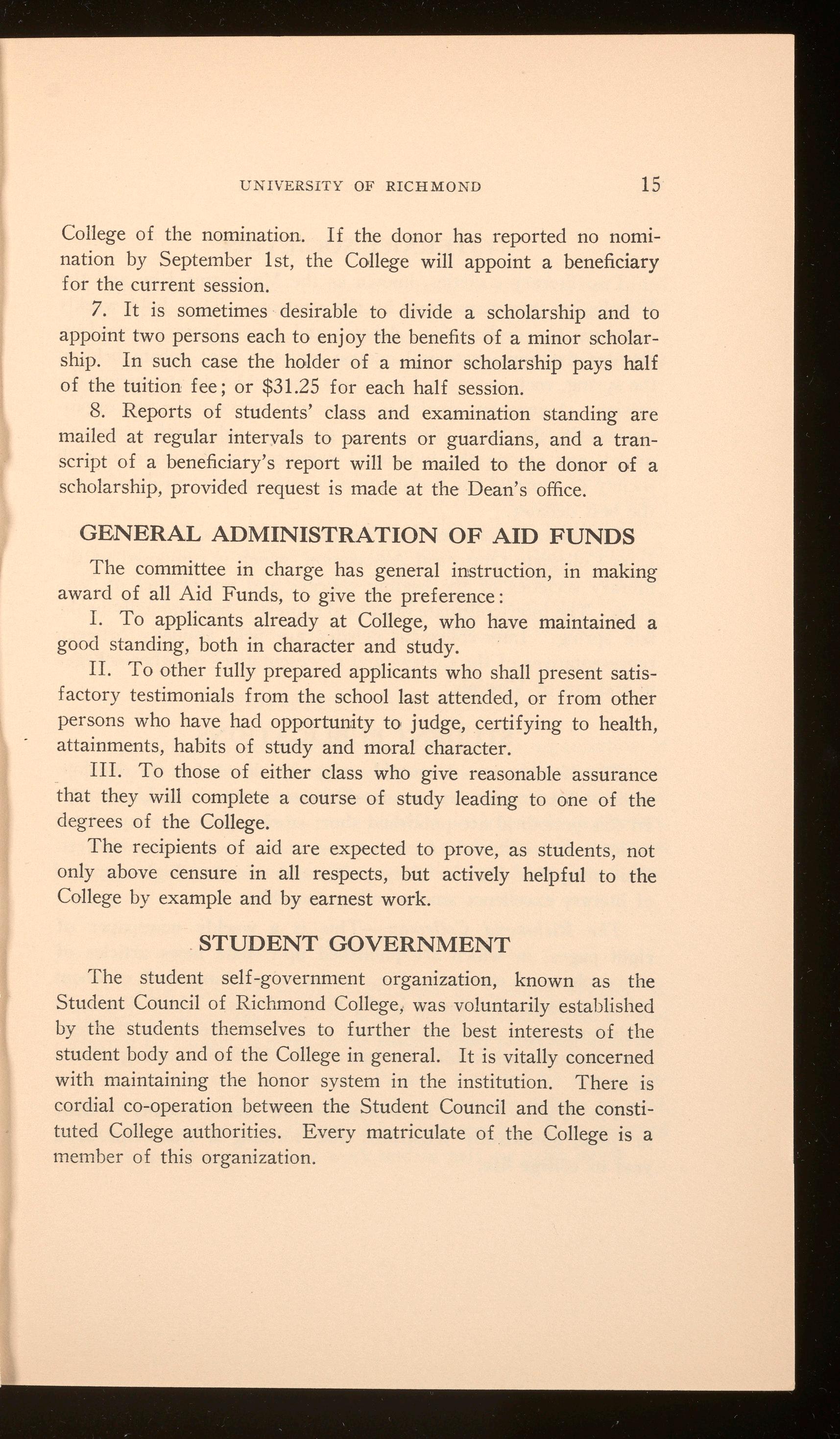
College of the nomination. If the donor has reported no nomination by September 1st, the College will appoint a beneficiary for the current session.
7. It is sometimes ·desirable to divide a scholarship and to appoint two persons each to enjoy the benefits of a minor scholarship. In such case the holder of a minor scholarship pays half of the tuition fee; or $31.25 for each half session.
8. Reports of students' class and examination standing are mailed at regular intervals to parents or guardians, and a transcript of a beneficiary's report will be mailed to the donor of a scholarship, provided request is made at the Dean's office.
The committee in charge has general instruction, in making award of all Aid Funds, to give the preference:
I. To applicants already at College, who have maintained a good standing, both in character and study.
II. To other fully prepared applicants who shall present satisfactory testimonials from the school last attended, or from other persons who have had opportunity to judge, certifying to health, attainments, habits of study and moral character.
III. To those of either class who give reasonable assurance that they will complete a course of study leading to one of the degrees of the College.
The recipients of aid are expected to prove, as students, not only above censure in all respects, but actively helpful to the College by example and by earnest work.
The student self-government organization, known as the Student Council of Richmond College, was voluntarily established by the students themselves to further the best interests of the student body and of the College in general. It is vitally concerned with maintaining the honor system in the institution. There is cordial co-operation between the Student Council and the constituted College authorities. Every matriculate of the College is a member of this organization.
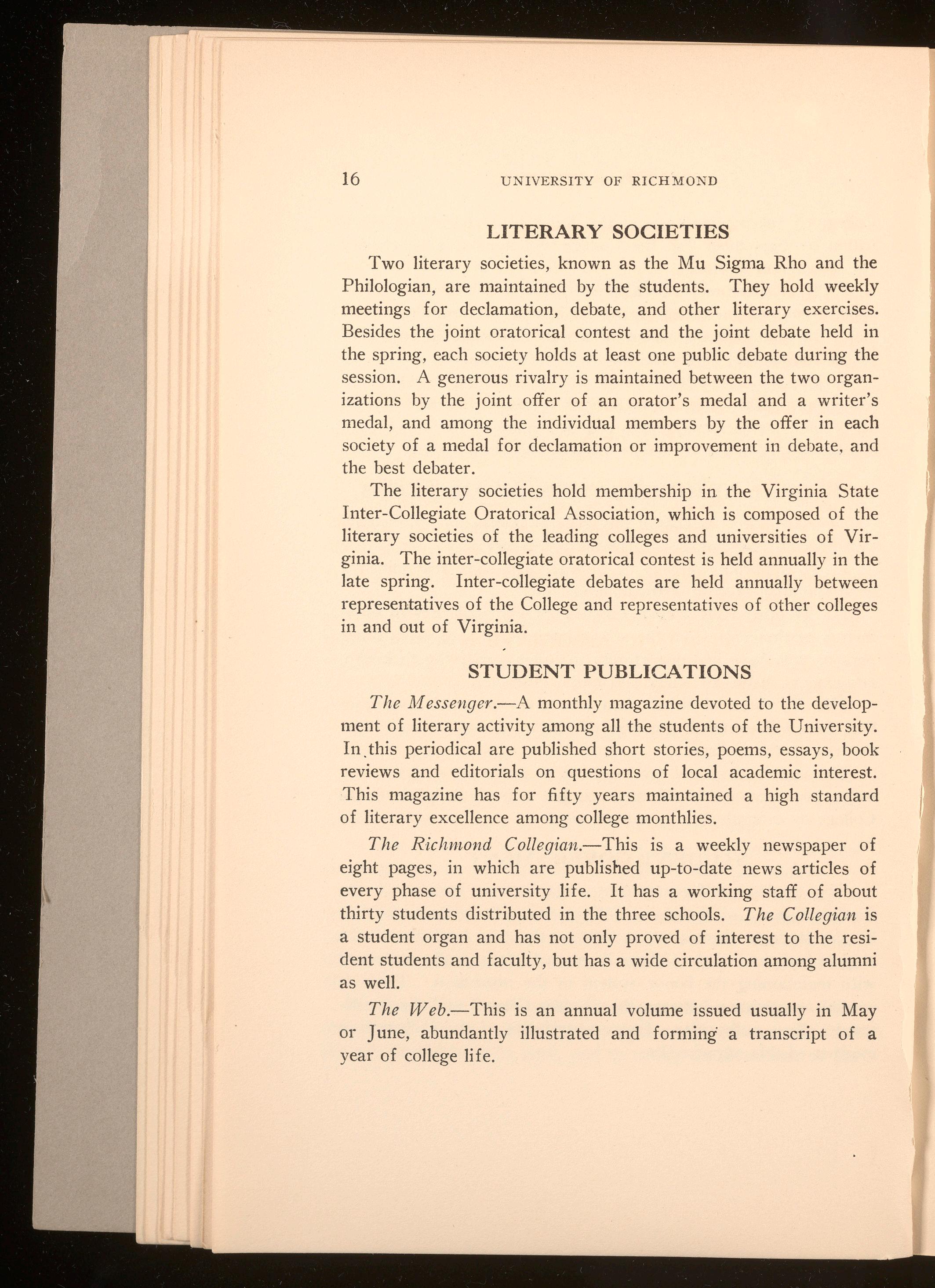
Two literary societies, known as the Mu Sigma Rho and the Philologian, are maintained by the students. They hold weekly meetings for declamation, debate, and other literary exercises. Besides the joint oratorical contest and the joint debate held in the spring, each society holds at least one public debate during the session. A generous rivalry is maintained between the two organizations by the joint offer of an orator's medal and a writer's medal, and among the individual members by the offer in each society of a medal for declamation or improvement in debate. and the best debater.
The literary societies hold membership in the Virginia State Inter-Collegiate Oratorical Association, which is composed of the literary societies of the leading colleges and universities of Virginia. The inter-collegiate oratorical contest is held annually in the late spring. Inter-collegiate debates are held annually between representatives of the College and representatives of other colleges in and out of Virginia.
Tile M essenger.-A monthly magazine devoted to the development of literary activity among all the students of the University. In .this periodical are published short stories, poems, essays, book reviews and editorials on questions of local academic interest. This magazine has for fifty years maintained a high standard of literary excellence among college monthlies.
The Richmond Collegian.-This is a weekly newspaper of eight pages, in which are published up-to-date news articles of every phase of university life. It has a working staff of about thirty students distributed in the three schools. The Collegian is a student organ and has not only proved of interest to the resident students and faculty, but has a wide circulation among alumni as well.
The W eb.-This is an annual volume issued usually in May or June, abundantly illustrated and forming a transcript of a year of college life.
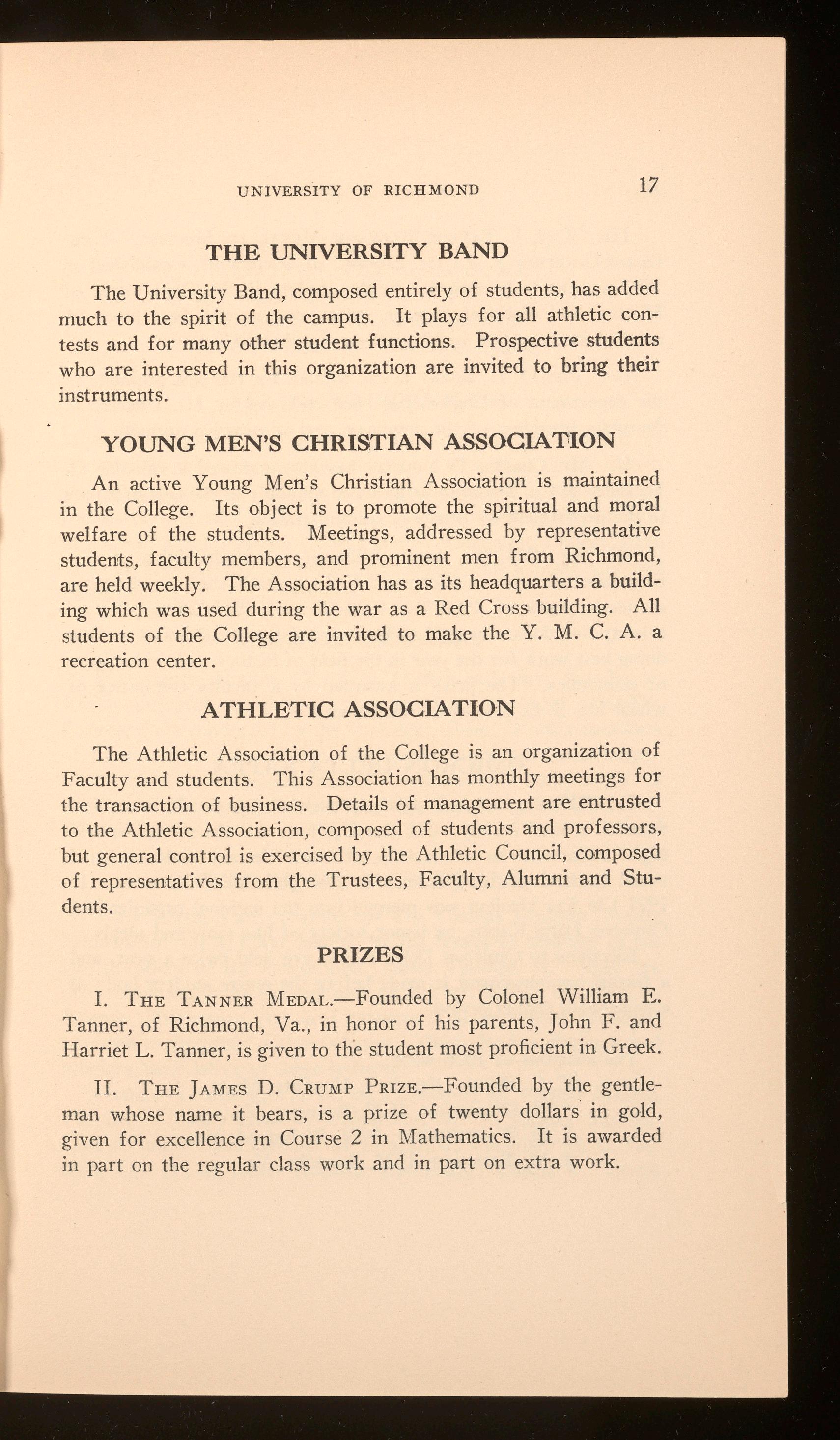
The University Band, composed entirely of students, has added much to the spirit of the campus. It plays for all athletic contests and for many other student functions. Prospective students who are interested in this organization are invited to bring their instruments.
An active Young Men's Christian Association is maintained in the College. Its object is to promote the spiritual and moral welfare of the students. Meetings, addressed by representative students, faculty members, and prominent men from Richmond, are held weekly. The Association has as its headquarters a building which was used during the war as a Red Cross building. All students of the College are invited to make the Y. M. C. A. a recreation center.
The Athletic Association of the College is an organization of Faculty and students. This Association has monthly meetings for the transaction of business Details of management are entrusted to the Athletic Association, composed of students and professors, but general control is exercised by the Athletic Council, composed of representatives from the Trustees, Faculty , Alumni and Students.
I. THE TANNER MEDAL.-Founded by Colonel William E. Tanner, of Richmond, Va., in honor of his parents, John F. and Harriet L. Tanner, is given to th e student most proficient in Greek.
II. THE JAMES D. CRUMP PRIZE.-Founded by the gentleman whose name it bears, is a prize of twenty dollars in gold, given for excellence in Course 2 in Mathematics. It is awarded in part on the regular class work and in part on extra work.
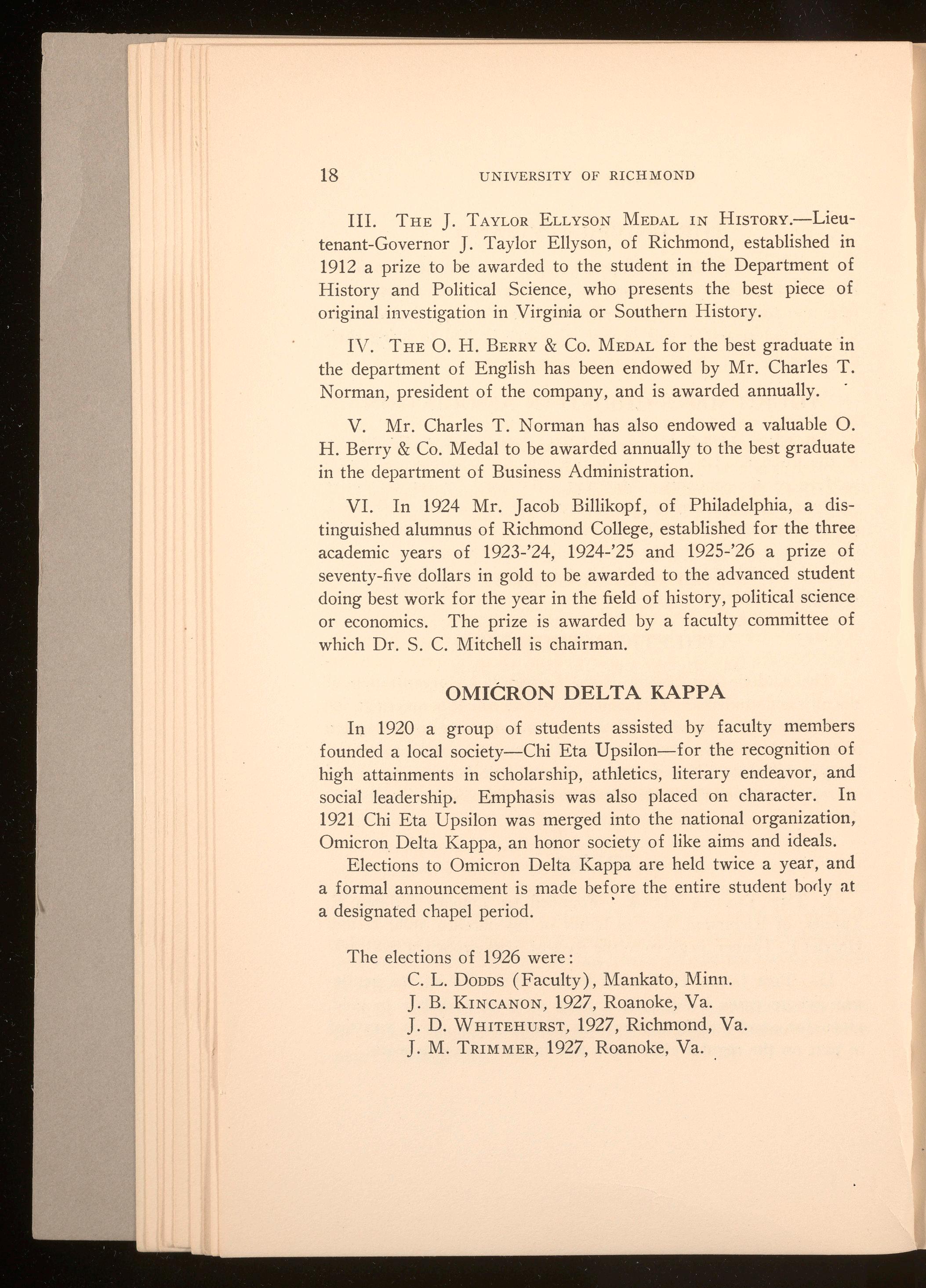
III. THE J. TAYLORELLYSONMEDAL IN HISTORY.-Lieutenant-Governor J. Taylor Ellyson, of Richmond, established in 1912 a prize to be awarded to the student in the Department of History and Political Science, who presents the best piece of original investigation in Virginia or Southern History.
IV. THE 0. H. BERRY& Co. MEDALfor the best graduate in the department of English has been endowed by Mr. Charles T. Norman, president of the company, and is awarded annually.
V. Mr. Charles T. Norman has also endowed a valuable 0. H. Berry & Co. Medal to be awarded annually to the best graduate in the department of Business Administration.
VI. In 1924 Mr. Jacob Billikopf, of Philadelphia, a distinguished alumnus of Richmond College, established for the three academic years of 1923-'24, 1924-'25 and 1925-'26 a prize of seventy-five dollars in gold to be awarded to the advanced student doing best work for the year in the field of history, political science or economics. The prize is awarded by a faculty committee of which Dr. S. C. Mitchell is chairman.
In 1920 a group of students assisted by faculty members founded a local society-Chi Eta Upsilon-for the recognition of high attainments in scholarship, athletics, literary endeavor, and social leadership. Emphasis was also placed on character. In 1921 Chi Eta Upsilon was merged into the national organization, Omicron Delta Kappa, an honor society of like aims and ideals.
Elections to Omicron Delta Kappa are held twice a year, and a formal announcement is made before the entire student borly at a designated chapel period. ·
The elections of 1926 were:
C. L. DODDS(Faculty), Mankato, Minn.
J. B. KINCANON,1927, Roanoke, Va.
J. D. WHITEHURST,1927, Richmond, Va.
J. M. TRIMMER , 1927, Roanoke, Va.
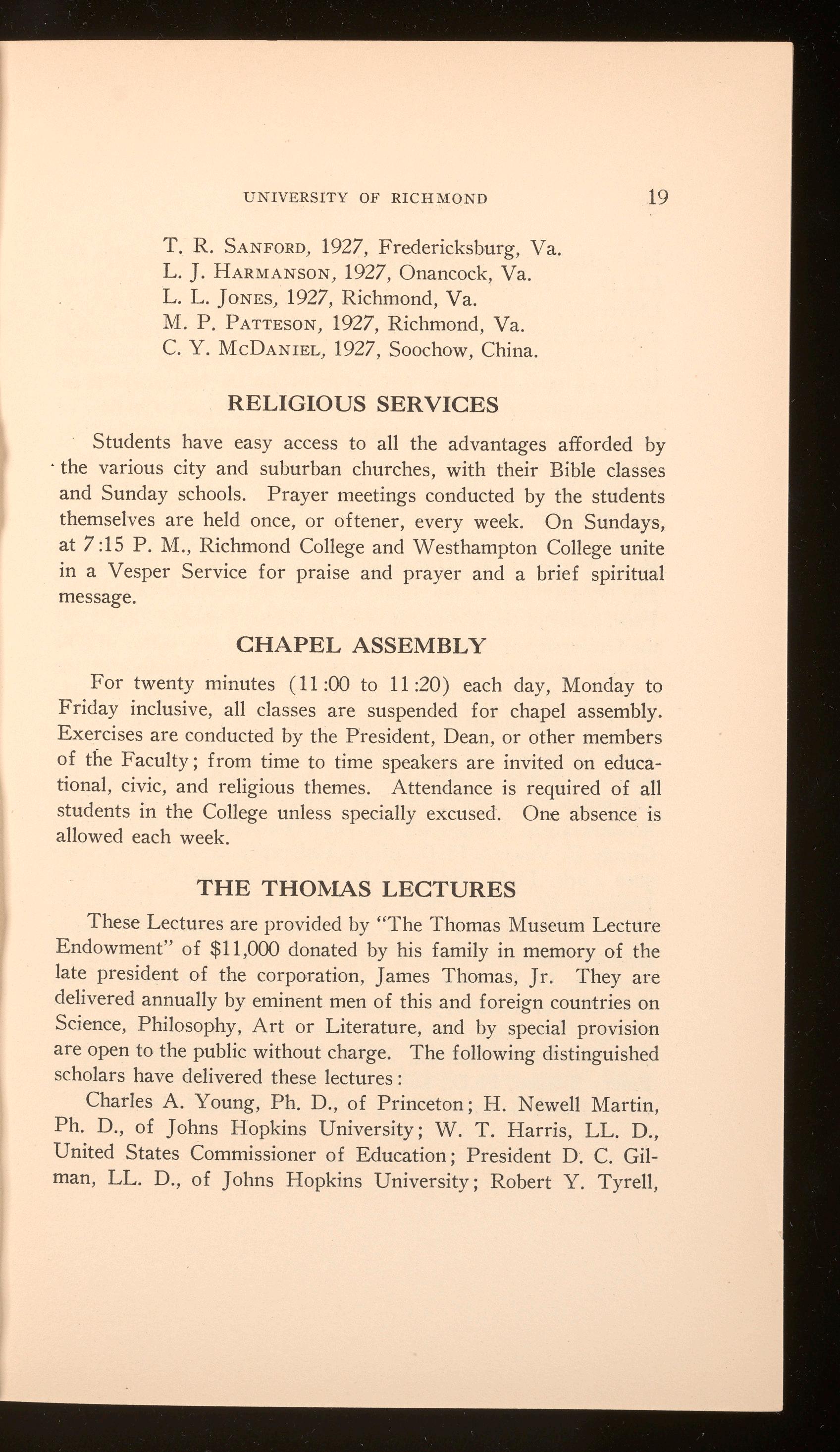
T. R. SANFORD , 1927, Fredericksburg, Va.
L. J. HARMANSON,1927, Onancock, Va.
L. L. JONES, 1927, Richmond, Va.
M. P. PATTESON,1927, Richmond, Va .
C. Y. McDANIEL, 1927, Soochow, China.
Students have easy access to all the advantages afforded by · the various city and suburban churches, with their Bible classes and Sunday schools. Prayer meetings conducted by the students themselves are held once, or oftener, every week. On Sundays, at 7 :15 P. M., Richmond College and Westhampton College unite in a Vesper Service for praise and prayer and a brief spiritual message.
For twenty minutes (11 :00 to 11 :20) each day, Monday to Friday inclusive, all classes are suspended for chapel assembly. Exercises are conducted by the President, Dean, or other members of the Faculty; from time to time speakers are invited on educational, civic, and religious themes. Attendance is required of all students in the College unless specially excused. One absence is allowed each week.
These Lectures are provided by "The Thomas Museum Lecture Endowment" of $11,000 donated by his family in memory of the late president of the corporation, James Thomas, Jr. They are delivered annually by eminent men of this and foreign countries on Science, Philosophy, Art or Literature, and by special provision are open to the public without charge. The following distinguished scholars have delivered these lectures : Charles A. Young, Ph. D., of Princeton; H. Newell Martin, Ph. D., of Johns Hopkins University; W. T. Harris, LL. D., United States Commissioner of Education; President D; C. Gilman, LL. D., of Johns Hopkins University; Robert Y. Tyrell,
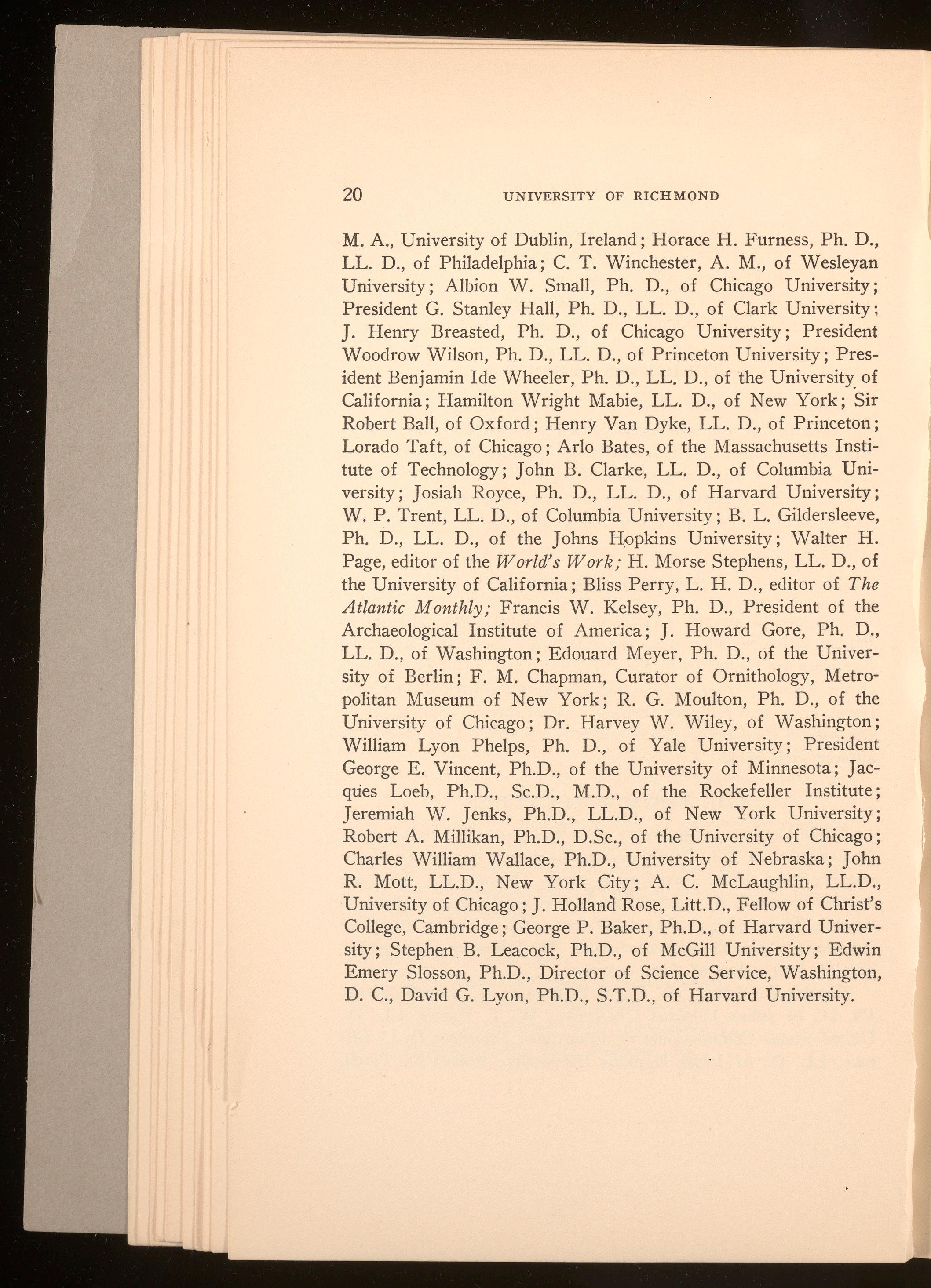
M.A., University of Dublin, Ireland; Horace H. Furness, Ph. D., LL. D., of Philadelphia; C. T. Winchester, A. M., of Wesleyan University; Albion W. Small, Ph. D., of Chicago University; President G. Stanley Hall, Ph. D., LL. D., of Clark University; J. Henry Breasted, Ph. D., of Chicago University; President Woodrow Wilson, Ph.D., LL. D., of Princeton University; President Benjamin Ide Wheeler, Ph. D., LL. D., of the University_ of California; Hamilton Wright Mabie, LL. D., of New York; Sir Robert Ball, of Oxford; Henry Van Dyke, LL. D., of Princeton; Lorado Taft, of Chicago; Arlo Bates, of the Massachusetts Institute of Technology; John B. Clarke, LL. D., of Columbia University; Josiah Royce, Ph. D., LL. D., of Harvard University; W. P. Trent, LL. D., of Columbia University; B. L. Gildersleeve, Ph. D., LL. D., of the Johns Hopkins University; Walter H. Page, editor of the World's Work; H. Morse Stephens, LL. D., of the University of California; Bliss Perry, L. H. D., editor of The Atlantic Monthly; Francis W. Kelsey, Ph. D., President of the Archaeological Institute of America; J. Howard Gore, Ph. D., LL. D., of Washington; Edouard Meyer, Ph. D., of the University of Berlin; F. M. Chapman, Curator of Ornithology, Metropolitan Museum of New York; R. G. Moulton, Ph. D., of the University of Chicago; Dr. Harvey W. Wiley, of Washington; William Lyon Phelps, Ph. D., of Yale University; President George E. Vincent, Ph.D., of the University of Minnesota; J acqties Loeb, Ph.D., Sc.D., M.D., of the Rockefeller Institute; Jeremiah W. Jenks, Ph.D., LL.D., of New York University; Robert A. Millikan, Ph.D., D.Sc., of the University of Chicago; Charles William Wallace, Ph.D., University of Nebraska; John R. Mott, LL.D., New York City; A. C. McLaughlin, LL.D., University of Chicago; J. Holland Rose, Litt.D., Fellow of Christ's College, Cambridge; George P. Baker, Ph.D., of Harvard University; Stephen B. Leacock, Ph.D., of McGill University; Edwin Emery Slosson, Ph.D., Director of Science Service, Washington, D. C., David G. Lyon, Ph.D., S.T.D., of Harvard University.
Attention is invited to the wide range of studies now offered in the College. The student who looks forward to professional study in engineering, law, medicine or dentistry not only may obtain general training, but may also have opportunity to make special preparation for his future work. The law student will find his special needs met in the subjects treated in the departments of Eng.lish, History, Economics, Political Science, and Philosophy. Similarly, the prospective student of medicine will find that the work in Biology, Chemistry, Psychology and Physics has afforded him direct preparation for his profession. Students who specialize in Chemistry, Physics, or Mathematics, in addition to the essential work in English and Modern Languages, receive advanced standing for their work in the best schools of Engineering and Applied Arts .
The Alumni of the College have long been organized into a Society, which holds annual meetings to renew old associations , maintain a close connection with Alma Mater, and further the cause of education and letters. For several years the custom has been to have an annual banquet on Tuesday of commencement week. The officers of the Society are :
GEORGE BRYAN , '81 President
H. H. HARRIS, JR. , '87 .. First Vice-Pr esident
J VAUGHAN GARY, '15..... Second Vice-President
Jos. A LESLIE, JR., '16 . Third Vice -President
W. L. PRINCE, '98 .......
- B. HANDY, '09 ..
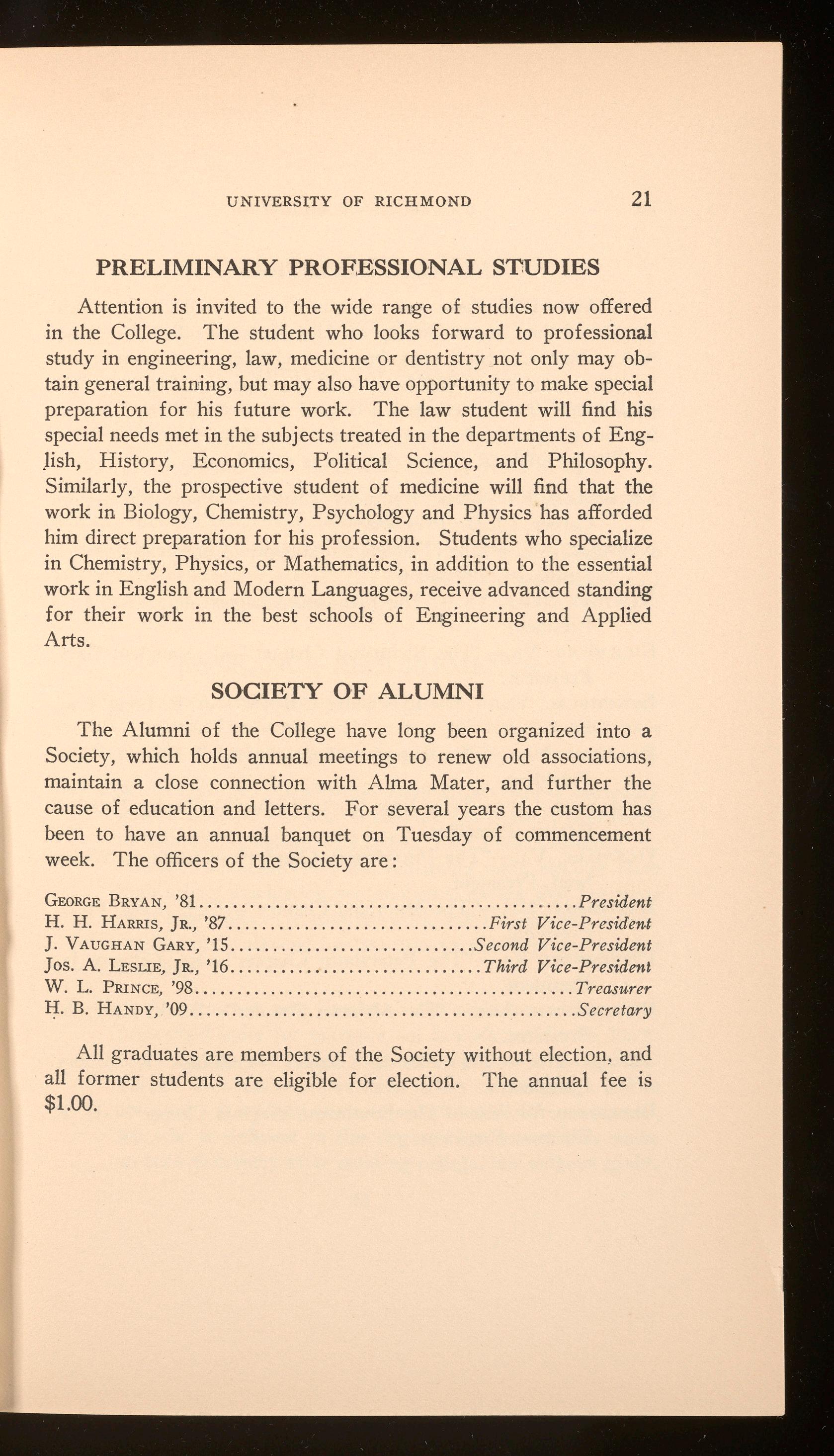
Treasurer
Secretary
All graduates are members of the Society without election, and all former students are eligible for election. The annual fee is $1.00
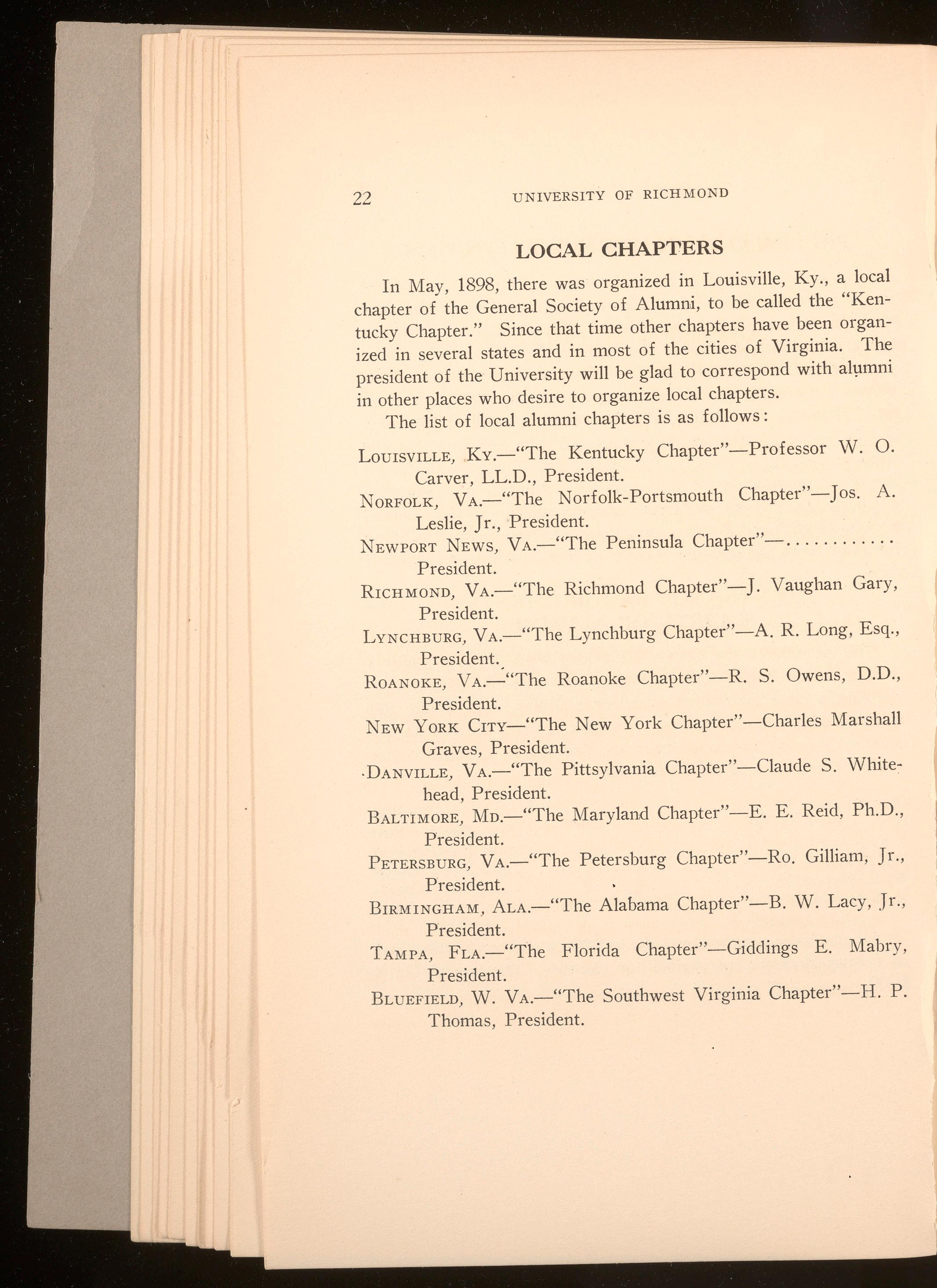
In May, 1898, there was organized in Louisville, Ky., a local chapter of the General Society of Alumn~, to be called the "Kentucky Chapter." Since that time other chapters have been organized in several states and in most of the cities of Virginia. The president of the University will be glad to correspond with ah,imni in other places who desire to organize local chapters.
The list of local alumni chapters is as follows :
LOUISVILLE,KY.-"The Kentucky Chapter"-Professor W. O. Carver, LL.D., President.
NORFOLK, VA.-"The Norfolk-Portsmouth Chapter"-Jos. A. Leslie, Jr., President.
NEWPORTNEws, VA.-"The Peninsula Chapter"-........... President.
RICHMOND,V A.-"The Richmond Chapter"-J. Vaughan Gary, President.
LYNCHBURG,VA.-"The Lynchburg Chapter"-A. R. Long, Esq., President.
RoANOKE, VA.-"The Roanoke Chapter"-R. S. Owens, D.D., President.
NEW YORK CITY-"The New York Chapter"-Charles Marshall Graves, President.
-DANVILLE,VA.-"The Pittsylvania Chapter"-Claude S. Whitehead, President.
BALTIMORE,MD.-"The Maryland Chapter"-E. E. Reid, Ph.D., President.
PETERSBURG,VA.-"The Petersburg Chapter"-Ro. Gilliam, Jr., President.
BIRMINGHAM,ALA.-"The Alabama Chapter"-B. W. Lacy, Jr., President.
TAMPA, FLA.-"The Florida Chapter"-Giddings E. Mabry, President.
BLUEFIELD,W. VA.-"The Southwest Virginia Chapter"-H. P. Thomas, President.
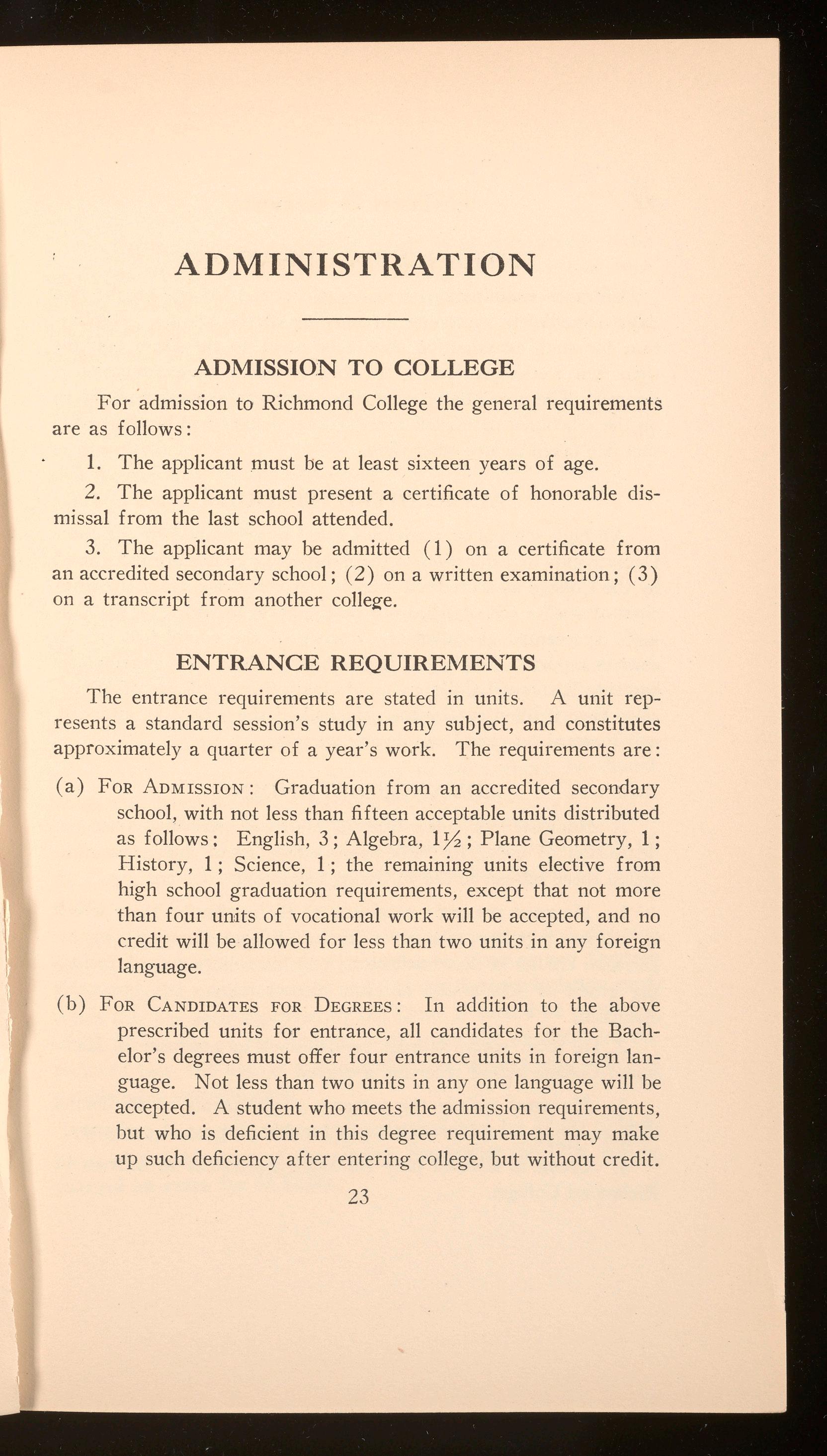
For admission to Richmond College the general requirements are as follows :
1. The applicant must be at least sixteen years of age.
2. The applicant must present a certificate of honorable dismissal from the last school attended.
3. The applicant may be admitted ( 1) on a certificate from an accredited secondary school ; ( 2) on a written examination; ( 3) on a transcript from another college.
The entrance requirements are stated in units. A unit represents a standard session's study in any subject, and constitutes approximately a quarter of a year's work. The requirements are:
(a) FoR ADMISSION: Graduation from an accredited secondary school, with not less than fifteen acceptable units distributed as follows: English, 3; Algebra, 1_½; Plane Geometry, 1; History, 1 ; Science, 1 ; the remaining units elective from high school graduation requirements, except that not more than four units of vocational work will be accepted, and no credit will be allowed for less than two units in any foreign language.
(b) FoR CANDIDATESFOR DEGREES: In addition to the above prescribed units for entrance, all candidates for the Bachelor's degrees must offer four entrance units in foreign language. Not less than two units in any one language will be accepted. A student who meets the admission requirements, but who is deficient in this degree requirement may make up such deficiency after entering college, but without credit.
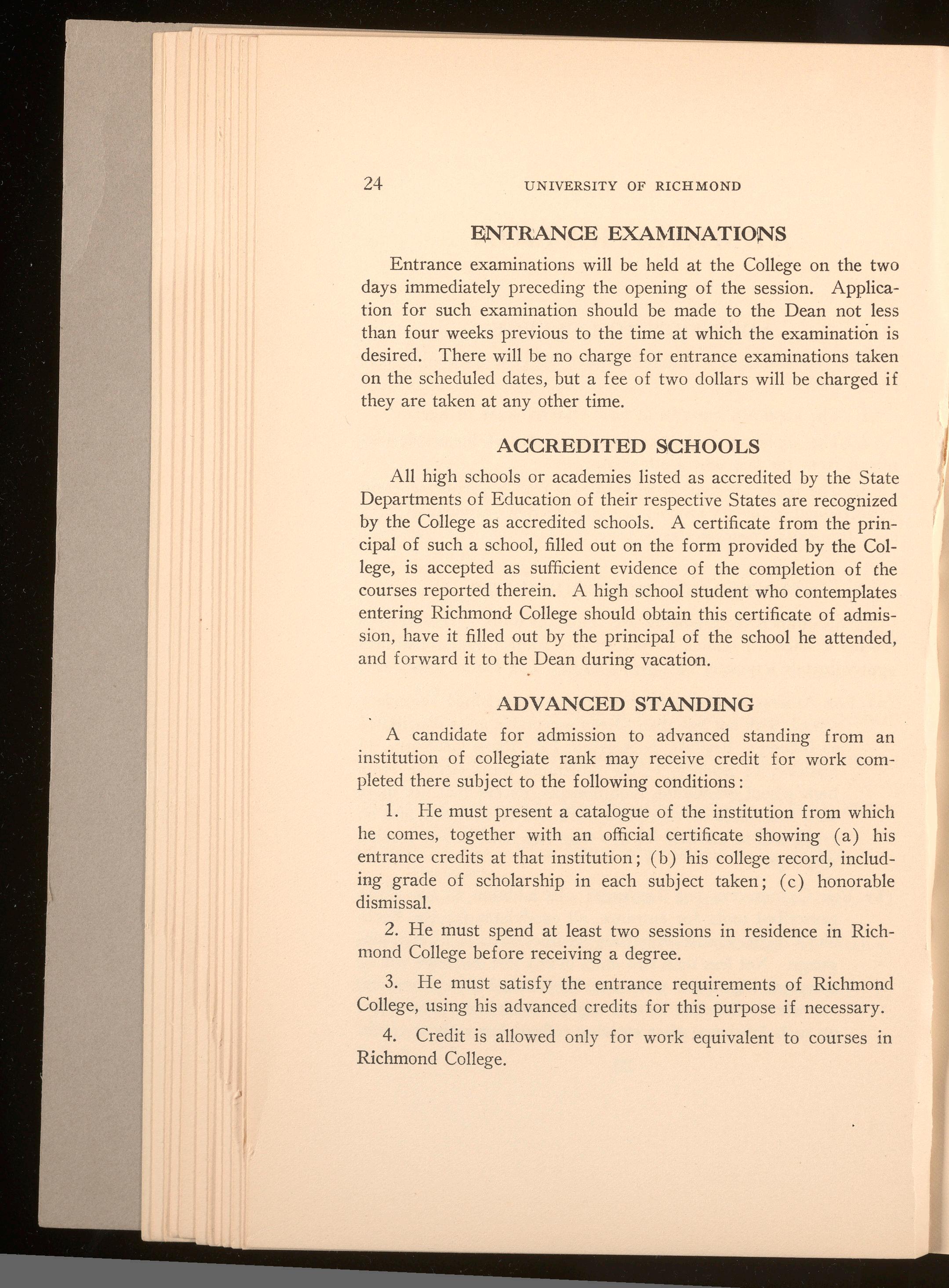
Entrance examinations will be held at the College on the two days immediately preceding the opening of the session. Application for such examination should be made to the Dean not less than four weeks previous to the time at which the examination is desired. There will be no charge for entrance examinations taken on the scheduled dates, but a fee of two dollars will be charged if they are taken at any other time.
All high schools or academies listed as accredited by the State Departments of Education of their respective States are recognized by the College as accredited schools. A certificate from the principal of such a school, filled out on the form provided by the College, is accepted as sufficient evidence of the completion of the courses reported therein. A high school student who contemplates entering Richmond College should obtain this certificate of admission, have it filled out by the principal of the school he attended, and forward it to the Dean during vacation.
A candidate for admission to advanced standing from an institution of collegiate rank may receive credit for work completed there subject to the following conditions:
1. He must present a catalogue of the institution from which he comes, together with an official certificate showing (a) his entrance credits at that institution; (b) his college record, including grade of scholarship in each subject taken; ( c) honorable dismissal.
2. He must spend at least two sessions in residence in Richmond College before receiving a degree.
3. He must satisfy the entrance requirements of Richmond College, using his advanced credits for this purpose if necessary.
4. Credit is allowed only for work equivalent to courses in Richmond College.
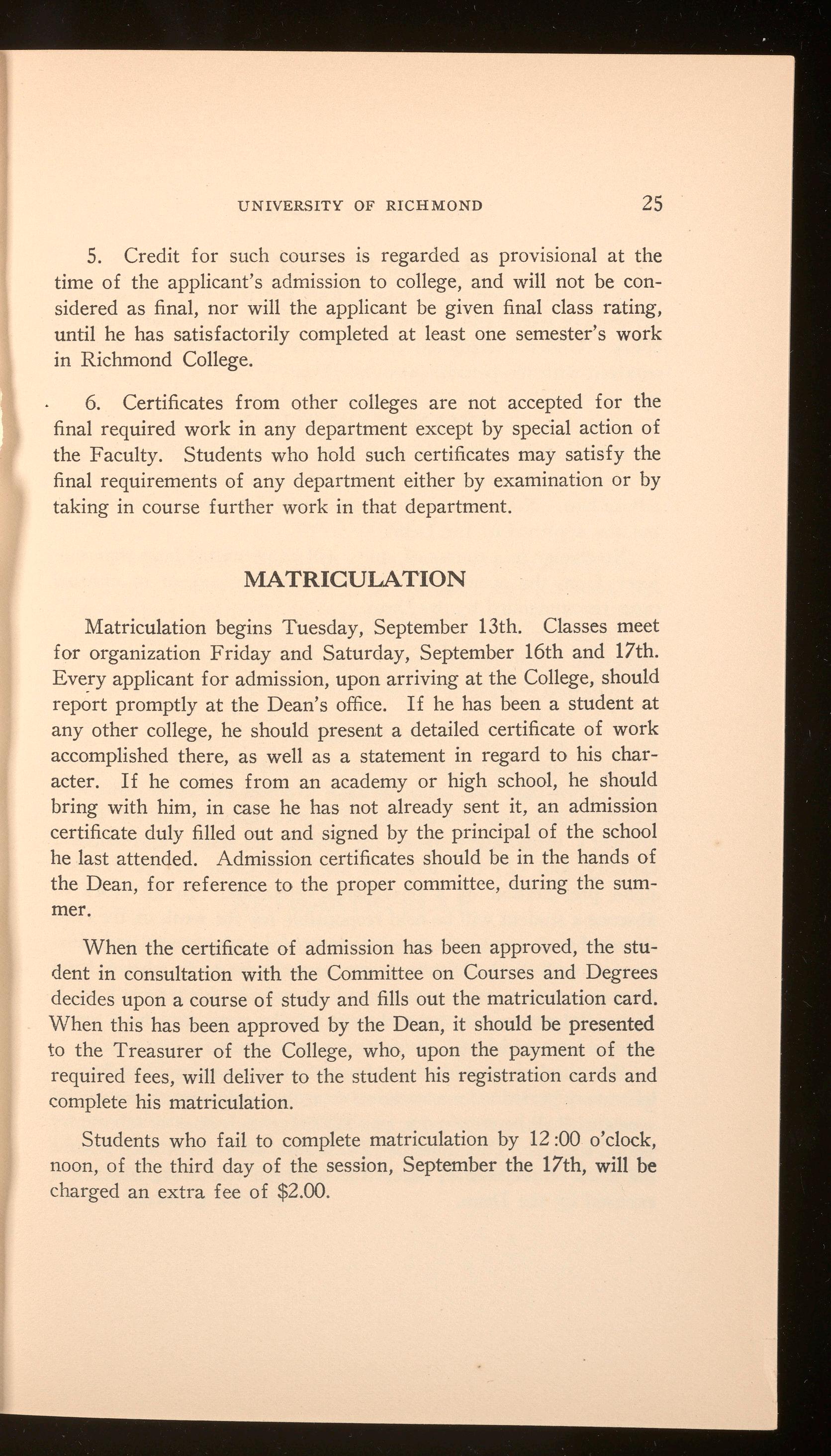
5. Credit for such courses is regarded as provisional at the time of the applicant's admission to college, and will not be considered as final, nor will the applicant be given final class rating, until he has satisfactorily completed at least one semester's work in Richmond College.
6. Certificates from other colleges are not accepted for the final required work in any department except by special action of the Faculty. Students who hold such certificates may satisfy the final requirements of any department either by examination or by taking in course further work in that department.
Matriculation begins Tuesday, September 13th. Classes meet for organization Friday and Saturday, September 16th and 17th. Every applicant for admission, upon arriving at the College, should report promptly at the Dean's office. If he has been a student at any other college, he should present a detailed certificate of work accomplished there, as well as a statement in regard to his character. If he comes from an academy or high school, he should bring with him, in case he has not already sent it, an admission certificate duly filled out and signed by the principal of the school he last attended. Admission certificates should be in the hands of the Dean, for reference to the proper committee, during the summer.
When the certificate of admission has been approved, the student in consultation with the Committee on Courses and Degrees decides upon a course of study and fills out the matriculation card. When this has been approved by the Dean, it should be presented to the Treasurer of the College, who, upon the payment of the required fees, will deliver to the student his registration cards and complete his matriculation.
Students who fail to complete matriculation by 12 :00 o'clock, noon, of the third day of the session, September the 17th, will be charged an extra fee of $2.00.
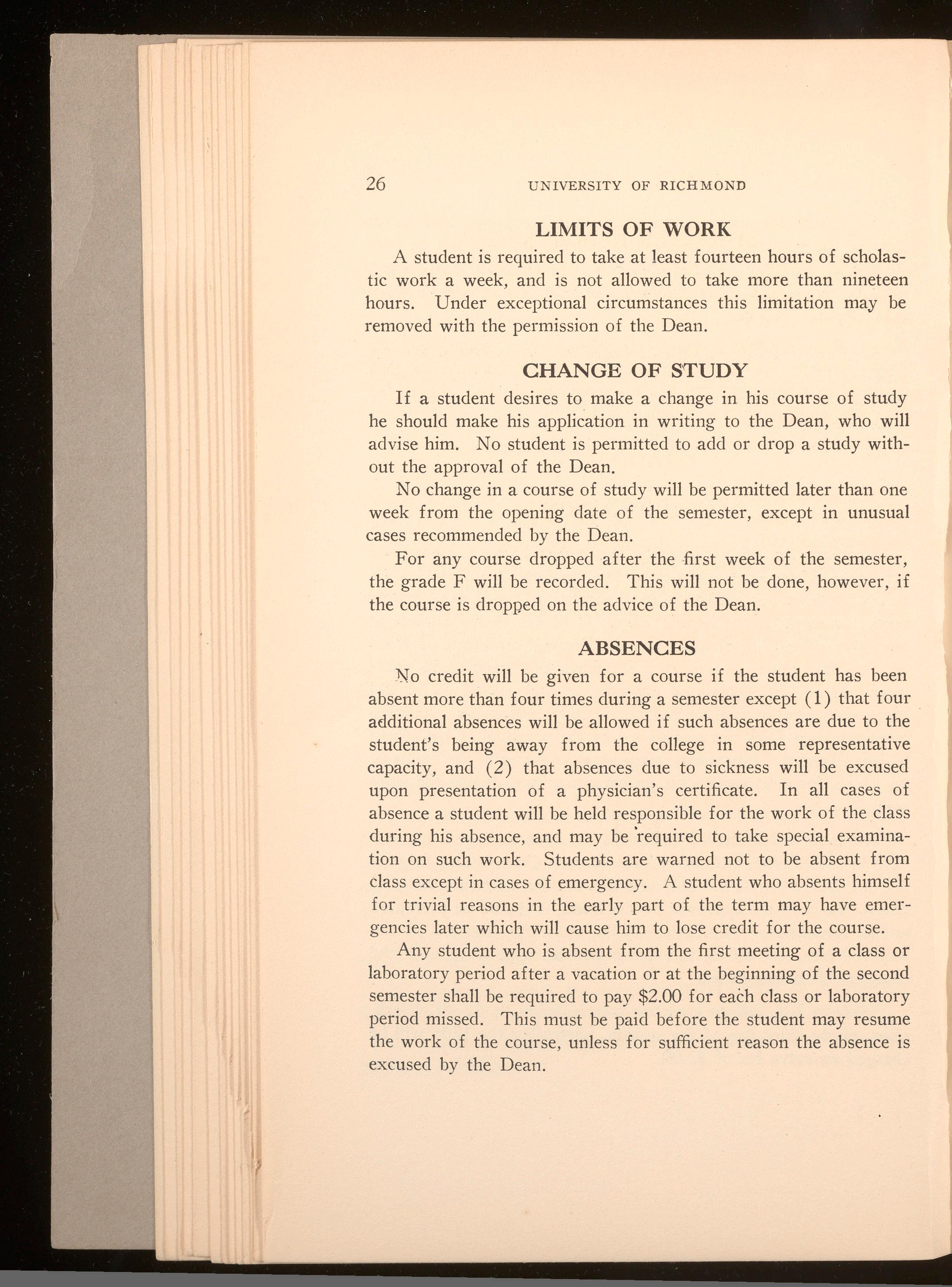
A student is required to take at least fourteen hours of scholastic work a week, and is not allowed to take more than nineteen hours. Under exceptional circumstances this limitation may be removed with the permission of the Dean.
If a student desires to make a change in his course of study he should make his application in writing to the Dean, who will advise him. No student is permitted to add or drop a study without the approval of the Dean.
No change in a course of study will be permitted later than one week from the opening date of the semester, except in unusual cases recommended by the Dean.
For any course dropped after the first week of the semester, the grade F will be recorded. This will not be done, however, if the course is dropped on the advice of the Dean.
No credit will be given for a course if the student has been absent more than four times during a semester except ( 1) that four additional absences will be allowed if such absences are due to the student's being away from the college in some representative capacity, and (2) that absences due to sickness will be excused upon presentation of a physician's certificate. In all cases of absence a student will be held responsible for the work of the class during his absence, and may be 'required to take special examination on such work. Students are warned not to be absent from class except in cases of emergency. A student who absents himself for trivial reasons in the early part of the term may have emergencies later which will cause him to lose credit for the course.
Any student who is absent from the first meeting of a class or laboratory period after a vacation or at the beginning of the second semester shall be required to pay $2.00 for each class or laboratory period missed. This must be paid before the student may resume the work of the course, unless for sufficient reason the absence is excused by the Dean.
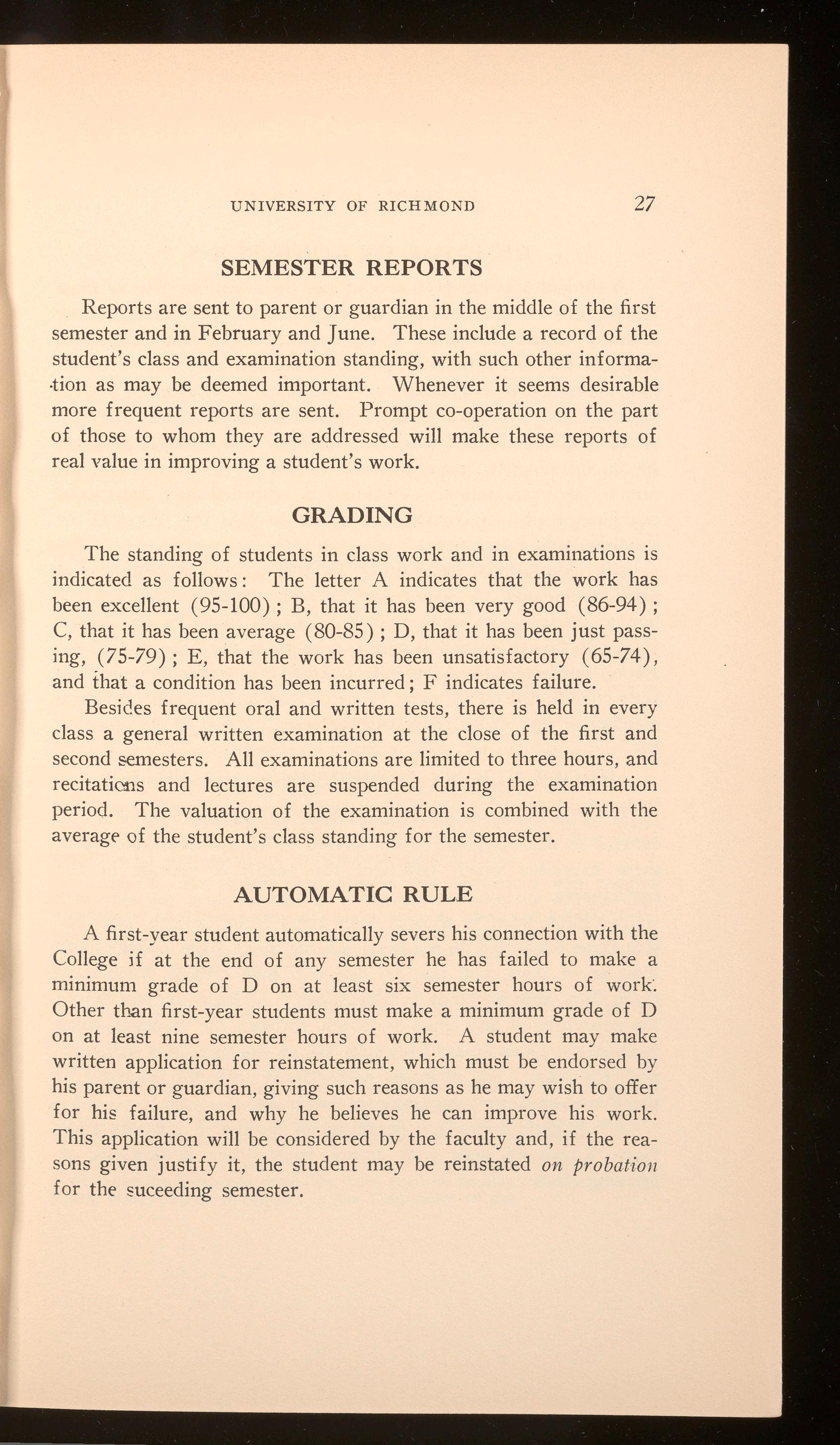
Reports are sent to parent or guardian in the middle of the first semester and in February and June. These include a record of the student's class and examination standing, with such other informa•tion as may be deemed important. Whenever it seems desirable more frequent reports are sent. Prompt co-operation on the part of those to whom they are addressed will make these reports of real value in improving a student's work.
The standing of students in class work and in examinations is indicated as follows : The letter A indicates that the work has been excellent (95-100); B, that it has been very good (86-94); C, that it has been average ( 80-85) ; D, that it has been just passing, ( 7 5-79) ; E, that the work has been unsatisfactory ( 65-7 4), and that a condition has been incurred ; F indicates failure. Besices frequent oral and written tests, there is held in every class a general written examination at the close of the first and second semesters. All examinations are limited to three hours, and recitations and lectures are suspended during the examination period. The valuation of the examination is combined with the average of the student's class standing for the semester.
A first-year student automatically severs his connection with the College if at the end of any semester he has failed to make a minimum grade of D on at least six semester hours of work. Other than first-year students must make a minimum grade of D on at least nine semester hours of work. A student may make written application for reinstatement, which must be endorsed by his parent or guardian, giving such reasons as he may wish to offer for his failure, and why he believes he can improve his work. This application will be considered by the faculty and, if the reasons given justify it, the student may be reinstated on probation for the rnceeding semester.
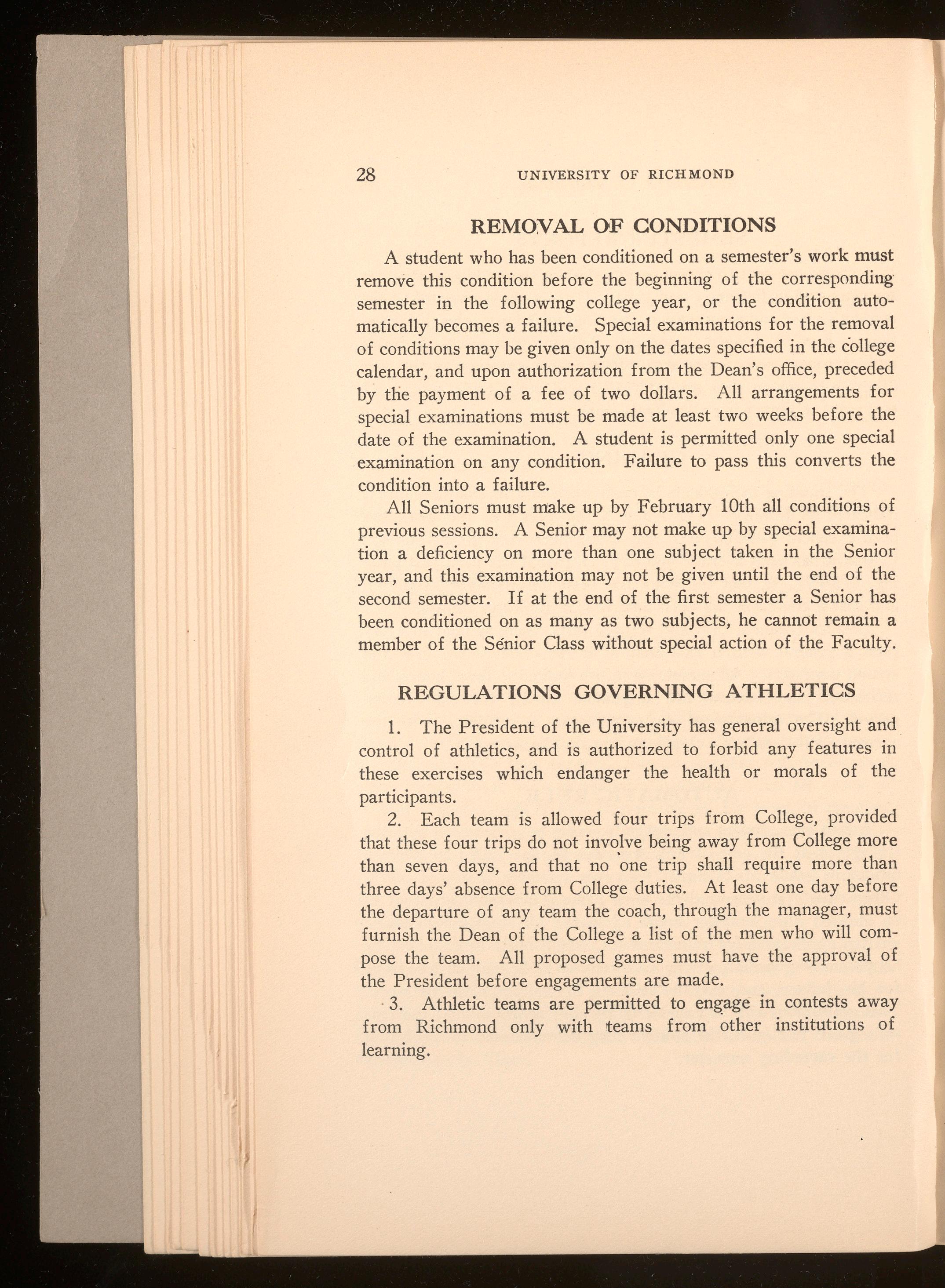
A student who has been conditioned on a semester's work must remove this condition before the beginning of the corresponding semester in the following college year, or the condition automatically becomes a failure. Special examinations for the removal of conditions may be given only on the dates specified in the college calendar, and upon authorization from the Dean's office, preceded by the payment of a fee of two dollars. All arrangements for special examinations must be made at least two weeks before the date of the examination. A student is permitted only one special examination on any condition. Failure to pass this converts the condition into a failure.
All Seniors must make up by February 10th all conditions of previous sessions. A Senior may not make up by special examination a deficiency on more than one subject taken in the Senior year, and this examination may not be given until the end of the second semester. If at the end of the first semester a Senior has been conditioned on as many as two subjects, he cannot remain a member of the Senior Class without special action of the Faculty.
1. The President of the University has general oversight and control of athletics, and is authorized to forbid any features in these exercises which endanger the health or morals of the participants.
2. Each team is allowed four trips from College, provided that these four trips do not involve being away from College more than seven days, and that no 0 one trip shall require more than three days' absence from College duties. At least one day before the departure of any team the coach, through the manager, must furnish the Dean of the College a list of the men who will compose the team. All proposed games must have the approval of the President before engagements are made.
· 3. Athletic teams are permitted to engage in contests away from Richmond only with teams from other institutions of learning.
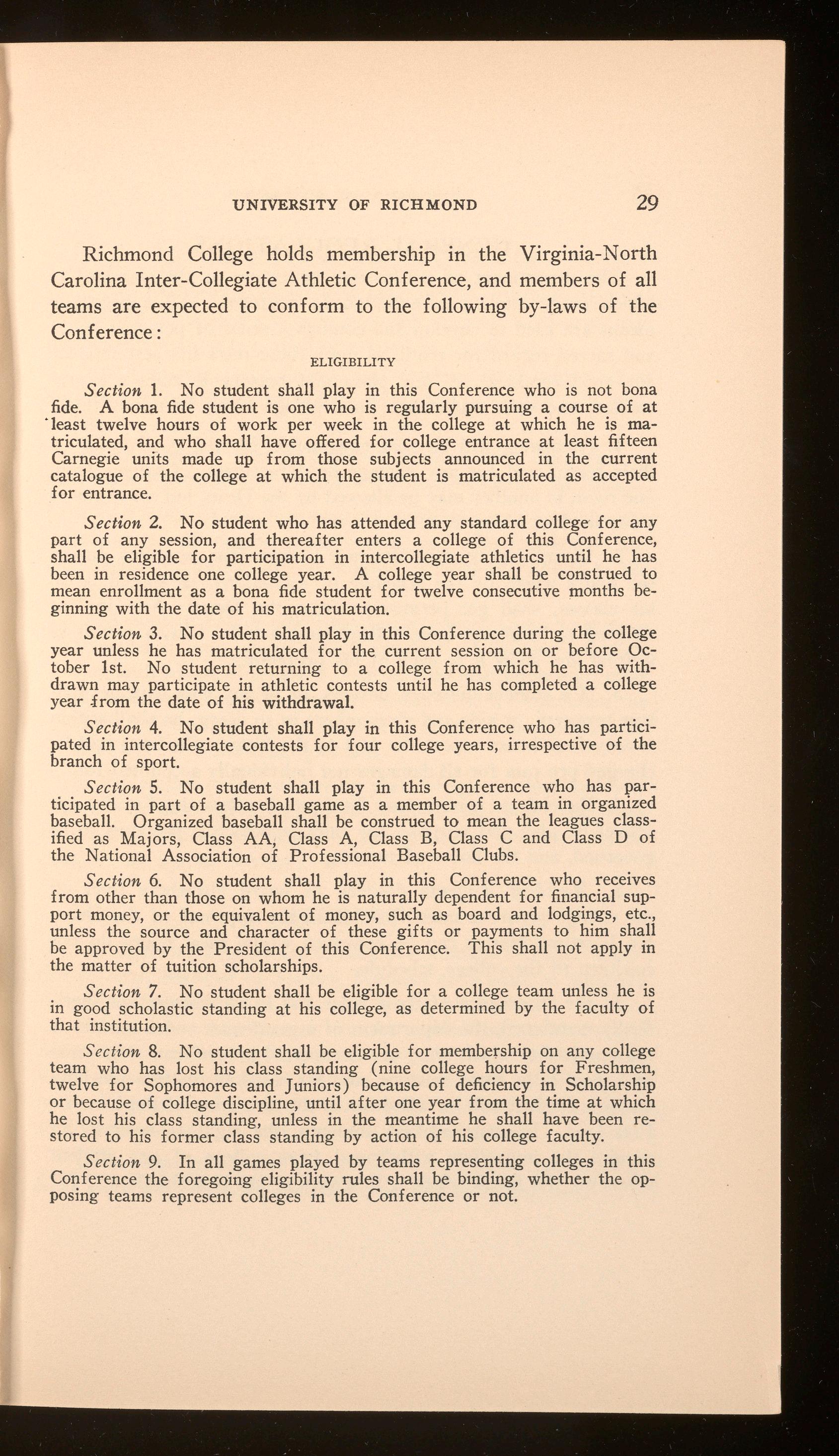
Richmond College holds membership in the Virginia-North Carolina Inter-Collegiate Athletic Conference, and members of all teams are expected to conform to the following by-laws of the Conference:
Section 1. No student shall play in this Conference who is not bona fide. A bona fide student is one who is regularly pursuing a course of at "least twelve hours of work per week in the college at which he is matriculated, and who shall have offered for college entrance at least fifteen Carnegie units made up from those subjects announced in the current catalogue of the college at which the student is matriculated as accepted for entrance.
Section 2. No student who has attended any standard college· for any part of any session, and thereafter enters a college of this Conference, shall be eligible for participation in intercollegiate athletics until he has been in residence one college year. A college year shall be construed to mean enrollment as a bona fide student for twelve consecutive months beginning with the date of his matriculation.
Section 3. No student shall play in this Conference during the college year unless he has matriculated for the current session on or before October 1st. No student returning to a college from which he has withdrawn may participate in athletic contests until he has completed a college year .from the date of his withdrawal.
Section 4. No student shall play in this Conference who has participated in intercollegiate contests for four college years, irrespective of the branch of sport.
Section 5. No student shall play in this Conference who has participated in part of a baseball game as a member of a team in organized baseball. Organized baseball shall be construed to mean the leagues classified as Majors, Class AA, Class A, Class B, Class C and Class D of the National Association of Professional Baseball Clubs.
Section 6. No student shall play in this Conference who receives from other than those on whom he is naturally dependent for financial support money, or the equivalent of money, such as board and lodgings, etc., unless the source and character of these gifts or payments to him shall be approved by the President of this Conference. This shall not apply in the matter of tuition scholarships.
Section 7. No student shall be eligible for a college team unless he is in good scholastic standing at his college, as determined by the faculty of that institution.
Section 8. No student shall be eligible for membership on any college team who has lost his class standing (nine college hours for Freshmen, twelve for Sophomores and Juniors) because of deficiency in Scholarship or because of college discipline, until after one year from the time at which he lost his class standing, unless in the meantime he shall have been restored to his former class standing by action of his college faculty.
Section 9. In all games played by teams representing colleges in this Conference the foregoing eligibility rules shall be binding, whether the opposing teams represent colleges in the Conference or not.
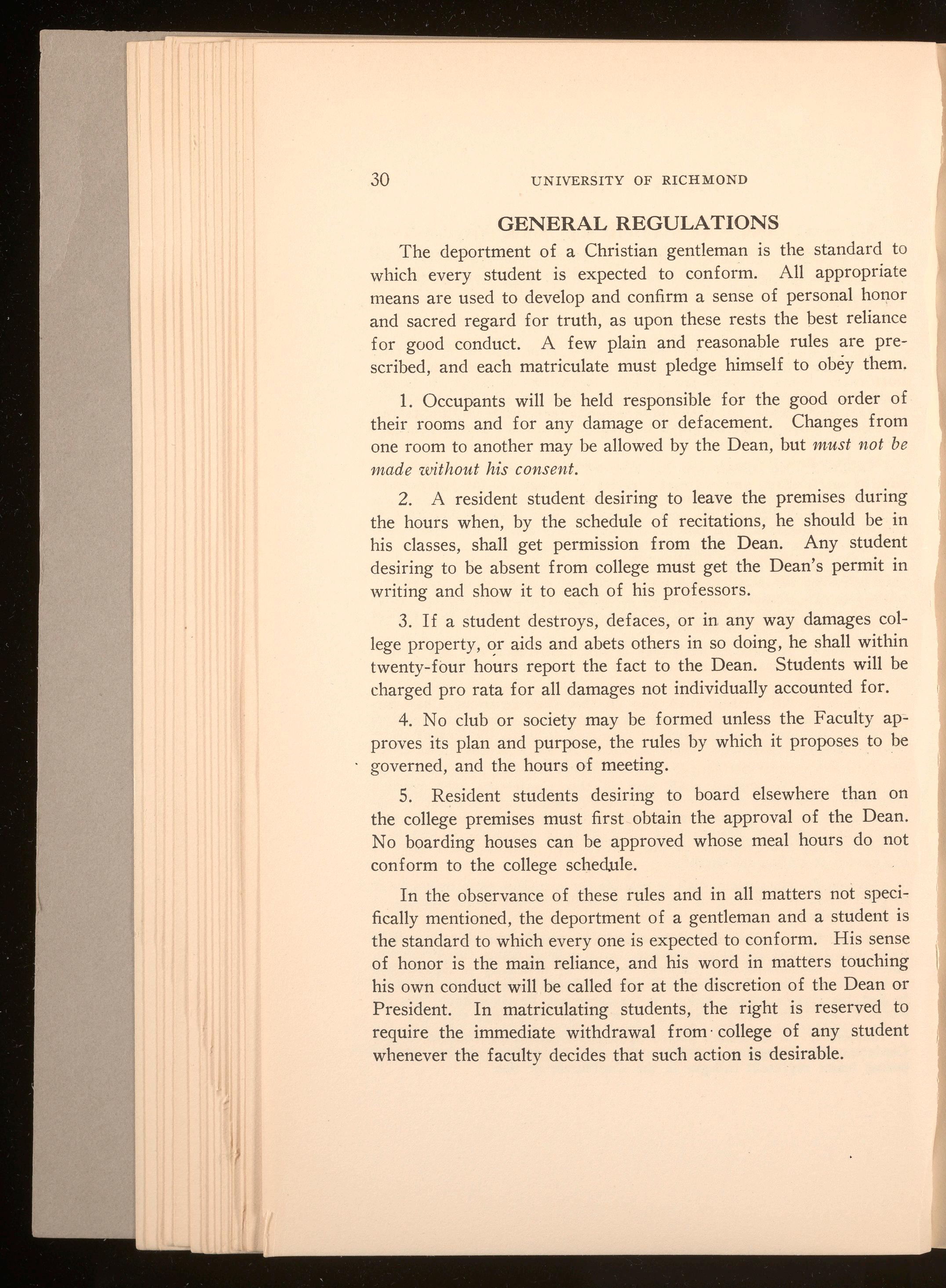
The deportment of a Christian gentleman is the standard to which every student is expected to conform. All appropriate means are used to develop and confirm a sense of personal honor and sacred regard for truth, as upon these rests the best reliance for good conduct. A few plain and .reasonable rules are prescribed, and each matriculate must pledge himself to obey them.
1. Occupants will be held responsible for the good order of their rooms and for any damage or defacement. Changes from one room to another may be allowed by the Dean, but must not be made without his consent.
2. A resident student desiring to leave the premises during the hours when, by the schedule of recitations, he should be in his classes, shall get permission from the Dean. Any student desiring to be absent from college must get the Dean's permit in writing and show it to each of his professors.
3. If a student destroys, defaces, or in any way damages college property, or aids and abets others in so doing, he shall within twenty-four ho~rs report the fact to the Dean. Students will be charged pro rata for all damages not individually accounted for.
4. No club or society may be formed unless the Faculty approves its plan and purpose, the rules by which it proposes to be governed, and the hours of meeting.
5. Resident students desiring to board elsewhere than on the college premises must first obtain the approval of the Dean. No boarding houses can be approved whose meal hours do not conform to the college schedule.
In the observance of these rules and in all matters not specifically mentioned, the deportment of a gentleman and a student is the standard to which every one is expected to conform. His sense of honor is the main reliance, and his word in matters touching his own conduct will be called for at the discretion of the Dean or President. In matriculating students, the right is reserved to require the immediate withdrawal from· college of any student whenever the faculty decides that such action is desirable.
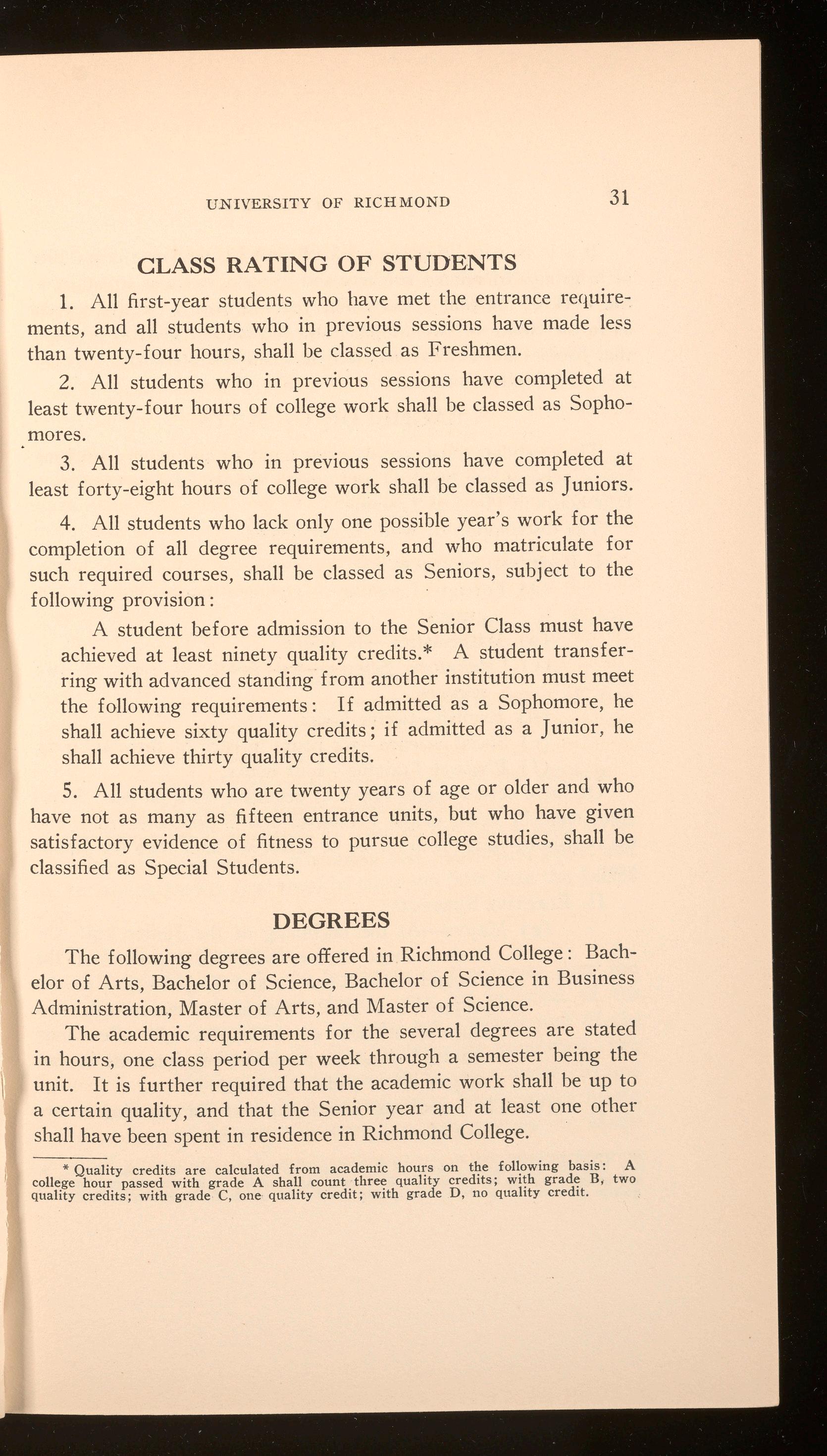
1. All first-year students who have met the entrance requirements, and all students who in previous sessions have made le!:'s than twenty-four hours, shall be classed as Freshmen.
2. All students who in previous sessions have completed at least twenty-four hours of college work shall be classed as Sophomores.
3. All students who in previous sessions have completed at least forty-eight hours of college work shall be classed as Juniors.
4. All students who lack only one possible year's work for the completion of all degree requirements, and who matriculate for such required courses, shall be classed as Seniors, subject to the following provision : A student before admission to the Senior Class must have achieved at least ninety quality credits.* A student transferring with advanced standing from another institution must meet the following requirements : If admitted as a Sophomore, he shall achieve sixty quality credits; if admitted as a Junior, he shall achieve thirty quality credits.
5. All students who are twenty years of age or older and who have not as many as fifteen entrance units, but who have given satisfactory evidence of fitness to pursue college studies, shall be classified as Special Students.
The following degrees are offered in Richmond College : Bachelor of Arts, Bachelor of Science, Bachelor of Science in Business Administration, Master of Arts, and Master of Science. The academic requirements for the several degrees are stated in hours, one class period per week through a semester being the unit. It is further required that the academic work shall be up to a certain quality, and that the Senior year and at least one other shall have been spent in residence in Richmond College.
* Quality credits are calculated from academic hours on the following basis: A colle_ge hour passed with grade A shall count three quality credits; with grade B, two quality credits ; with grade C, one quality credit; with grade D, no quality credit
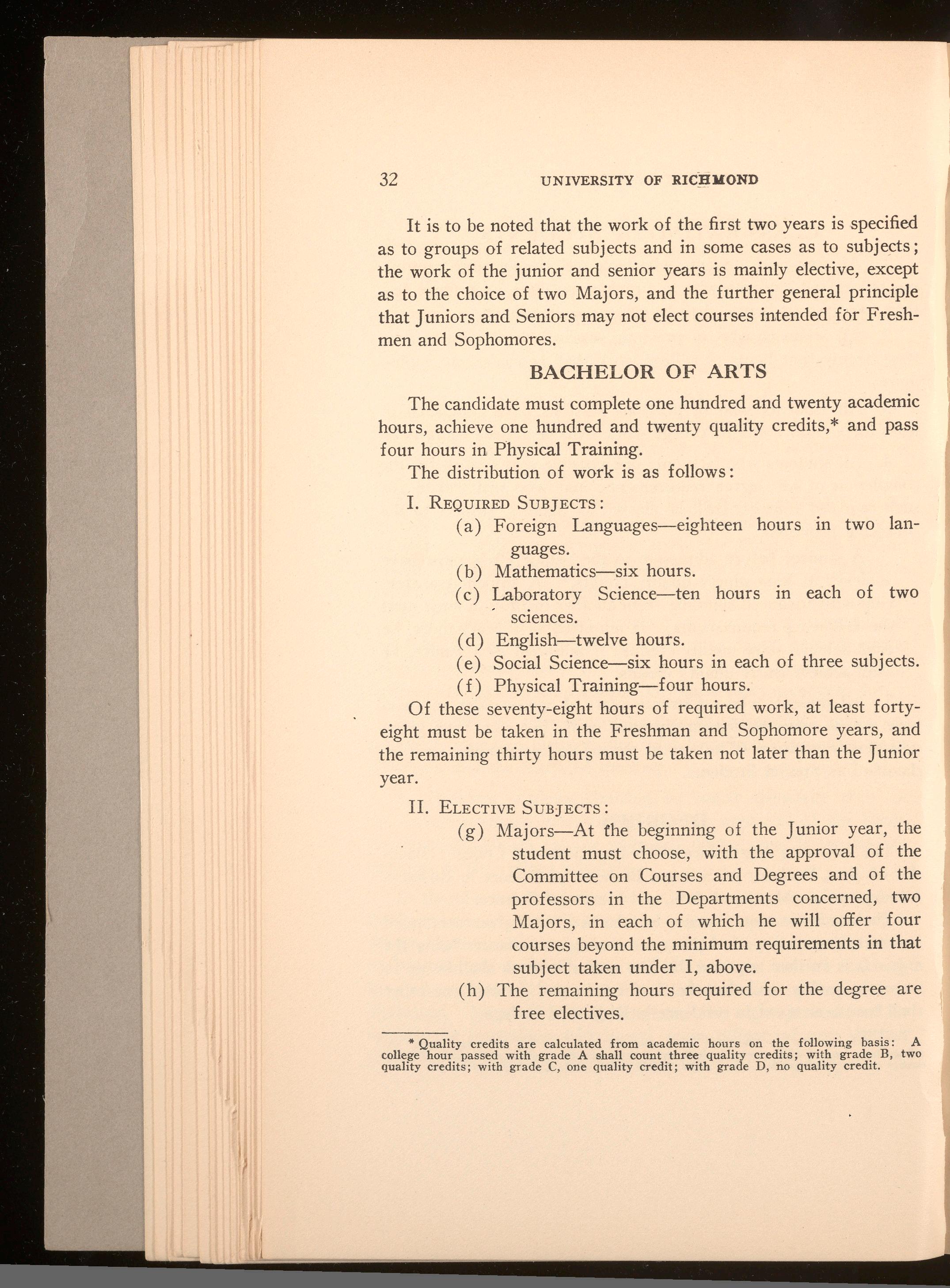
It is to be noted that the work of the first two years is specified as to groups of related subjects and in some cases as to subjects; the work of the junior and senior years is mainly elective, except as to the choice of two Majors, and the further general principle that Juniors and Seniors may not elect courses intended for Freshmen and Sophomores.
The candidate must complete one hundred and twenty academic hours, achieve one hundred and twenty quality credits,* and pass four hours in Physical Training.
The distribution of work is as follows:
I. REQUIRED SUBJECTS:
(a) Foreign Languages-eighteen hours m two languages.
( b) Mathematics-six hours.
( c) Laboratory Science-ten hours m each of two sciences.
( d) English-twelve hours.
( e) Social Science-six hours in each of three subjects.
(f) Physical Training-four hours.
Of these seventy-eight hours of required work, at least fortyeight must be taken in the Freshman and Sophomore years, and the remaining thirty hours must be taken not later than the Junior year.
II. ELECTIVE SUBJECTS:
(g) Majors-At the beginning of the Junior year, the student must choose, with the approval of the Committee on Courses and Degrees and of the professors in the Departments concerned, two Majors, in each of which he will offer four courses beyond the minimum requirements in that subject taken under I, above.
(h) The remaining hours required for the degree are free electives.
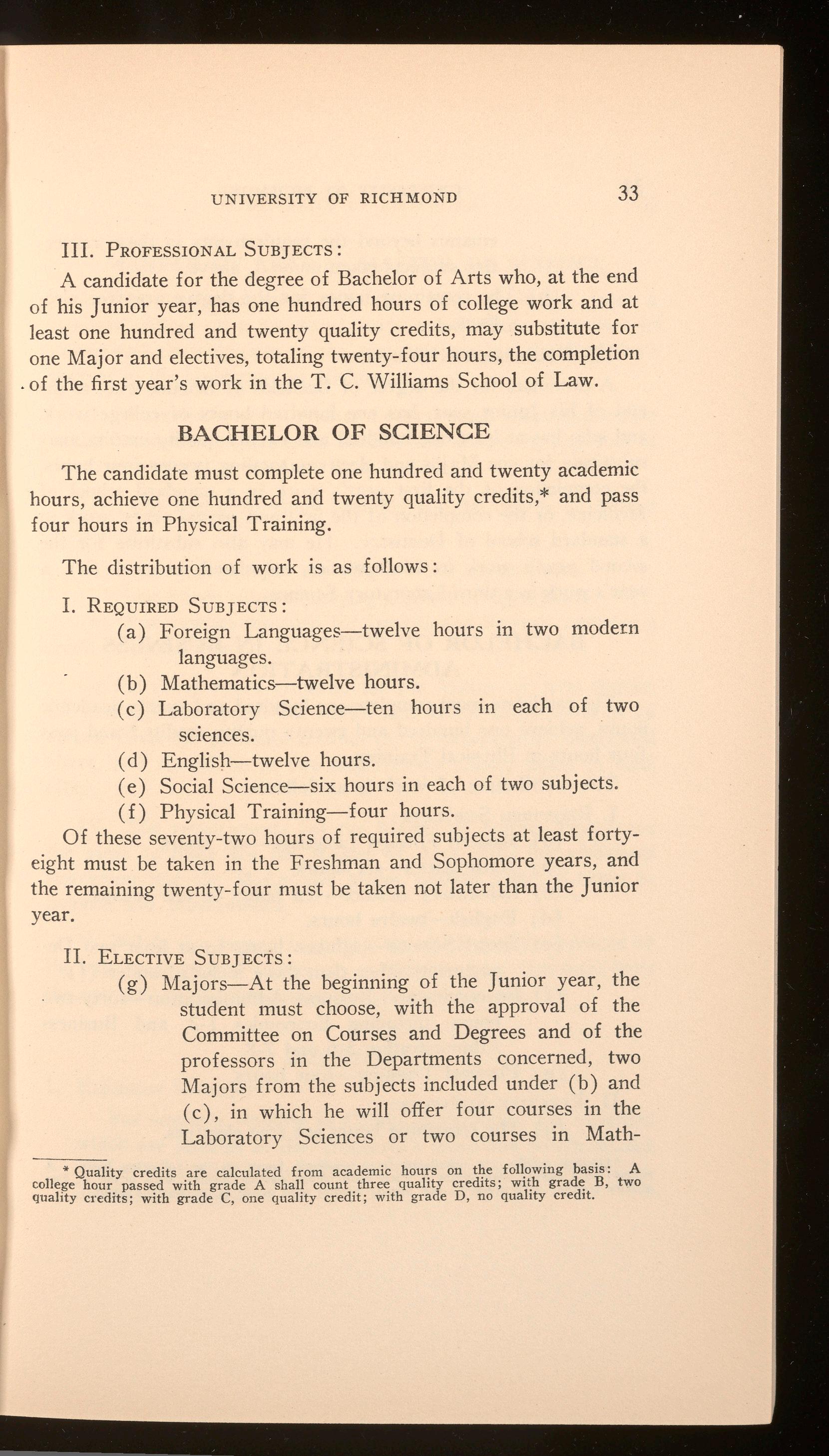
III. PROFESSIONAL SUBJECTS:
A candidate for the degree of Bachelor of Arts who, at the end of his Junior year, has one hundred hours of college work and at least one hundred and twenty quality credits, may substitute for one Major and electives, totaling twenty-four hours, the completion . of the first year's work in the T. C. Williams School of Law.
The candidate must complete one hundred and twenty academic hours, achieve one hundred and twenty quality credits,* and pass four hours in Physical Training.
The distribution of work 1s as follows:
I. REQUIRED SUBJECTS:
(a) Foreign Languages-twelve hours m two modern languages.
(b) Mathematics-twelve hours.
(
c) Laboratory Science-ten hours m each of two sciences.
( d) English-twelve hours.
( e) Social Science-six hours in each of two subjects.
(f) Physical Training-four hours.
Of these seventy-two hours of required subjects at least fortyeight must be taken in the Freshman and Sophomore years, and the remaining twenty-four must be taken not later than the Junior year.
II. ELECTIVE SUBJECTS:
(g) Majors-At the beginning of the Junior year, the student must choose, with the approval of the Committee on Courses and Degrees and of the professors in the Departments concerned, two Majors from the subjects included under (b) and ( c), in which he will offer four courses in the Laboratory Sciences or two courses in Math-
* Quality credits are calculated from academic hours on the following basis: A colle!l'e hour passed with grade A shall count three quality credits; with grade B, two quality credits; with grade C, one quality credit; with grade D, no quality credit.
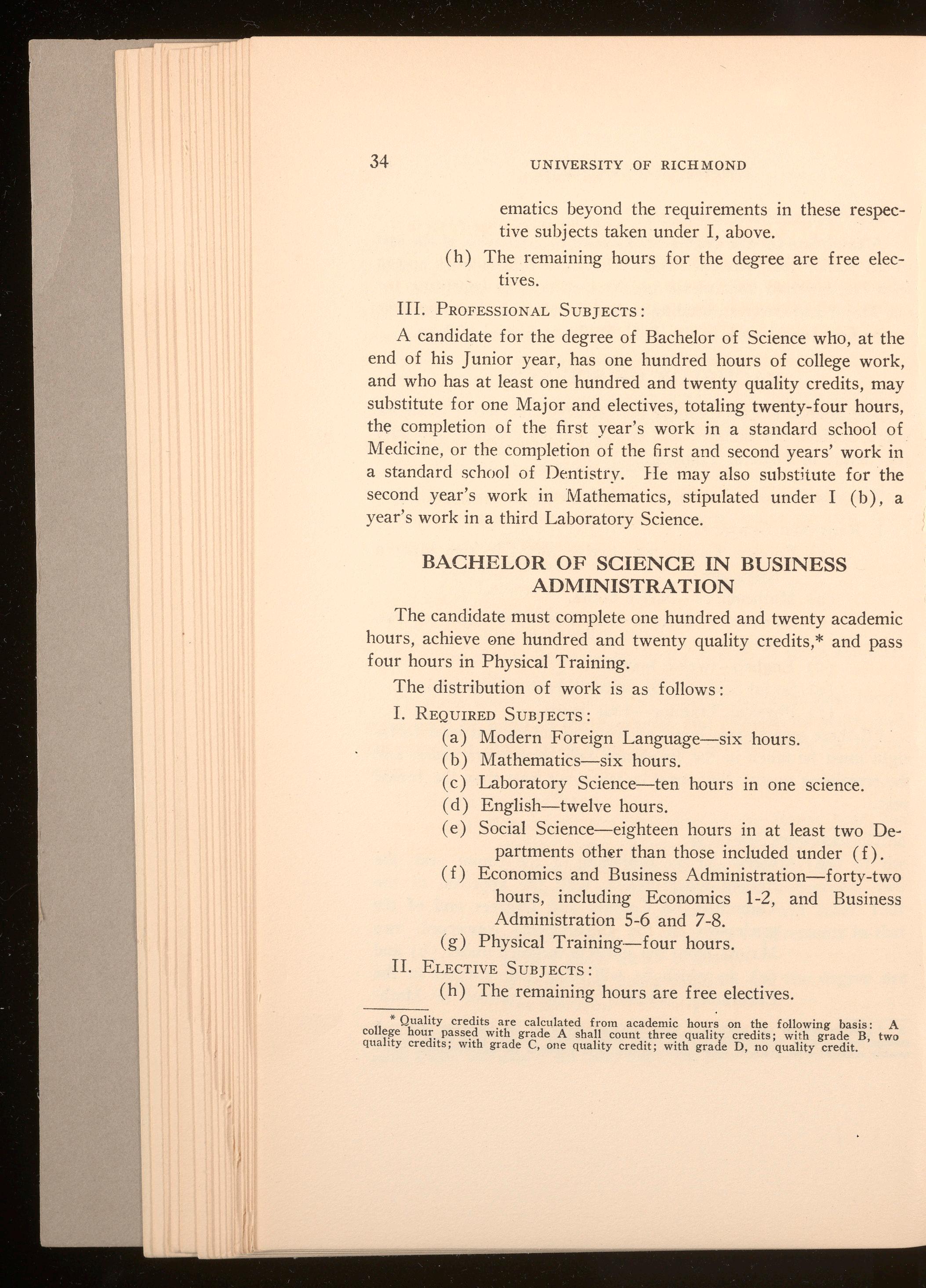
UNIVERSITY OF RICHMOND
ematics beyond the requirements in these respective subjects taken under I, above.
(h) The remaining hours for the degree are free electives.
A candidate for the degree of Bachelor of Science who, at the end of his Junior year, has one hundred hours of college work, and who has at least one hundred and twenty quality credits, may suhstitute for one Major and electives, totaling twenty-four hours, the completion of the first year's work in a standard school of Medicine, or the completion of the first and second years' work in a standard school of Dentistry. He may also substitute for the second year's work in Mathematics, stipulated under I (b), a year's work in a third Laboratory Science.
The candidate must complete one hundred and twenty academic hours, achieve 0ne hundred and twenty quality credits,* and pass four hours in Physical Training.
The distribution of work is as follows :
I. REQUIRED SUBJECTS:
(a) Modern Foreign Language-six hours.
(b) Mathematics-six hours.
( c) Laboratory Science-ten hours in one science.
( d) English-twelve hours.
( e) Social Science-eighteen hours in at least two Departments oth€r than those included under ( f).
( f) Economics and Business Administration-forty-two hours, including Economics 1-2, and Business Administration 5-6 and 7-8.
(g) Physical Training-four hours.
II. ELECTIVE SUBJECTS:
(h) The remaining hours are free electives.
* Quality credits are calculated from academic hours on the following basis: A colleire hour passed with grade A shall count three quality credits; with grade B , two quality credits; with grade C, one quality credit; with grade D, no quality credit.
I. The candidate must previously have graduated from a standard college on a course of study substantially equivalent in extent and thoroughness to the requirements for the Bachelor's degrees in the University of Richmond.
II. A candidate for a graduate degree must make application to the Committee on Graduate Studies and secure the approval of this committee to be admitted as a student.
III. The course of study required for the degree of Master of Arts is:
( a) One major subject carrying a credit of ten hour s .
( b) One minor subject carrying a credit of eight hours.
( c) Two courses intended for Juniors and Seniors, carrying a credit of twelve hours.
Of the thirty hours required for the Master of Arts degree, the ·first eighteen hours-the Major and Minor subjects-must be chosen from the graduate courses in the departments mentioned above, and should be in two departments closely allied to each other
IV. The requirements for the Master of Science degree are the same as those for the Master of Arts, with the additional restriction that the Major and Minor courses must be taken in Science and Mathematics.
V. While due regard is paid to the needs and preferences of tlie individual student, the course of study in every case must have the approval of the Committee on Graduate Studies.
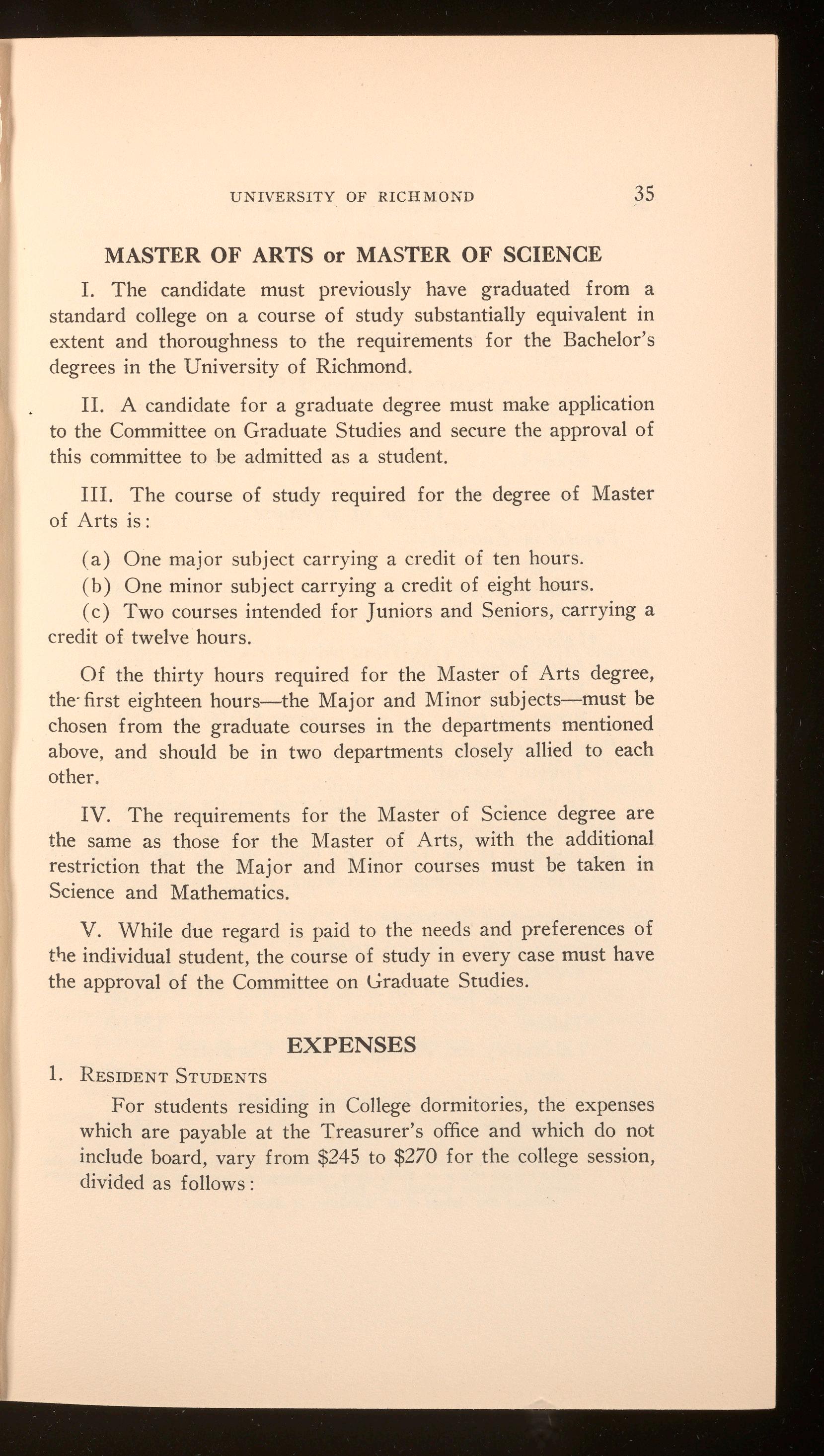
1.
For students residing in College dormitories, the expenses which are payable at the Treasurer's office and which do not include board, vary from $245 to $270 for the college session, divided as follows :
(Advanced Chemistry, $15.00)
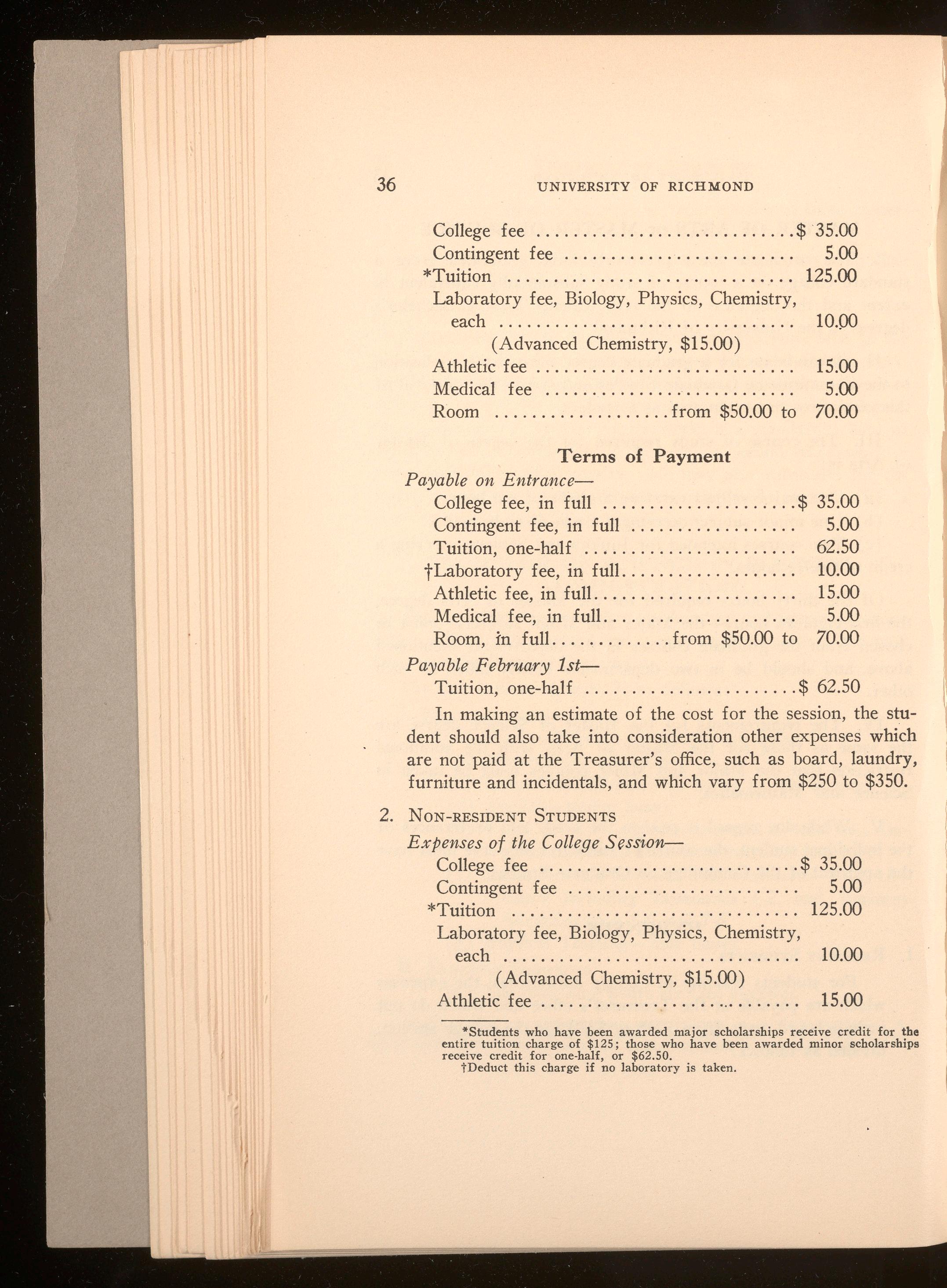
In making an estimate of the cost for the session, the student should also take into consideration other expenses which are not paid at the Treasurer's office, such as board, laundry, furniture and incidentals, and which vary from $250 to $350.
Expenses of the College SessionCollege
(Advanced Chemistry , $15.00) Athletic fee
15.00
*Students who have been awarded major scholarships receive credit for the entire tuition charge of $125; those who have been awarded minor scholarships receive credit for one-half, or $62.50. t Deduct this charge if no laboratory is taken.
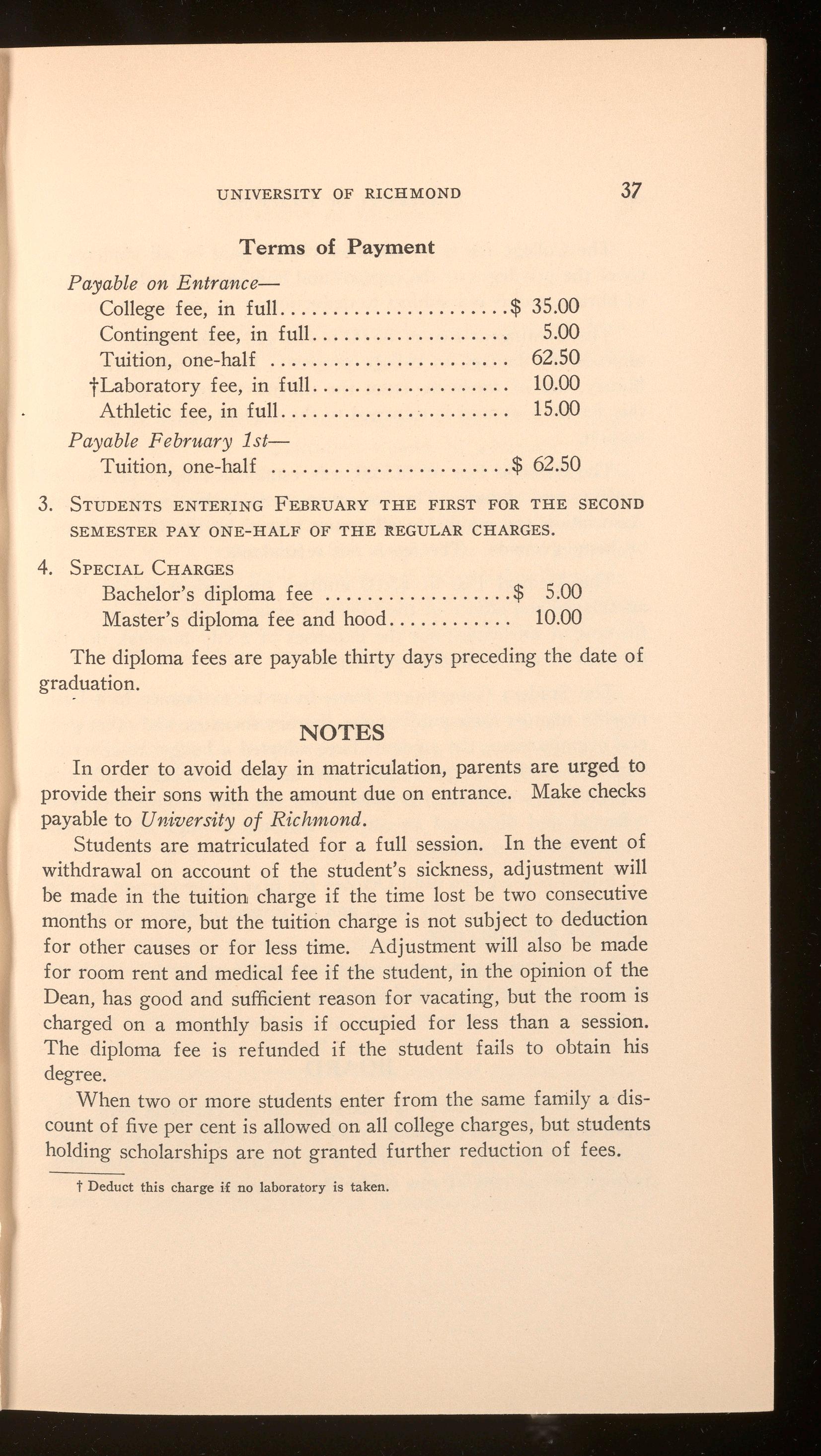
Payable on EntranceCollege fee, in full ...................... $ 35.00
Contingent fee, in full.
t Laboratory fee, in full.
Payable February 1st-
3. STUDENTS ENTERING FEBRUARY THE FIRST FOR THE SECOND SEMESTER PAY ONE-HALF OF THE J.tEGULAR CHARGES. 4. SPECIAL CHARGES
The diploma fees are payable thirty days preceding the date of graduation.
In order to avoid delay in matriculation, parents are urged to provide their sons with the amount due on entrance. Make checks payable to University of Richmond.
Students are matriculated for a full session. In the event of withdrawal on account of the student's sickness, adjustment will be made in the tuition charge if the time lost be two consecutive months or more, but the tuition charge is not subject to deduction for other causes or for less time. Adjustment will also be made for room rent and medical fee if the student, in the opinion of the Dean, has good and sufficient reason for vacating, but the room is charged on a monthly basis if occupied for less than a session. The diploma fee is refunded if the student fails to obtain his degree.
When two or more students enter from the same family a discount of five per cent is allowed on all college charges, but students holding scholarships are not granted further reduction of fees.
t Deduct this charge if no laboratory is taken.
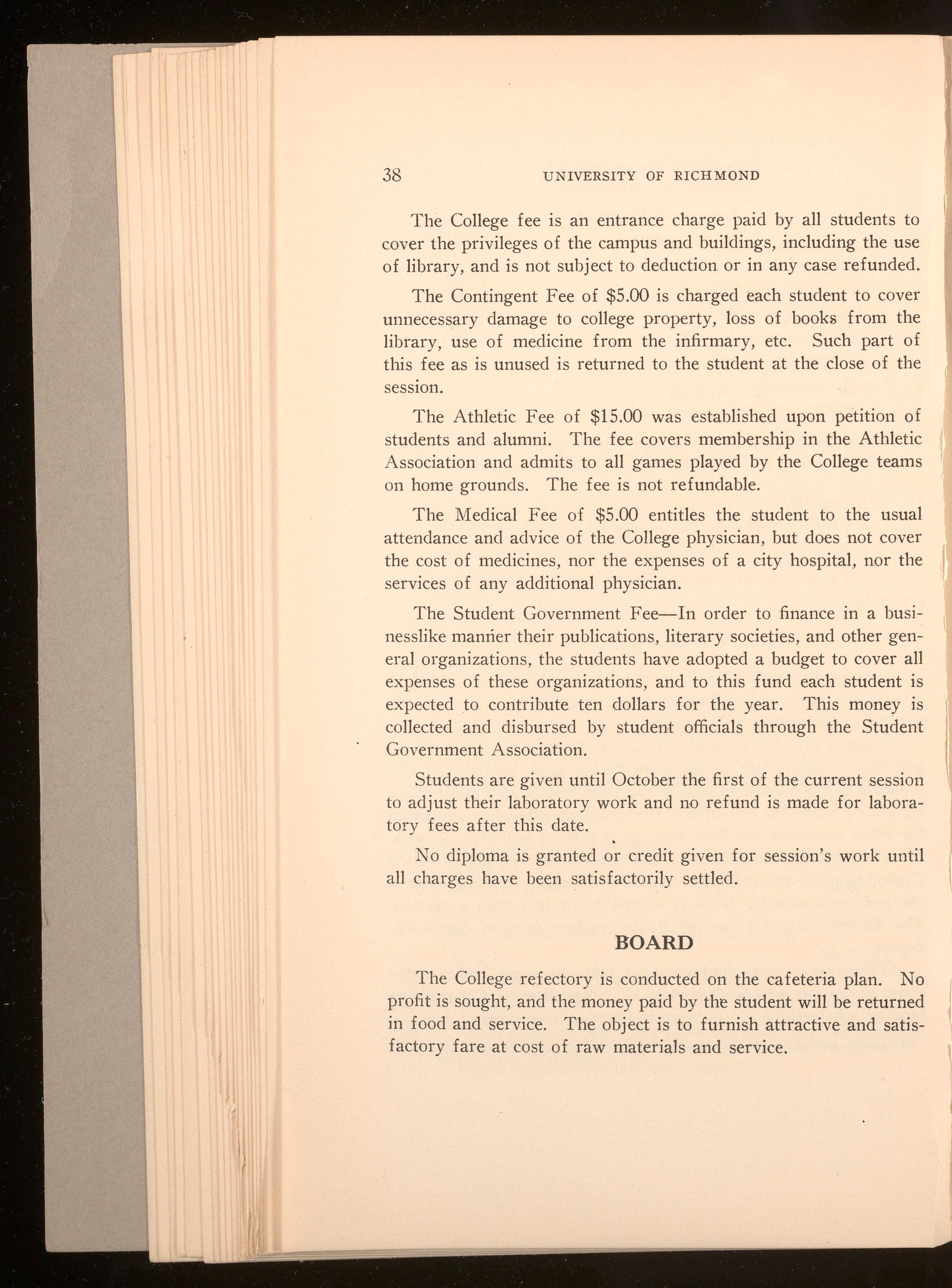
The College fee is an entrance charge paid by all students to cover the privileges of the campus and buildings, including the use of library, and is not subject to deduction or in any case refunded.
The Contingent Fee of $5.00 is charged each student to cover unnecessary damage to college property, loss of books from the library, use of medicine from the infirmary, etc. Such part of this fee as is unused is returned to the student at the close of the sess10n.
The Athletic Fee of $15.00 was established upon petition of students and alumni. The fee covers membership in the Athletic Association and admits to all games played by the College teams on home grounds. The fee is not refundable.
The Medical Fee of $5.00 entitles the student to the usual attendance and advice of the College physician, but does not cover the cost of medicines, nor the expenses of a city hospital, nor the services of any additional physician.
The Student Government Fee-In order to finance in a businesslike manrier their publications, literary societies, and other general organizations, the students have adopted a budget to cover all expenses of these organizations, and to this fund each student is expected to contribute ten dollars for the year. This money is collected and disbursed by student officials through the Student Government Association.
Students are given until October the first of the current session to adjust their laboratory work and no refund is made for laboratory fees after this elate.
No diploma is granted or credit given for session's work until all charges have been satisfactorily settled.
The College refectory is concluctecl on the cafeteria plan. No profit is sought, and the money paid by the student will be returned in food and service. The object is to furnish attractive and satisfactory fare at cost of raw materials and service.
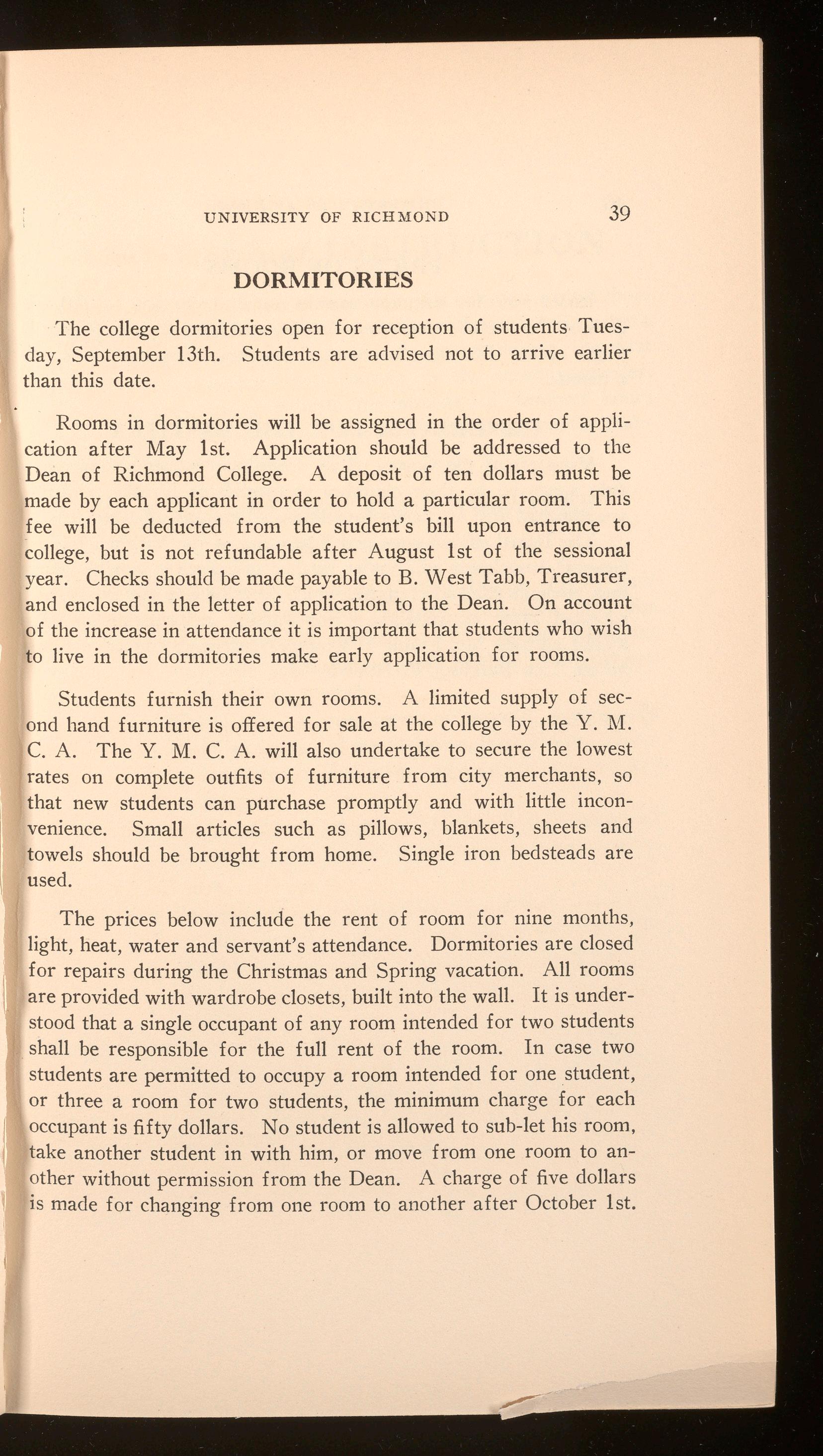
The college dormitories open for reception of students Tuesday, September 13th. Students are advised not to arrive earlier than this date.
Rooms in dormitories will be assigned in the order of application after May 1st. Application should be addressed to the Dean of Richmond College. A deposit of ten dollars must be made by each applicant in order to hold a particular room. This fee will be deducted from the student's bill upon entrance to college, but is not refundable after August 1st of the sessional year. Checks should be made payable to B. West Tabb, Treasurer, and enclosed in the letter of application to the Dean. On account of the increase in attendance it is important that students who wish to live in the dormitories make early application for rooms.
Students furnish their own rooms. A limited supply of second hand furniture is offered for sale at the college by the Y. M. C. A. The Y. M. C. A. will also undertake to secure the lowest rates on complete outfits of furniture from city merchants, so that new students can purchase promptly and with little inconvenience. Small articles such as pillows, blankets, sheets and towels should be brought from home. Single iron bedsteads are used.
The prices below include the rent of room for nine months, light, heat, water and servant's attendance. Dormitories are closed for repairs during the Christmas and Spring vacation. All rooms are provided with wardrobe closets, built into the wall. It is understood that a single occupant of any room intended for two students shall be responsible for the full rent of the room. In case two students are permitted to occupy a room intended for one student, or three a room for two students, the minimum charge for each occupant is fifty dollars. No student is allowed to sub-let his room, take another student in with him, or move from one room to another without permission from the Dean. A charge of five dollars is made for changing from one room to another after October 1st.
Room rent for the nine months varies from $50 to $60 for each of the two occupants in a double, and from $50 to $70 for a single room. For time less than a full session, room r.ent is $10 a month.
Ministers of the Gospel of all denominations, and young men duly approved by their churches as candidates for the ministry , are admitted free of charge for tuition. They pay all other fees. The Board of Missions and Education of the Virginia Baptis \ General Association will render further assistance to worthy younq ~• men recommended by churches which contribute to the Board, and accepted after examination. For further information on this matter address Mr. Frank T. Crump, Secretary, Education Committee, Law Building, Richmond, Va.
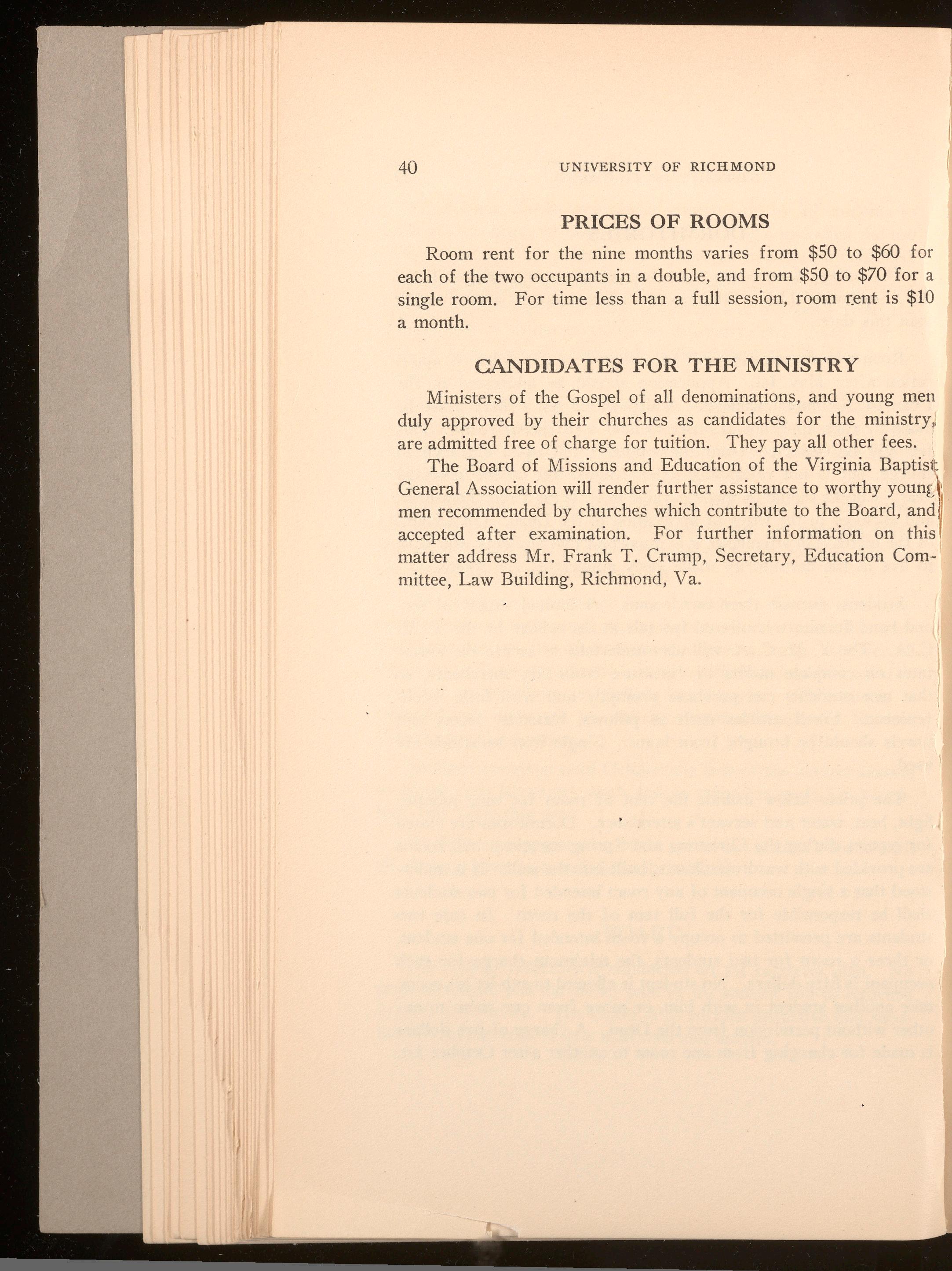
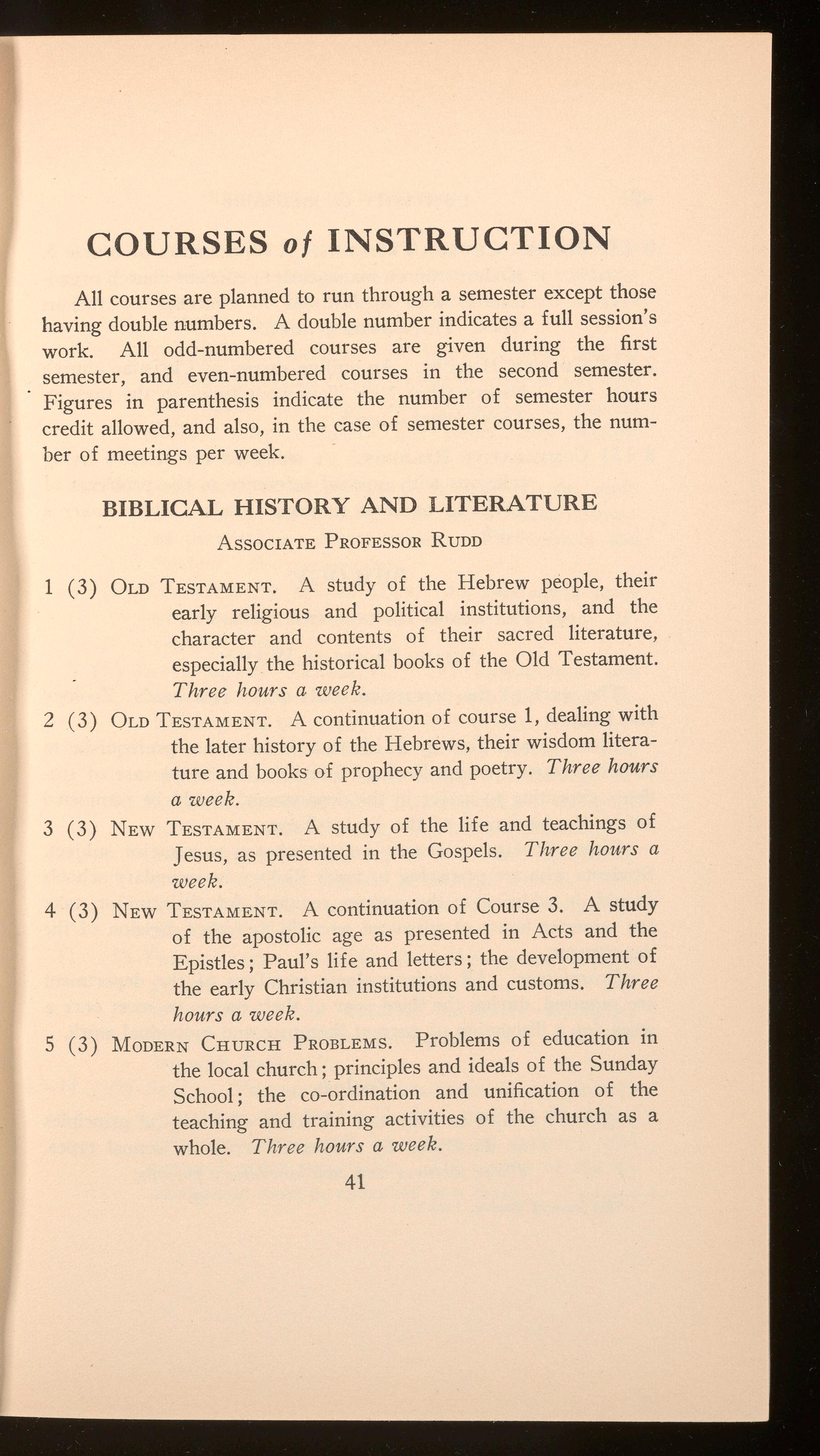
All courses are planned to run through a semester except those having double numbers. A double number indicates a full session's work. All odd-numbered courses are given during the first semester, and even-numbered courses in the second semester. Figures in parenthesis indicate the number of semester hours credit allowed, and also, in the case of semester courses, the number of meetings per week.
1 (3) Ow TESTAMENT. A study of the Hebrew people, their early religious and political institutions, and the character and contents of their sacred literature, especially the historical books of the Old Testament. Three hours a week.
2 (3) Ow TESTAMENT. A continuation of course 1, dealing with the later history of the Hebrews, their wisdom literature and books of prophecy and poetry. Three hours a week.
3 (3) NEw TESTAMENT. A study of the life and teachings of Jesus, as presented in the Gospels. Three hours a week.
4 (3) NEW TESTAMENT. A continuation of Course 3. A study of the apostolic age as presented in Acts and the Epistles; Paul's life and letters; the development of the early Christian institutions and customs. Three hours a week.
5 ( 3) MODERNCHURCH PROBLEMS. Problems of education in the local church; principles and ideals of the Sunday School; the co-ordination and unification of the teaching and training activities of the church as a whole. Three hours a week.
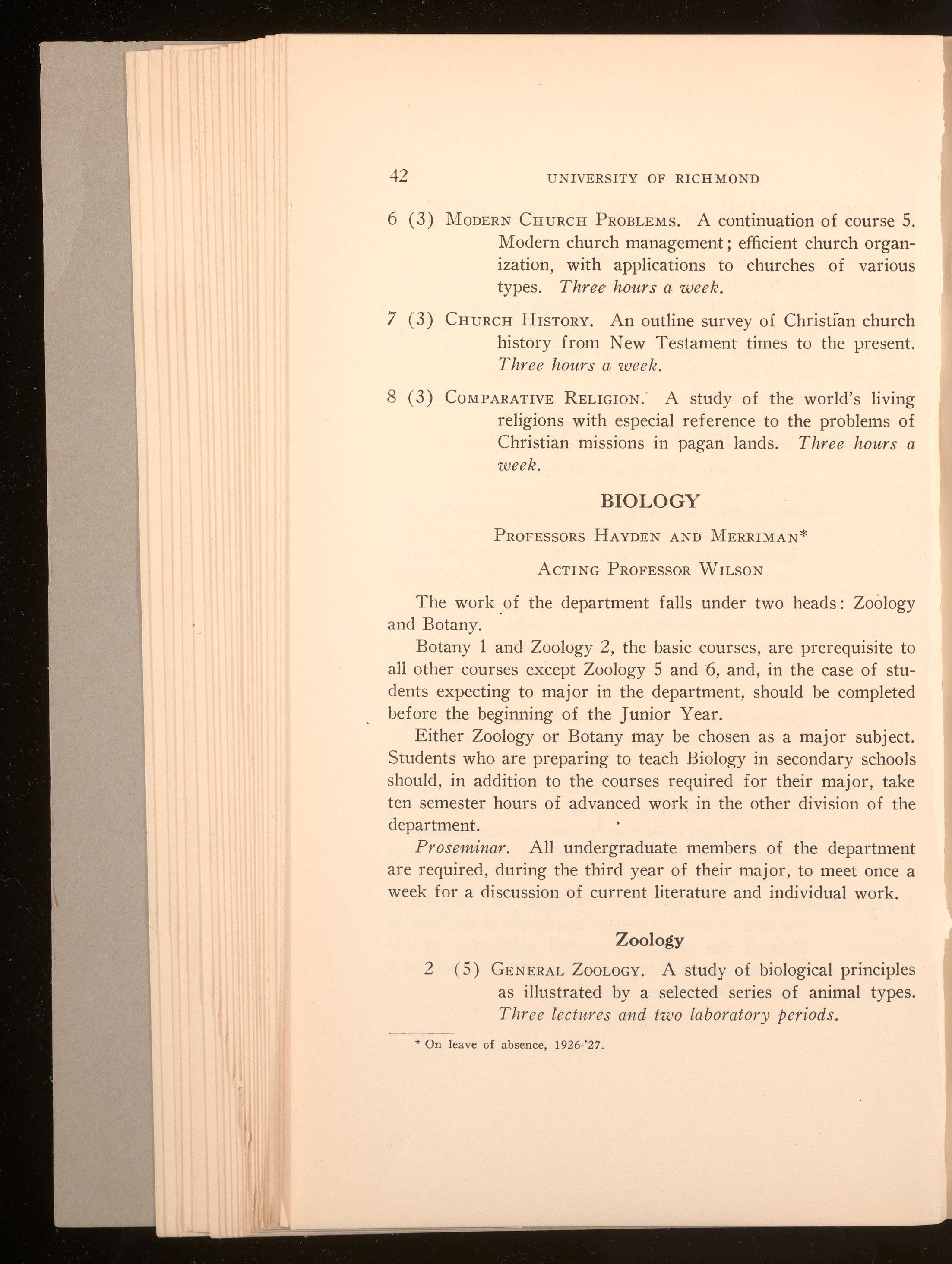
6 ( 3) MODERNCHURCH PROBLEMS. A continuation of course 5. Modern church management; efficient church organization, with applications to churches of various types. Three hours a week.
7 ( 3) CHURCH HISTORY. An outline survey of Christian church history from New Testament times to the present. Three hours a week.
8 (3) COMPARATIVERELIGION. A study of the world's living religions with especial reference to the problems of Christian missions in pagan lands. Three hours a week.
PROFESSORSHAYDEN AND MERRIMAN*
ACTING PROFESSORWILSON
The work of the department falls under two heads : Zoology and Botany.
Botany 1 and Zoology 2, the basic courses, are prerequisite to all other courses except Zoology 5 and 6, and, in the case of students expecting to major in the department, should be completed before the beginning of the Junior Year.
Either Zoology or Botany may be chosen as a major subject. Students who are preparing to teach Biology in secondary schools should, in addition to the courses required for their major, take ten semester hours of advanced work in the other division of the department.
Proseniinar. All undergraduate members of the department are required, during the third year of their major, to meet once a week for a discussion of current literature and individual work.
2 ( 5) GENERALZoo LOGY. A study of biological principles as illustrated by a selected series of animal types. Three lectures and two laboratory periods.
• On leave of absence, l 926-'27.
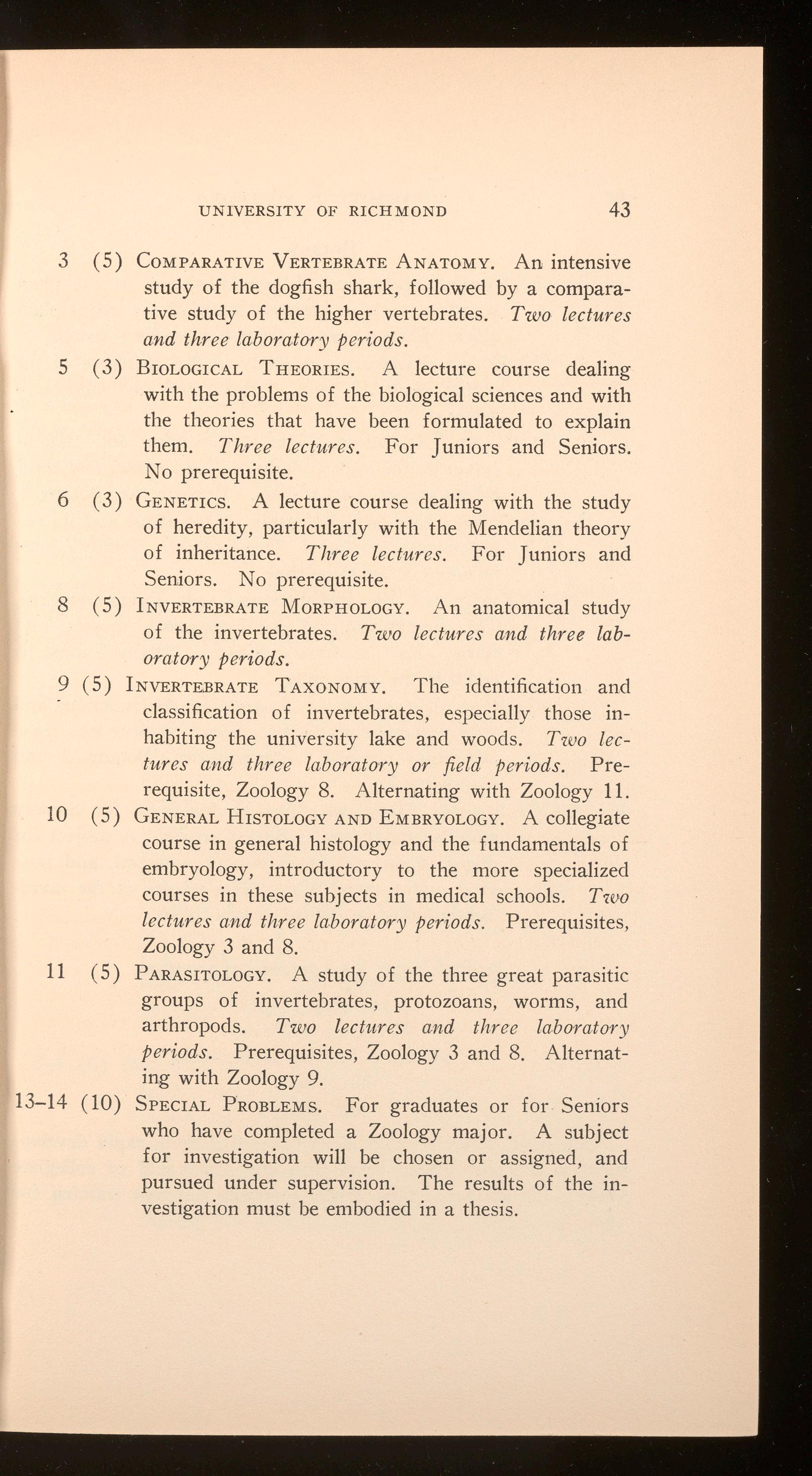
3 (5) COMPARATIVEVERTEBRATEANATOMY. An intensive study of the dogfish shark, followed by a comparative study of the higher vertebrates. Two lectures and three laboratory periods.
5 ( 3) BIOLOGICALTHEORIES. A lecture course dealing with the problems of the biological sciences and with the theories that have been formulated to explain them. Three lectures. For Juniors and Seniors. No prerequisite.
6 ( 3) GENETICS. A lecture course dealing with the study of heredity, particularly with the Mendelian theory of inheritance. Three lectures. For Juniors and Seniors. No prerequisite.
8 (5) INVERTEBRATEMORPHOLOGY . An anatomical study of the invertebrates. Two lectures and three laboratory periods.
9 ( 5) INVERTEBRATETAXONOMY. The identification and classification of invertebrates, especially those inhabiting the university lake and woods. Two lectures and three laboratory or field periods. Prerequisite, Zoology 8. Alternating with Zoology 11.
10 (5) GENERALHISTOLOGYANDEMBRYOLOGY.A collegiate course in general histology and the fundamentals of embryology, introductory to the more specialized courses in these subjects in medical schools. Two lectures and three laboratory periods. Prerequisites, Zoology 3 and 8.
11 ( 5) PARASITOLOGY.A study of the three great parasitic groups of invertebrates, protozoans, worms, and arthropods. Two lectures and three laboratory periods. Prerequisites, Zoology 3 and 8. Alternating with Zoology 9. 13-14 ( 10) SPECIAL PROBLEMS. For graduates or for Seniors who have completed a Zoology major. A subject for investigation will be chosen or assigned, and pursued under supervision. The results of the investigation must be embodied in a thesis.
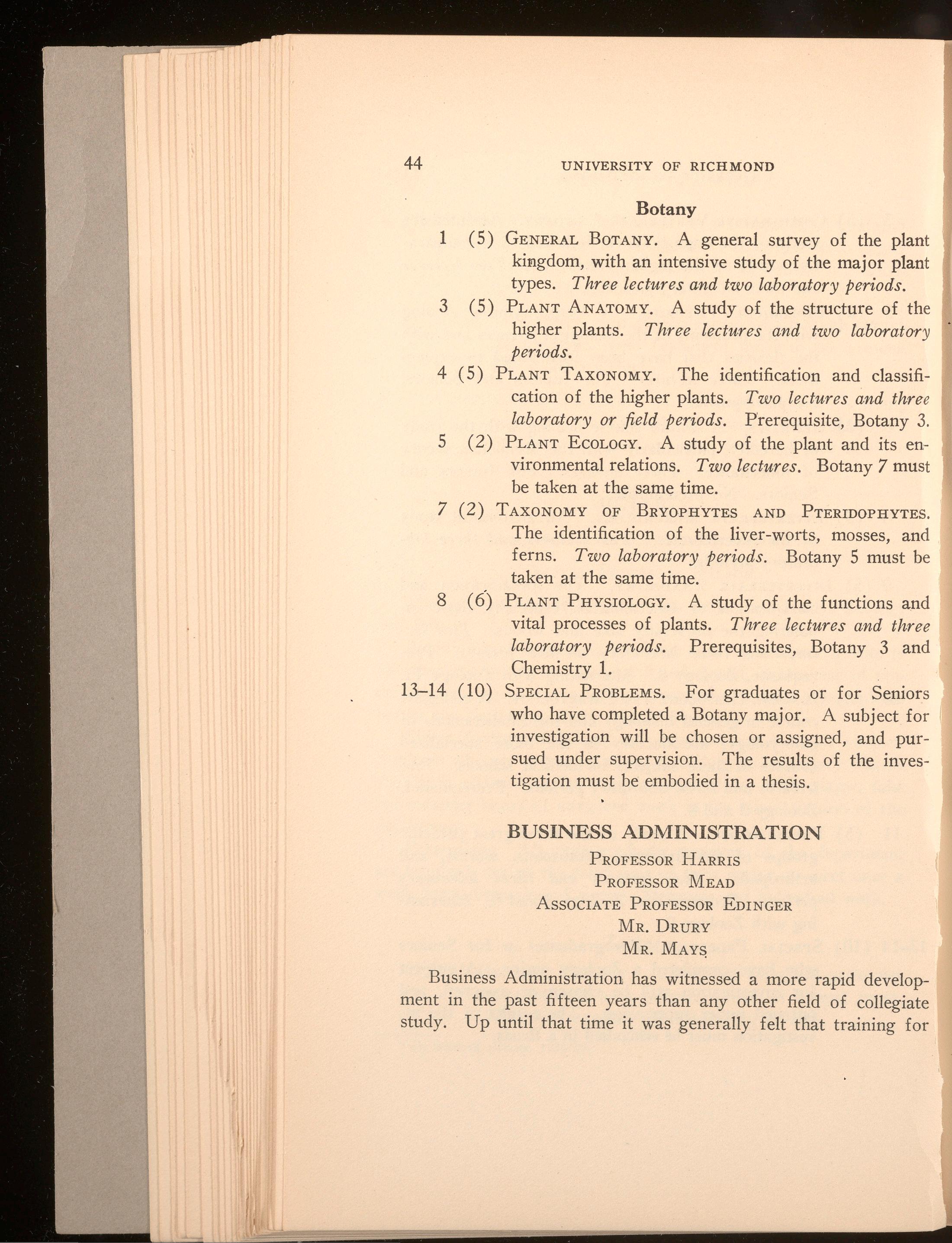
1 ( 5) GENERAL BoTANY. A general survey of the plant kingdom, with an intensive study of the major plant types. Three lectures and two laboratory periods.
3 ( 5) PLANT ANATOMY. A study of the structure of the higher plants. Three lectures and two laboratory periods.
4 ( 5) PLANT TAXONOMY. The identification and classification of the higher plants. Two lectures and thre e laboratory or field periods. Prerequisite, Botany 3.
5 (2) PLANT EcoLOGY. A study of the plant and its environmental relations. Two lectures. Botany 7 must be taken at the same time.
7 (2) TAXONOMY OF BRYOPHYTES AND PTERIDOPHYTES. The identification of the liver-worts, mosses, and ferns. Two laboratory periods. Botany 5 must be taken at the same time.
8 (6) PLANT PHYSIOLOGY. A study of the functions and vital processes of plants. Three lectures and three laboratory periods. Prerequisites, Botany 3 and Chemistry 1.
13-14 (10) SPECIAL PROBLEMS. For graduates or for Seniors who have completed a Botany major. A subject for investigation will be chosen or assigned, and pursued under supervision. The results of the investigation must be embodied in a thesis.
PROFESSORHARRIS
PROFESSORMEAD
ASSOCIATEPROFESSOREDINGER
MR. DRURY
MR. MAY~
Business Administration has witnessed a more rapid development in the past fifteen years than any other field of collegiate study. Up until that time it was generally felt that training for
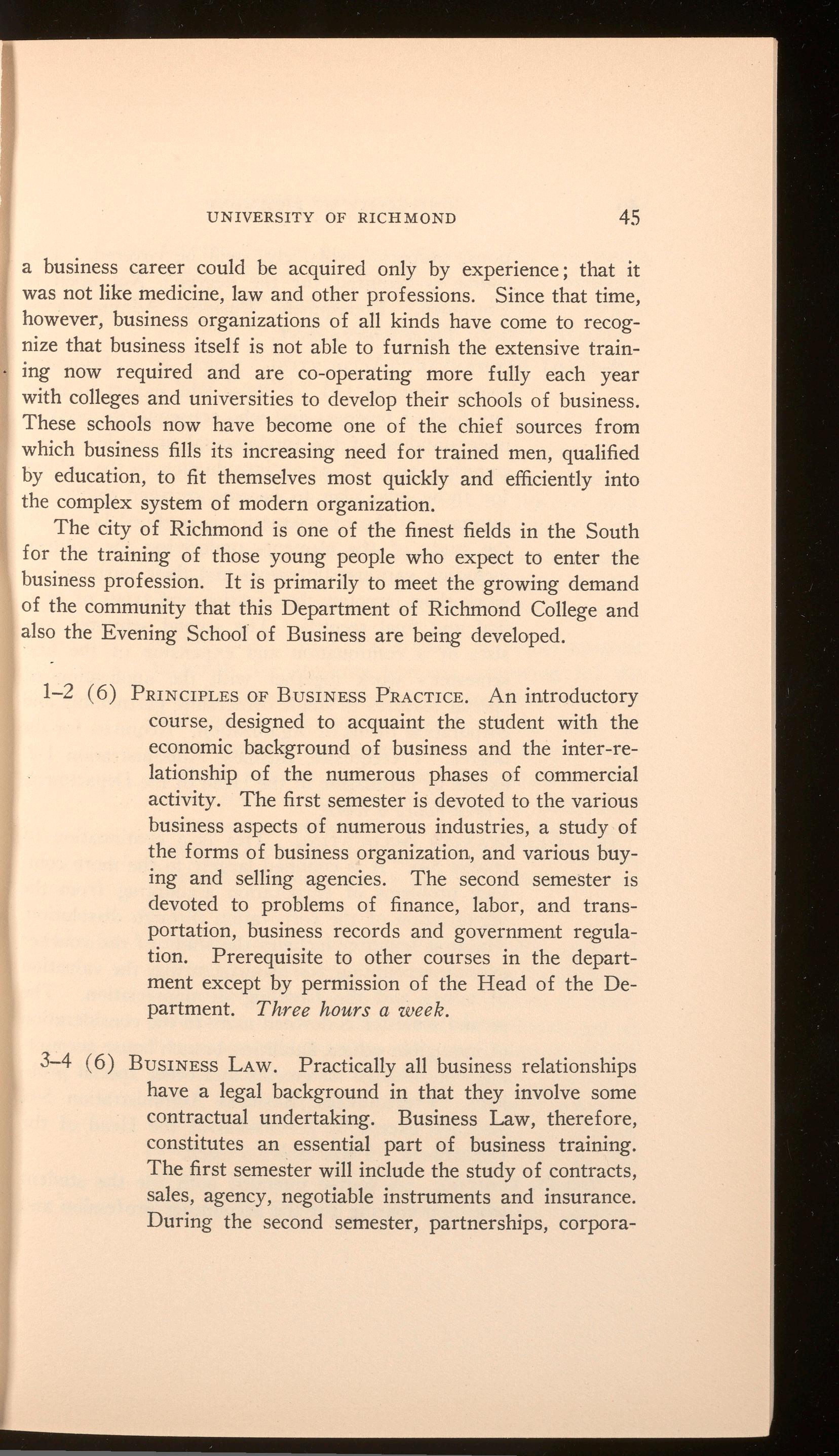
a business career could be acquired only by experience; that it was not like medicine, law and other professions. Since that time, however, business organizations of all kinds have come to recognize that business itself is not able to furnish the extensive training now required and are co-operating more fully each year with colleges and universities to develop their schools of business. These schools now have become one of the chief sources from which business fills its increasing need for trained men, qualified by education, to fit themselves most quickly and efficiently into the complex system of modern organization.
The city of Richmond is one of the finest fields in the South for the training of those young people who expect to enter the business profession. It is primarily to meet the growing demand of the community that this Department of Richmond College and also the Evening School of Business are being developed.
1-2 (6) PRINCIPLESOF BusINEss PRACTICE. An introductory course, designed to acquaint the student with the economic background of business and the inter-relationship of the numerous phases of commercial activity. The first semester is devoted to the various business aspects of numerous industries, a study of the forms of business organization, and various buying and selling agencies. The second semester is devoted to problems of finance, labor, and transportation, business records and government regulation. Prerequisite to other courses in the department except by permission of the Head of the Department. Three hours a week.
3-4 ( 6) BusINESS LAw. Practically all business relationships have a legal background in that they involve some contractual undertaking. Business Law, therefore, constitutes an essential part of business training. The first semester will include the study of contracts, sales, agency, negotiable instruments and insurance. During the second semester, partnerships, corpora-
tions , property , wills, etc., will be covered. Thi s course is required for the degree. Not open t o Freshmen. Prerequisite, Business Administration 1-2. Three hours a week.
5-6 (6) ELEMENTARYAccouNTING, which is a beginnin g course intended ( 1) for those who expect to enter any field of business and who consequently need an understanding of the fundamental principles of accounting, and (2) as an introduction to the subject for those who plan to become certified public accountants. The first semester is confined largely to the study of the elements underlying the subject , including various statements and their purpose, the work sheet, account classification and types of original and final records. The second semester consists of a continuation and expansion of the first semester's work together with the application of special features to single ownership, partnership and corporation forms of organization . Required for the degree. Prerequisite, Business Administration 1-2 , except by permission of the Head of the Department . Three hours a week. 1
7-8 (6) ADVANCEDAccouNTING. This is a continuation o f course 5-6. It is confined largely to the more complex problems of corporation accounting from the organization of the corporation through dissolution . The first semester includes the study of the voucher system, acqmnting for manufacturing, the valuatio n of assets and the handling of depreciation. The second semester is devoted more to the consideration 1 of intangible values, liabilities, branch house accounting, consolidated statements and other special problems. Prerequisites, Business Administration 5-6 , also 3-4, except by permission of the Head of the ) Department. Three hou,rs a week.
9 ( 3) AUDITING. A course intended both for the student \ who is preparing for the accounting profession and
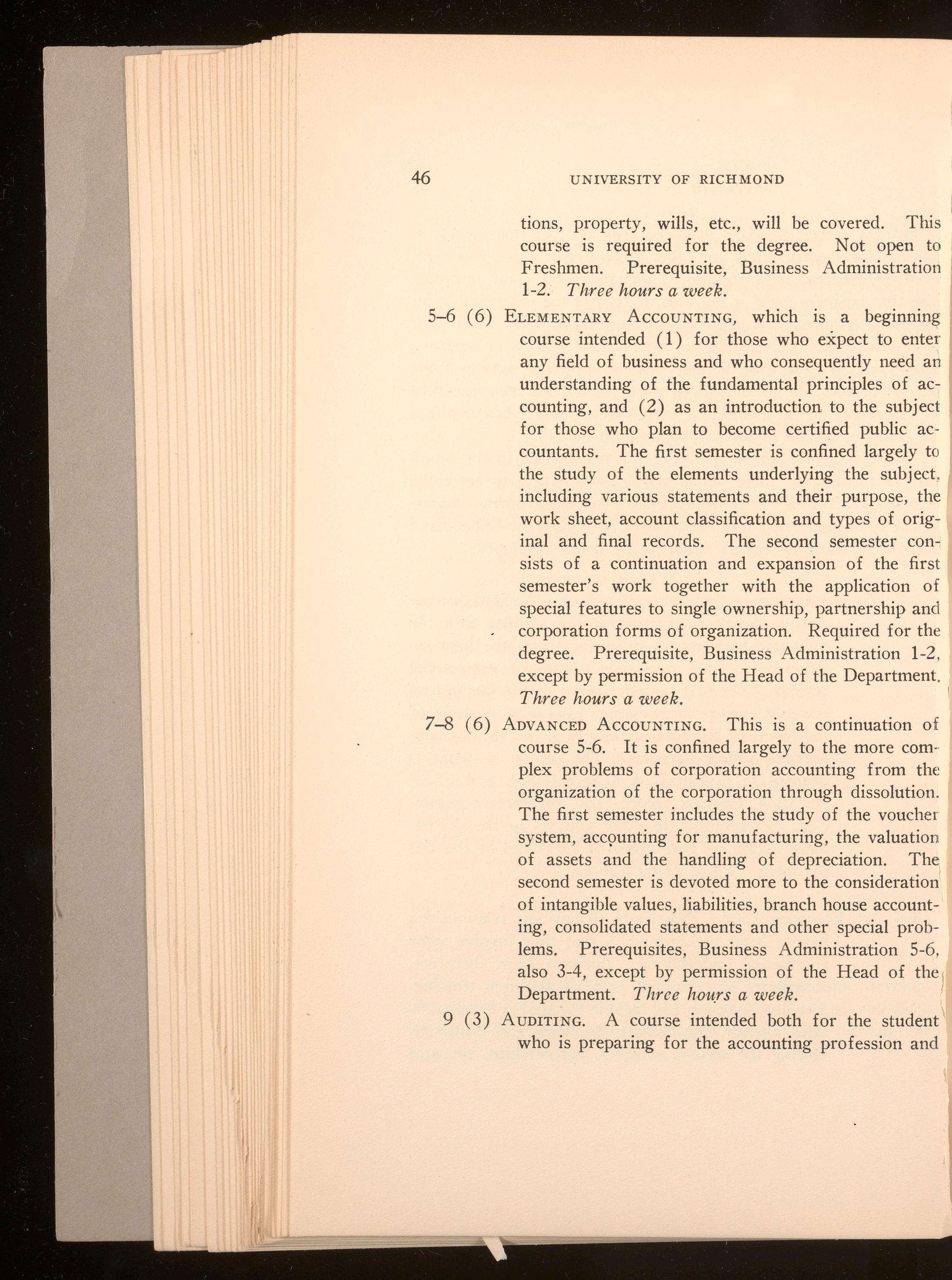
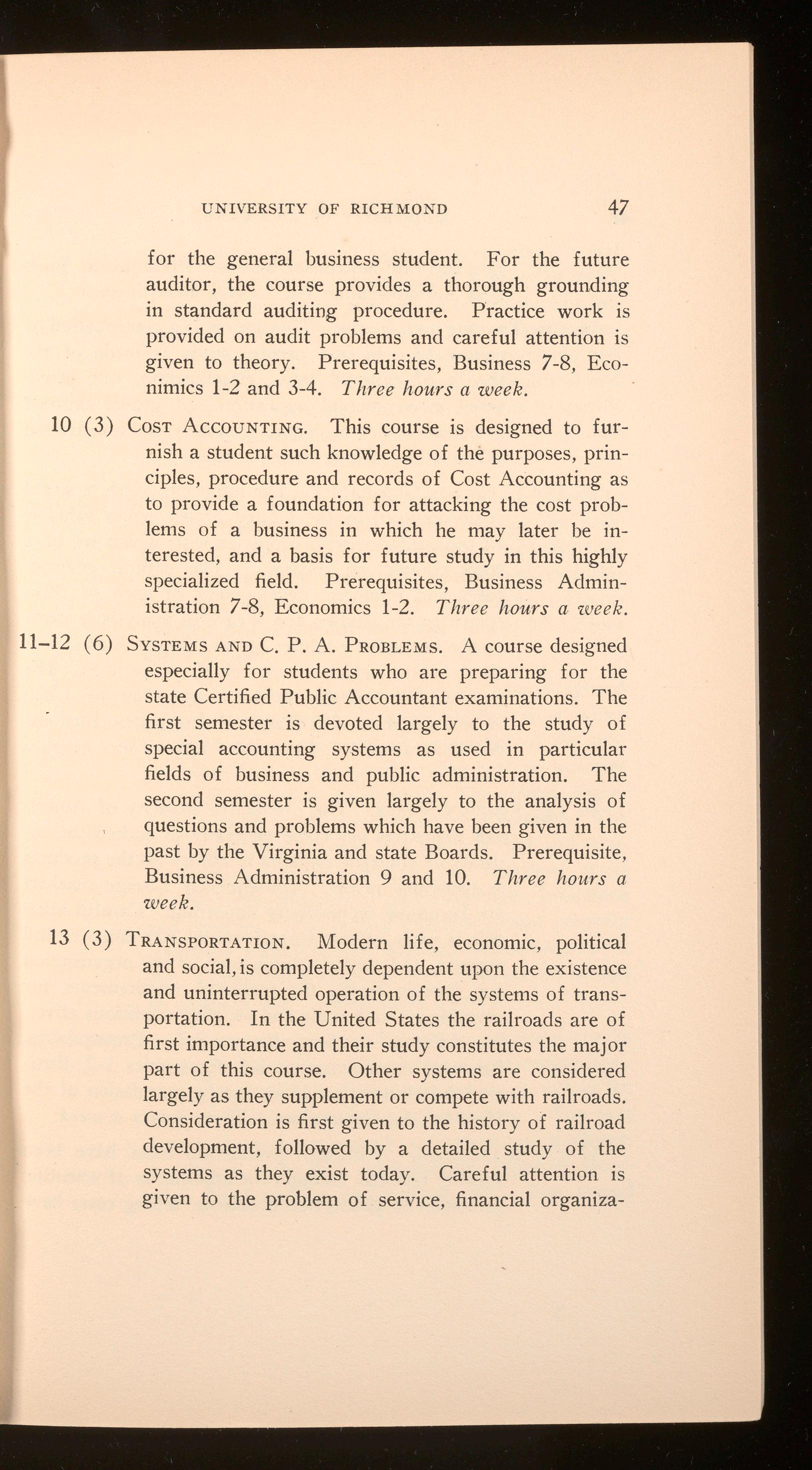
for the general business student. For the future auditor, the course provides a thorough grounding in standard auditing procedure. Practice work is provided on audit problems and careful attention is given to theory. Prerequisites, Business 7-8, Econimics 1-2 and 3-4. Three hours a week.
10 ( 3) CosT AccouNTING. This course is designed to furnish a student such knowledge of the purposes, principles, procedure and records of Cost Accounting as to provide a foundation for attacking the cost problems of a business in which he may later be interested, and a basis for future study in this highly specialized field. Prerequisites, Business Administration 7-8, Economics 1-2. Three hours a week.
11-12 (6) SYSTEMSANDC.
A course designed especially for students who are preparing for the state Certified Public Accountant examinations. The first semester is devoted largely to the study of special accounting systems as used in particular fields of business and public administration. The second semester is given largely to the analysis of questions and problems which have been given in the past by the Virginia and state Boards. Prerequisite, Business Administration 9 and 10. Three hours a week.
13 (3) TRANSPORTATION.Modern life, economic, political and social, is completely dependent upon the existence and uninterrupted operation of the systems of transportation. In the United States the railroads are of first importance and their study constitutes the major part of this course. Other systems are considered largely as they supplement or compete with railroads. Consideration is first given to the history of railroad development, followed by a detailed study of the systems as they exist today. Careful attention is given to the problem of service, financial organiza-
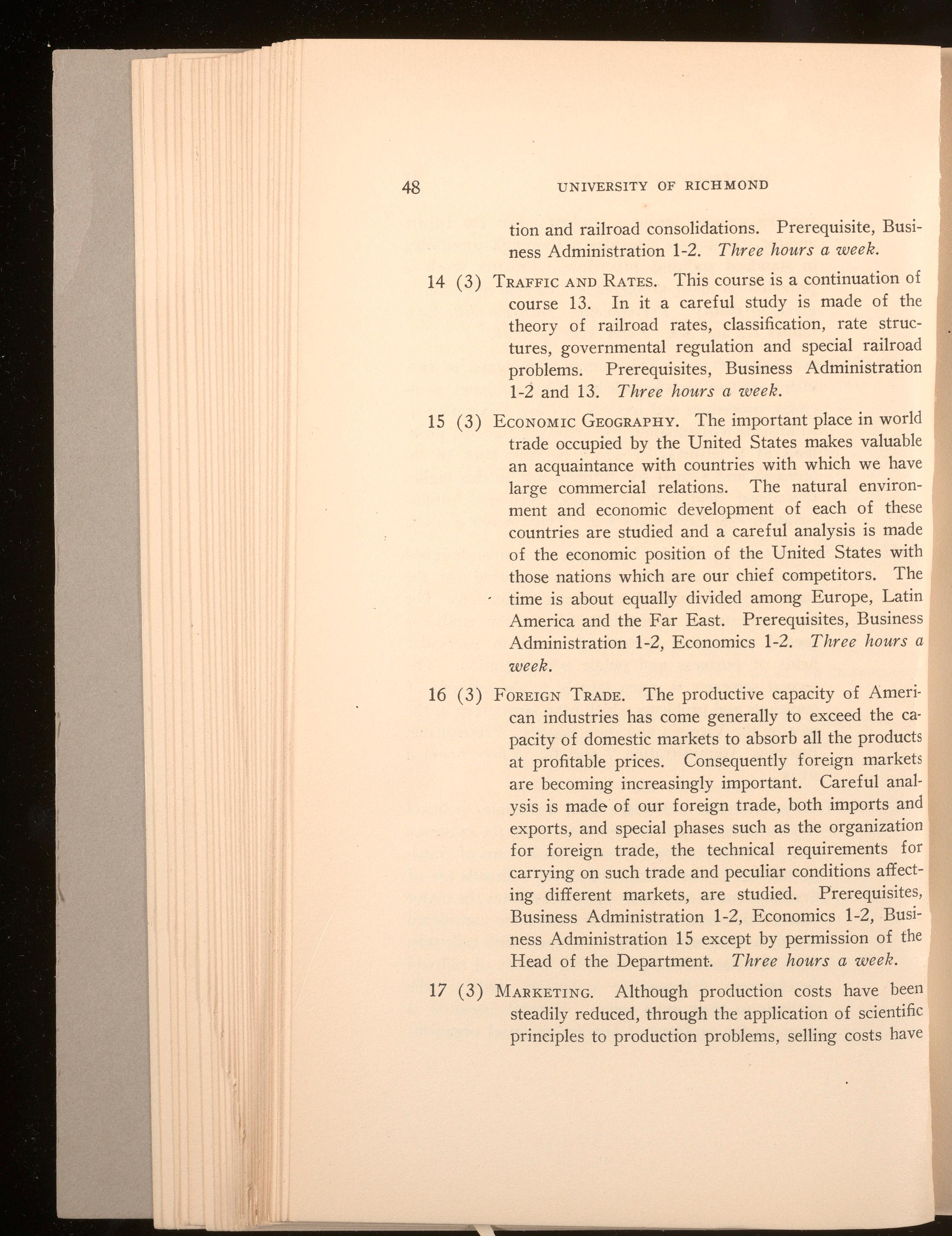
tion and railroad consolidations. Prerequisite, Business Administration 1-2. Three hours a week.
14 ( 3) TRAFFICANDRATES. This course is a continuation of course 13. In it a careful study is made of the theory of railroad rates, classification, rate structures, governmental regulation and special railroad problems. Prerequisites, Business Administration 1-2 and 13. Three hours a week.
15 (3) EcoNOMIC GEOGRAPHY.The important place in world trade occupied by the United States makes valuable an acquaintance with countries with which we have large commercial relations. The natural environment and economic development of each of these countries are studied and a careful analysis is made of the economic position of the United States with those nations which are our chief competitors. The time is about equally divided among Europe, Latin America and the Far East. Prerequisites, Business Administration 1-2, Economics 1-2. Three hours a week.
16 (3) FOREIGNTRADE. The productive capacity of American industries has come generally to exceed the capacity of domestic markets to absorb all the products at profitable prices. Consequently foreign markets are becoming increasingly important. Careful analysis is made of our foreign trade, both imports and exports, and special phases such as the organization for foreign trade, the technical requirements for carrying on such trade and peculiar conditions affecting different markets, are studied. Prerequisites, Business Administration 1-2, Economics 1-2, Business Administration 15 except by permission of the Head of the Department. Three hours a week.
17 ( 3) MARKETING. Although production costs have been steadily reduced, through the application of scientific principles to production problems, selling costs have
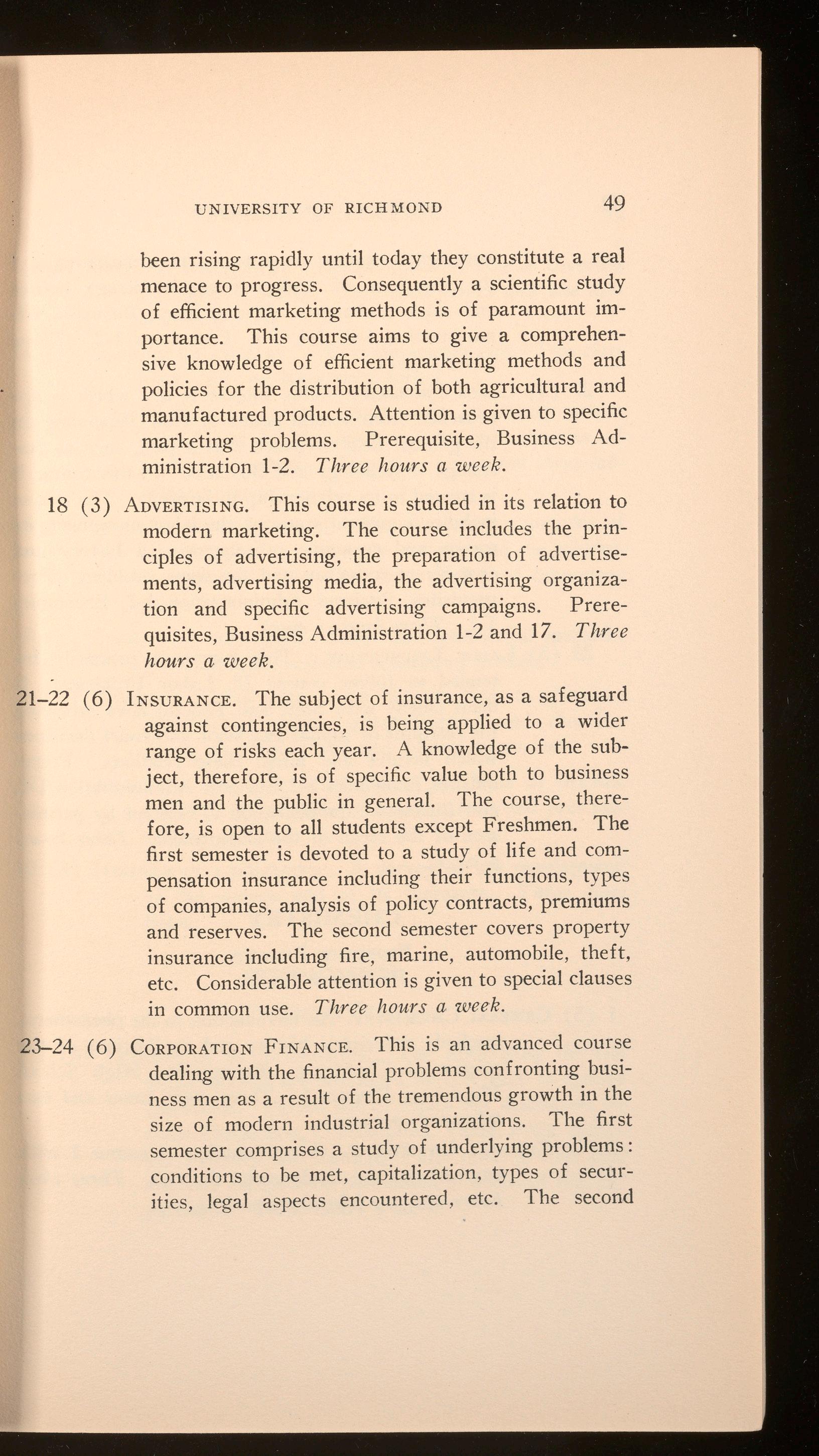
been rising rapidly until today they constitute a real menace to progress. Consequently a scientific study of efficient marketing methods is of paramount importance. This course aims to give a comprehensive knowledge of efficient marketing methods and policies for the distribution of both agricultural and manufactured products. Attention is given to specific marketing problems. Prerequisite, Business Administration 1-2. Three hours a week.
18 ( 3) ADVERTISING.This course is studied in its relation to modern marketing. The course includes the principles of advertising, the preparation of advertisements, advertising media, the advertising organization and specific advertising campaigns. Prerequisites, Business Administration 1-2 and 17. Three hours a week.
21-22 (6) INSURANCE. The subject of insurance, as a safeguard against contingencies, is being applied to a wider range of risks each year. A knowledge of the subject, therefore, is of specific value both to business men and the public in general. The course, therefore, is open to all students except Freshmen. The first semester is devoted to a study of life and compensation insurance including their functions, types of companies, analysis of policy contracts, premiums and reserves. The second semester covers property insurance including fire, marine, automobile, theft, etc. Considerable attention is given to special clauses m common use. Three hours a week.
23-24 (6) CORPORATIONFINANCE. This is an advanced course dealing with the financial problems confronting business men as a result of the tremendous growth in the size of modern industrial organizations. The first semester comprises a study of underlying problems: conditions to be met, capitalization, types of securities, legal aspects encountered, etc. The second
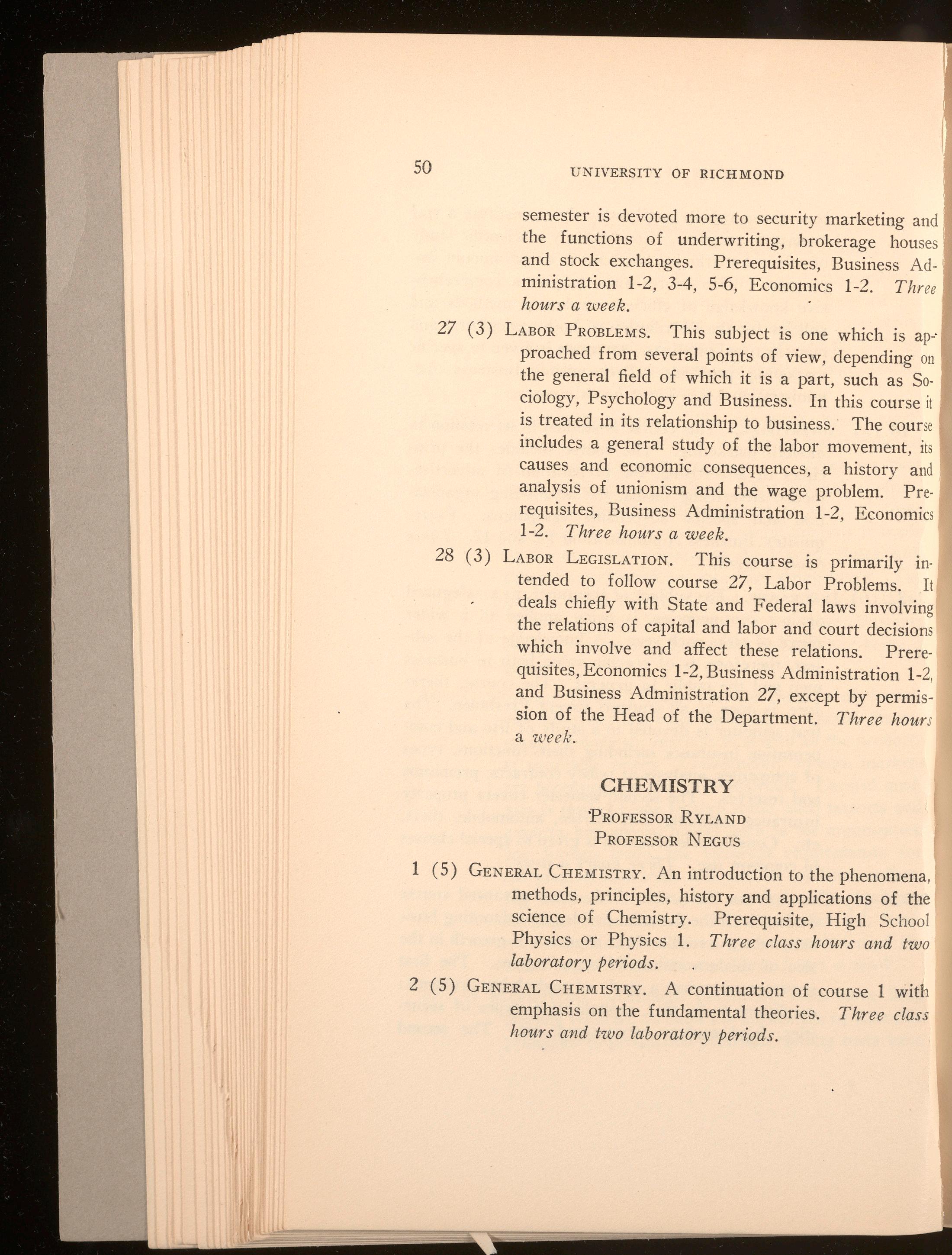
semester is devoted more to security marketing and the functions of underwriting, brokerage hou ses and stock exchanges. Prerequisites, Business Administration 1-2, 3-4, 5-6, Economics 1-2. Th ree hours a week.
27 ( 3) LABORPROBLEMS. This subject is one which is ap-· proached from several points of view, depending on the general field of which it is a part, such as Sociology, Psychology and Business. In this course it is treated in its relationship to business. · The cour se includes a general study of the labor movement, its causes and economic consequences, a history and analysis of unionism and the wage problem. Pr erequisites, Business Administration 1-2, Economi cs 1-2. Three hours a week.
28 (3) LABOR LEGISLATION. This course is primarily intended to follow course 27, Labor Problems. It deals chiefly with State and Federal laws involvin g the relations of capital and labor and court decisions which involve and affect these relations. Prerequisites, Economics 1-2, Business Administration 1-2, and Business Administration 27 , except by permi ssion of the Head of the Department. Three hours a wee k.
'PROFESSORRYLAND
PROFESSORNEGUS
1 (5) GENERALCHEMISTRY.An introduction to the phenomena , methods, principles, history and applications of the science of Chemistry. Prerequisite, High S chool Physics or Physics 1. Three class hours and tw o laboratory periods.
2 ( 5) GENERALCHEMISTRY. A continuation of course 1 wit h emphasis on the fundamental theories. Thre e class hours an d two laboratory periods.
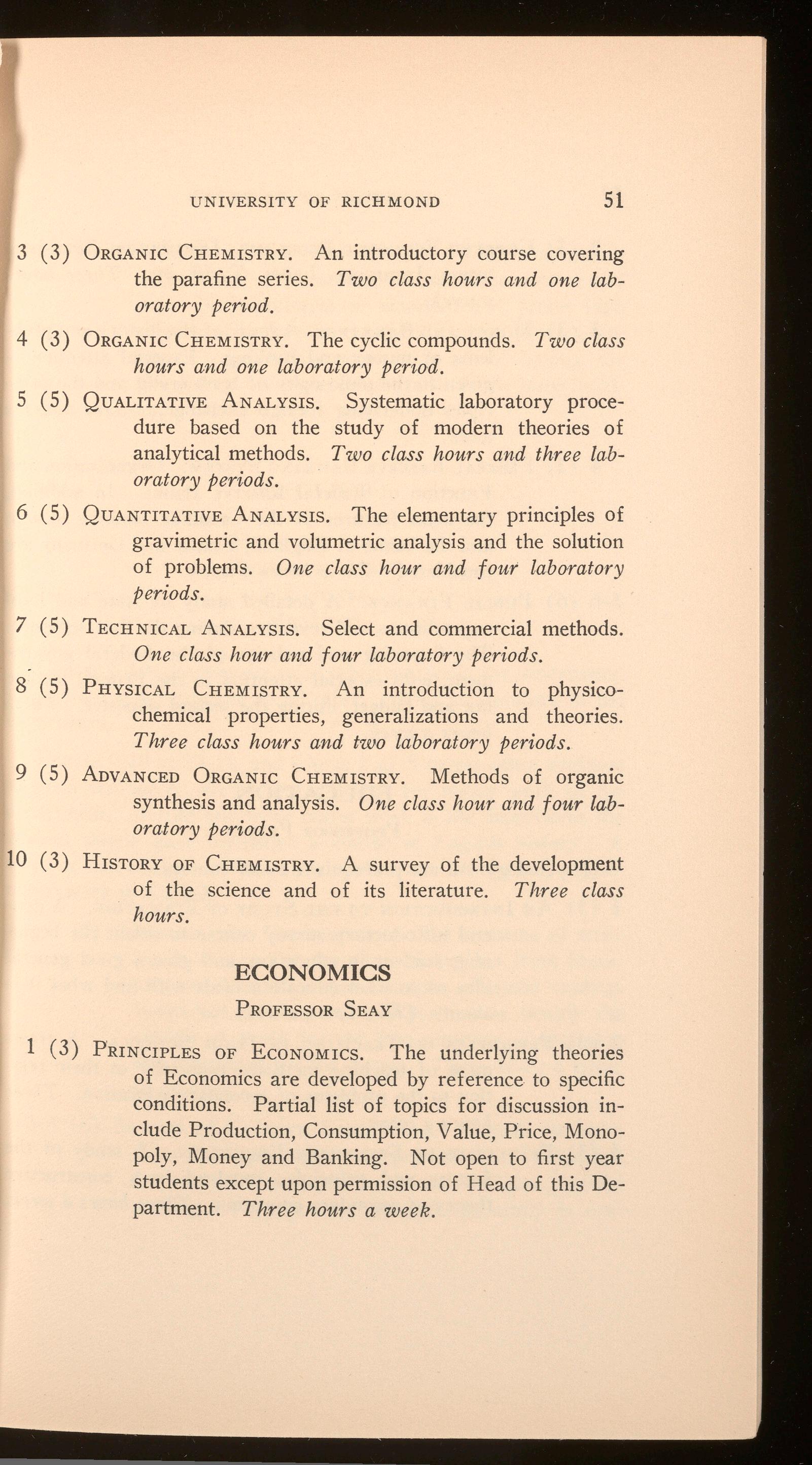
3 ( 3) ORGANIC CHEMISTRY. An introductory course covering the parafine series. Two class hours and one laboratory period.
4 (3) ORGANICCHEMISTRY. The cyclic compounds. Two class hours and one laboratory period.
5 (5) QuALITATIVE ANALYSIS. Systematic laboratory procedure based on the study of modern theories of analytical methods. Two class hours and three laboratory periods .
6 (5) QUANTITATIVEANALYSIS. The elementary principles of gravimetric and volumetric analysis and the solution of problems. One class hour and four laboratory periods.
7 (5) TECHNICAL ANALYSIS. Select and commercial methods. One class hour and four laboratory periods.
8 ( 5) PHYSICAL CHEMISTRY. An introduction to physicochemical properties, generalizations and theories. Three class hours and two laboratory periods.
9 (5) ADVANCEDORGANIC CHEMISTRY. Methods of organic synthesis and analysis. One class hour and four laboratory periods.
10 (3) HISTORY OF CHEMISTRY. A survey of the development of the science and of its literature. Three class hours.
PROFESSORSEAy
1 (3) PRINCIPLES OF EcoNOMICS. The underlying theories of Economics are developed by reference to specific conditions. Partial list of topics for discussion include Production, Consumption, Value, Price, Monopoly, Money and Banking. Not open to first year students except upon permission of Head of this Department. Three hours a week.
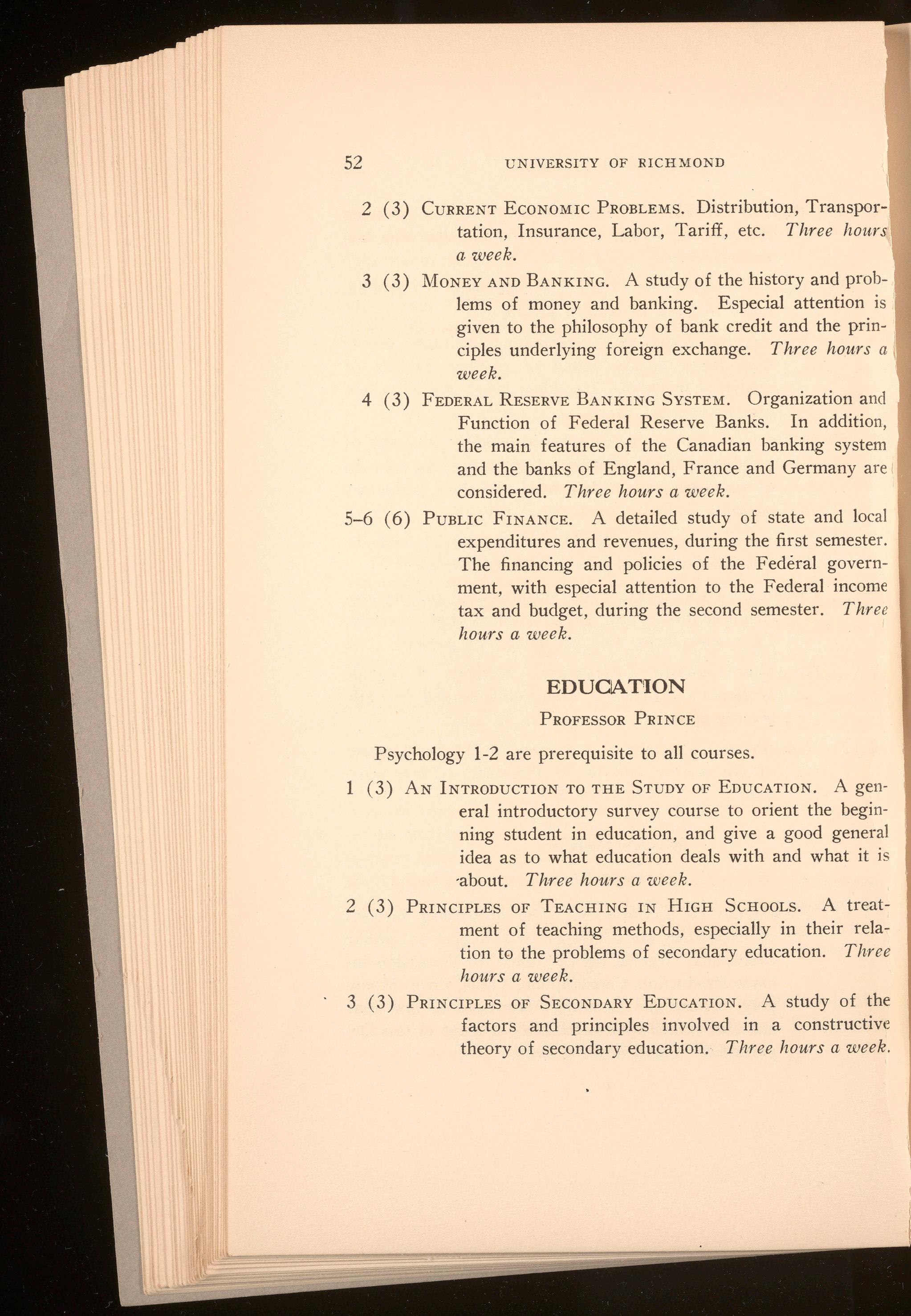
2 ( 3) CURRENTEcoNOMIC PROBLEMS.Distribution, Transportation, Insurance, Labor, Tariff, etc. Three hours a week.
3 ( 3) MoNEY ANDBANKING. A study of the history and problems of money and banking. Especial attention is given to the philosophy of bank credit and the principles underlying foreign exchange. Three hours a 1 week.
4 (3) FEDERALRESERVEBANKING SYSTEM. Organization an d Function of Federal Reserve Banks. In additio n, the main features of the Canadian banking system and the banks of England, France and Germany a re considered. Three hours a week.
5-6 (6) PUBLIC FINANCE. A detailed study of state and local expenditures and revenues, during the first semeste r. The financing and policies of the Federal government, with especial attention to the Federal mcome tax and budget, during the second semester . Thr ee hours a w eek.
PROFESSORPRINCE
Psychology 1-2 are prerequisite to all courses.
1 ( 3) AN INTRODUCTIONTo THE STUDYOF EDUCATION. A ge neral introductory survey course to orient the begi nning student in education, and give a good gener al idea as to what education deals with and what it is -about. Three hours a w eek.
2 ( 3) PRINCIPLES OF TEACHING IN HIGH SCHOOLS. A treatment of teaching methods, especially in their relation te the problems of secondary education . Thr ee hours a week.
3 (3) PRINCIPLES OF SECONDARYEDUCATION. A study of the factors and principles involved in a constructive theory of secondary education. Thr ee hours a week ,
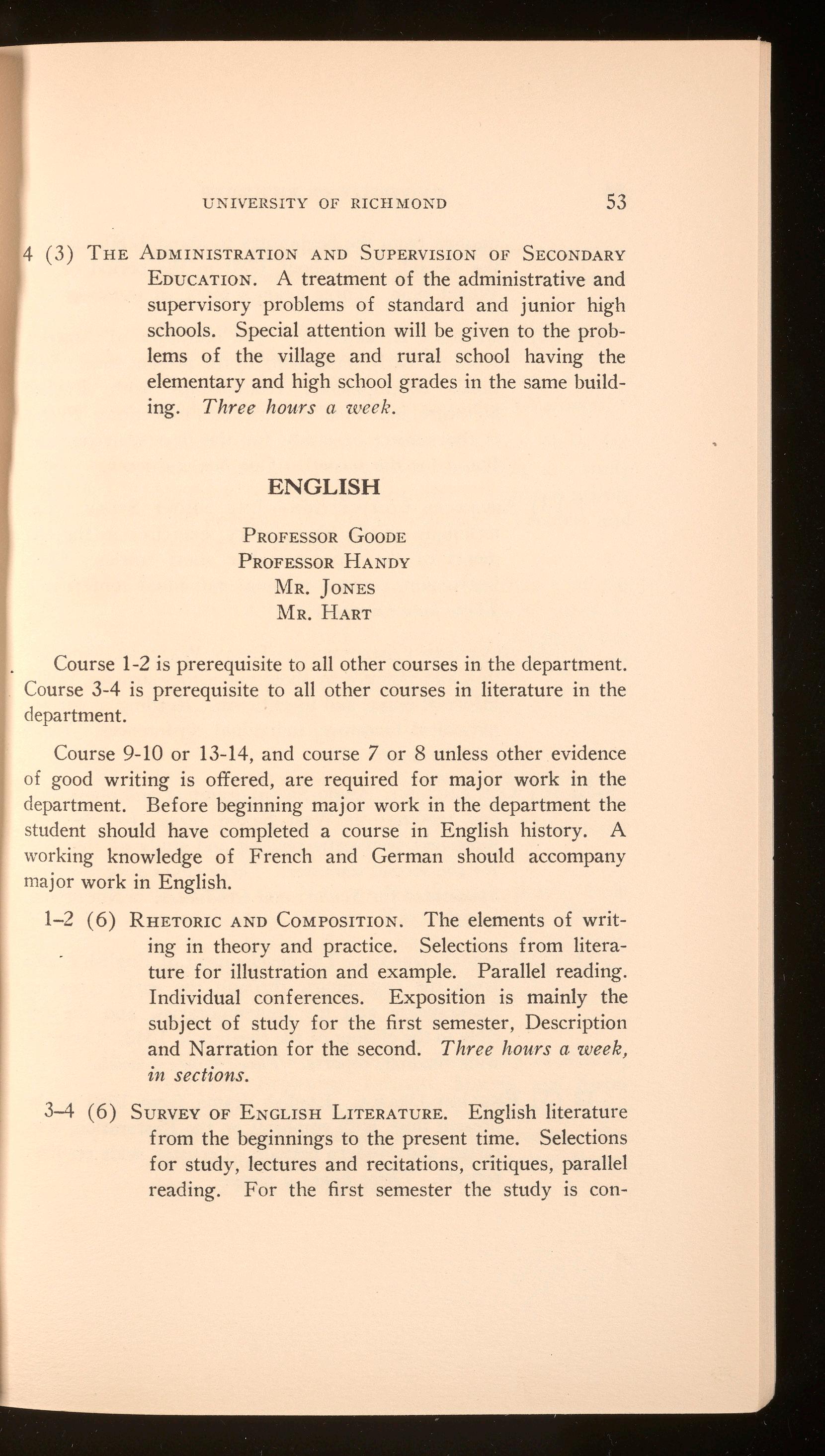
( 3) THE ADMINISTRATIONAND SUPERVISIONOF SECONDARY EDUCATION. A treatment of the administrative and supervisory problems of standard and junior high schools. Special attention will be given to the problems of the village and rural school having the elementary and high school grades in the same buildmg. Three hoitrs a week.
PROFESSORGooDE
PROFESSORHANDY
MR. JONES
MR. HART
Course 1-2 is prerequisite to all other courses in the department. Course 3-4 is prerequisite to all other courses in literature in the department.
Course 9-10 or 13-14, and course 7 or 8 unless other evidence of good writing is offered, are required for major work in the department. Before beginning major work in the department the stu dent should have completed a course in English history. A working knowledge of French and German should accompany major work in English.
1-2 (6) RHETORICAND COMPOSITION. The elements of writing in theory and practice. Selections from literature for illustration and example. Parallel reading. Individual conferences. Exposition is mainly the subject of study for the first semester, Description and Narration for the second. Three hours a week, in sections.
3-4 (6) SURVEYOF ENGLISH LITERATURE. English literature from the beginnings to the present time. Selections for study, lectures and recitations, critiques, parallel reading. For the first semester the study is con-
tinuous from the beginnings to about 1780, and fo1, the second, from about 1780 to the period of the. World War. Thr ee hours a we ek, in secti ons.
5-6 ( 4) AMERICANLITERATURE. The literature of America from the early settlements to the present time. Sec- tional developments, relationships with English literature, individual writers and productions. Poetry is the subject of study for the first semester, and Prose for the second. Two hours a week.
7 ( 3) ADVANCEDCOMPOSITION-THE SHORT STORY. The technique of the Short Story, exercises in the ele- ments of the type , complete short stories. Class in struction , copious reading, individual conference s. Thr ee hours a week.
8 ( 3) ADVANCEDCoMPOSITION-EssAY WRITING. Instru ction and practice in short expository articles , in th e informal essay, and in criticism. Reading in current periodical literature, individual conferences. Th ree hours a week.
9-10 (6) Ow ENGLISH. Anglo-Saxon grammar and phonolog y, and readings in West Saxon prose, for the first semester; systematic reading and study of B eowulf, for the second semester. Three hours a we ek. R ec- ommended for Seniors and Graduates. (Not offered in 1927-'28.)
11 ( 3) ENGLISHDRAMA. The development of English dra ma from the beginnings, through the early types, to Shakespeare and his contemporaries, and the de- cline to the closing of the theaters in 1642. Lecture s, wide reading, reports. Three hours a week.
12 (3) ENGLISH DRAMA. English drama from 1660 to the present time, with emphasis on the Restoration, Vic- torian, and Modern periods. Lectures, wide reading , reports. Three hours a week.
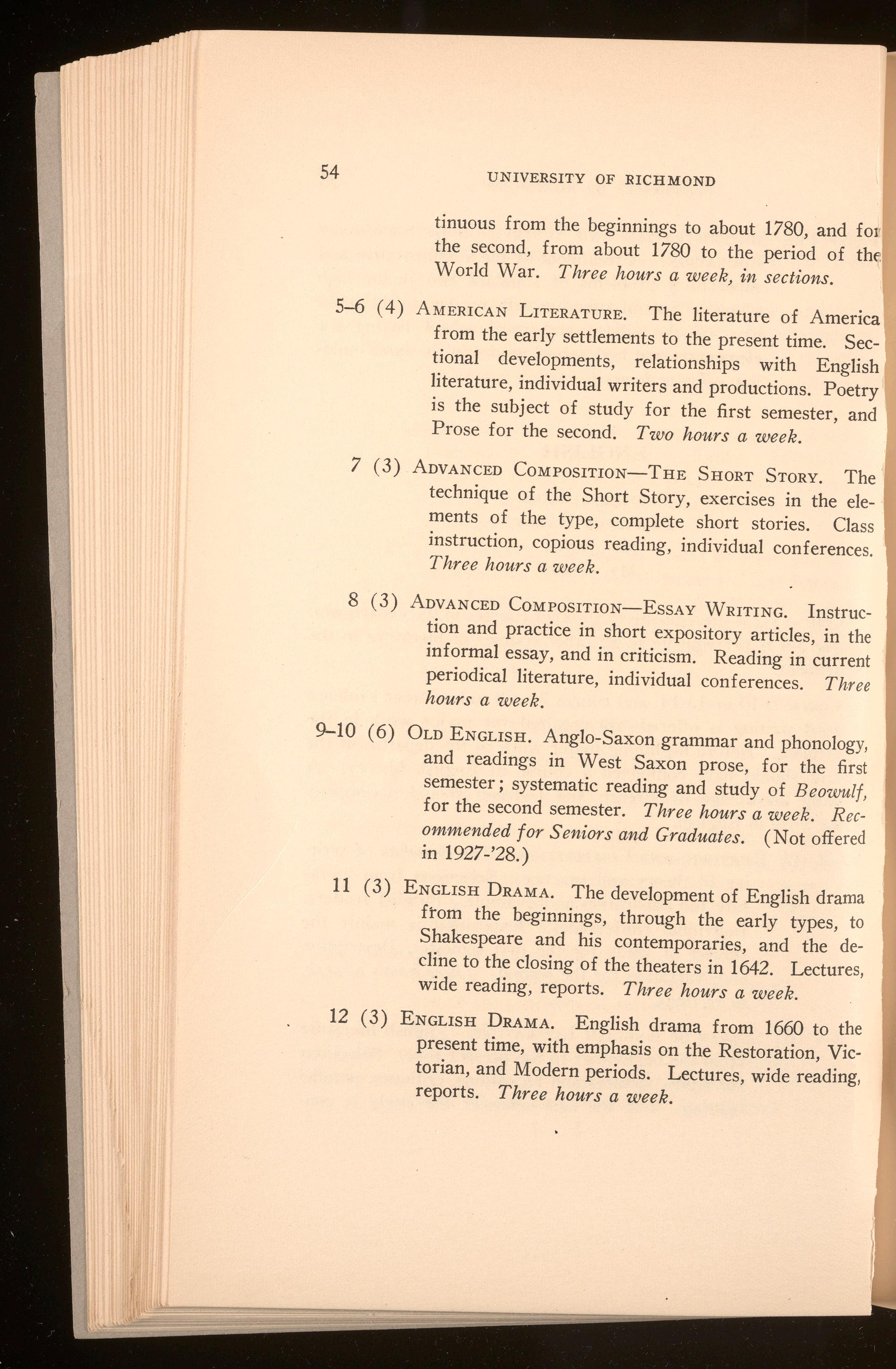
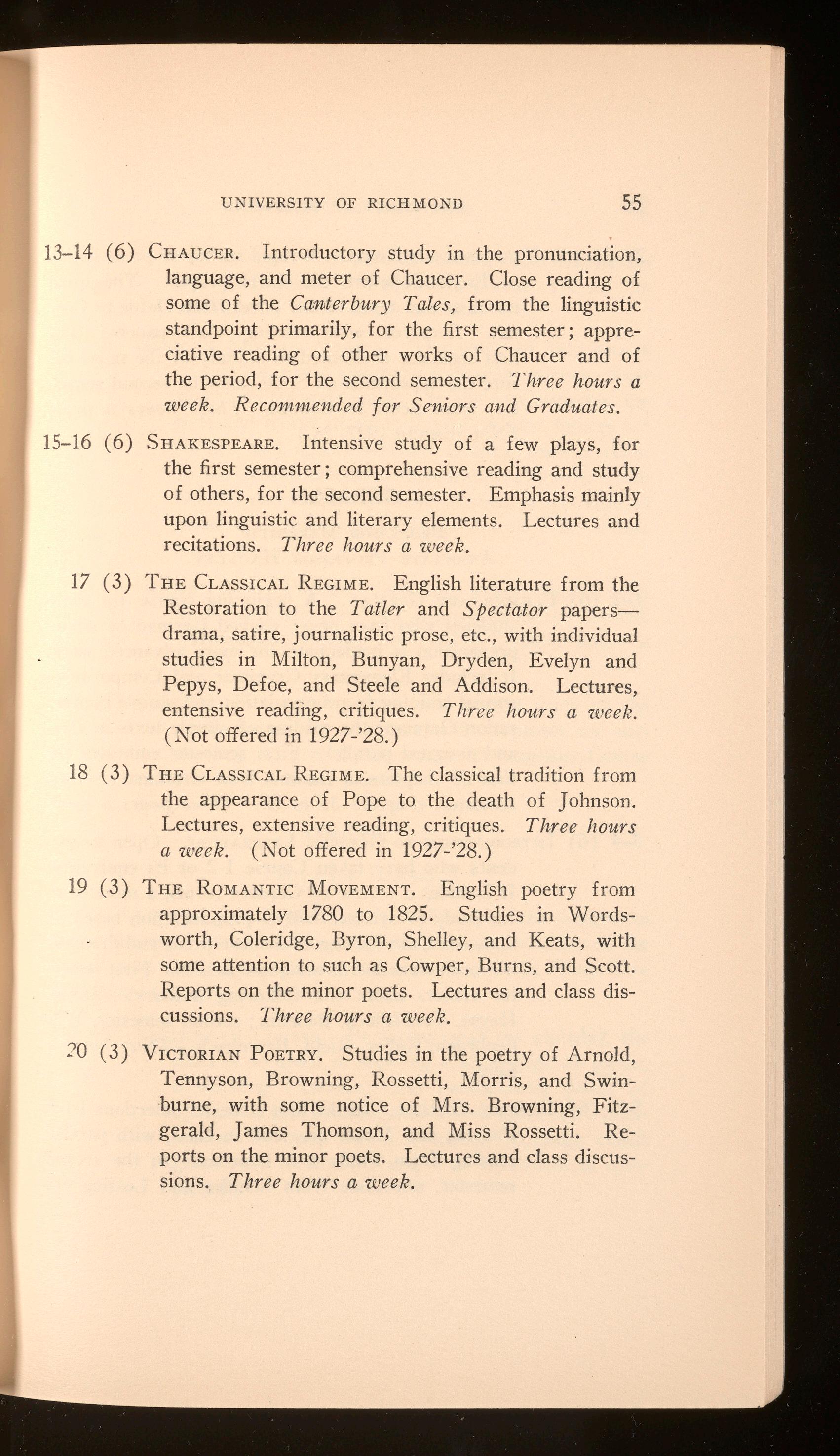
13-14 ( 6) CHAUCER. Introductory study in the pronunciation, language, and meter of Chaucer. Close reading of some of the Canterbury Tales, from the linguistic standpoint primarily, for the first semester; appreciative reading of other works of Chaucer and of the period, for the second semester. Three hours a week. Reconiniended for Seniors and Graduates.
15-16 (6) SHAKESPEARE. Intensive study of a few plays, for the first semester; comprehensive reading and study of others, for the second semester. Emphasis mainly upon linguistic and literary elements. Lectures and recitations. Three hours a week.
17 ( 3) THE CLASSICALREGIME. English literature from the Restoration to the Tatler and Spectator papersdrama, satire, journalistic prose, etc., with individual studies in Milton, Bunyan, Dryden, Evelyn and Pepys, Defoe, and Steele and Addison. Lectures, entensive reading, critiques. Three hours a week. (Not offered in 1927-'28.)
18 ( 3) THE CLASSICALREGIME. The classical tradition from the appearance of Pope to the death of Johnson. Lectures, extensive reading, critiques. Three hours a wee!,. (Not offered in 1927-'28.)
19 ( 3) THE RoMANTIC MOVEMENT. English poetry from approximately 1780 to 1825. Studies in Wordsworth, Coleridge, Byron, Shelley, and Keats, with some attention to such as Cowper, Burns, and Scott. Reports on the minor poets. Lectures and class discussions. Three hours a week.
20 (3) VICTORIANPOETRY. Studies in the poetry of Arnold, Tennyson, Browning, Rossetti, Morris, and Swinburne, with some notice of Mrs. Browning, Fitzgerald, James Thomson, and Miss Rossetti. Reports on the minor poets. Lectures and class discussions. Three hours a week.
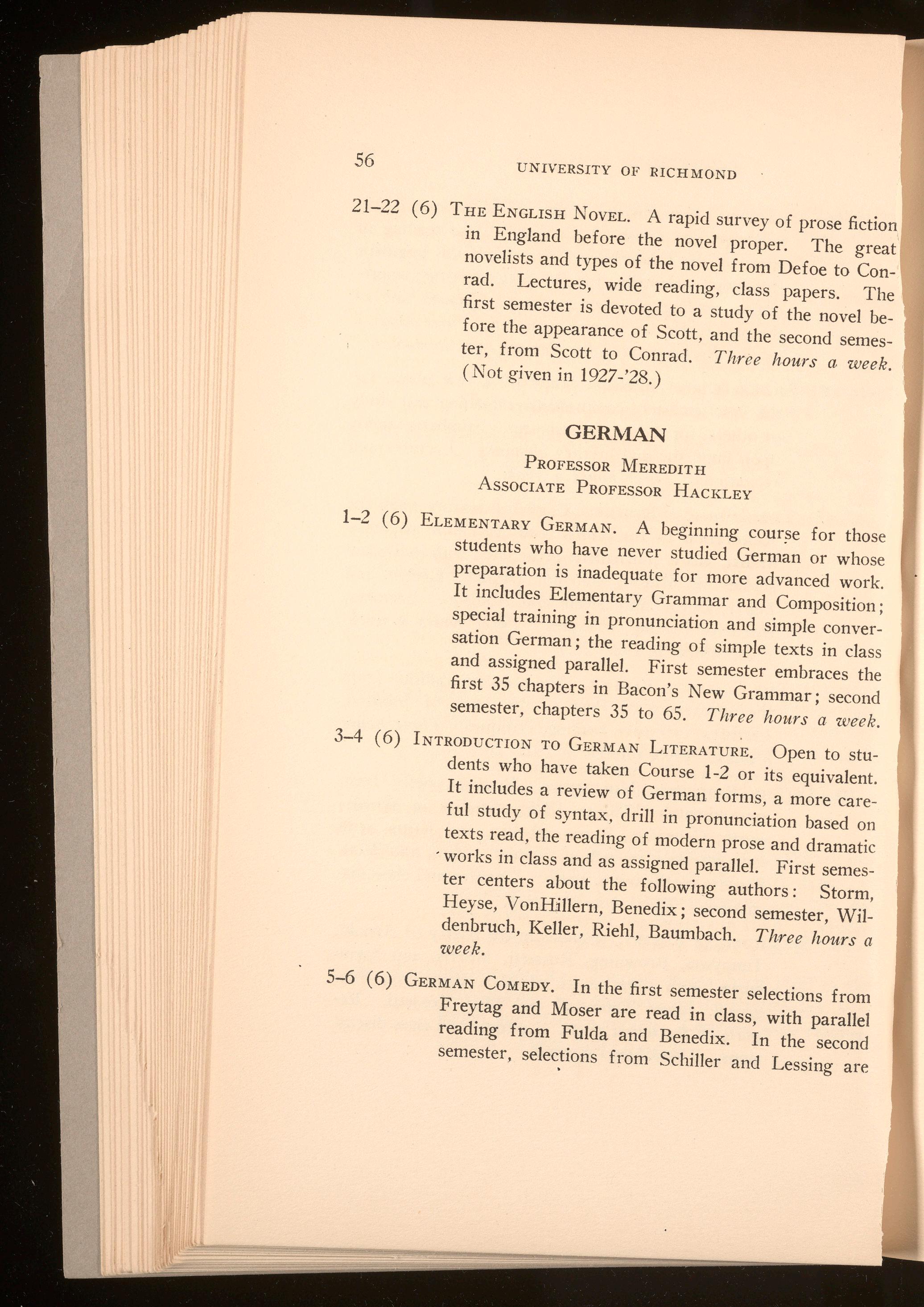
21-22 (6) THE ENGLISH NovEL. A rapid survey of prose fiction in England before the novel proper. The great novelists and types of the novel from Defoe to Con- rad. Lectures, wide reading, class papers. The first semester is devoted to a study of the novel be- fore the appearance of Scott, and the second semes- ter, from Scott to Conrad. Three hours a week. (Not given in 1927-'28.)
1-2 (6) ELEMENTARYGERMAN. A beginning course for those students who have never studied German or whose preparation is inadequate for more advanced work. It includes Elementary Grammar and Composition; special training in pronunciation and simple conver- sation German; the reading of simple texts in class and assigned parallel. First semester embraces the first 35 chapters in Bacon's New Grammar; second semester, chapters 35 to 65. Three hours a week.
3-4 (6) INTRODUCTIONTO GERMAN LITERATURE. Open to stu- dents who have taken Course 1-2 or its equivalent. It includes a review of German forms, a more care- ful study of syntax , drill in pronunciation based on texts read, the reading of modern prose and dramatic · works in class and as assigned parallel. First semes- ter centers about the following authors : Storm , Heyse, VonH.illern, Benedix; second semester, Wil- denbruch, Keller, Riehl, Baumbach. Three hours a week.
5-6 (6) GERMANCOMEDY. In the first semester selections from Freytag and Moser are read in class, with parallel reading from Fulda and Benedix. In the second semester, selections from Schiller and Lessing are
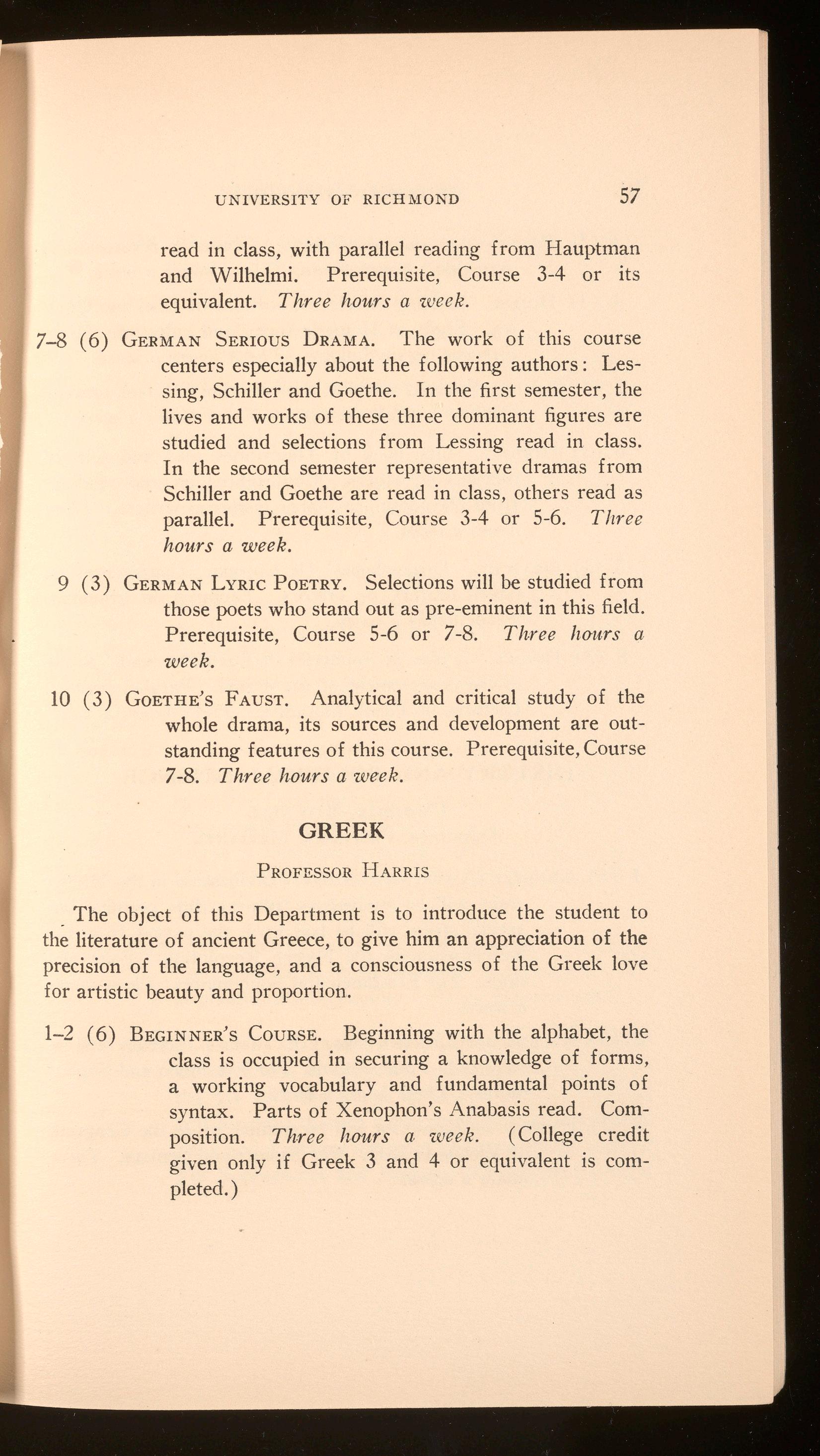
read in class, with parallel reading from Hauptman and Wilhelmi. Prerequisite, Course 3-4 or its equivalent. Three hours a week.
7-8 (6) GERMAN SERIOUSDRAMA. The work of this course centers especially about the following authors: Lessing, Schiller and Goethe. In the first semester, the lives and works of these three dominant figures are studied and selections from Lessing read in class. In the second semester representative dramas from Schiller and Goethe are read in class, others read as parallel. Prerequisite, Course 3-4 or 5-6. Three hours a week.
9 (3) GERMANLYRICPOETRY. Selections will be studied from those poets who stand out as pre-eminent in this field. Prerequisite, Course 5-6 or 7-8. Three hours a week.
10 ( 3) GoETHE's FAUST. Analytical and critical study of the whole drama, its sources and development are outstanding features of this course. Prerequisite, Course 7-8. Three hours a week.
PROFESSORHARRIS
_ The object of this Department is to introduce the student to the literature of ancient Greece, to give him an appreciation of the precision of the language, and a consciousness of the Greek love for artistic beauty and proportion.
1-2 (6) BEGINNER'SCouRSE. Beginning with the alphabet, the class is occupied in securing a knowledge of forms, a working vocabulary and fundamental points of syntax. Parts of Xenophon's Anabasis read. Composition. Three hours a week. (College credit given only if Greek 3 and 4 or equivalent is completed.)
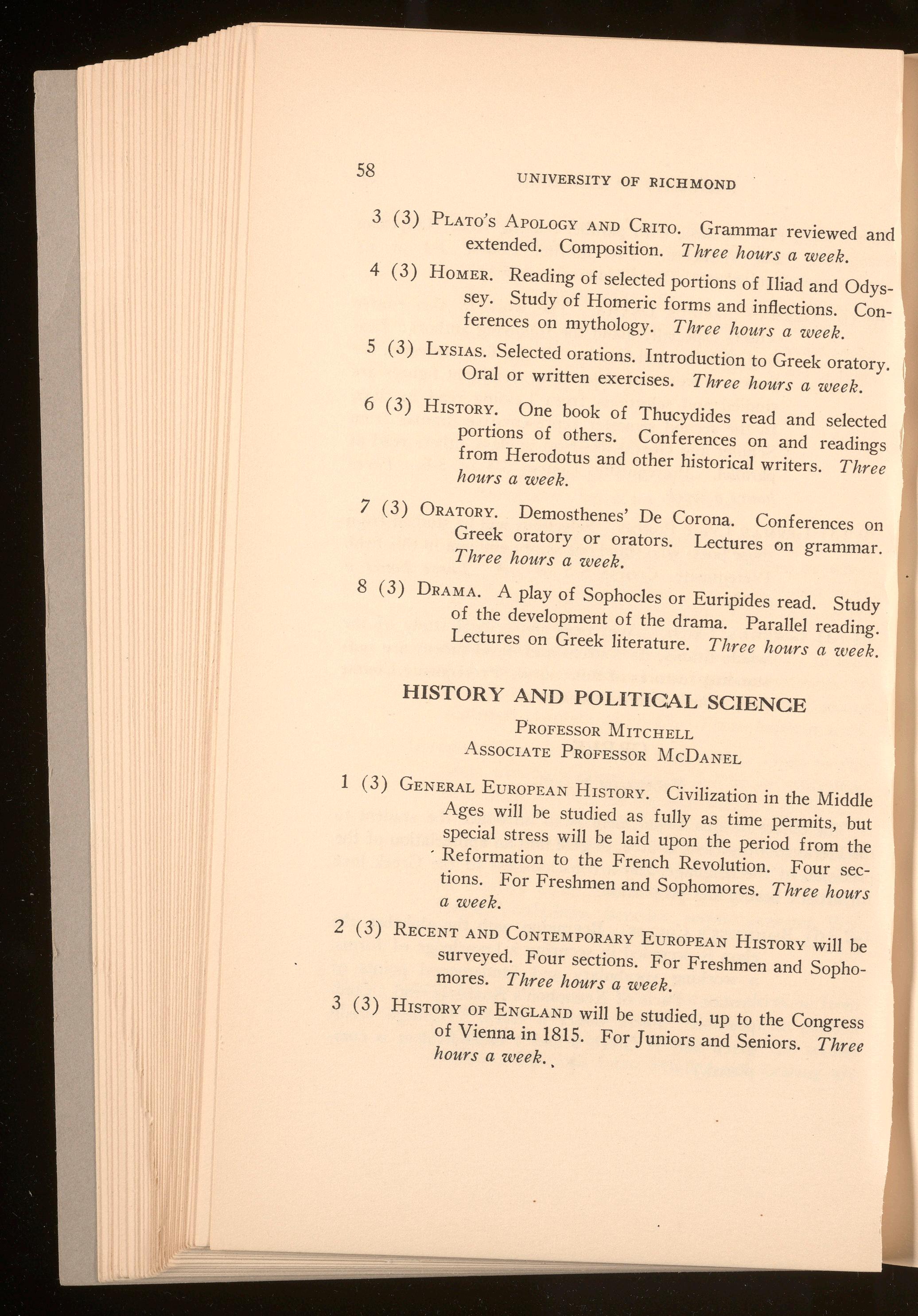
3 (3) PLATO'S APOLOGYAND CRITO. Grammar reviewed and extended. Composition. Three hours a week.
4 ( 3) HOMER. Reading of selected portions of Iliad and Odys- sey. Study of Homeric forms and inflections. Con- ferences on mythology. Three hours a w eek.
5 (3) LYSIAS. Selected orations. Introduction to Greek oratory. Oral or written exercises. Three hours a week.
6 (3) HISTORY. One book of Thucydides read and selected portions of others. Conferences on and readings from Herodotus and other historical writers. Thre e hours a week.
7 (3) ORATORY. Demosthenes' De Corona. Conferences on Greek oratory or orators. Lectures on grammar. Three hours a week.
8 ( 3) DRAMA. A play of Sophocles or Euripides read. Study of the development of the drama. Parallel reading. Lectures on Greek literature. Thr ee hours a week.
PROFESSORMITCHELL
A ssocIATE PROFESSORMcDANEL
1 ( 3) GENERALEUROPEANHI STORY. Civilization in the Middle Ages will be studied as fully as time permits, but special stress will be laid upon the period from the - Reformation to the French Revolution. Four sec- tions. For Freshmen and Sophomores. Three hours a week.
2 ( 3) RECENT AND CONTEMPORARYEUROPEANHISTORYwill be surveyed . Four sections. For Freshmen and Sopho- mores. Three hours a week.
3 ( 3) HISTORYOF ENGLANDwill be studied, up to the Congress of Vienna in 1815. For Juniors and Seniors. Three hours a week.
4
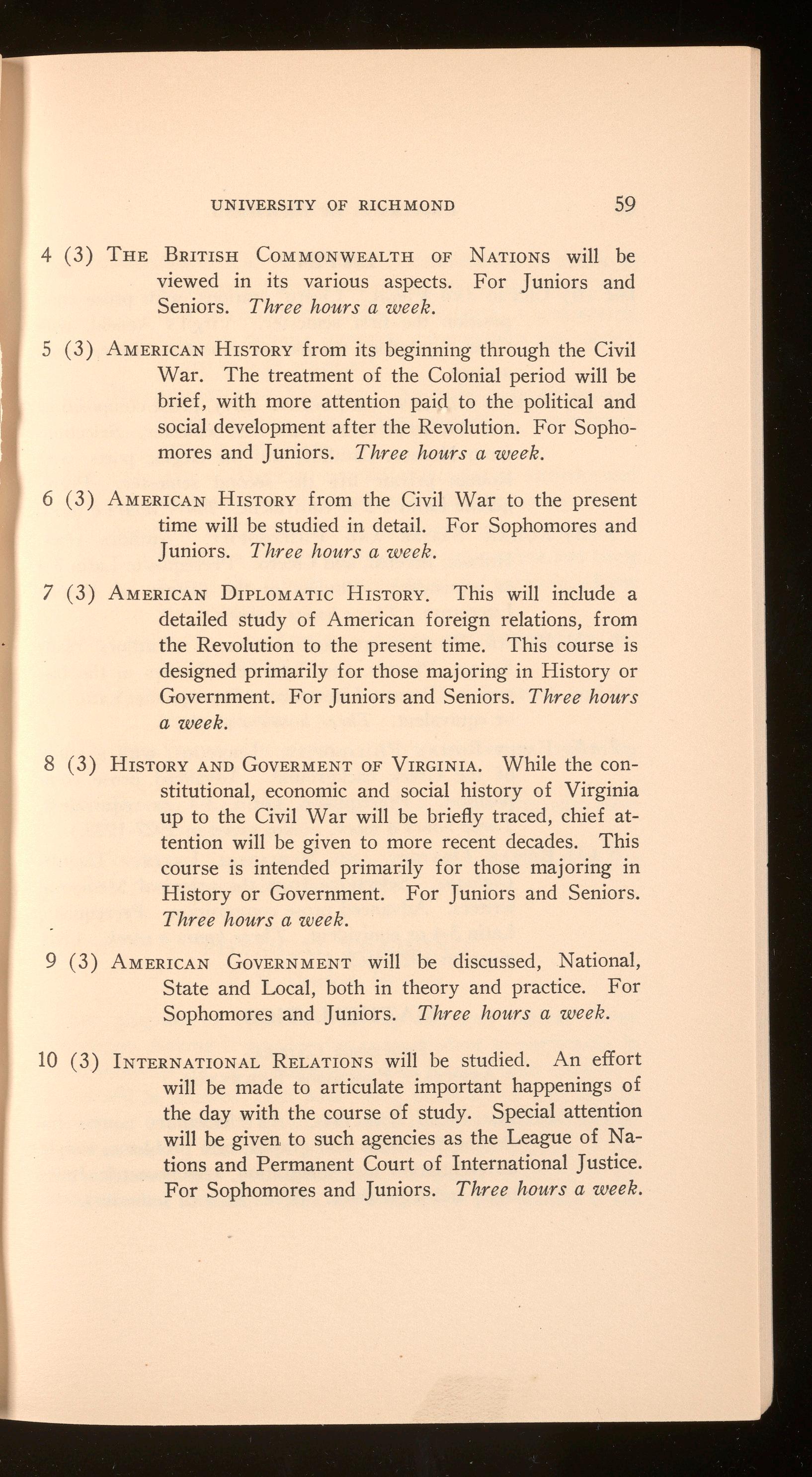
( 3) THE BRITISH COMMONWEALTHOF NATIONS will be viewed in its various aspects. For Juniors and Seniors. Three hours a week.
5 ( 3) AMERICANHISTORYfrom its beginning through the Civil War. The treatment of the Colonial period will be brief, with more attention paid to the political and social development after the Revolution. For Sophomores and Juniors. Three hours a week.
6 ( 3) AMERICAN HISTORY from the Civil War to the present time will be studied in detail. For Sophomores and Juniors. Three hours a week
7 ( 3) AMERICAN DIPLOMATICHISTORY. This will include a detailed study of American foreign relations, from the Revolution to the present time. This course is designed primarily for those majoring in History or Government . For Juniors and Seniors. Three hours a week.
8 ( 3) HISTORYAND GovERMENTOF VIRGINIA. While the constitutional, economic and social history of Virginia up to the Civil War will be briefly traced, chief attention will be given to more recent decades. This course is intended primarily for those majoring in History or Government. For Juniors and Seniors. Three hours a week .
9 ( 3) AMERICAN GovERNMENT will be discussed, National , State and Local, both in theory and practice. For Sophomores and Juniors. Three hours a week.
10 ( 3) INTERNATIONALRELATIONSwill be studied. An effort will be made to articulate important happenings of the day with the course of study. Special attention will be given to such agencies as the League of Nations and Permanent Court of International Justice. For Sophomores and Juniors. Three hours a week
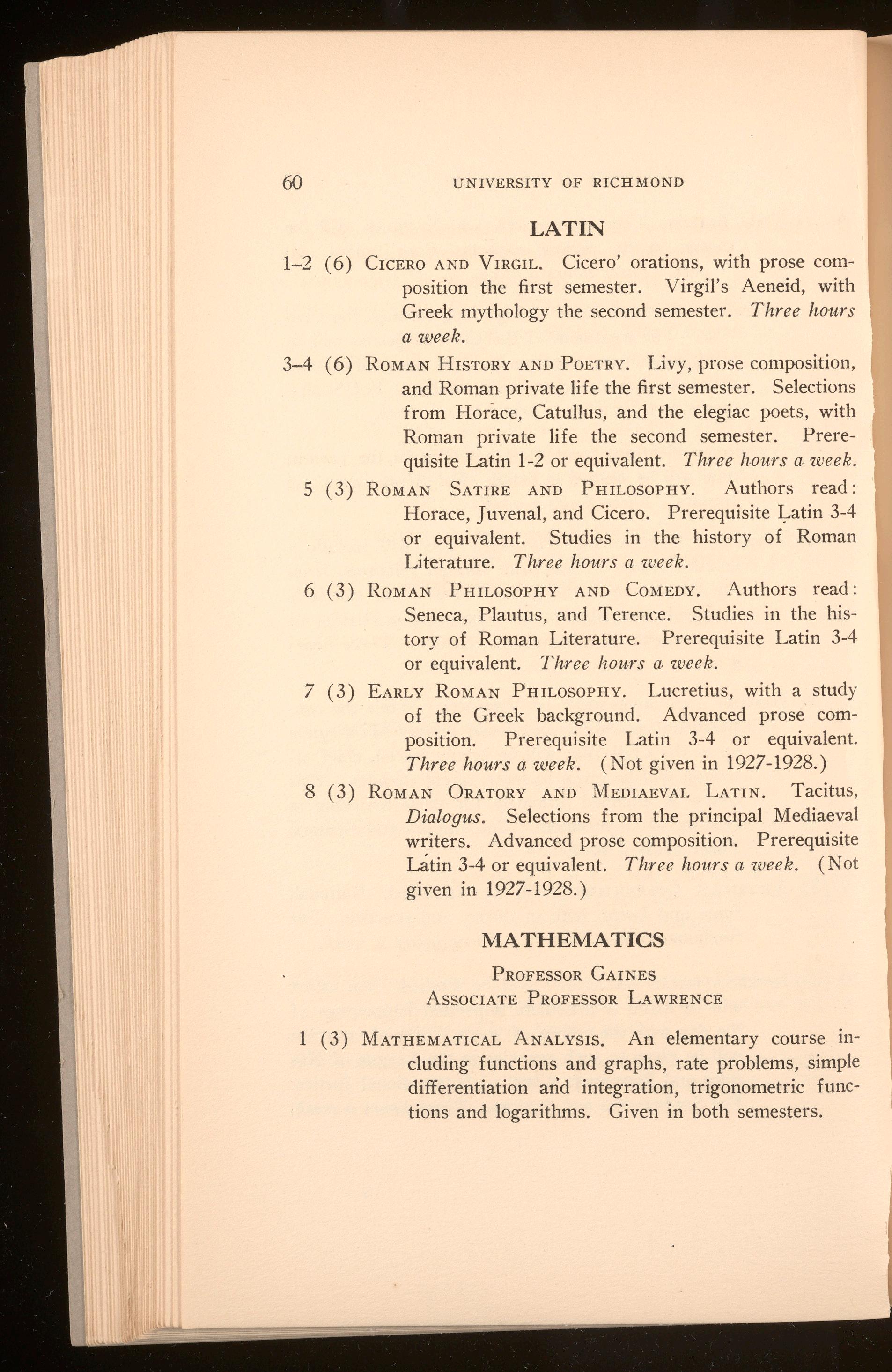
1-2 (6) CICEROAND VIRGIL. Cicero' orations, with prose composition the first semester. Virgil's Aeneid, with Greek mythology the second semester. Three hours a week.
3-4 ( 6) ROMAN HISTORYAND POETRY. Livy, prose composition, and Roman private life the first semester. Selections from Horace, Catullus, and the elegiac poets, with Roman private life the second semester. Prerequisite Latin 1-2 or equivalent. Three hours a week.
5 ( 3) Ro MAN SATIRE AND PHILOSOPHY. Authors read : Horace, Juvenal, and Cicero. Prerequisite I,,atin 3-4 or equivalent. Studies in the history of Roman Literature. Three hours a week.
6 (3) ROMAN PHILOSOPHY AND COMEDY. Authors read : Seneca, Plautus, and Terence. Studies in the history of Roman Literature. Prerequisite Latin 3-4 or equivalent. Three hours a week.
7 (3) EARLY ROMAN PHILOSOPHY. Lucretius, with a study of the Greek background. Advanced prose compos1t10n. Prerequisite Latin 3-4 or equivalent. Three hours a week. (Not given in 1927-1928.)
8 (3) ROMAN ORATORY AND MEDIAEVAL LATIN. Tacitus , Dialogits. Selections from the principal Mediaeval writers. Advanced prose composition. Prerequisite Latin 3-4 or equivalent. Three hours a week. (Not given in 1927-1928.)
PROFESSORGAINES
ASSOCIATEPROFESSORLAWRENCE
1 (3) MATHEMATICALANALYSIS. An elementary course including functions and graphs, rate problems, simple differentiation arid integration, trigonometric functions and logarithms. Given in both semesters.
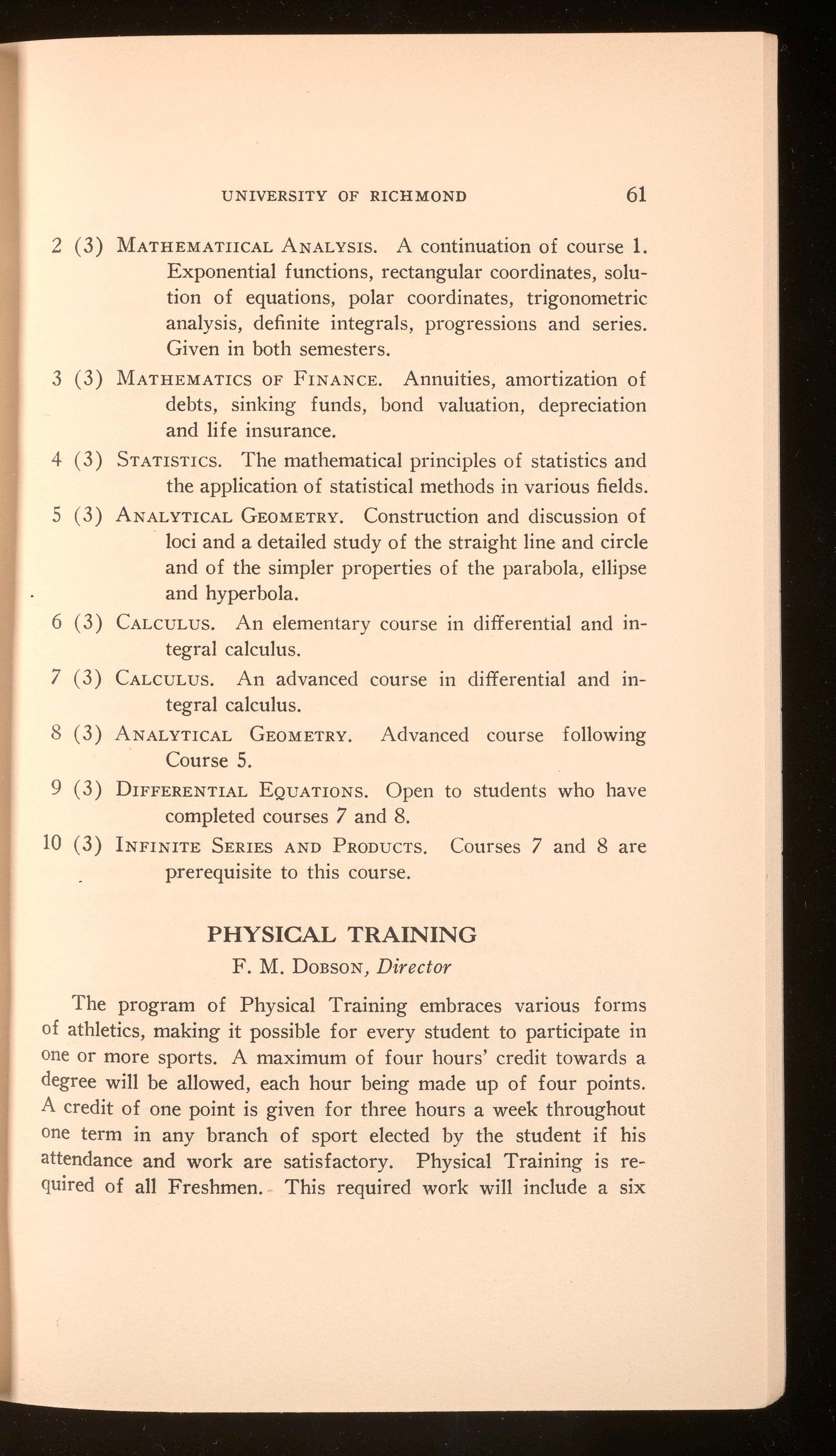
2 ( 3) MATHEMATIICALANALYSIS. A continuation of course 1. Exponential functions, rectangular coordinates, solution of equations, polar coordinates, trigonometric analysis, definite integrals, progressions and series . Given in both semesters
3 ( 3) MATHEMATICSOF FINANCE. Annuities, amortization of debts, sinking funds, bond valuation, depreciation and life insurance.
4 ( 3) STATISTICS. The mathematical principles of statistics and the application of statistical methods in various fields .
5 ( 3) ANALYTICALGEOMETRY. Construction and discussion of loci and a detailed study of the straight line and circle and of the simpler properties of the parabola, ellipse and hyperbola.
6 ( 3) CALCULUS. An elementary course in differential and integral calculus.
7 ( 3 ) CALCULus. An advanced course in differential and integral calculus.
8 ( 3) ANALYTICAL GEOMETRY. Advanced course following Course 5.
9 ( 3) DIFFERENTIALEQUATIONS. Open to students who have completed courses 7 and 8.
10 ( 3) INFINITE SERIES AND PRODUCTS. Courses 7 and 8 are prerequisite to this course.
F. M. DoBsoN, Director
The program of Physical Training embraces various forms of athletics, making it possible for every student to participate in one or more sports. A maximum of four hours' credit towards a degr ee will be allowed, each hour being made up of four points. A credit of one point is given for three hours a week throughout one term in any branch of sport elected by the student if his attendance and work are satisfactory. Physical Training is required of all Freshmen. . This required work will include a six
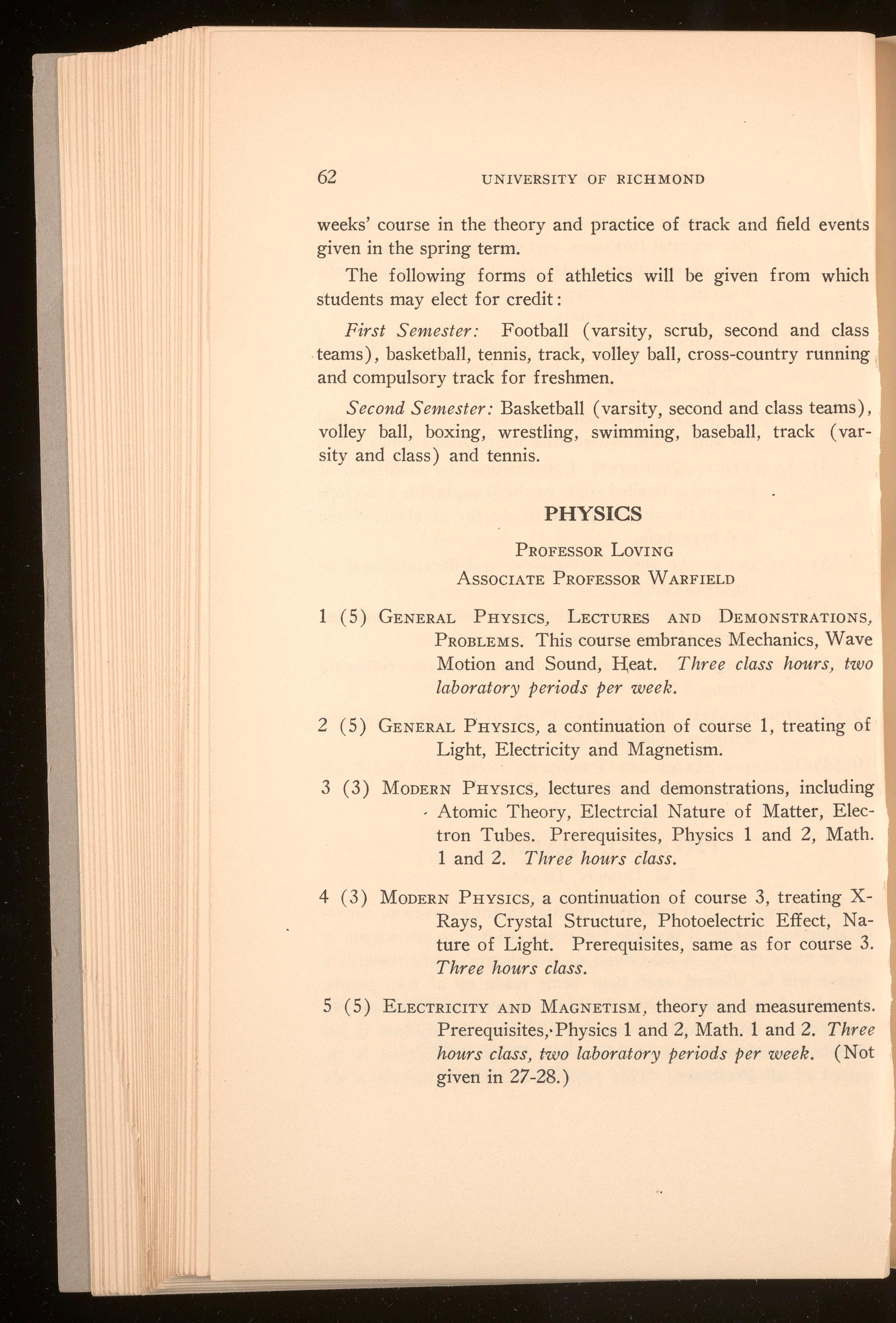
weeks' course in the theory and practice of track and field events given in the spring term.
The following forms of athletics will be given from which students may elect for credit:
First S eniester: Football ( varsity, scrub, second and class teams), basketball, tennis, track, volley ball, cross-country running and compulsory track for freshmen.
Second Semester : Basketball ( varsity, second and class teams) , volley ball, boxing, wrestling, swimming, baseball, track ( varsity and class) and tennis.
PROFESSORLOVING
ASSOCIATEPROFESSORWARFIELD
1 ( 5) GENERAL PHYSICS , LECTURES AND DEMONSTRATIONS , PROBLEMS.This course embrances Mechanics, Wave Motion and Sound, H;eat. Three class hours , two laboratory periods per week.
2 ( 5) GENERALPHYSICS, a continuation of course 1, treating of Light, Electricity and Magnetism
3 (3) MODERNPHYSICS, lectures and demonstrations, including - Atomic Theory, Electrcial Nature of Matter, Electron Tubes. Prerequisites, Physics 1 and 2, Math . 1 and 2. Three hours class.
4 (3) MODERNPHYSICS, a continuation of course 3, treating XRays, Crystal Structure, Photoelectric Effect, Nature of Light. Prerequisites, same as for course 3 Three hours class.
S ( 5) ELECTRICITYAND MAGNETISM , theory and measurements . Prerequisites,•Physics 1 and 2, Math. 1 and 2. Thre e hours class, two laboratory periods per week. (Not given in 27-28.)
6 ( 5) DIRECT CURRENT CrncurTs, theory and testing. Prerequisites, same as for course 5. Three hours class, two labor-atory periods per week. (Not given in 27-28.)
*7 ( 5) MECHANICS,fundamental laws of force and motion. Prerequisites, Physics 1 and 2, Mathematics 5 and 6. Three hours class, two laboratory periods per week.
*8 ( 5) HEAT AND LIGHT, thermodynamics and wave theory. Prerequisites, same as for course 7. Three hours class, two laboratory periods per week.
9 ( 5) ELECTRICALWAVES AND OscILLATIONS, and applications.
Prerequisites, Physics 1 and 2, Mathematics 5 and 6. Three hours class, two laboratory periods per week.
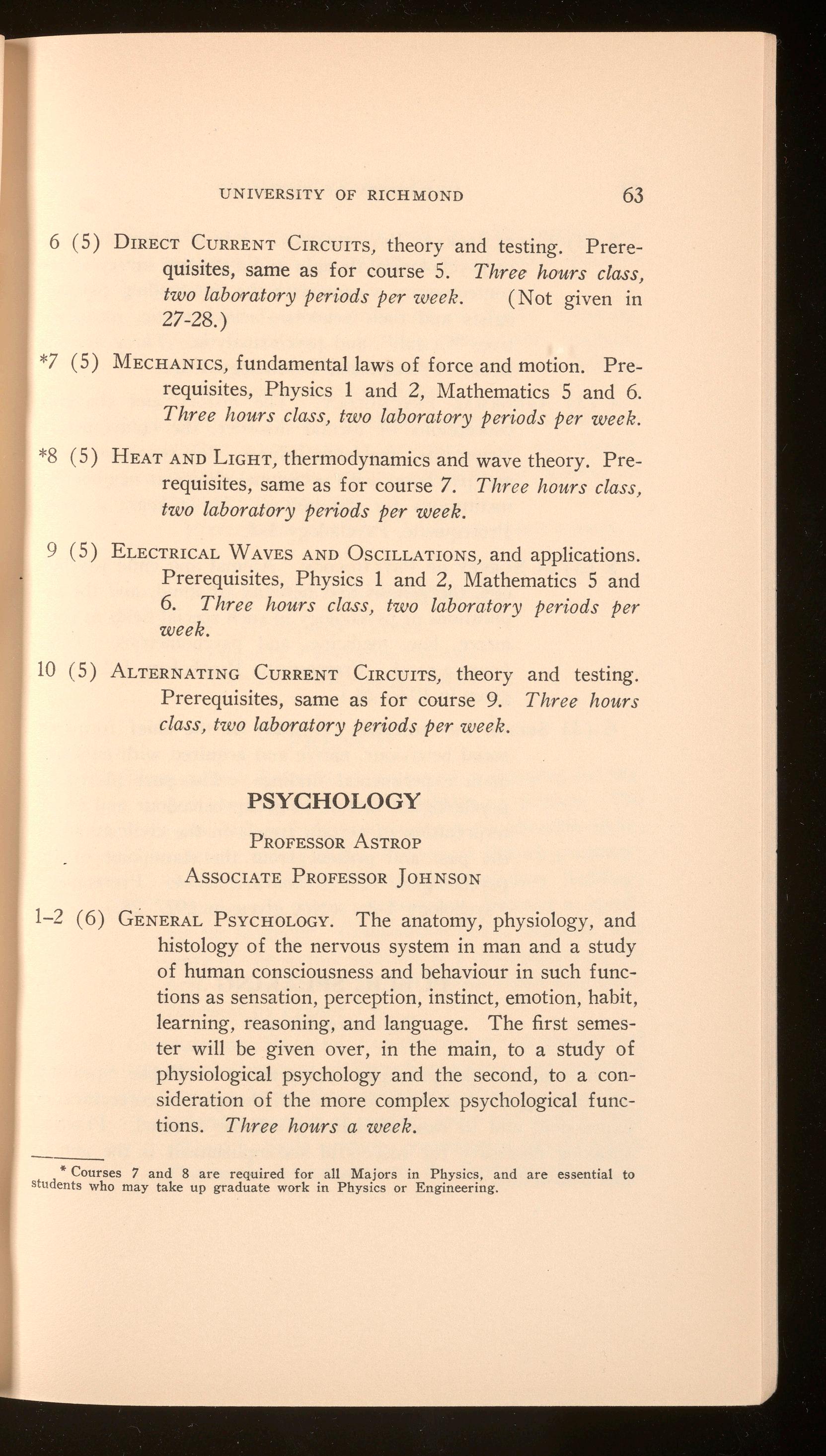
10 ( 5)
ALTERNATING CuRRENT CrncuITS, theory
Prerequisites, same as for course 9. class, two laboratory periods per week .
PROFESSORAsTROP
ASSOCIATEPROFESSORJOHNSON and testing. Three hours
1- 2 (6) GENERAL PSYCHOLOGY . The anatomy, physiology, and histology of the nervous system in man and a study of human consciousness and behaviour in such functions as sensation, perception, instinct, emotion, habit, learning, reasoning, and language. The first semester will be given over, in the main, to a study of physiological psychology and the second, to a consideration of the more complex psychological functions. Three hours a week.
• Courses 7 and 8 are required for all Majors in Physics , and are esseutial to stu dents who may take up graduate work in Physic s or Engineering
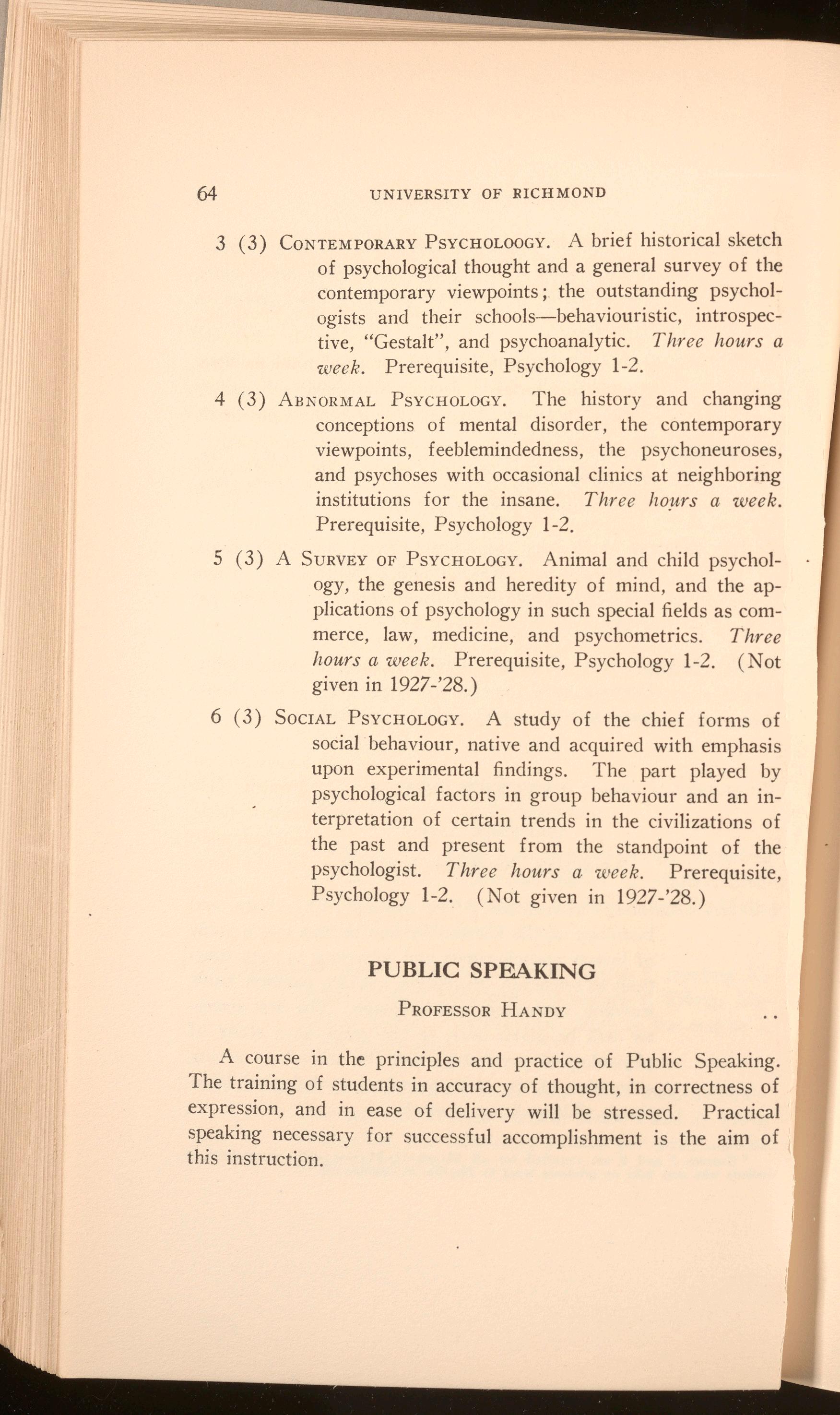
3 (3) CONTEMPORARYPsYCHOLOOGY.A brief historical sketch of psychological thought and a general survey of the contemporary viewpoints; the outstanding psychologists and their schools-behaviouristic, introspective, "Gestalt", and psychoanalytic. Three hours a •week. Prerequisite, Psychology 1-2.
4 (3) ABKORMALPSYCHOLOGY. The history and changing conceptions of mental disorder, the contemporary viewpoints, feeblemindedness, the psychoneuroses, and psychoses with occasional clinics at neighboring institutions for the insane. Three ho_urs a week. Prerequisite, Psychology 1-2.
5 (3) A SURVEYOF PSYCHOLOGY.Animal and child psychology, the genesis and heredity of mind, and the applications of psychology in such special fields as commerce, law, medicine, and psychometrics. Three hours a week. Prerequisite, Psychology 1-2. (Not given in 1927-'28.)
6 ( 3) SocIAL PSYCHOLOGY.A study of the chief forms of social behaviour, native and acquired with emphasis upon experimental findings. The part played by psychological factors in group behaviour and an interpretation of certain trends in the civilizations of the past and present from the standpoint of the psychologist. Three hours a week. Prerequisite, Psychology 1-2. (Not given in 1927-'28.)
A course in the principles and practice of Public Speaking. The training of students in accuracy of thought, in correctness of expression, and in ease of delivery will be stressed. Practical speaking necessary for successful accomplishment is the aim of this instruction.
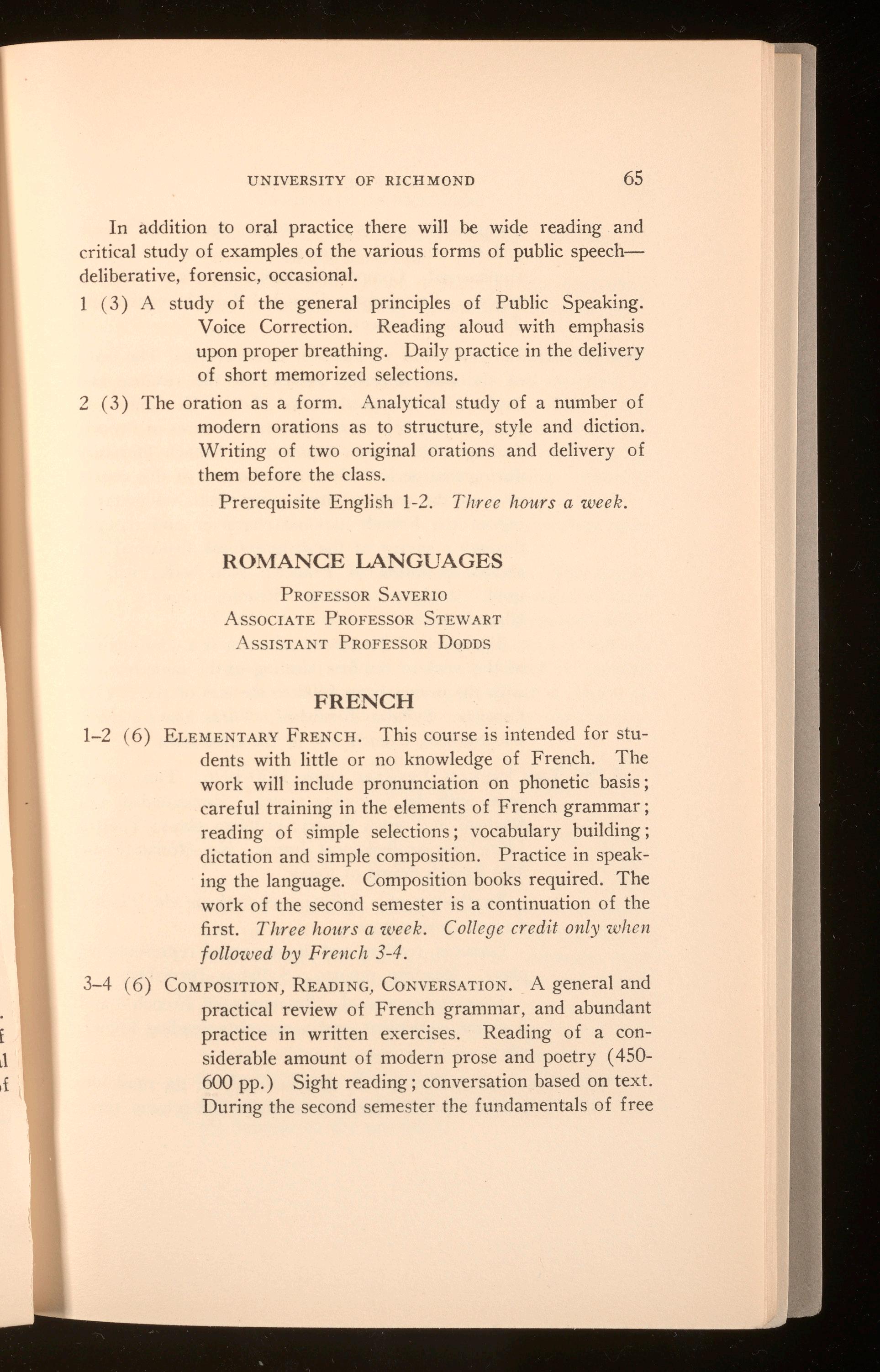
In addition to oral practic~ there will be wide reading and critical study of examples of the various forms of public speechdeliberative, forensic, occasional.
1 ( 3) A study of the general principles of Public Speaking. Voice Correction. Reading aloud with emphasis upon proper breathing. Daily practice in the delivery of short memorized selections.
2 ( 3) The oration as a form. Analytical study of a number of modern orations as to structure, style and diction. Writing of two original orations and delivery of them before the class.
Prerequisite English 1-2. Three hours a week.
PROFESSORSAVERIO
ASSOCIATEPROFESSORSTEWART
ASSISTANT PROFESSORDODDS
1-2 (6) ELEMENTARYFRENCH. This course is intended for students with little or no knowledge of French. The work will include pronunciation on phonetic basis ; careful training in the elements of French grammar ; reading of simple selections ; vocabulary building; dictation and simple composition. Practice in speaking the language. Composition books required. The work of the second semester is a continuation of the first. Three h01trs a week. College credit only when followed by French 3-4.
3-4 (6 ) COMPOSITION,READING, CoNVERSATION. A general and practical review of French grammar, and abundant practice in written exercises. Reading of a considerable amount of modern prose and poetry ( 450600 pp.) Sight reading ; conversation based on text. During the second semester the fundamentals of free
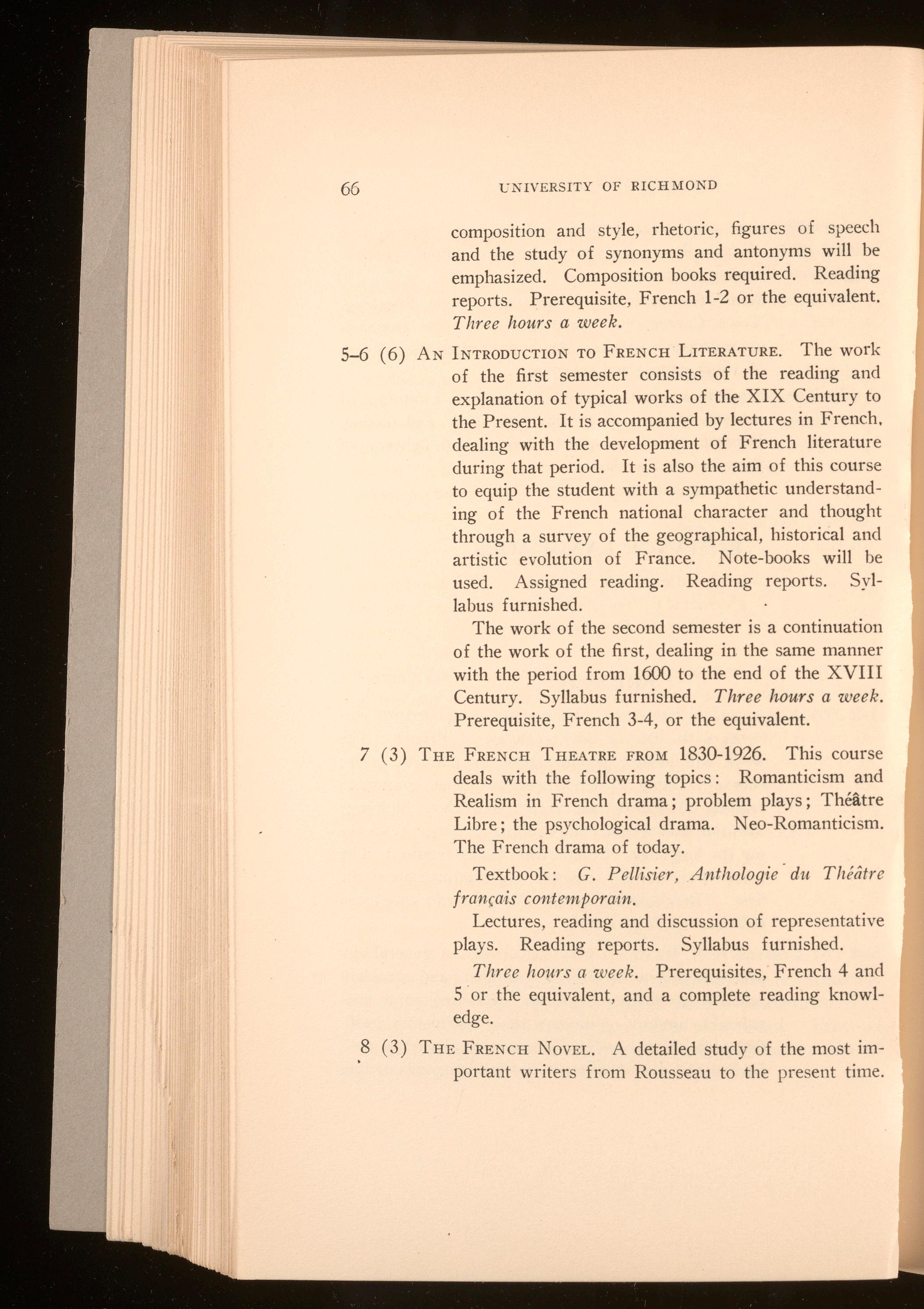
composition and style, rhetoric, figures of speech and the study of synonyms and antonyms will be emphasized. Composition books required. Reading reports. Prerequisite, French 1-2 or the equivalent. Three hours a week.
5-6 (6) AN INTRODUCTIONTO FRENCH LITERATURE. The work of the first semester consists of the reading and explanation of typical works of the XIX Century to the Present. It is accompanied by lectures in French, dealing with the development of French literature during that period. It is also the aim of this course to equip the student with a sympathetic understanding of the French national character and thought through a survey of the geographical, historical and artistic evolution of France. Note-books will be used. Assigned reading. Reading reports. Syllabus furnished.
The work of the second semester is a continuation of the work of the first, dealing in the same manner with the period from 1600 to the end of the XVIII Century. Syllabus furnished. Three hours a week. Prerequisite, French 3-4, or the equivalent.
7 (3) THE FRENCH THEATRE FROM 1830-1926. This course deals with the following topics : Romanticism and Realism in French drama; problem plays ; Theatre Libre; the psychological drama. Neo-Romanticism. The French drama of today.
Textbook: G. Pellisier, Anthologie · du Theatre francais contemporain.
Lectures, reading and discussion of representative plays. Reading reports. Syllabus furnished.
Three hours a week. Prerequisites, French 4 and 5 or the equivalent, and a complete reading knowledge.
8 (3) THE FRENCH NovEL. A detailed study of the most important writers from Rousseau to the present time.
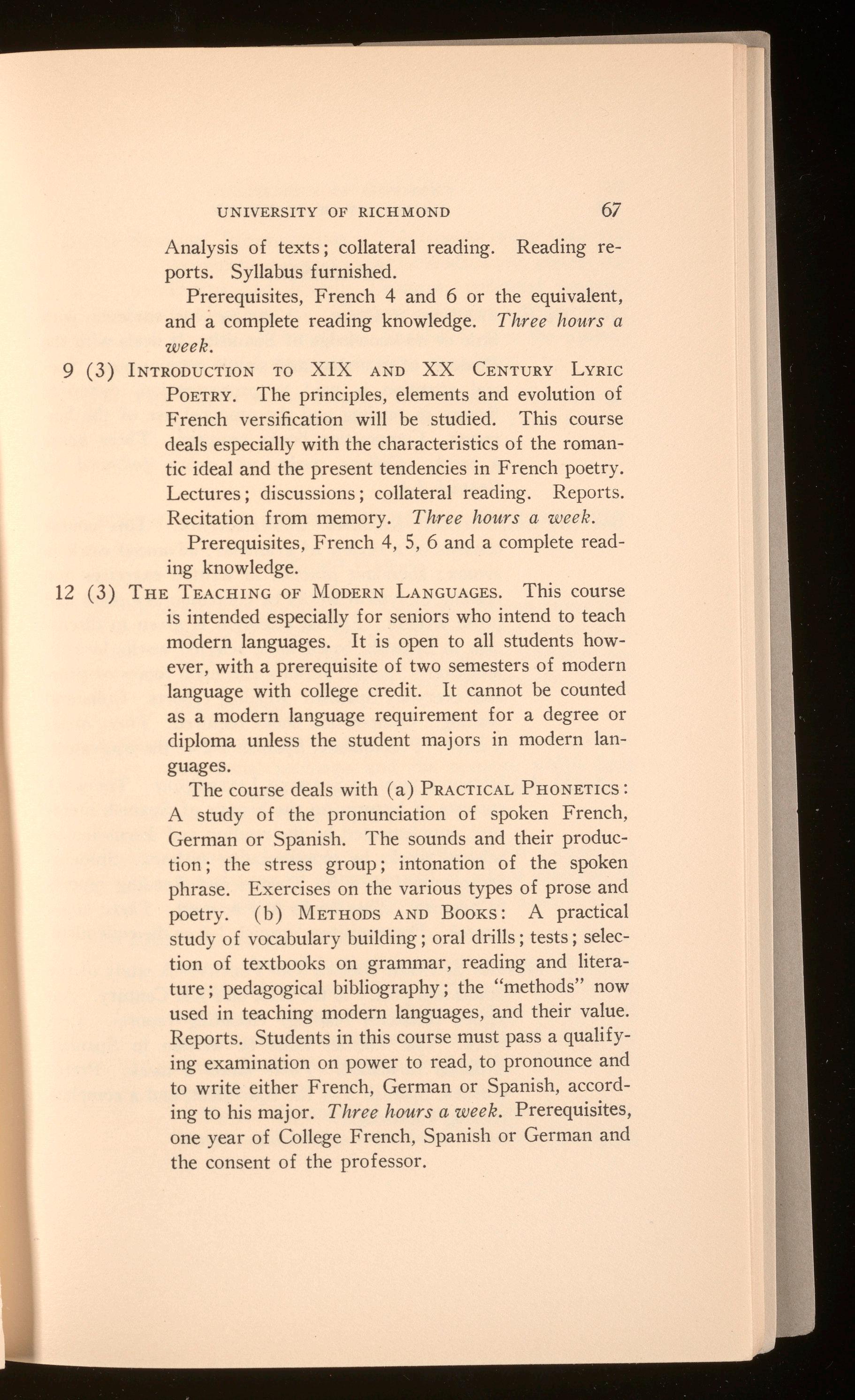
Analysis of texts; collateral reading. Reading reports. Syllabus furnished.
Prerequisites, French 4 and 6 or the equivalent, and a complete reading knowledge. Three hours a week.
9 (3) INTRODUCTIONTO XIX AND xx CENTURY LYRIC POETRY. The principles, elements and evolution of French versification will be studied. This course deals especially with the characteristics of the romantic ideal and the present tendencies in French poetry. Lectures; discussions; collateral reading. Reports. Recitation from memory. Three hours a week.
Prerequisites, French 4, 5, 6 and a complete reading knowledge.
12 ( 3) THE TEACHING OF MoDERN LANGUAGES. This course is intended especially for seniors who intend to teach modern languages. It is open to all students however, with a prerequisite of two semesters of modern language with college credit. It cannot be counted as a modern language requirement for a degree or diploma unless the student majors in modern languages.
The course deals with (a) PRACTICALPHONETICS: A study of the pronunciation of spoken French, German or Spanish. The sounds and their production; the stress group; intonation of the spoken phrase. Exercises on the various types of prose and poetry. (b) METHODSAND BooKs: A practical study of vocabulary building; oral drills; tests; selection of textbooks on grammar, reading and literature ; pedagogical bibliography; the "methods" now used in teaching modern languages, and their value. Reports. Students in this course must pass a qualifying examination on power to read, to pronounce and to write either French, German or Spanish, according to his major. Three hours a week. Prerequisites, one year of College French, Spanish or German and the consent of the professor.
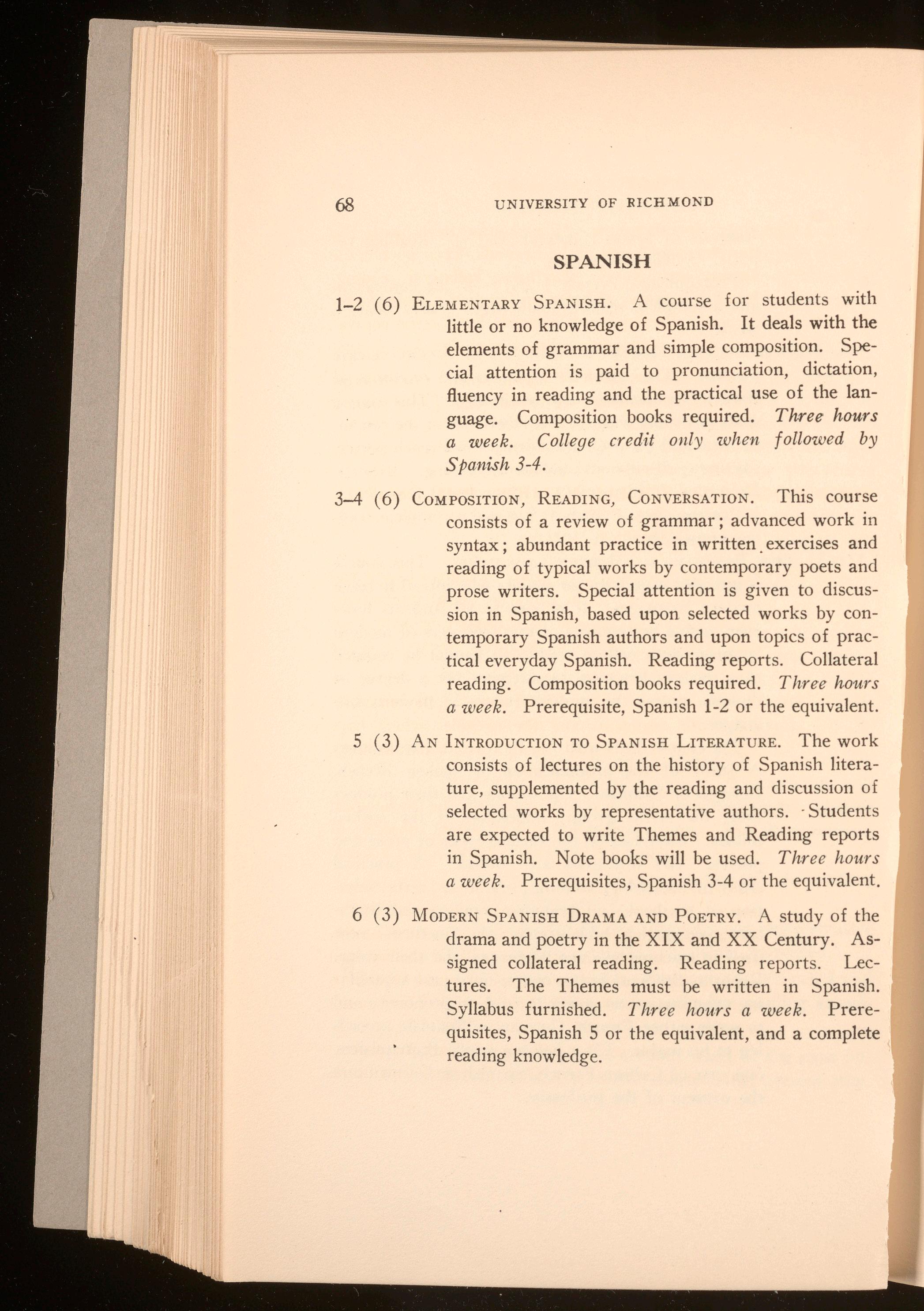
1-2 (6) ELEMENTARYSPANISH. A course for students with little or no knowledge of Spanish. It deals with the elements of grammar and simple composition. Special attention is paid to pronunciation, dictation, fluency in reading and the practical use of the language. Composition books required. Three hours a week. College credit 011ly when followed by Spanish 3-4.
3-4 (6) COMPOSITION,READING, CONVERSATION.This course consists of a review of grammar; advanced work in syntax; abundant practice in written. exercises and reading of typical works by contemporary poets and prose writers. Special attention is given to discussion in Spanish, based upon selected works by contemporary Spanish authors and upon topics of practical everyday Spanish. Reading reports. Collateral reading. Composition books required. Three hours a week. Prerequisite, Spanish 1-2 or the equivalent.
5 (3) AN INTRODUCTIONTO SPANISH LITERATURE. The work consists of lectures on the history of Spanish literature, supplemented by the reading and discussion of selected works by representative authors. · Students are expected to write Themes and Reading reports in Spanish. Note books will be used. Three hours a week. Prerequisites, Spanish 3-4 or the equivalent.
6 (3) MODERNSPANISH DRAMAANDPoETRY. A study of the drama and poetry in the XIX and XX Century. Assigned collateral reading. Reading reports. Lectures. The Themes must be written in Spanish. Syllabus furnished. Three hours a week. Prerequisites, Spanish 5 or the equivalent, and a complete reading knowledge.
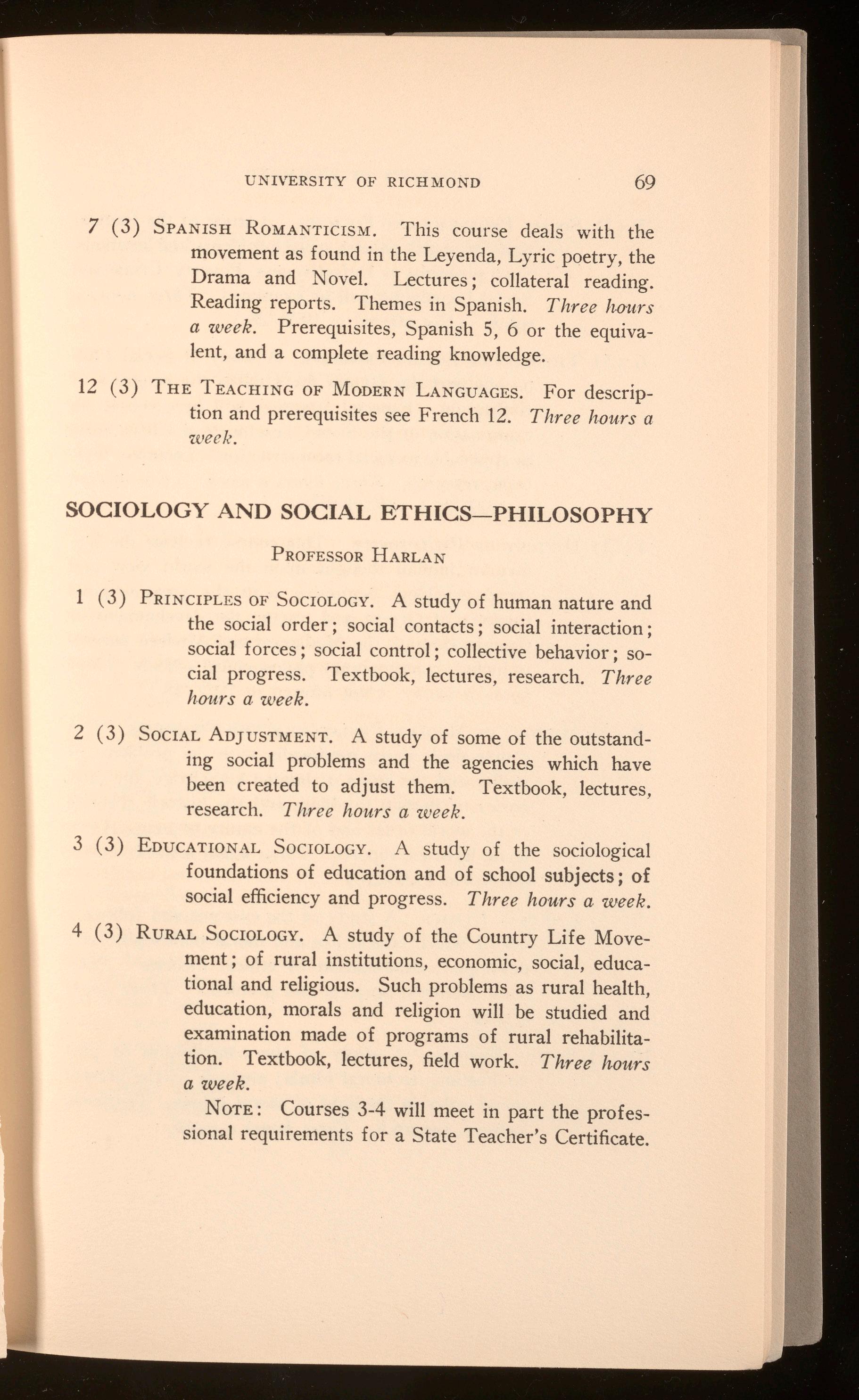
7 (3) SPANISH ROMANTICISM. This course deals with the movement as found in the Leyenda, Lyric poetry, the Drama and Novel. Lectures; collateral reading. Reading reports. Themes in Spanish. Three hours a week. Prerequisites, Spanish 5, 6 or the equivalent, and a complete reading knowledge.
12 ( 3) THE TEACHING OF MODERNLANGUAGES. For description and prerequisites see French 12. Three hours a we ek.
PROFESSORHARLAN
1 (3) PRINCIPLESOF SocIOLOGY. A study of human nature and the social order ; social contacts ; social interaction ; social forces ; social control; collective behavior; social progress. Textbook, lectures, research. Three hours a week.
2 (3) SocIAL ADJUSTMENT. A study of some of the outstanding social problems and the agencies which have been created to adjust them. Textbook, lectures, research. Three hours a week.
3 (3) EDUCATIONALSocIOLOGY. A study of the sociological foundations of education and of school subjects; of social efficiency and progress. Three hours a week.
4 (3) RuRAL SocIOLOGY. A study of the Country Life Movement; of rural institutions, economic, social, educational and religious. Such problems as rural health, education, morals and religion will be studied and examination made of programs of rural rehabilitation. Textbook, lectures, field work. Three hours a week.
NOTE: Courses 3-4 will meet in part the professional requirements for a State Teacher's Certificate.
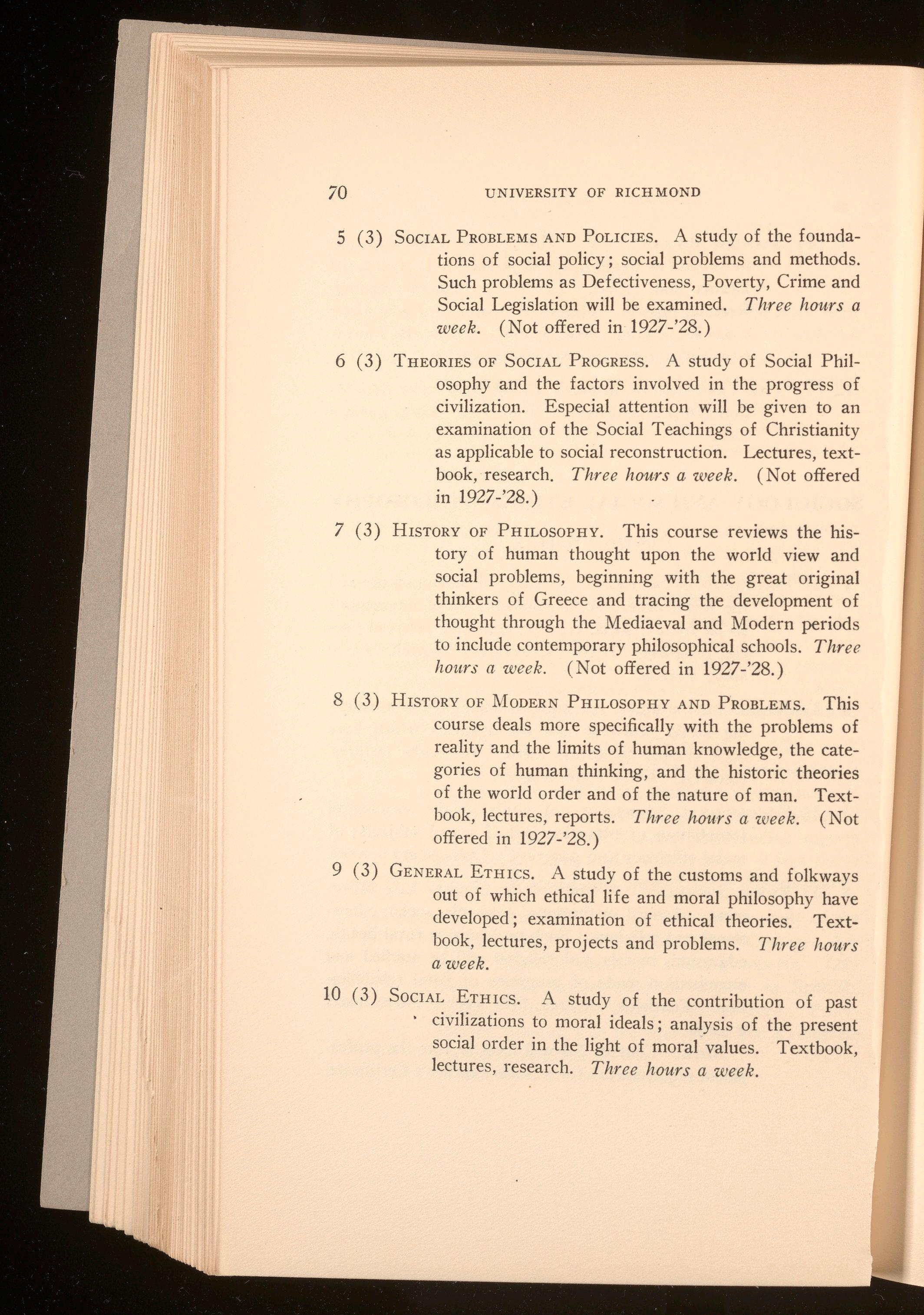
5 ( 3) SocIAL PROBLEMSANDPoucIEs. A study of the foundations of social policy; social problems and methods. Such problems as Defectiveness, Poverty, Crime and Social Legislation will be examined. Three hours a week. (Not offered in 1927-'28.)
6 ( 3) THEORIESOF SocIAL PROGRESS. A study of Social Philosophy and the factors involved in the progress of civilization. Especial attention will be given to an examination of the Social Teachings of Christianity as applicable to social reconstruction. Lectures, textbook, research. Three hours a week. (Not offered in 1927-'28.)
7 (3) HISTORYOF PHILOSOPHY. This course reviews the history of human thought upon the world view and social problems, beginning with the great original thinkers of Greece and tracing the development of thought through the Mediaeval and Modern periods to include contemporary philosophical schools. Three hours a week. (Not offered in 1927-'28.)
8 ( 3) HISTORYOF MoDERN PHILOSOPHYAND PROBLEMS. This course deals more specifically with the problems of reality and the limits of human knowledge, the categories of human thinking, and the historic theories of the world order and of the nature of man. Textbook, lectures, reports. Three hours a week. (Not offered in 1927-'28.)
9 (3) GENERALETHICS. A study of the customs and folkways out of which ethical life and moral philosophy have developed; examination of ethical theories. Textbook, lectures, projects and problems. Three hours a week.
10 ( 3) SOCIAL ETHICS. A study of the contribution of past civilizations to moral ideals ; analysis of the present social order in the light of moral values. Textbook, lectures, research. Three hours a week.
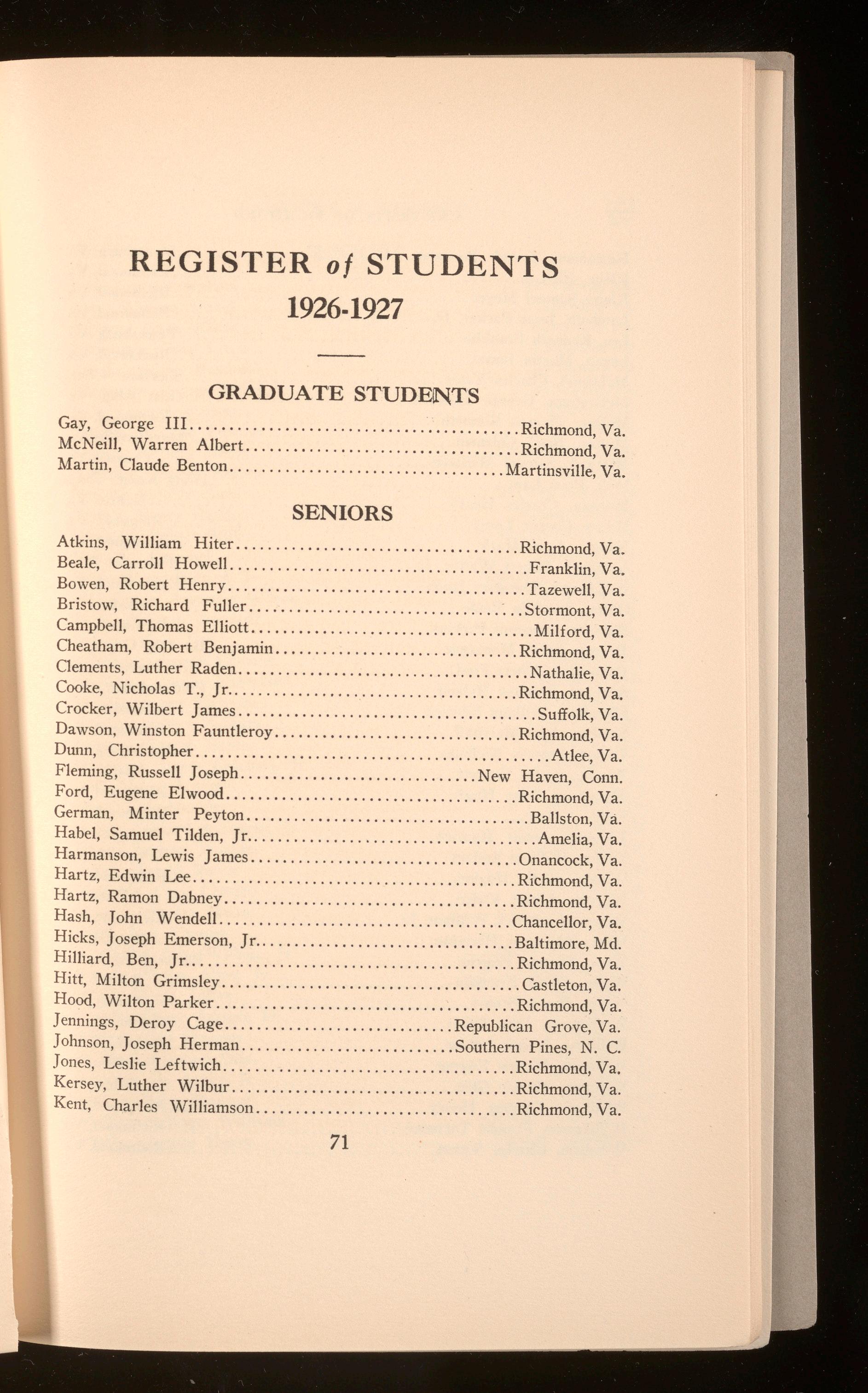
Gay, George III .......................................... Richmond, Va. McN eill, Warren Albert. .................................. Richmond, Va.
Martin, Claude Benton ................................... Martinsville, Va.
Atkins, William Hiter. ................................... Richmond, Va. Beale, Carroll Howell ...................................... Franklin, Va. Bowen, Robert Henry ..... .. .. ................... Tazewell, Va.
Bristow, Richard Fuller ................................ · Stormont, Va. Campbell, Thomas Elliott. ................................... Milford, Va. Cheatham, Robert Benjamin ........ ... ....... Richmond, Va. Clements, Luther Raden ..................................... Nathalie, Va. Cooke, Nicholas T. , Jr ..................................... Richmond, Va. Crocker, Wilbert James ......... .. . ............ Suffolk, Va. Dawson, Winston Fauntleroy ........... .... .... Richmond, Va. Dunn, Christopher. ......... .............. ............ Atlee, Va. Fleming, Russell Joseph .............................. New Haven, Conn. Ford, Eugene Elwood ..... ........ ......... Richmond, Va. German, Minter Peyton ..................... ............ Ballston, Va. Habel, Samuel Tilden, Jr ......................... .. .... Amelia, Va. Harmanson, Lewis James .............. ... ................. Onancock, Va. Hartz, Edwin Lee ......................................... Richmond, Va. Hartz, Ramon Dabney ..................................... Richmond, Va. Hash, John Wendell ..................................... Chancellor, Va. Hicks, Joseph Emerson, Jr ............................ : .... Baltimore, Md. Hilliard, Ben, Jr ........... . ................... Richmond, Va. Hitt, Milton Grimsley ...................................... Castleton, Va. Hood, Wilton Parker ...................................... Richmond, Va. Jennings, Deroy Cage ................ .. ........... Republican Grove, Va. Johnson, Joseph Herman ........................... Southern Pines, N. C. Jones, Leslie Leftwich ..................................... Richmond, Va. Kersey, Luther Wilbur .................................... Richmond, Va. Kent, Charles Williamson .. .. ..... .... Richmond, Va.
71
Kincannon, Joseph Bo zeman ....
Klein, Ellis ....
Klein, Samuel Meyer ...
Lambeth, Jes se Parker, Jr ...
Lee , K enneth Franklin ...
Logan, Martin James
M cDaniel, Charle s Yates ..
McGr aham , George Howard
McRae , Thomas Kenneth ..
Minter, Basil Coleman ...
Mitchell, Samuel Williams
M ok , Poon Lam .
M organ, Charl es H enry
M yers, Cooper Loui s
Naugle, John Mark .....
Ne ath ery , Robert Walter, Jr
Noffsinger , Theodore Jacob
Onle y, Franklin Reide
Patt eson, Moncure Perkins
P enney, Perry Montague
Ragozzino, Albert Fred ....
Sanford, Thomas Ryland
Slaught er , William Ed ward
Snelling, John Marshall
T aylor, Francis Nichola s
Tharpe, Lester Everett
Thompson, Isaac Hugh
T odd, Vers er
Trimmer, Jame s Mauric
V aiden, William Rodney
Walton, Leslie Hughes
,varren, Almon Vaden
W enzel, Frederick William, Jr
W est, Benjamin Herndon
West, Thomas Eugene
White , David Franklin
White, Henry Stuart. ...
Whitehurst, John Davis
Williams, J os.eph Judson
Williams , Marion Eug ene
Williams , Marvin Glen
Williams, Thomas Henry
Williamson, Francis Torrence
\V oodson, Charles Sutton
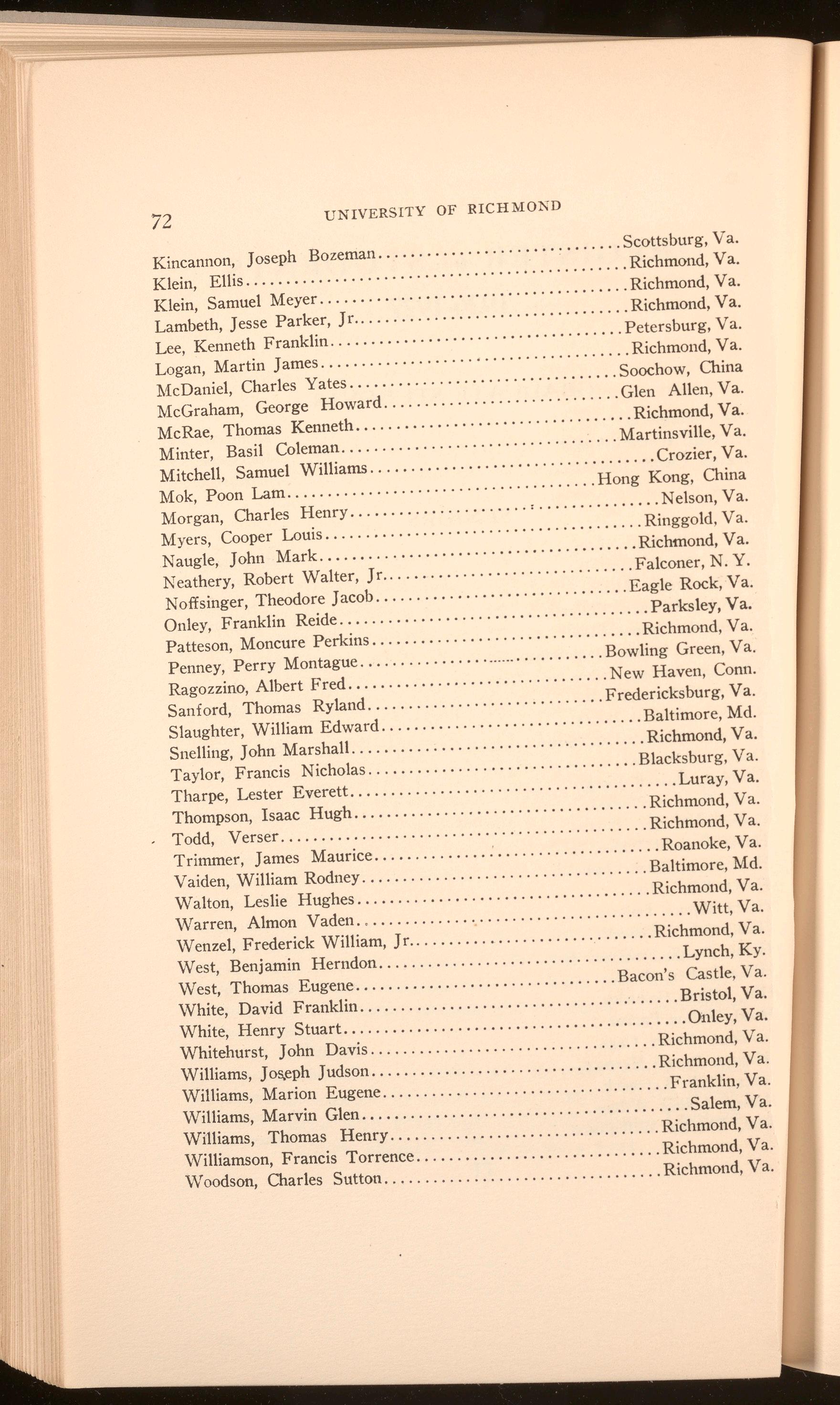
. Scott sburg, Va.
Richmond, Va.
. Richmond, Va.
Richmond, Va
P etersburg , Va .
.Richm ond, Va .
Soochow, China
Glen All en, Va .
Richmond, Va.
Martinsville , Va.
.. Crozier, Va
H ong Kong , China
.. Nel son, Va .
. Ring gold, V a.
. Richmond, Va.
Falc oner , N Y .
Eagl e Rock , Va.
Park sley, Va.
. Richm ond , Va.
Bowling Gr een, Va .
N ew Hav en , Conn
.. Fredericksburg, Va
. Baltim or e, Md .
Richmond, Va
.. Black sbur g , V a.
.Lura y, Va .
Richm ond, V a .
R ichm ond, Va
. Roan oke , Va.
. Baltimore , Md.
. Richm ond, Va .
Witt , Va.
.. Richmond, Va.
Lynch , Ky .
B acon's Castle , Va
. Bristol, Va.
. Onley, Va.
Richmond , V a.
.Richmond, Va.
Franklin , Va
. Salem , Va.
Richmond, Va
.. Richmond, Va.
Richmond , Va
Bank, Samuel Wallace Petersburg, Va.
Barr, William David ....................................... Danville, Va.
Bridger, Alton Elison ..................................... Carrsville, Va.
Bromleigh, Gray Lewis .................................... Litwalton, Va.
Brooks, Edgar Randolph .................................. Richmond, Va.
Burroughs, George Wiley .................................. Richmond, Va.
Cale, Edward Graham ....................................... Tyner, N. C.
Cullers, William Edward Bentonville, Va.
Decker, Richard Henry Fredericksburg, Va.
De Motte, Joseph Eugene .................................. Richmond, Va.
Dorsey, Ridgely Corbin Bowling Green, Va.
Dudley, Henry Haddon Appomattox, Va.
Edwards, Robert Willis Newport News, Va.
Emrock, Emanuel Richmond, Va.
Fary, Oscar Willard, Jr ............................. Gloucester Point, Va.
Fleischman, Augustus Wilson Richmond, Va.
Gary, William Turnbull ............................ Richmond, Va.
Gibson, Mack Lee Cordova, S. C.
Gladstone, Joseph Edward ................................... Exmore, Va.
Goodman, James Hammond Frederick, Md.
Gordon, James Harrison Richmond, Va.
Grundy, Robert William ................................... Richmond, Va.
Herman, David Jacob Richmond, Va.
Harwood, James Coleman, Jr .............................. Richmond, Va.
Hill, Harry Lothair .................................... Greenville, S. C.
Hunt, John Meekin ......................................... Mt. Airy, Va.
Irving, Willard Ashburne, Jr ........................... Charlottesville, Va.
Jarvis, Andrew Preston .................................... Richmond, Va.
Kelly, Harold Ratrie Culpeper, Va.
Kennedy, Cyril Crozier .................................... Richmond, Va.
Kersey, Wesley Haron .......... : Richmond, Va.
Kidd, Joel Thomas ....................................... Scottsville, Va.
Kincheloe, John William, Jr
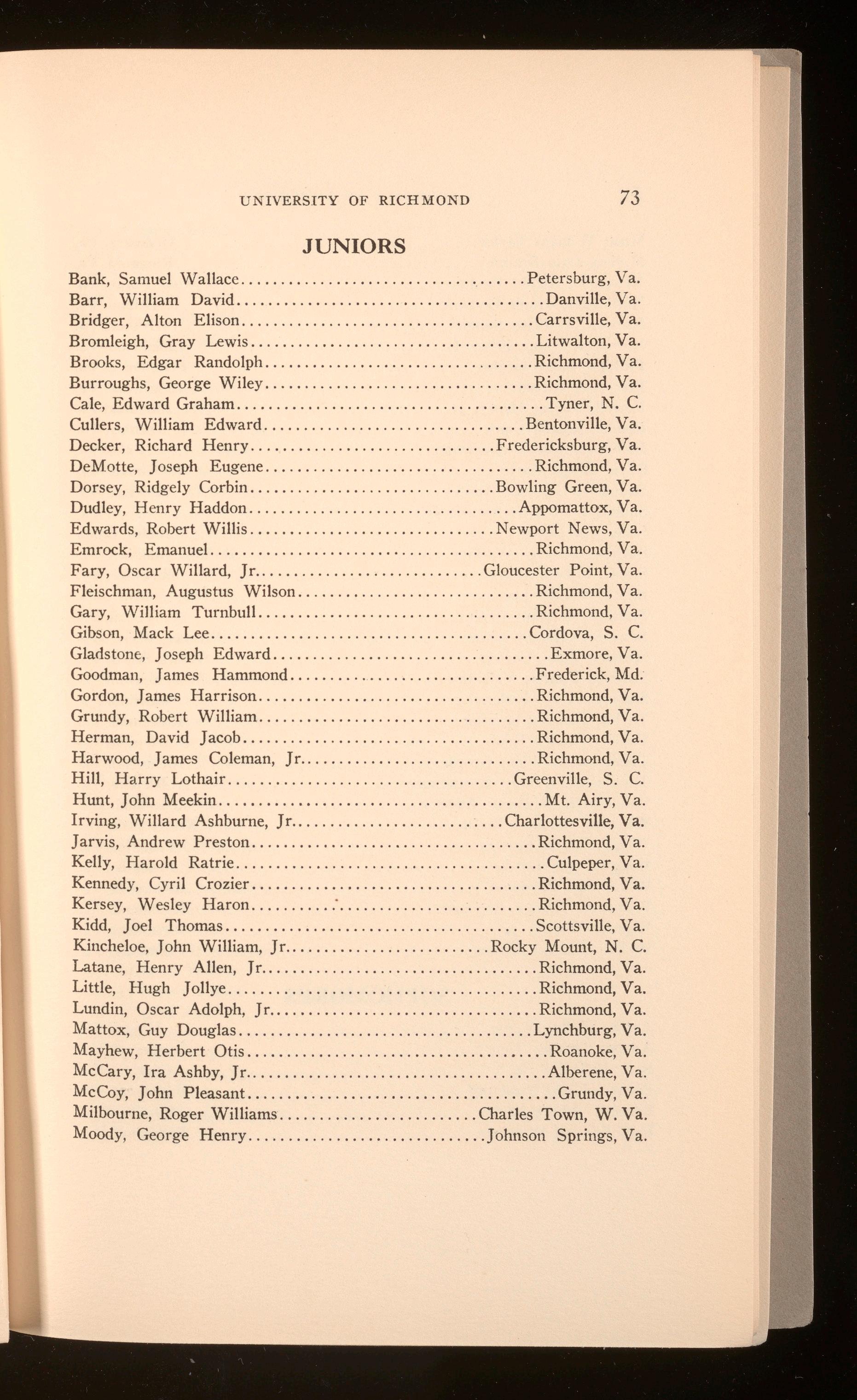
Rocky Mount, N. C.
Latane, Henry Allen, Jr Richmond, Va.
Little, Hugh Jollye Richmond, Va.
Lundin, Oscar Adolph, Jr .................................. Richmond, Va.
Mattox, Guy Douglas Lynchburg, Va.
Mayhew, Herbert Otis Roanoke, Va.
McCary, Ira Ashby, Jr ...................................... Alberene, Va.
McCoy, John Pleasant Grundy, Va.
Milbourne, Roger Williams
Moody, George Henry ..............................
Charles Town, W. Va.
Johnson Springs, Va.
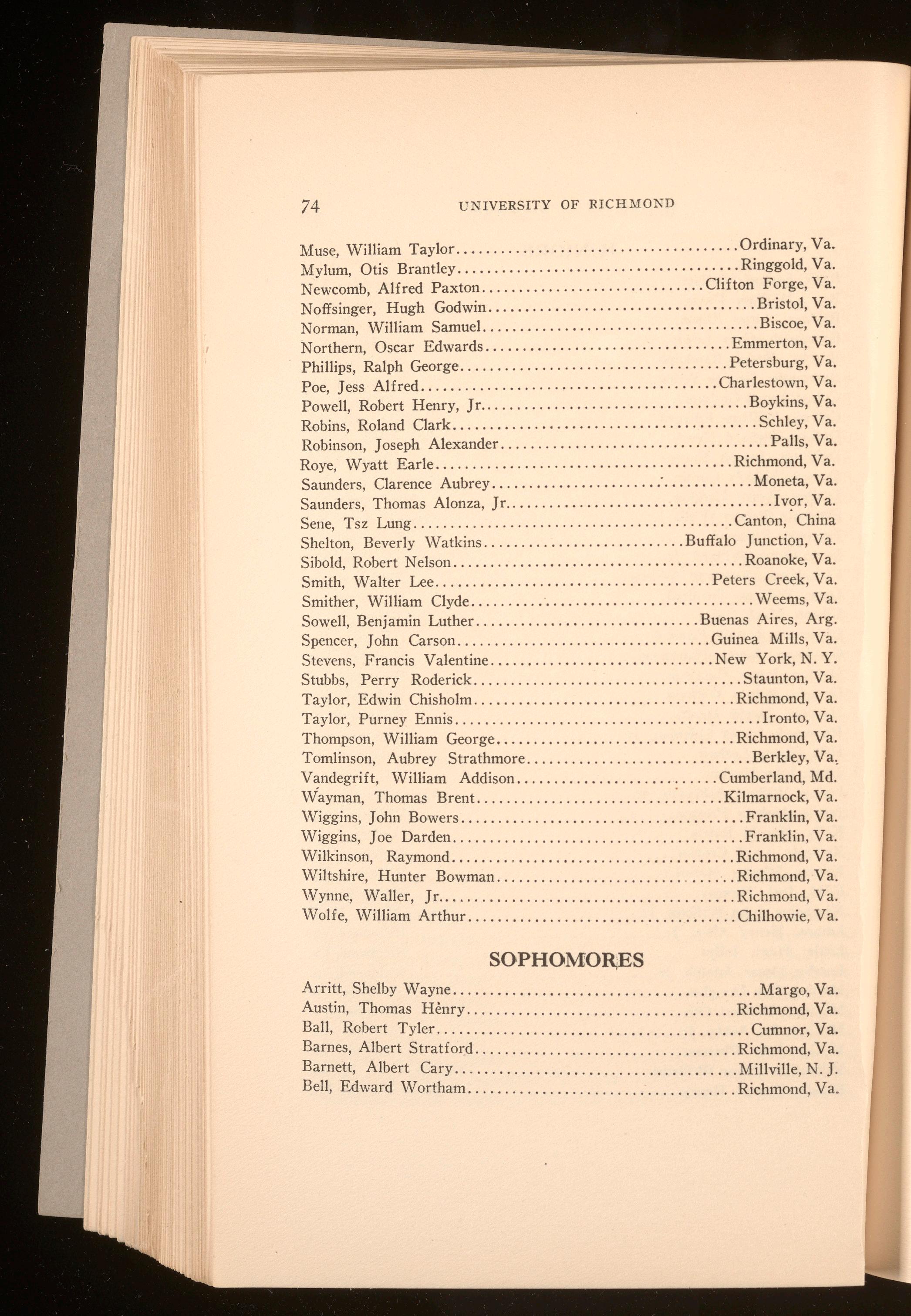
Muse, William Taylor ...................................... Ordinary, Va.
Mylum, Otis Brantley ...................................... Ringgold, Va.
Newcomb, Alfred Paxton .............................. Oifton Forge, Va.
Noffsinger, Hugh Godwin .................................... Bristol, Va. Norman, William Samuel. .................................... Biscoe, Va. Northern, Oscar Edwards ................................. Emmerton, Va. Phillips, Ralph George .................................... Petersburg, Va. Poe, Jess Alfred ........................................ Charlestown, Va. Powell, Robert Henry, Jr .................................... Boykins, Va.
Robins, Roland Clark ......................................... Schley, Va. Robinson, Joseph Alexander .................................... Palls, Va.
Roye, Wyatt Earle ........................................ Richmond, Va.
Saunders, Clarence Aubrey : ............ Moneta, Va. Saunders, Thomas Alonza, Jr .................................... lv?r, Va.
Sene, Tsz Lung ........................................... Canton, China
Shelton, Beverly Watkins ........................... Buffalo Junction, Va.
Sibold, Robert Nelson ....................................... Roanoke, Va.
Smith, Walter Lee ..................................... Peters Creek, Va.
Smither, William Clyde ...................................... Weems, Va. Sowell, Benjamin Luther .............................. Buenas Aires, Arg. Spencer, John Carson .................................. Guinea Mills, Va.
Stevens, Francis Valentine .............................. New York, N. Y.
Stubbs, Perry Roderick .................................... Staunton, Va.
Taylor, Edwin Chisholm ................................... Richmond, Va. Taylor, Purney Ennis ......................................... Ironto, Va. Thompson, William George ................................ Richmond, Va. Tomlinson, Aubrey Strathmore .............................. Berkley, Va, Vandegrift, William Addison ........................... Cumberland, Md. Wayman, Thomas Brent. .......................... · Kilmarnock, Va. \Viggins, John Bowers ...................................... Franklin, Va. Wiggins, Joe Darden ....................................... Franklin, Va. Wilkinson, Raymond ...................................... Richmond, Va. Wiltshire, Hunter Bowman ......................... . ...... Richmond, Va. \Vynne, Waller, Jr. ....................................... Richmond, Va. Wolfe, William Arthur .................................... Chilhowie, Va.
Arritt, Shelby Wayne ......................................... Margo, Va. Austin, Thomas Henry .................................... Richmond, Va. Ball, Robert Tyler .......................................... Cumnor, Va. Barnes, Albert Stratford ................................... Richmond, Va. Barnett, Albert Cary ...................................... Millville, N. J. Bell, Edward Wortham .................................... Richmond, Va.
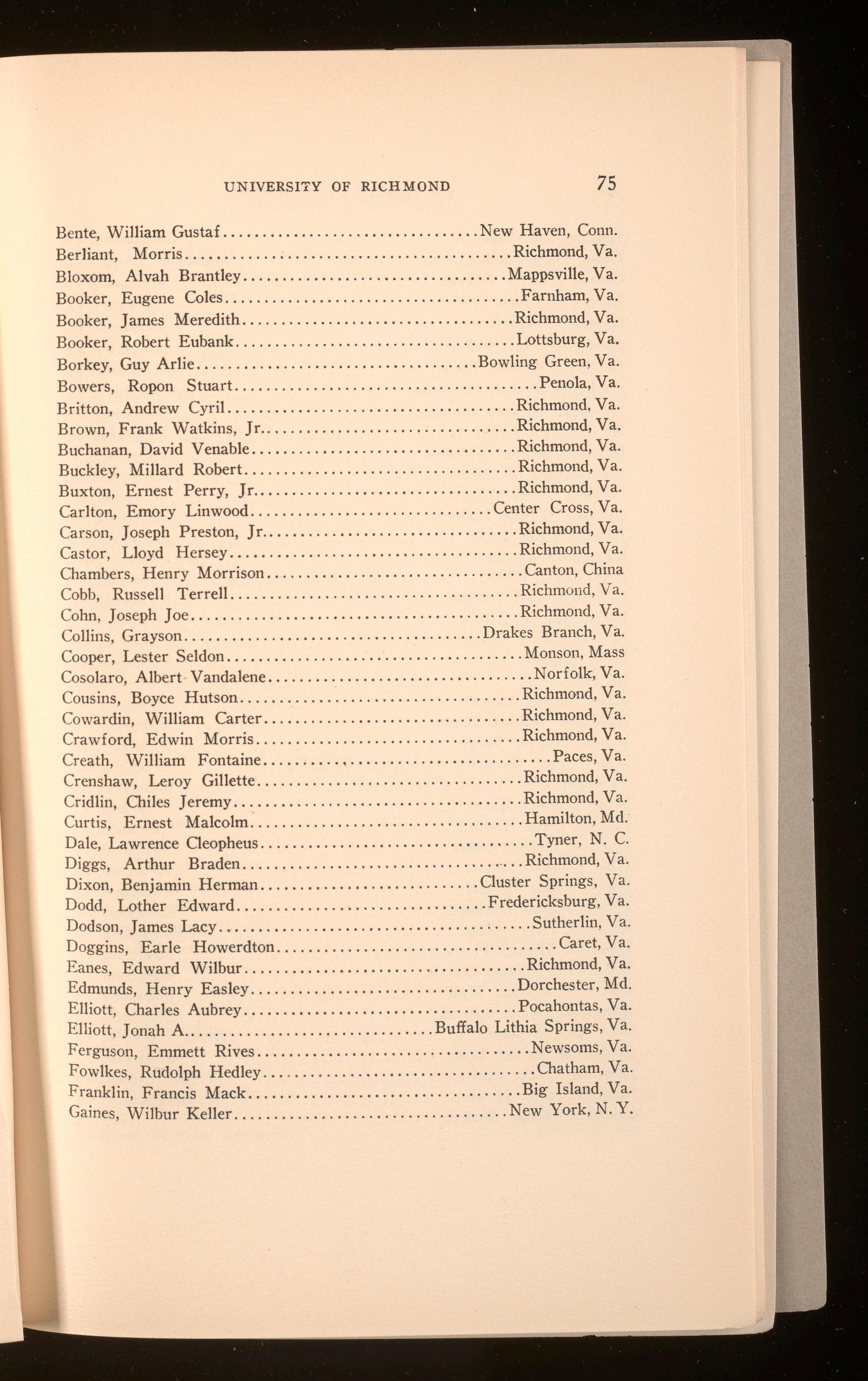
Bente, William Gustaf .................................
New Haven, Conn. Berliant, Morris .......................................... Richmond, Va. Bloxom, Alvah Brantley .................................. Mapps ville, Va. Booker, Eugene Coles ...................................... Farnham, Va. Booker, James Meredith ................................... Richmond, Va. Booker, Robert Eubank .................................... Lotts burg, Va. Borkey, Guy Arlie .................................... Bowling Green, Va. Bowers, Ropon Stuart. ...................................... Penola, Va. Britton, Andrew Cyril. .................................... Richmond, Va. Brown, Frank Watkins, Jr ................................. Richmond, Va. Buchanan, David Venable .................................. Richmond, Va. Buckley, Millard Robert. .................................. Richmond, Va. Buxton, Ernest Perry, Jr .................................. Richmond, Va. Carlton, Emory Linwood ............................... Center Cross, Va. Carson, Joseph Preston, Jr ................................. Richmond, Va. Castor, Lloyd Hersey ..................................... Richmond, Va. Chambers, Henry Morrison ................................. Canton, China Cobb, Russell Terrell ..................................... Richmond, Va. Cohn, Joseph Joe .......................................... Richmond, Va. Collins, Grayson ...................................... Drakes Branch, Va. Cooper, Lester Seldon ...................................... Monson, Mass Cosolaro, Albert Vandalene .................................. Norfolk, Va. Cousins, Boyce Hutson .................................... Richmond, Va. Cowardin, William Carter ................................. Richmond, Va. Crawford, Edwin Morris .................................. Richmond, Va. Creath, William Fontaine ..........•.......................... Paces, Va. Crenshaw, Leroy Gillette .................................. Richmond, Va. Cridlin, Chiles Jeremy ..................................... Richmond, Va. Curtis, Ernest Malcolm ................................... Hamilton, Md. Dale, Lawrence Oeopheus ................................... Tyner, N. C. Diggs, Arthur Braden ..................................... Richmond, Va. Dixon, Benjamin Herman ............................ Cluster Springs, Va. Dodd, Lother Edward ................................ Fredericksburg, Va. Dodson, James Lacy ........................................ Sutherlin, Va. Doggins, Earle Howerdton .................................... Caret, Va. Eanes, Edward Wilbur .................................... Richmond, Va. Edmunds, Henry Easley .................................. Dorchester, Md. Elliott, Charles Aubrey ....... , ........................... Pocahontas, Va. Elliott, Jonah A ................................ Buffalo Lithia Springs, Va. Ferguson, Emmett Rives ................................... Newsoms, Va. Fowlkes, Rudolph Hedley ................................... Chatham, Va. Franklin, Francis Mack ................................... Big Island, Va.
Gaines, Wilbur Keller ................................... New York, N. Y.
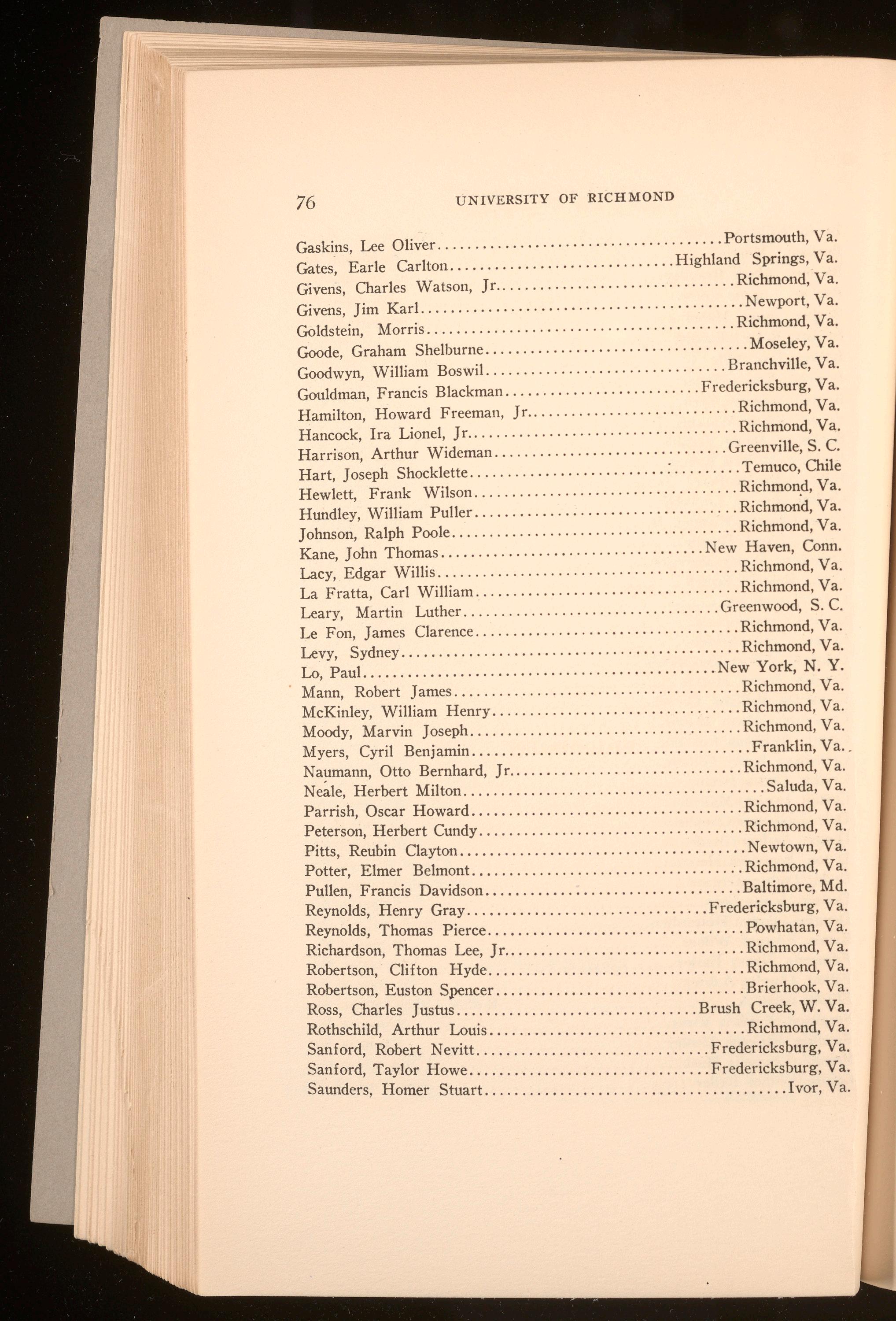
76
Gaskins, Lee Oliver . .. ..
Gates, Earle Carlton ..
Givens, Charles Watson, Jr ......
Givens, Jim Karl. ....
Goldstein, Morris .....
Goode, Graham Shelburne ....
Goodwyn, William Boswil ..
Gouldman, Francis Blackman .
Hamilton, Howard Freeman , Jr ..
Hancock, Ira Lionel, Jr .
Harrison , Arthur Wideman .
Hart, Joseph Shocklette .....
Hewlett, Frank Wilson . .
Hundley , William Pull er ..
Johnson, Ralph Poole .. .....
Kane, John Thoma s
Lacy , Edgar Willis .
La Fratta, Carl Willi am ..
Lear y, Martin Luth er ..
Le Fon , James Clarence
Levy, Sydney ....
Lo, Paul. ....
Mann, Robert Jam es
McKinley, William Henry .
Moody, Marvin Joseph ..
Myers, Cyril Benjamin ....
Naumann, Otto Bernhard, Jr ..
N e~le, Herbert Milton ....
Parrish, Oscar Howard ..
Peterson, Herbert Cundy .....
Pitts, Reubin Clayton ...
Potter, Elmer Belmont. ....
Pullen, Francis Davidson ......
Reynolds, Henry Gray ............
Reynolds, Thomas Pierce
Richardson, Thomas Lee, Jr .....
Robertson, Clifton Hyde .........
Robertson, Euston Spencer ..
Ross, Charles Justus ............
Rothschild, Arthur Louis ....
Sanford, Robert Nevitt .. ....
Sanford, Taylor Howe ............
Saunders , Homer Stuart ..
.. Portsmouth, Va.
Highland Springs, Va.
. Richmond, Va
.. Newport, Va
Richmond, Va.
Moseley, Va.
Branchville, Va .
Fr edericksburg, Va.
. Richmond, Va.
. Richmond, Va.
. Gr eenville, S. C.
. Temuco, Chile
Richmon~ , Va.
Richmond, Va.
Richmond, Va.
. New Haven, Conn.
. Richmond, Va
Richmond , Va.
.. Greenwood, S C.
Richmond, Va .
. Richmond, Va.
New York, N. Y.
Richmond , Va
Richmond , Va
Richmond, Va
.Franklin, Va . .
. Richmond , Va.
.. Saluda , Va.
Richmond, Va .
Richm ond, Va.
.. Newtown, Va
Richmond , Va.
. Baltimore, Md.
.. Fredericksburg , Va
..... Powhatan, Va.
Richmond , Va.
. Richmond, Va.
... Brierhook, Va .
Brush Creek, W. Va.
.... Richmond , Va.
. Fredericksburg , Va.
.. Fredericksburg, Va.
...... Ivor , Va.
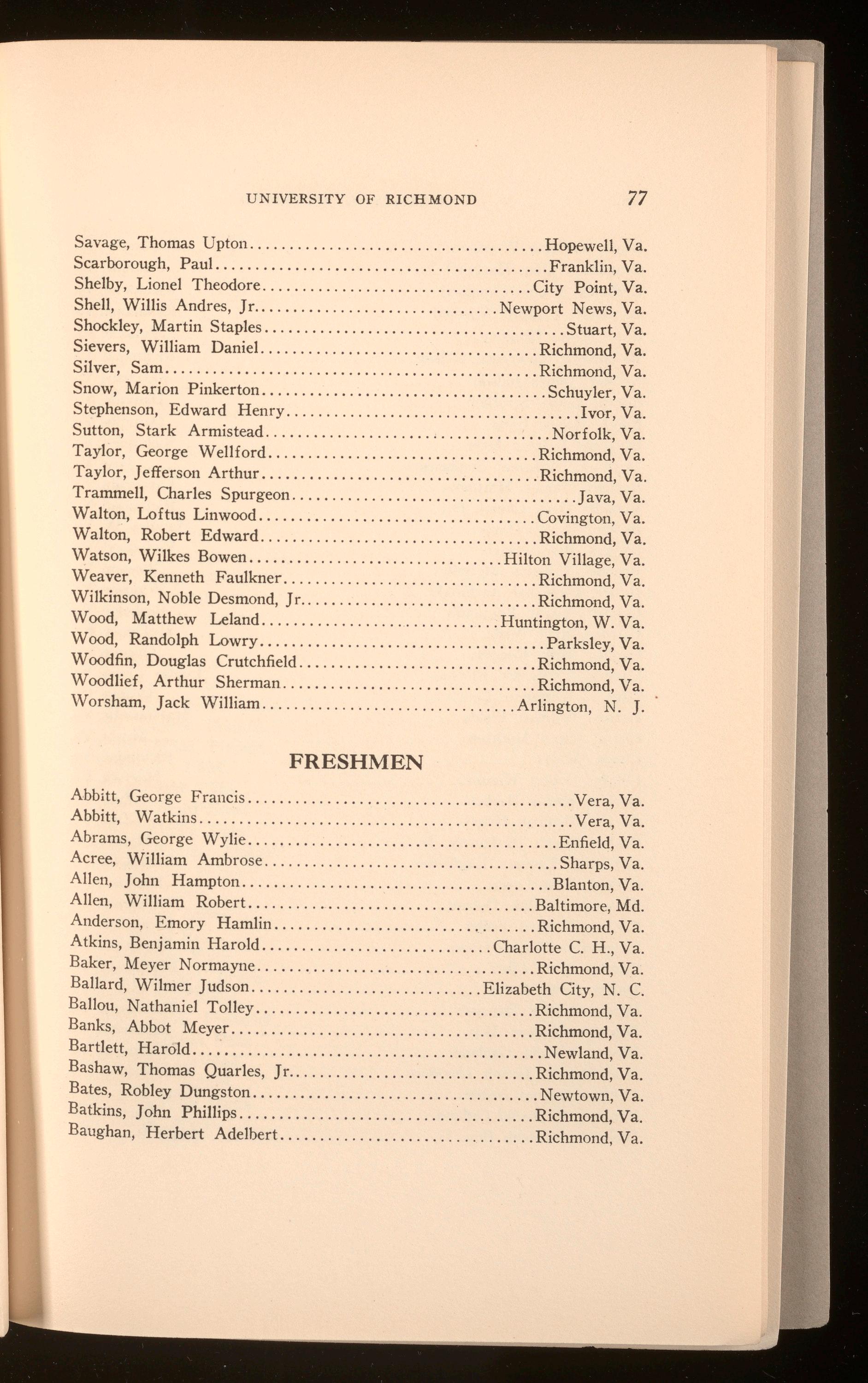
UNIVERSITY OF RICHMOND 77
Savage, Thomas Upton ..... . .... Hopewell, Va.
Scarborough, Paul. ......................................... Franklin, Va.
Shelby, Lionel Theodore .. .. .. .. . .. .. City Point, Va.
Shell, Willis Andres, Jr ............................... Newport News, Va.
Shockley, Martin Staples ..... ... .... Stuart, Va.
Sievers, William Daniel. ........... ..... .. Richmond, Va.
Silver, Sam ........... ... ..... .. . ........ Richmond, Va.
Snow, Marion Pinkerton .................................... Schuyler, Va.
Stephenson , Edward Henry ..................................... Ivor, Va.
Sutton, Stark Armistead .. . .. . .... ........... . Norfolk, Va.
Taylor, George Wellford .. . .. .... ..... .... Richmond, Va.
Taylor, Jefferson Arthur ........ ........... .... Richmond, Va.
Trammell, Charles Spurgeon .................................... Java, Va.
Walton, Loftus Linwood ...... ..... . ........ Covington, Va.
Walton, Robert Edward ..
......................... Richmond, Va
Watson, Wilkes Bowen ........ ....... ....... Hilton Village, Va.
Weaver, Kenneth Faulkner ................................ Richmond, Va
Wilkinson, Noble Desmond, Jr ... ..... .. . ............ Richmond, Va.
Wood, Matthew Leland . ....... .............. Huntington, W. Va. Wood, Randolph Lowry ...... ... ...... .... Parksley, Va.
Woodfin, Douglas Crutchfield . ............ ....... . Richmond, Va.
Woodlief, Arthur Sherman ................................ Richmond, Va.
Worsham, Jack William ................................ Arlington, N. J.
Abbitt, Georg e Francis ......................................... Vera, Va.
Abbitt, Watkins ..... . ...... ....................... Vera, Va. Abrams, George Wylie .... . ..... .............. . Enfield, Va
Acree, William Ambrose .............................. ...... Sharps, Va. Allen, John Hampton .. .. .. . .. .... ..... Blanton, Va .
Allen, William Robert .................................... Baltimore, Md. Anderson, Emory Hamlin ................................. Richmond, Va.
Atkins, Benjamin Harold .. . ......... ... .......... Charlotte C. H ., Va. Baker, Meyer Normayne ................................... Richmond, Va. Ballard, Wilmer Judson ........... ........... Elizabeth City, N. C. Ballou, Nathaniel Tolley . .................. ..... Richmond, Va. Banks, Abbot Meyer ....... ...... ........ .... ..... Richmond, Va. Bartlett, Harold .... . . ............ ..... Newland, Va. Bashaw, Thomas Quarles, Jr ............. ...... .. Richmond, Va.
Bates, Robley Dungs ton .................................... Newtown, Va.
Batkins, John Phillips ..................................... Richmond, Va. Baughan, Herbert Adelbert. ............................... Richmond, Va.
78
Beale, Kenneth Woodson ..................................
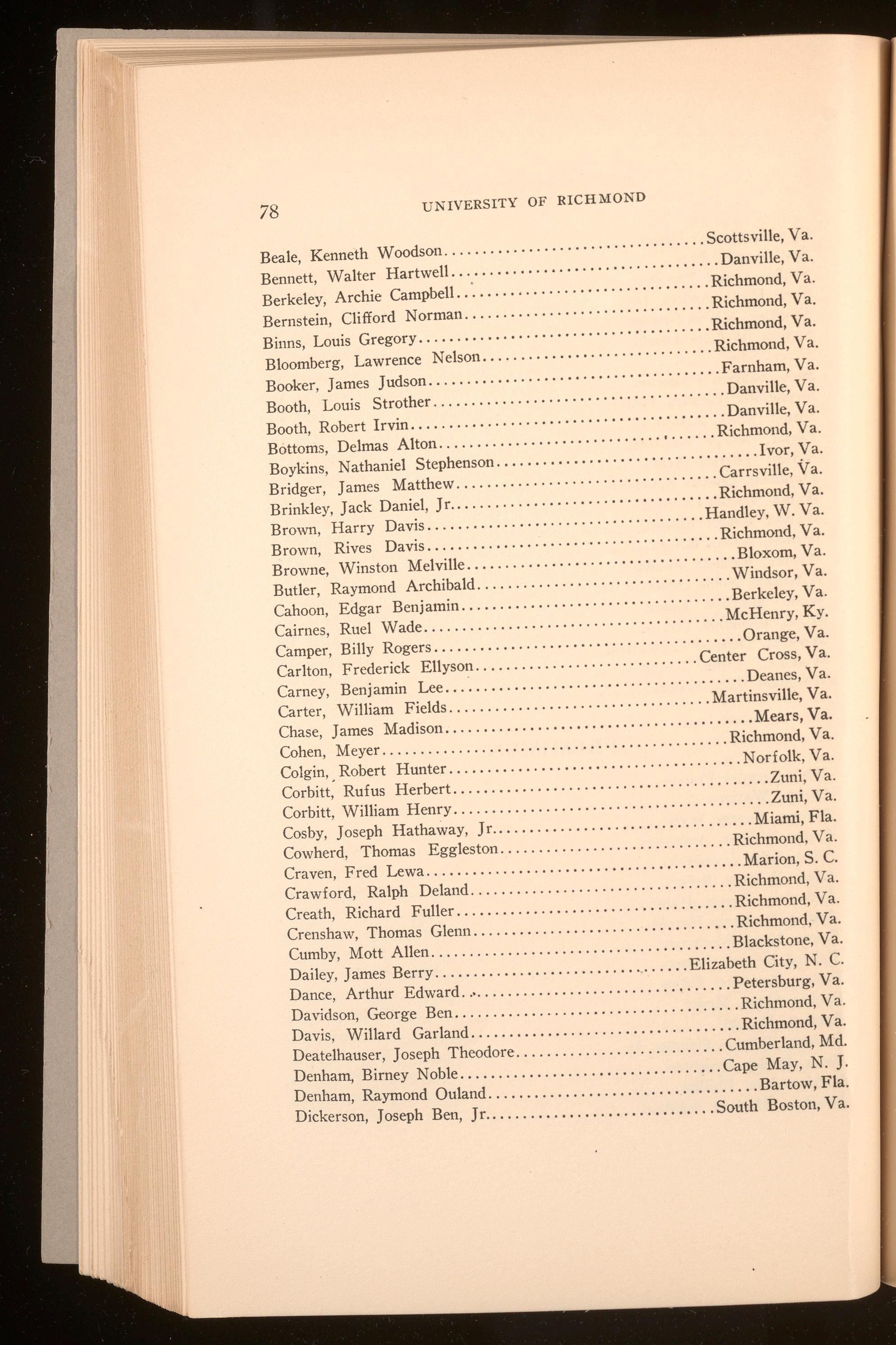
Scottsville, Va.
Bennett, Walter Hartwell ................................... Danville, Va.
Berkeley, Archie Campbell .. ·............................... Richmond, Va.
Bernstein, Clifford Norman ................................ Richmond, Va.
Binns, Louis Gregory ...................................... Richmond, Va.
Bloomberg, Lawrence Nelson .............................. Richmond, Va.
Booker, James Judson ...................................... Farnham, Va.
Booth, Louis Strother ...................................... Danville, Va.
Booth, Robert Irvin ......................................... Danville, Va.
Bottoms, Delmas Alton ............................. , ...... Richmond, Va.
Boykins, Nathaniel Stephenson .................................. Ivor, Va.
Bridger, James Matthew .................................. Carrsville, Va.
Brinkley, Jack Daniel, Jr ................................... Richmond, Va.
Brown, Harry Davis .................................... Handley, W. Va.
Brown, Rives Davis ...................................... Richmond, Va.
Browne, Winston Melville ................................... Bloxom, Va.
Butler, Raymond Archibald ................................. Windsor, Va.
Cahoon, Edgar Benjamin ................................... Berkeley, Va.
Cairnes, Ruel Wade ....................................... McHenry, Ky.
Camper, Billy Rogers ........................................ Orange, Va.
Carlton, Frederick Ellyson ............................. Center Cross, Va.
Carney, Benjamin Lee ... ·.................................... Deanes, Va.
Carter, William Fields .................................. Martinsville, Va.
Chase, James Madison ........................................ Mears, Va.
Cohen, Meyer ............................................. Richmond, Va.
Colgin,. Robert Hunter ...................................... Norfolk, Va.
Corbitt, Rufus Herbert. ........................................ Zuni, Va.
Corbitt, \Villiam Henry ......................................... Zuni, Va.
Cosby, Joseph Hathaway, Jr .................................. Miami, Fla.
Cowherd, Thomas Eggleston .............................. Richmond, Va.
Craven, Fred Lewa ......................................... Marion, S. C.
Crawford, Ralph Deland .................................. Richmond, Va.
Creath, Richard Fuller .................................... Richmond, Va.
Crenshaw, Thomas Glenn .................................. Richmond, Va.
Cumby, Mott Allen ....................................... Blackstone, Va.
Dailey, James Berry ................................. Elizabeth City, N. C.
Dance, Arthur Edward .................................... Petersburg, Va.
Davidson, George Ben ..................................... Richmond, Va.
Davis, Willard Garland ................................... Richmond, Va.
Deatelhauser, Joseph Theodore ........................... Cumberland, Md.
Denham, Birney Noble .................................. Cape May, N. J.
Denham, Raymond Ouland ................................... Bartow, Fla.
Dickerson, Joseph Ben, Jr .............................. South Boston, Va.
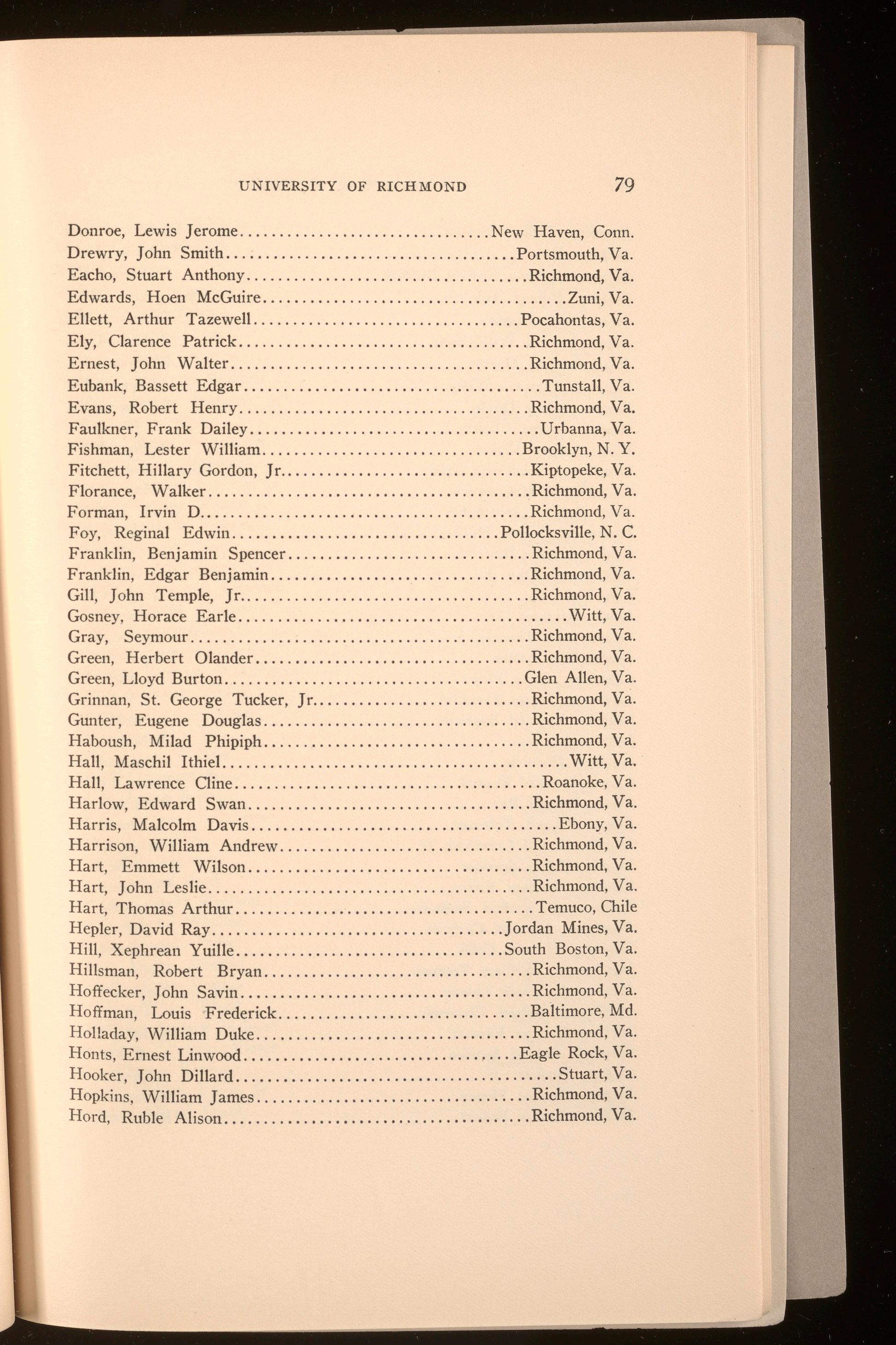
Donroe, Lewis Jerome ................................ New Haven, Conn.
Drewry, John Smith ..................................... Portsmouth, Va.
Eacho, Stuart Anthony .................................... Richmond, Va.
Edwards, Hoen McGuire Zuni, Va.
Ellett, Arthur Tazewell .................................. Pocahontas, Va.
Ely, Clarence Patrick ..................................... Richmond, Va.
Ernest, John Walter Richmond, Va.
Eubank, Bassett Edgar ...................................... Tunstall, Va.
Evans, Robert Henry ..................................... Richmond, Va.
Faulkner, Frank Dailey ..................................... Urbanna, Va.
Fishman, Lester William Brooklyn, N. Y.
Fitchett, Hillary Gordon, Jr Kiptopeke, Va.
Florance, Walker ......................................... Richmond, Va.
Forman, Irvin D .......................................... Richmond, Va.
Foy, Reginal Edwin .................................. Pollocksville, N. C.
Franklin, Benjamin Spencer Richmond, Va.
Franklin, Edgar Benjamin ................................. Richmond, Va.
Gill, John Temple, Jr Richmond, Va.
Gosney, Horace Earle .......................................... Witt, Va.
Gray, Seymour ........................................... Richmond, Va.
Green, Herbert Olander ................................... Richmond, Va.
Green, Lloyd Burton Glen Allen, Va.
Grinnan, St. George Tucker, Jr ............................ Richmond, Va.
Gunter, Eugene Douglas Richmond, Va.
Haboush, Mi lad Phipiph .................................. Richmond, Va.
Hall, Maschil lthiel. ........................................... Witt, Va.
Hall, Lawrence Cline ....................................... Roanoke, Va.
Harlow, Edward Swan Richmond, Va.
Harris, Malcolm Davis ....................................... Ebony, Va.
Harrison, William Andrew ................................ Richmond, Va.
Hart, Emmett Wilson .................................... Richmond, Va.
Hart, John Leslie ......................................... Richmond, Va.
Hart, Thomas Arthur ...................................... Temuco, Chile
Hepler, David Ray ..................................... Jordan Mines, Va. Hill, Xephrean Yuille South Boston, Va.
Hillsman, Robert Bryan .................................. Richmond, Va.
Hoffecker, John Savin ..................................... Richmond, Va.
Hoffman, Louis Frederick ................................ Baltimore, Md.
Holladay, William Duke Richmond, Va.
Honts, Ernest Linwood ................................... Eagle Rock, Va.
Hooker, John Dillard ......................................... Stuart, Va.
Hopkins, William James ................................... Richmond, Va.
Hord, Ruble Alison ....................................... Richmond, Va.
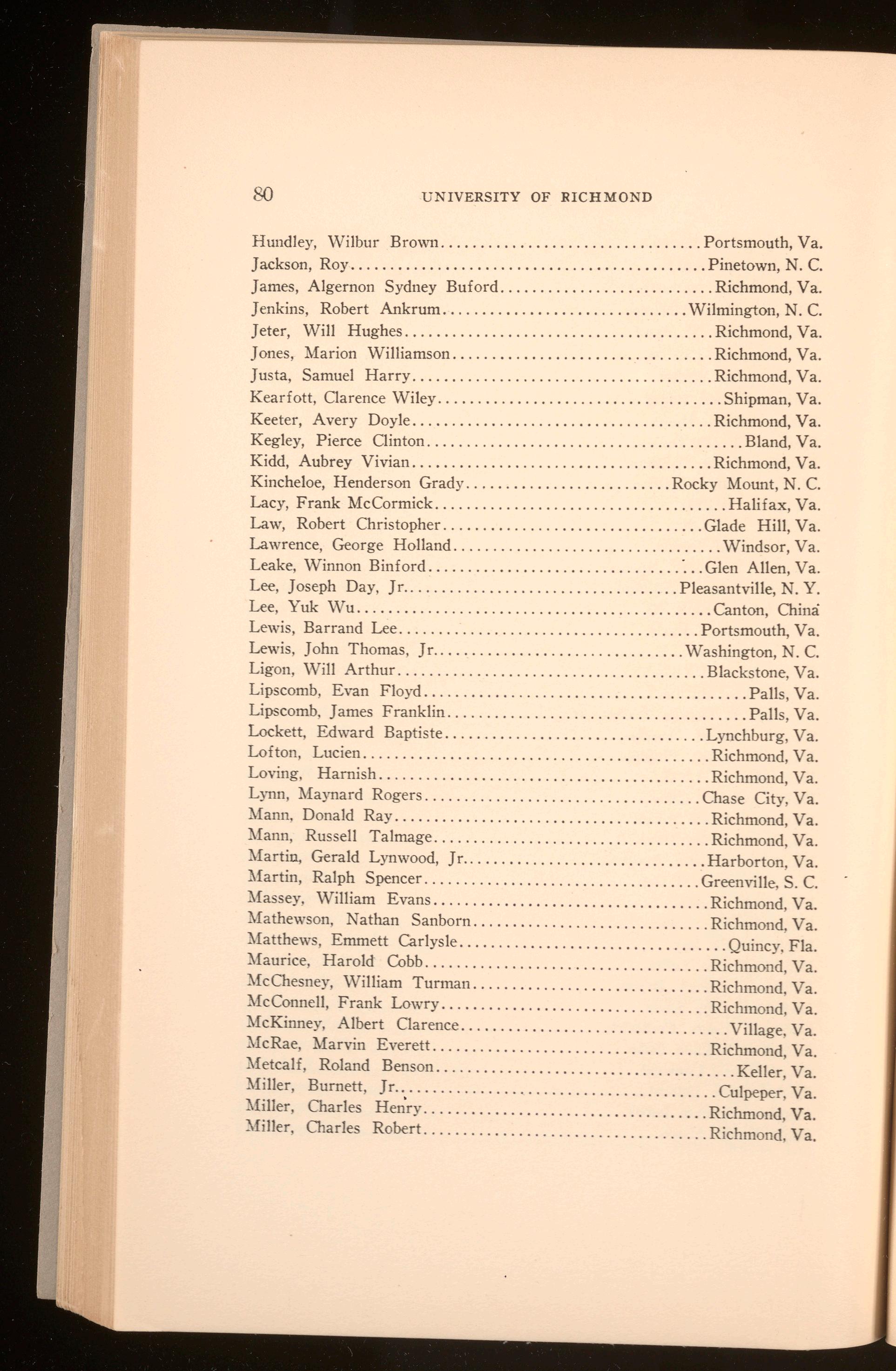
Hundley, Wilbur Brown ................................. Portsmouth, Va.
Jackson, Roy ............................................. Pinetown, N. C.
James, Algernon Sydney Buford ........................... Richmond, Va.
Jenkins, Robert Ankrum ............................... Wilmington, N. C.
Jeter, Will Hughes ....................................... Richmond, Va.
Jones, Marion Williamson ................................. Richmond, Va.
Justa, Samuel Harry ...................................... Richmond, Va.
Kearfott, Clarence Wiley .................................... Shipman, Va.
Keeter, Avery Doyle ........... .................... . ..... Richmond, Va.
Kegley, Pierce Clinton ........................................ Bland, Va.
Kidd, Aubrey Vivian .......................... . Richmond, Va.
Kincheloe, Henderson Grady .......................... Rocky Mount, N. C.
Lacy, Frank McCormick ..................................... Halifax, Va.
Law, Robert Christopher .......... ...................... Glade Hill, Va.
Lawrence, George Holland .................................. Windsor, Va.
Leake, Winnon Binford ................................ ·... Glen Allen, Va.
Lee, Joseph Day, Jr ................................... Pleasantville, N. Y.
Lee, Yuk 'Nu ............................................. Canton, China
Lewis, Bar rand Lee ...................................... Portsmouth, Va.
Lewis, John Thomas, Jr .................... ........... Washington, N. C.
Ligon, Will Arthur ........... . ........................... Blackstone, Va.
Lipscomb, Evan Floyd ..................................... Palls, Va.
Lipscomb, James Franklin ...................................... Palls, Va.
Lockett, Edward Baptiste ................................. Lynchburg, Va.
Lofton, Lucien ............................................ Richmond, Va.
Loving. Harnish ................. ........................ Richmond, Va.
Lynn, :Maynard Rogers ................... . ............... Chase City, Va.
Mann, Donald Ray ................................... Richmond, Va.
l\fann, Russell Talmage ................................... Richmond, Va.
Martin, Gerald Lynwood, Jr ............................... Harborton, Va.
Martin, Ralph Spencer ................................... Greenville, S. C.
Massey, William Evans ................................... Richmond, Va.
Mathewson, athan Sanborn .............................. Richmond, Va. 1fatthews, Emmett Carlysle .................................. Quincy. Fla. 1faurice, Harold Cobb .................................... Richmond, Va.
1:fcChesney, William Turman .............................. Richmond, Va. 1fcConnell, Frank Lowry ...................... . ........... Richmond, Va.
McKinney, Albert Clarence .................................. Village. Va.
1fcRae, Marvin Everett ................................... Richmond, Va.
::--ietcalf, Roland Benson ... . .................................. Keller, Va.
Miller, Burnett, Jr ......................................... Culpeper, Va.
~:1:iller, Charles Hen'ry .................................... Richmond, Va.
~filler, Charles Robert . .............. . ................. Richmond, Va.
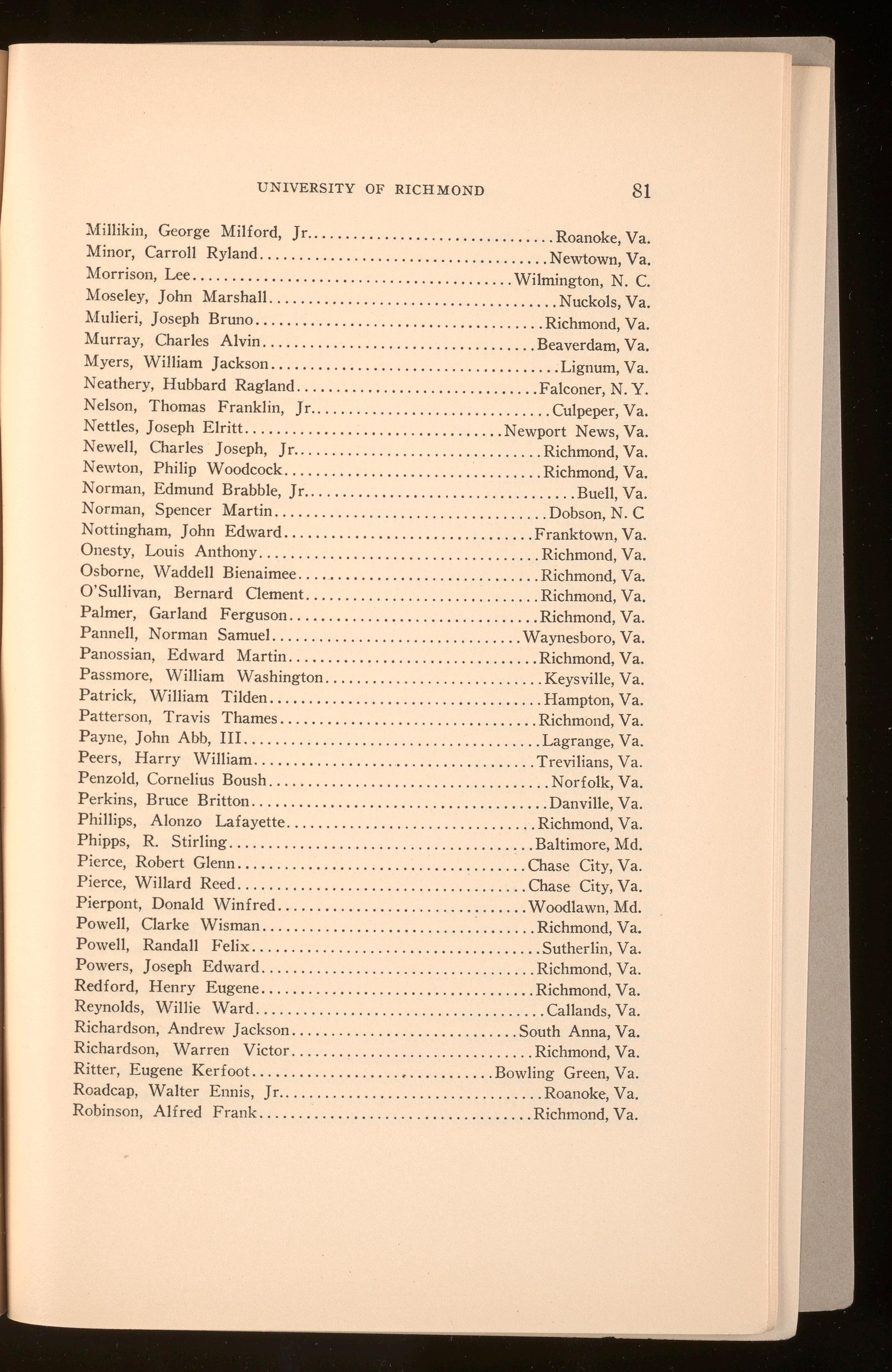
Millikin, George Milford, Jr. ............................... Roanoke, Va.
Minor, Carroll Ryland ..................................... Newtown, Va.
Morrison, Lee ......................................... Wilmington, N. C.
Moseley, John Marshall ..................................... Nuckols, Va.
1Iulieri, Joseph Bruno ..................................... Richmond, Va.
Murray, Charles Alvin ................................... Beaverdam, Va.
Myers, William Jackson ..................................... Lignum, Va.
Neathery, Hubbard Ragland ............................... Falconer, N. Y.
Nelson, Thomas Franklin, Jr. .............................. Culpeper, Va.
Nettles, Joseph Elritt ................................. Newport News, Va.
Newell, Charles Joseph, Jr ................................ Richmond, Va.
Newton, Philip Woodcock ................................. Richmond, Va.
Norman, Edmund Brabble, Jr ................................... Buell, Va.
Norman, Spencer Martin ................................... Dobson, N. C Nottingham, John Edward ................................ Franktown, Va.
Onesty, Louis Anthony .................................... Richmond, Va. Osborne, Waddell Bienaimee ............................... Richmond, Va.
O'Sullivan, Bernard Clement .............................. Richmond, Va. Palmer, Garland Ferguson ................................ Richmond, Va. Pannell, Norman Samuel. ............................... Waynesboro, Va. Panossian, Edward Martin ................................ Richmond, Va. Passmore, William Washington ............................ Keysville, Va. Patrick, William Tilden ................................... Hampton, Va. Patterson, Travis Thames ................................. Richmond, Va. Payne, John Abb, III ...................................... Lagrange, Va. Peers, Harry William .................................... Trevilians, Va. Penzold, Cornelius Boush .................................... Nor folk, Va. Perkins, Bruce Britton ...................................... Danville, Va. Phillips, Alonzo Lafayette ................................ Richmond, Va. Phipps, R. Stirling ....................................... Baltimore, Md. Pierce, Robert Glenn ..................................... Chase City, Va. Pierce, Willard Reed ..................................... Chase City, Va. Pierpont, Donald Winfred ................................ Woodlawn, Md. Powell, Clarke Wisman ................................... Richmond, Va. Powell, Randall Felix ..................................... Sutherlin, Va. Powers, Joseph Edward ................................... Richmond, Va. Redford, Henry Eugene ................................... Richmond, Va. Reynolds, Willie Ward ..................................... Callands, Va. Richardson, Andrew Jackson ............................. South Anna, Va. Richardson, Warren Victor ............................... Richmond, Va. Ritter, Eugene Kerfoot. ..................•........... Bowling Green, Va. Roadcap, Walter Ennis, Jr. ................................. Roanoke, Va. Robinson, Alfred Frank ................................... Richmond, Va.
Robinson, William Donald .. ..... .. .. ... .... . . Newport News, Va.
Ryan, Thomas Raymond ... Richmond, Va.
Ryland, John William ...... ......
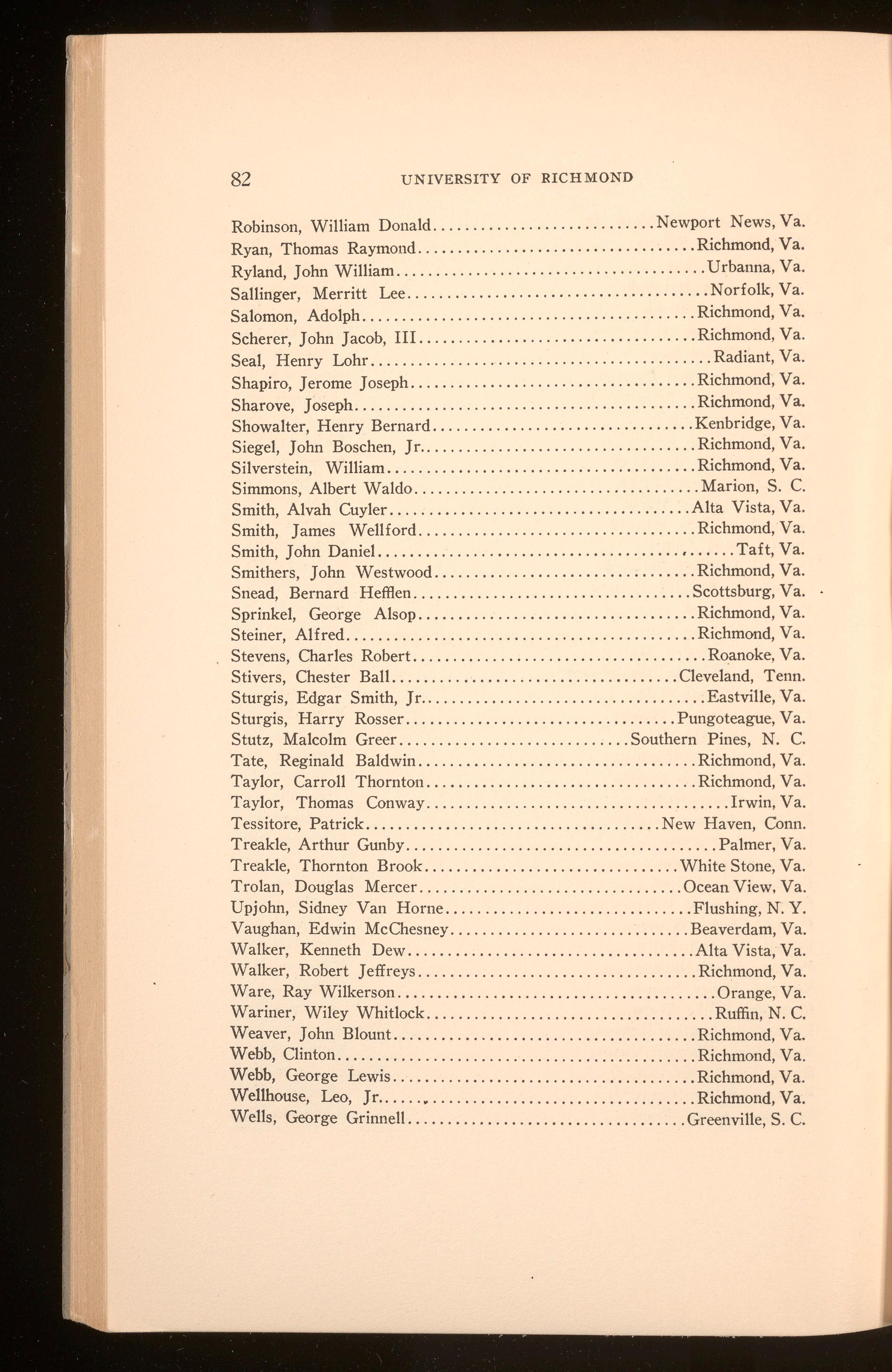
. .. Urbanna, Va.
Sallinger, Merritt Lee .. Norfolk, Va.
Salomon, Adolph .. ... .. . Richmond, Va.
Scherer, John Jacob, III Richmond , Va.
Seal, Henry Lohr ..... . Radiant, Va.
Shapiro, Jerome Joseph .. .
. Richmond, Va.
Sharove, Joseph . ........... ... . .... Richmond, Va.
Showalter, Henry Bernard ........ .. Kenbridge, Va.
Siegel, John Boschen, Jr .... Richmond, Va.
Silverstein, William ........
Simmons, Albert Waldo ..........
... Richmond, Va.
. Marion, S. C.
Smith, Alvah Cuyler .... ... Alta Vista, Va
Smith, James Wellford ... Richmond, Va.
Smith, John Daniel. .... .
.... Taft, Va
Smithers , John Westwood .... . Richmond, Va .
Snead, Bernard Heffien . ...
Sprinkel, George Alsop .....
Steiner, Alfred
. Scottsburg, Va.
Richmond, Va
. Richmond, Va
Stevens, Charles Robert. . Roanoke , Va.
Stivers, Chester Ball ....... ..
Sturgis, Edgar Smith, Jr ....
..... .. Cleveland, Tenn.
. .. .... Eastville, Va
Sturgis, Harry Rosser . ..... Pungoteague, Va.
Stutz, Malcolm Greer .
Tate, Reginald Baldwin
Southern Pines, N. C.
. . . . . Richmond, Va .
Taylor, Carroll Thornton .. Richmond, Va.
Taylor , Thomas Conway .... Irwin, Va
Tessitore, Patrick ..... New Haven, Conn .
Treakle, Arthur Gunby . . . .. . .. Palmer, Va.
Treakle, Thornton Brook ..
. White Stone, Va.
Trolan, Douglas Mercer Ocean View, Va .
Upjohn, Sidney Van Horne . .. . .. ... .... Flushing, N Y
Vaughan, Edwin McChesney ....
...... Beaverdam, Va.
Walker, Kenneth Dew ...... Alta Vista, Va.
Walker, Robert Jeffreys ..
Ware , Ray Wilkerson .
. Richmond, Va.
Orange , Va.
Wariner , Wiley Whitlock .. Ruffin, N. C. \Veaver, John Blount. .
Webb, Clinton ..... .
...... Richmond, Va.
.. Richmond, Va
Webb, George Lewis ..... ........... Richmond , Va.
Wellhouse, Leo, Jr .... •..
.......... Richmond, Va.
Wells, George Grinnell ....... . Greenville, S . C.
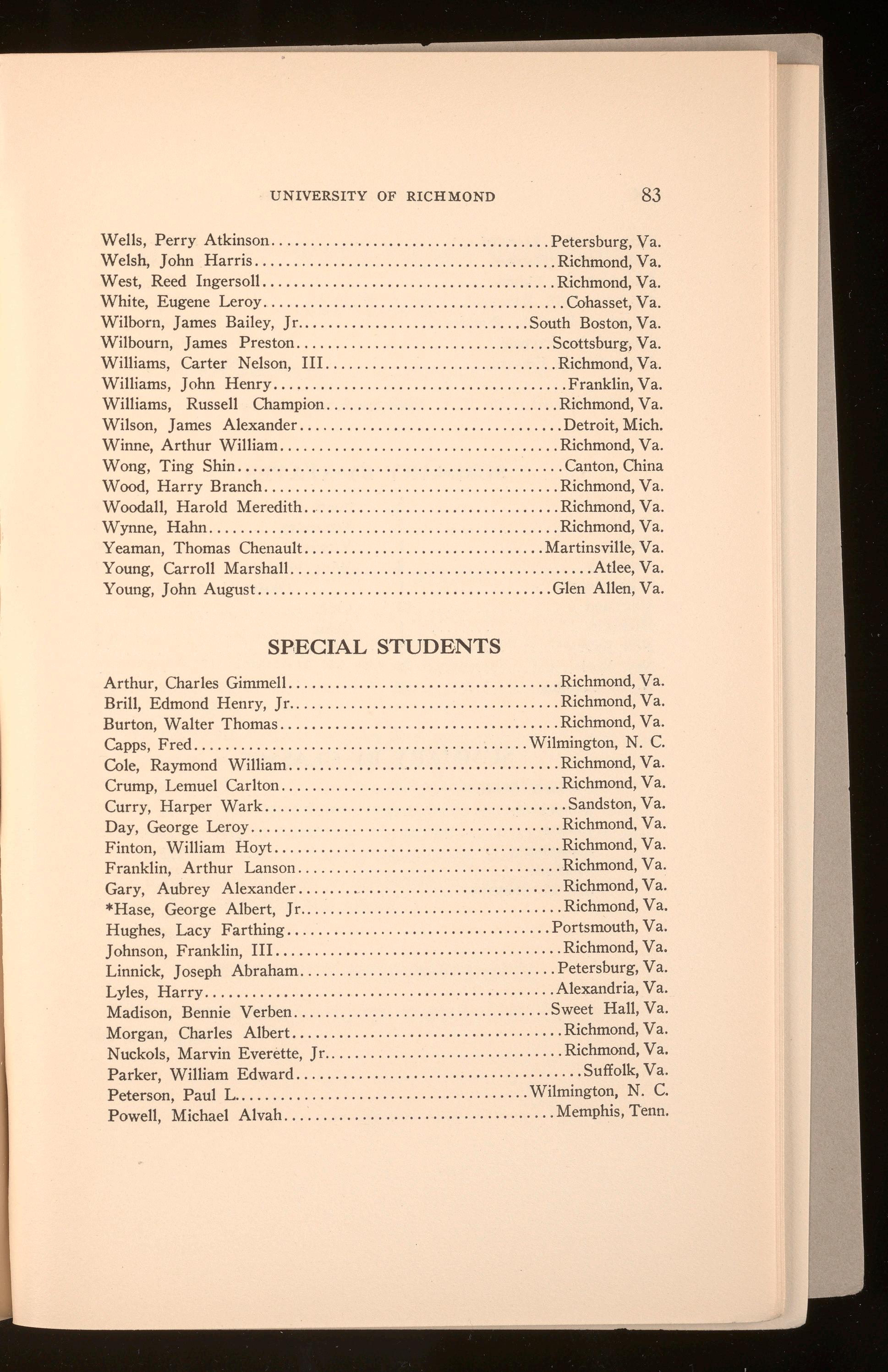
Wells, Perry Atkinson .................................... Petersburg, Va.
Welsh, John Harris ....................................... Richmond, Va.
West, Reed Ingersoll ...................................... Richmond, Va.
White, Eugene Leroy ....................................... Cohasset, Va.
Wilborn, James Bailey, Jr .............................. South Boston, Va.
Wilbourn, James Preston Scottsburg, Va.
Williams, Carter Nelson, III .............................. Richmond, Va.
Williams, John Henry ...................................... Franklin, Va.
Williams, Russell Champion Richmond, Va.
Wilson, James Alexander .................................. Detroit, Mich.
Winne, Arthur William .................................... Richmond, Va.
Wong, Ting Shin .......................................... Canton, China
Wood, Harry Branch ...................................... Richmond, Va.
Woodall, Harold Meredith ................................. Richmond, Va.
Wynne, Hahn Richmond, Va.
Yeaman, Thomas Chenault. .............................. Martinsville, Va.
Young, Carroll Marshall ....................................... Atlee, Va.
Young, John August. ..................................... Glen Allen, Va.
Arthur, Charles Gimme!!. .................................. Richmond, Va.
Brill, Edmond Henry, Jr Richmond, Va.
Burton, Walter Thomas Richmond, Va.
Capps, Fred ........................................... Wilmington, N. C.
Cole, Raymond William ................................... Richmond, Va.
Crump, Lemuel Carlton Richmond, Va.
Curry, Harper Wark ....................................... Sandston, Va.
Day, George Leroy ........................................ Richmond, Va.
Finton, William Hoyt ..................................... Richmond, Va.
Franklin, Arthur Lanson Richmond, Va.
Gary, Aubrey Alexander Richmond, Va.
*Hase, George Albert, Jr Richmond, Va.
Hughes, Lacy Farthing .................................. Portsmouth, Va.
Johnson, Franklin, III ..................................... Richmond, Va.
Linnick, Joseph Abraham Petersburg, Va.
Lyles, Harry ............................................. Alexandria, Va.
Madison, Bennie Verben Sweet Hall, Va.
Morgan, Charles Albert. Richmond, Va.
Nuckols, Marvin Everette, Jr Richmond, Va.
Parker, William Edward ..................................... Suffolk, Va.
Peterson, Paul L Wilmington, N. C.
Powell, Michael Alvah Memphis, Tenn.
Price, Gordon Leonard ..
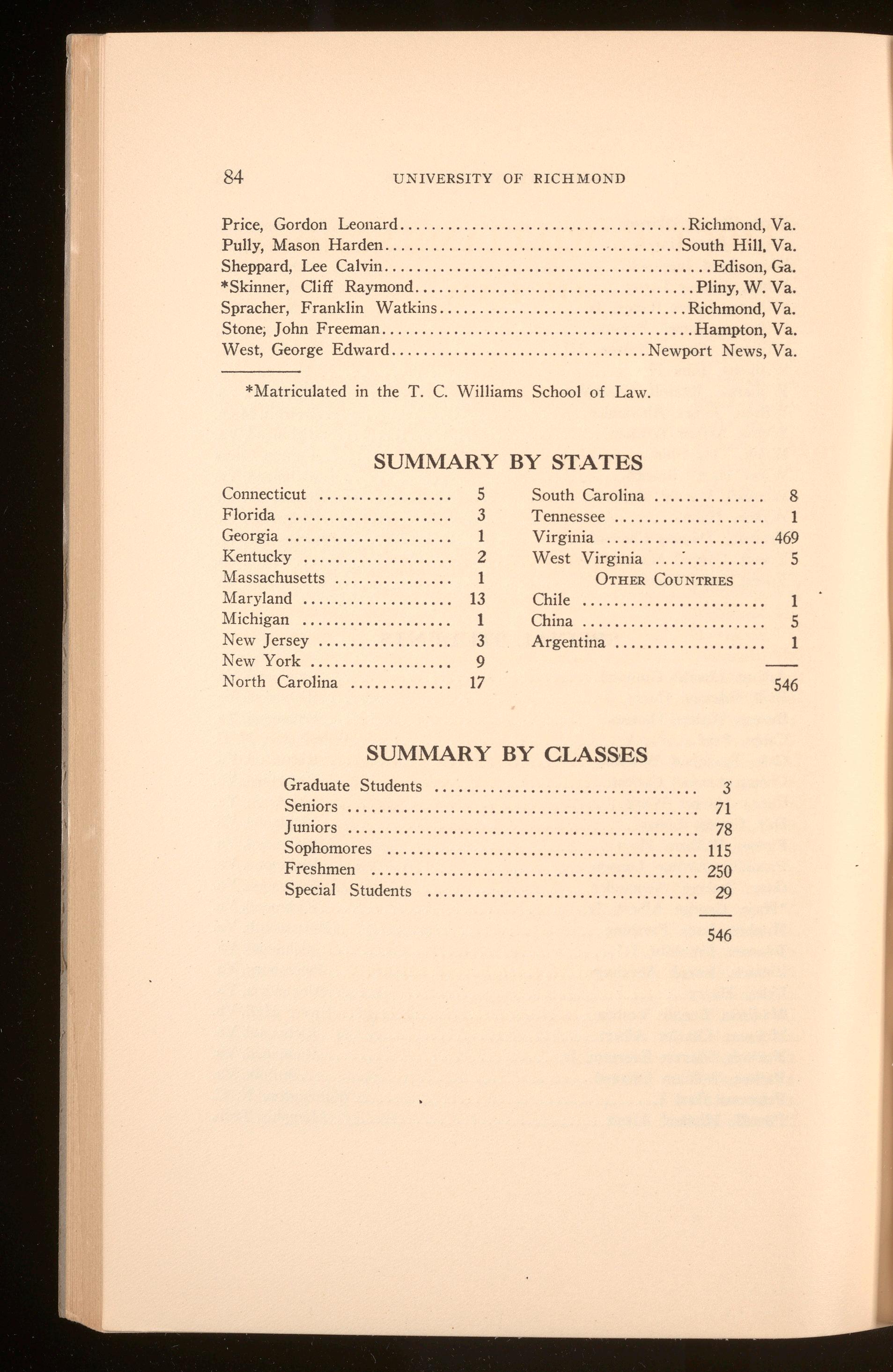
Riclunond, Va.
Pully, Mason Harden .... South Hill, Va
Sheppard, Lee Calvin
*Skinner, Cliff Raymond ..
Spracher, Franklin Watkin s ....
..... Edison , Ga.
.. Pliny, W. Va.
Richmond, Va.
Stone ; John Fre eman Hampton, Va. West , George Edward
*Matriculated in the T . C. W ill iam s Sch ool o f La w
Newport News, Va
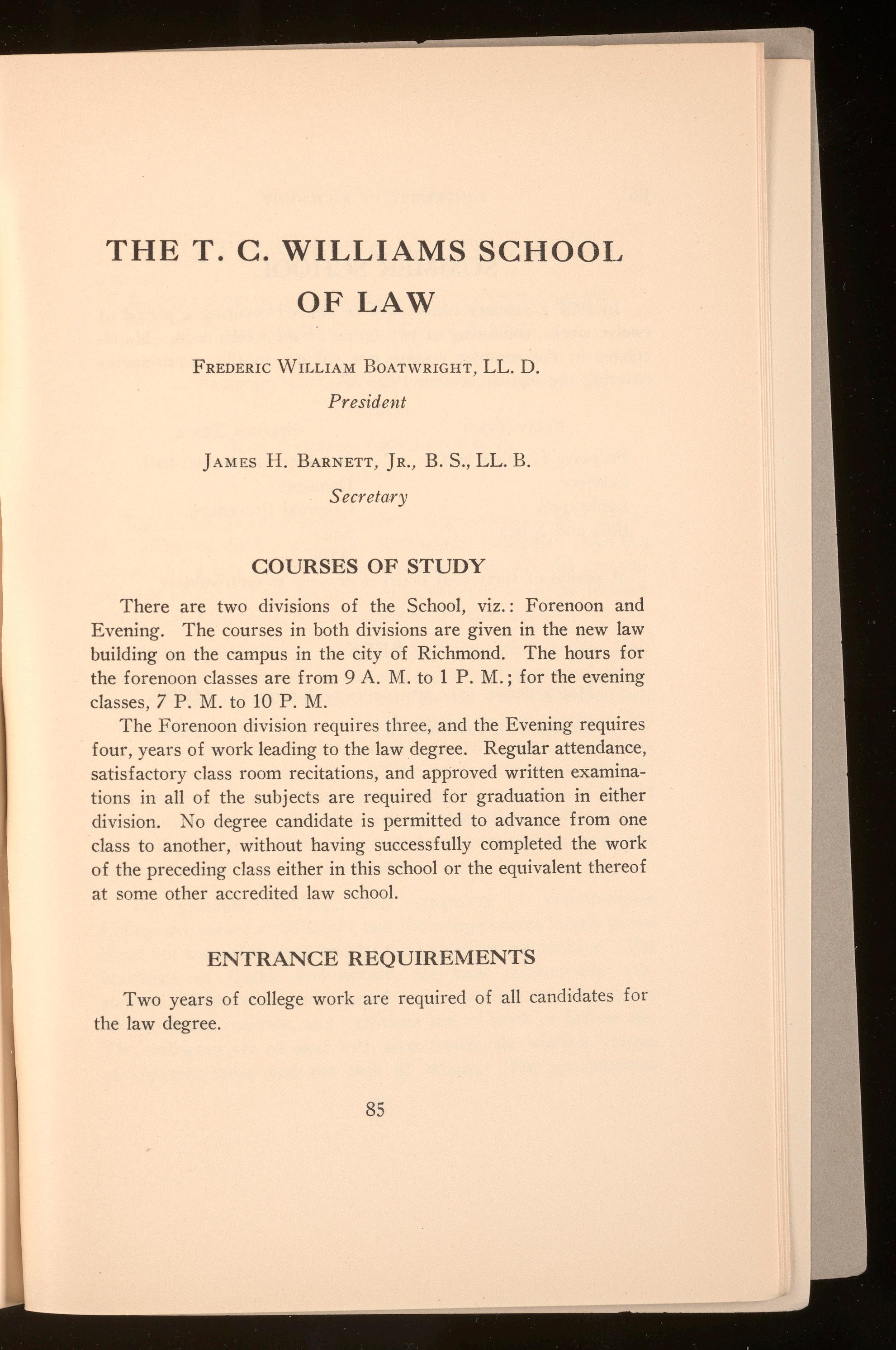
FREDERIC WILLIAM BOATWRIGHT, LL. D.
President
JAMES H. BARNETT, JR., B. s.,LL. B.
Secretary
There are two divisions of the School, viz. : Forenoon and Evening. The courses in both divisions are given in the new law building on the campus in the city of Richmond. The hours for the forenoon classes are from 9 A. M. to 1 P. M.; for the evening classes, 7 P. M. to 10 P. M.
The Forenoon division requires three, and the Evening requires four, years of work leading to the law degree. Regular attendance, satisfactory class room recitations, and approved written examinations in all of the subjects are required for graduation in either division. No degree candidate is permitted to advance from one class to another, without having successfully completed the work of the preceding class either in this school or the equivalent thereof at some other accredited law school.
Two years of college work are required of all candidates for the law degree.
In 1927 a summer course will be offered covering a period of twelve weeks, consisting of two terms of six weeks each. Matriculates in the summer session are subject to the requirements covering the regular session 1926-'27.
FIRST TERM
Property II-first half. Carriers
Bankruptcy
Bills and Notes
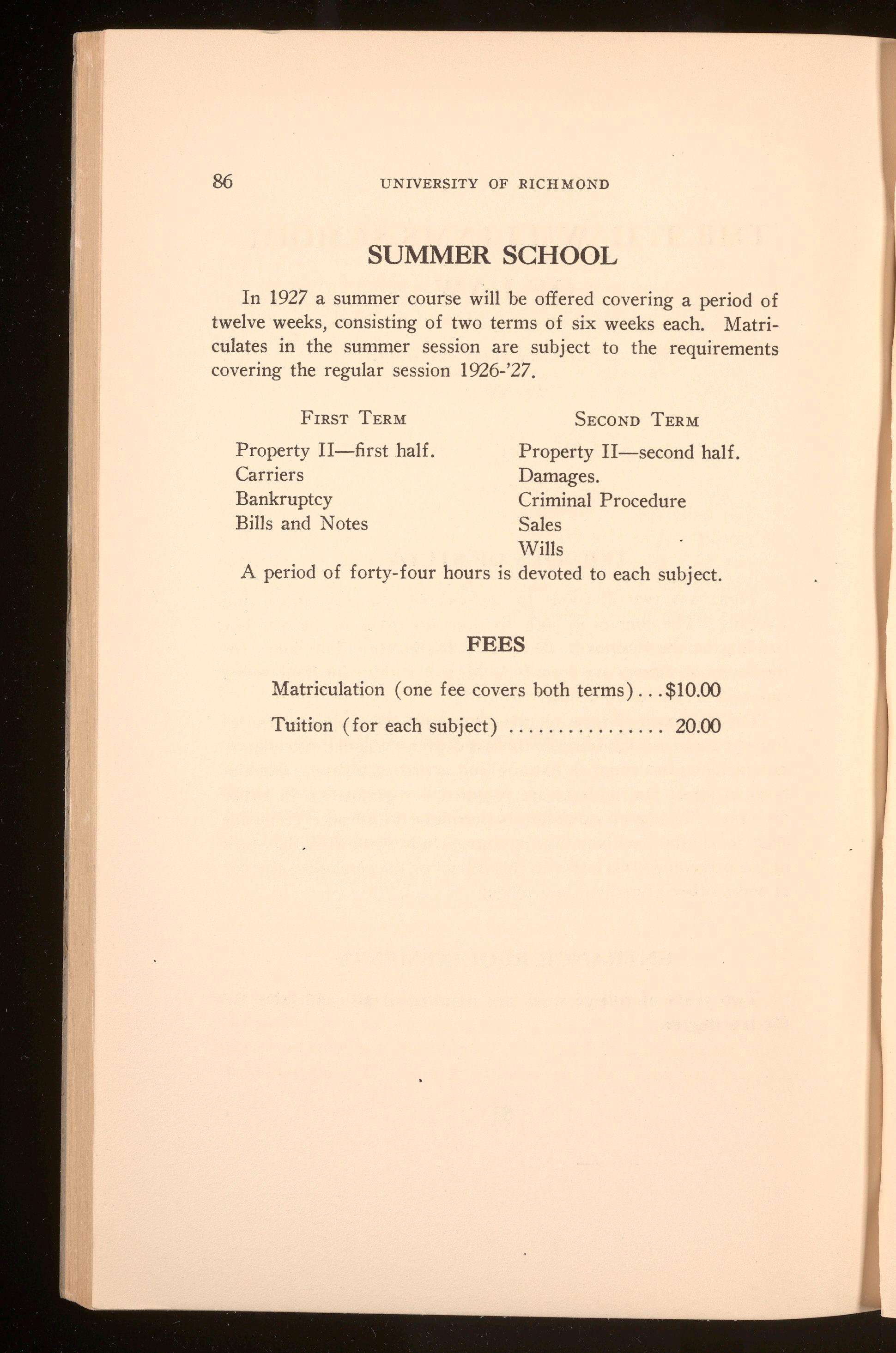
SECOND TERM
Property II-second half. Damages.
Criminal Procedure Sales Wills
A period of forty-four hours is devoted to each subject.
Matriculation ( one fee covers both terms) . . . $10.00
Tuition ( for each subject) . . . . . . . . . . . 20.00
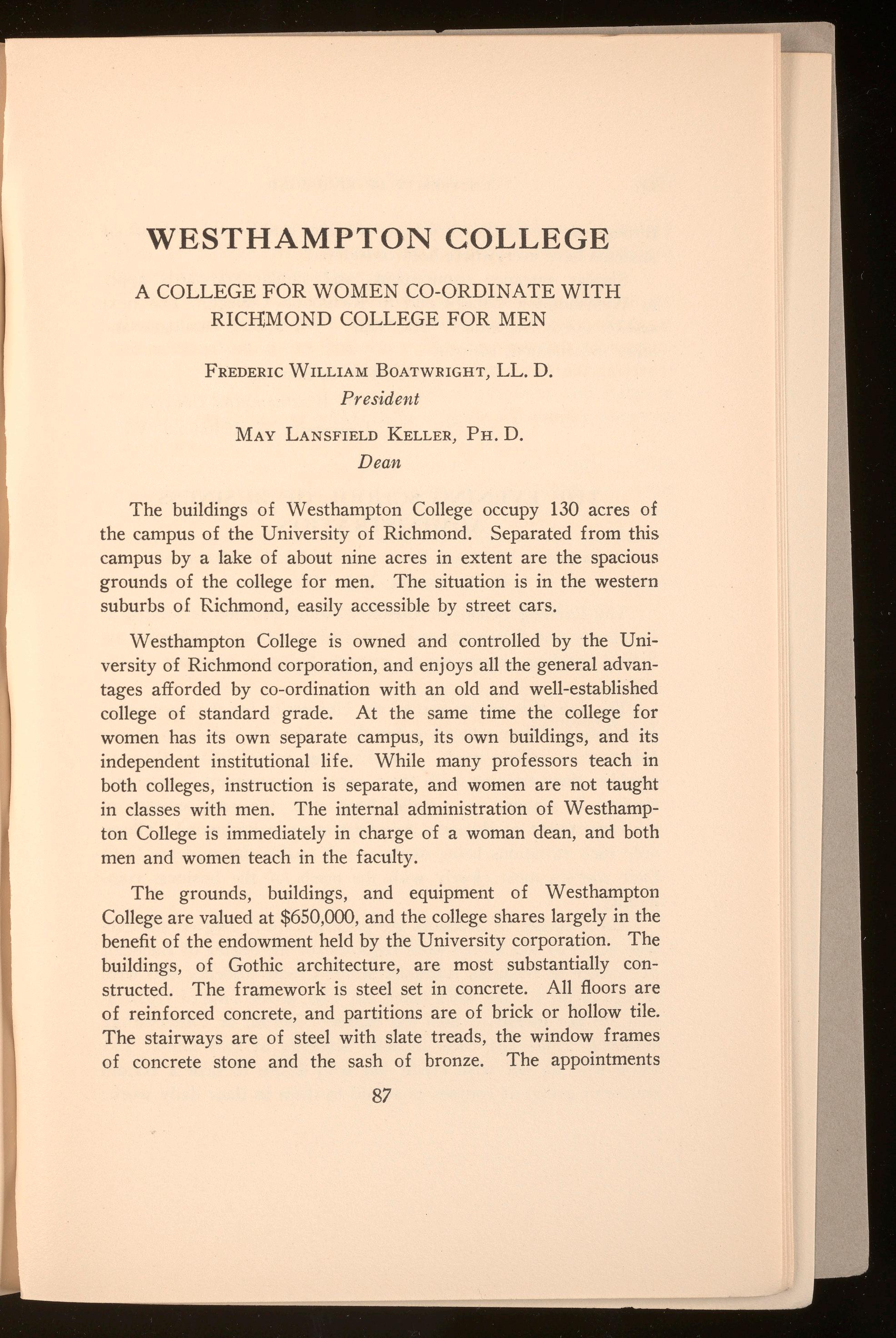
FREDERIC WILLIAM BOATWRIGHT, LL. D. President
MAY LANSFIELD KELLER, PH. D. Dean
The buildings of Westhampton College occupy 130 acres of the campus of the University of Richmond. Separated from this campus by a lake of about nine acres in extent are the spacious grounds of the college for men. The situation is in the western suburbs of Richmond, easily accessible by street cars.
Westhampton College is owned and controlled by the University of Richmond corporation, and enjoys all the general advantages afforded by co-ordination with an old and well-established college of standard grade. At the same time the college for women has its own separate campus, its own buildings, and its independent institutional life. While many professors teach in both colleges, instruction is separate, and women are not taught in classes with men. The internal administration of Westhampton College is immediately in charge of a woman dean, and both men and women teach in the faculty.
The grounds, buildings, and equipment of Westhampton College are valued at $650,000, and the college shares largely in the benefit of the endowment held by the University corporation. The buildings, of Gothic architecture, are most substantially constructed. The framework is steel set in concrete. All floors are of reinforced concrete, and partitions are of brick or hollow tile. The stairways are of steel with slate treads, the window frames of concrete stone and the sash of bronze. The appointments 87
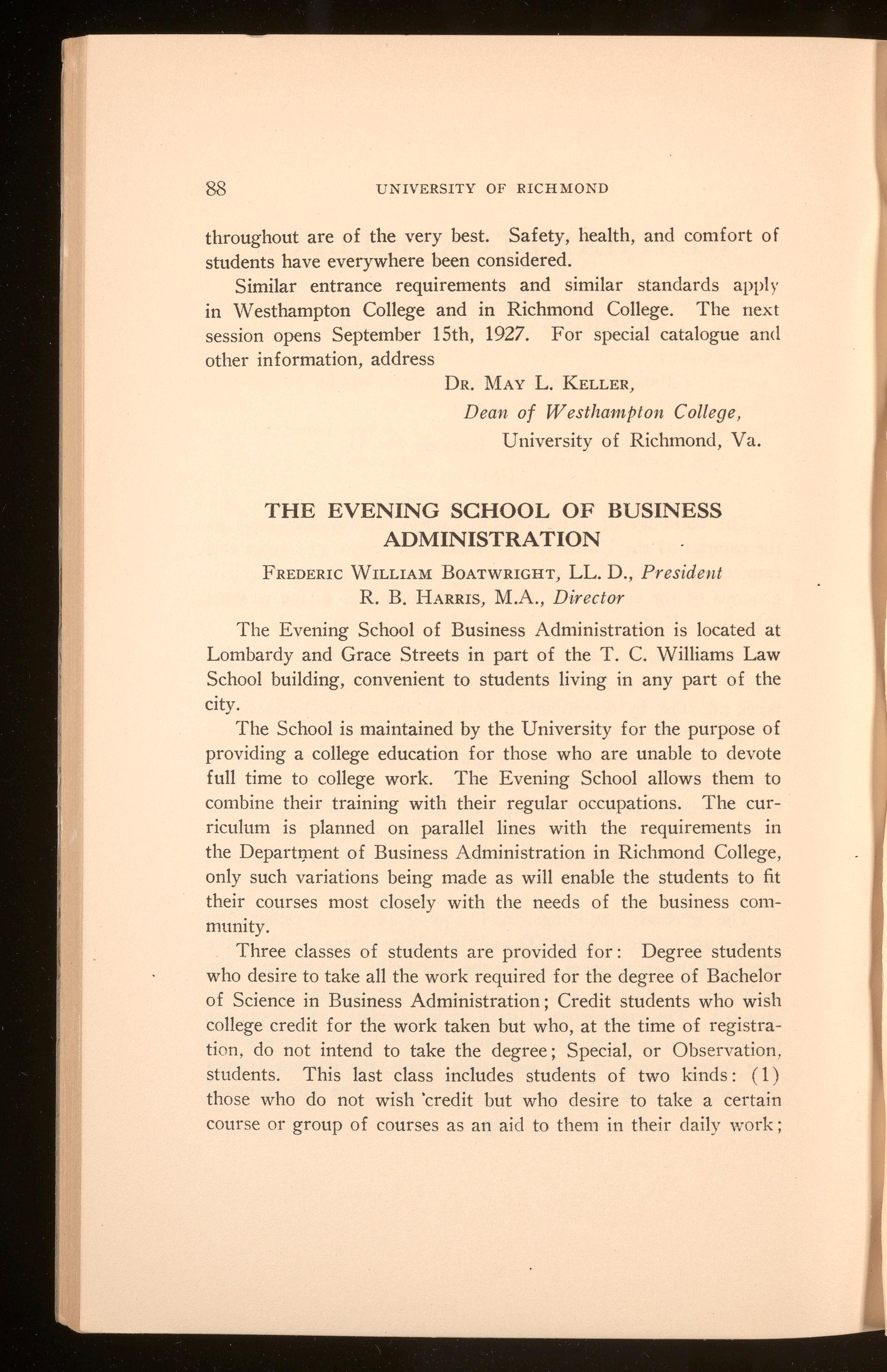
throughout are of the very best. Safety, health, and comfort of students have everywhere been considered. Similar entrance requirements and similar standards apply in Westhampton College and in Richmond College. The next session opens September 15th, 1927. For special catalogue and other information, address
DR. MAY L. KELLER,
Dean of Westhanipton College,
University of Richmond, Va.
FREDERIC WILLIAM BOATWRIGHT, LL. D., President
R. B. HARRIS, M.A., Director
The Evening School of Business Administration is located at Lombardy and Grace Streets in part of the T. C. Williams Law School building, convenient to students living in any part of the city.
The School is maintained by the University for the purpose of providing a college education for those who are unable to devote full time to college work. The Evening School allows them to combine their training with their regular occupations. The curriculum is planned on parallel lines with the requirements in the Departtpent of Business Administration in Richmond College, only such variations being made as will enable the students to fit their courses most closely with the needs of the business community.
Three classes of students are provided for : Degree students who desire to take all the work required for the degree of Bachelor of Science in Business Administration; Credit students who wish college credit for the work taken but who, at the time of registration, do not intend to take the degree; Special, or Observation, students. This last class includes students of two kinds: ( 1) those who do not wish 'credit but who desire to take a certain course or group of courses as an aid to them in their daily work;
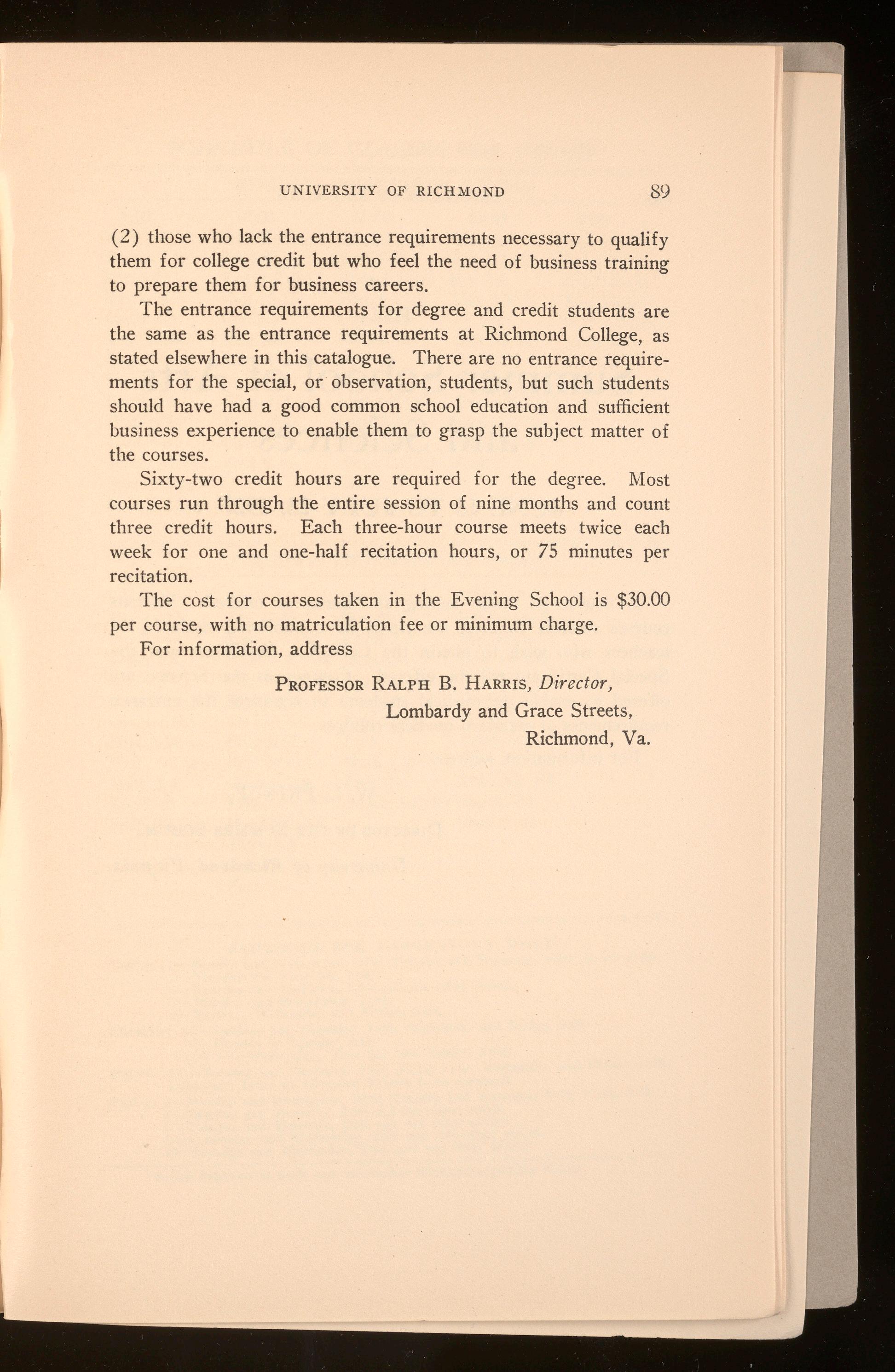
(2) those who lack the entrance requirements necessary to qualify them for college credit but who feel the need of business training to prepare them for business careers.
The entrance requirements for degree and credit students are the same as the entrance requirements at Richmond College, as stated elsewhere in this catalogue. There are no entrance requirements for the special, or observation, students, but such students should have had a good common school education and sufficient business experience to enable them to grasp the subject matter of the courses.
Sixty-two credit hours are required for the degree. Most courses run through the entire session of nine months and count three credit hours. Each three-hour course meets twice each week for one and one-half recitation hours, or 75 minutes per recitation.
The cost for courses taken in the Evening School is $30.00 per course, with no matriculation fee or minimum charge.
For information, address
PROFESSOR RALPH B. HARRIS, Director , Lombardy and Grace Streets, Richmond, Va.
JUNE 13 TO JULY 23, 1927
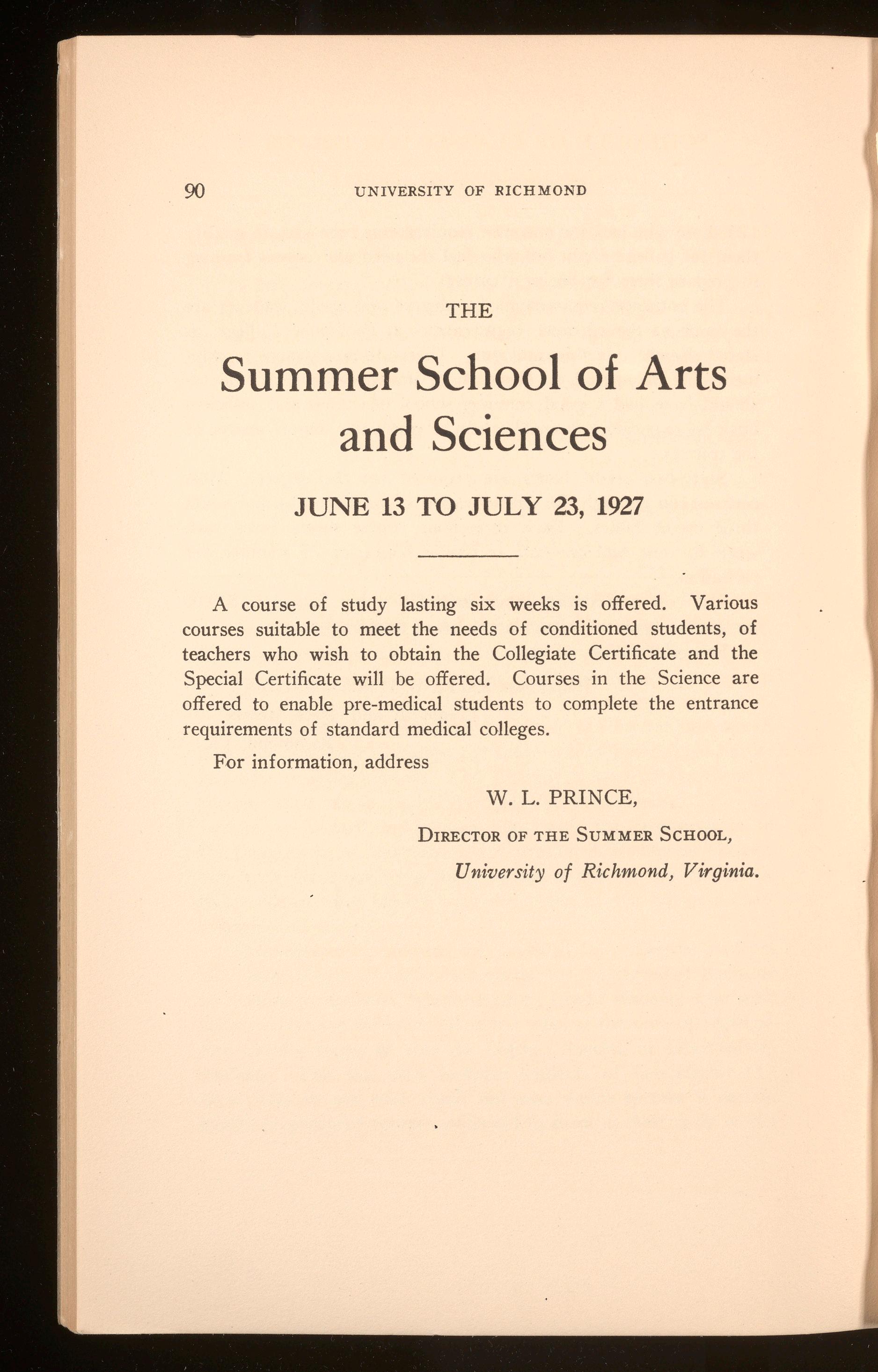
A course of study lasting six weeks is offered. Various courses suitable to meet the needs of conditioned students, of teachers who wish to obtain the Collegiate Certificate and the Special Certificate will be offered. Courses in the Science are offered to enable pre-medical students to complete the entrance requirements of standard medical colleges.
For information, address
W. L. PRINCE, DIRECTOR
OF THE SUMMER SCHOOL, University of Richmond, Virginia.
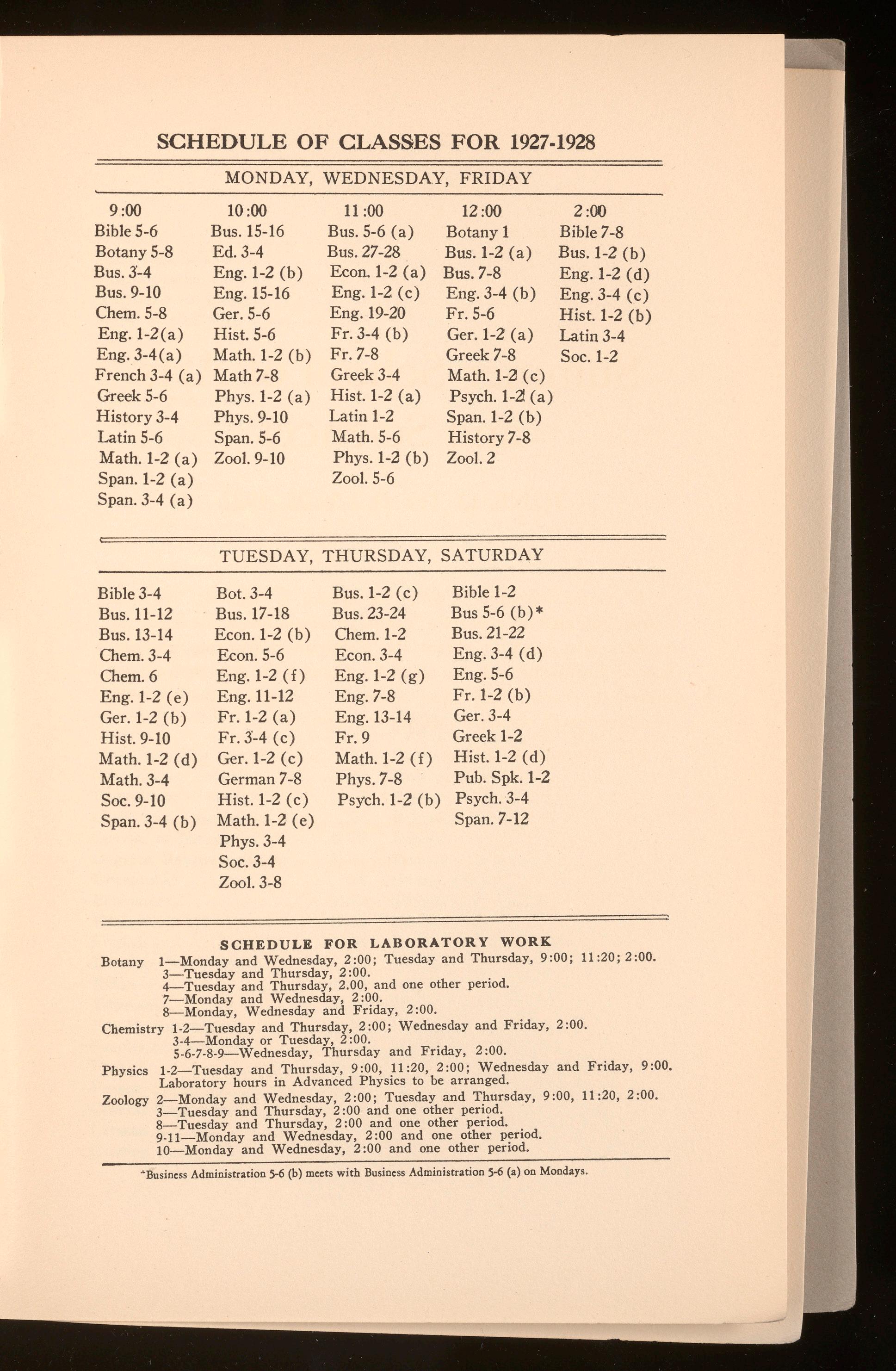
MONDAY, WEDNESDAY, FRIDAY
9:00 10:00 11 :00 12:00 2:00
Bible 5-6 Bus. 15-16 Bus. 5-6 (a) Botany 1 Bible 7-8 Botany 5-8 Ed. 3-4 Bus. 27-28 Bus. 1-2 (a) Bus. 1-2 (b) Bus. 3'-4 Eng. 1-2 (b) Econ. 1-2 (a) Bus. 7-8 Eng. 1-2 (d) Bus. 9-10 Eng. 15-16 Eng. 1-2 (c) Eng. 3-4 (b) Eng. 3-4 (c) Chem. 5-8 Ger. 5-6 Eng. 19-20 Fr. 5-6 Hist. 1-2 (b) Eng. l-2(a) Hist. 5-6 Fr. 3-4 (b) Ger. 1-2 (a) Latin 3-4 Eng. 3-4(a) Math. 1-2 (b) Fr. 7-8 Greek 7-8 Soc. 1-2 French 3-4 (a) Math7-8 Greek 3-4 Math. 1-2 (c) Greek 5-6 Phys. 1-2 (a) Hist. 1-2 (a) Psych. 1-2!(a) History3-4 Phys. 9-10 Latin 1-2 Span. 1-2 (b) Latin 5-6 Span. 5-6 Math. 5-6 History 7-8 Math. 1-2 (a) Zoo!. 9-10 Phys. 1-2 (b) Zool.2 Span. 1-2 (a) Zoo!. 5-6 Span. 3-4 (a)
TUESDAY, THURSDAY, SATURDAY
Bible 3-4 Bot. 3-4 Bus. 1-2 (c) Bible 1-2 Bus. 11-12 Bus. 17-18 Bus. 23-24 Bus 5-6 (b)* Bus. 13-14 Econ. 1-2 (b) Chem.1-2 Bus. 21-22 Chem. 3-4 Econ. 5-6 Econ. 3-4 Eng. 3-4 (d) Chem.6 Eng. 1-2 (£) Eng.1-2 (g) Eng. 5-6 Eng. 1-2 (e) Eng.11-12 Eng. 7-8 Fr. 1-2 (b) Ger. 1-2 (b) Fr. 1-2 (a) Eng. 13-14 Ger. 3-4 Hist. 9-10 Fr.3'-4(c) Fr.9 Greek 1-2 Math. 1-2 (d) Ger. 1-2 (c) Math.1-2 (£) Hist. 1-2 (d) Math. 3-4 German 7-8 Phys. 7-8 Pub. Spk. 1-2 Soc. 9-10 Hist. 1-2 (c) Psych. 1-2 (b)
Psych. 3-4 Span. 3-4 (b) Math. 1-2 (e) Span. 7-12 Phys. 3-4 Soc. 3-4 Zoo!. 3-8
SCHEDULE FOR LABORATORY WORK
Botany 1-Monday and Wednesday, 2:00; Tuesday and Thursday, 9:00; 11 :20; 2:00. 3-Tuesday and Thursday, 2:00.
4-Tuesday and Thursday, 2.00, and one other period.
7-Monday and Wednesday, 2 :00.
8-Monday, Wednesday and Friday, 2:00.
Chemistry 1-2-Tuesday and Thursday, 2:00; Wednesday and Friday, 2:00. 3-4-Monday or Tuesday, 2 :00.
5-6-7-8-9-Wednesday, Thursday and Friday, 2:00. Physics 1-2-Tuesday and Thursday, 9:00, 11 :20, 2:00; Wednesday and Friday, 9:00, Laboratory hours in Advanced Physics to be arranged.
Zoology 2-Monday and Wednesday, 2 :00; Tuesday and Thursday, 9 :00, 11 :20, 2 :00.
3-Tuesday and Thursday, 2 :00 and one other period.
8-Tuesday and Thursday, 2:00 and one other period.
9-11-Monday and Wednesday, 2:00 and one other period.
10-Monday and Wednesday, 2:00 and one other period. ""BusiaessAdministration 5-6 (b) meets with Busiacss Administration 5"'6(a) on Mondays.
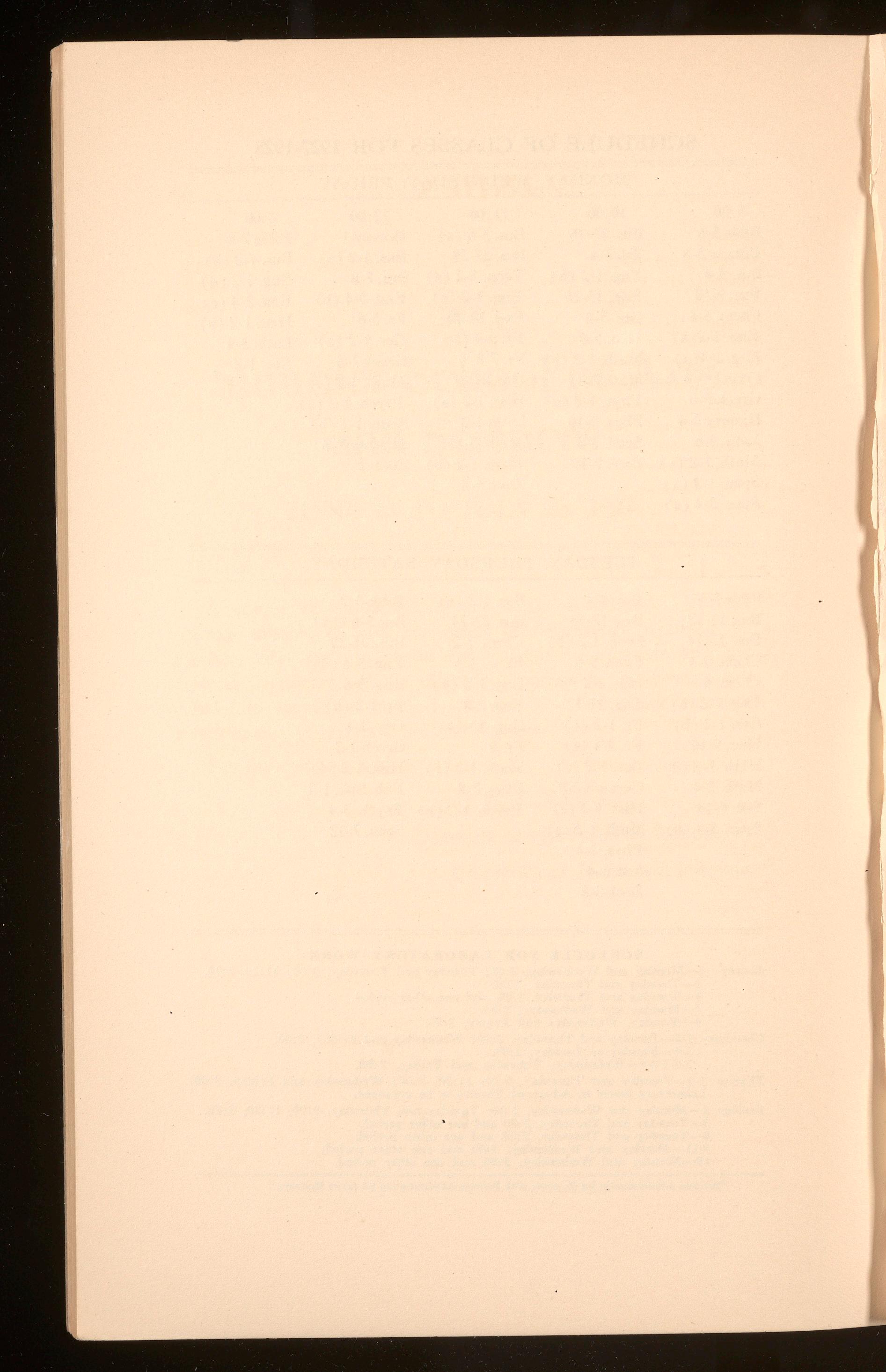
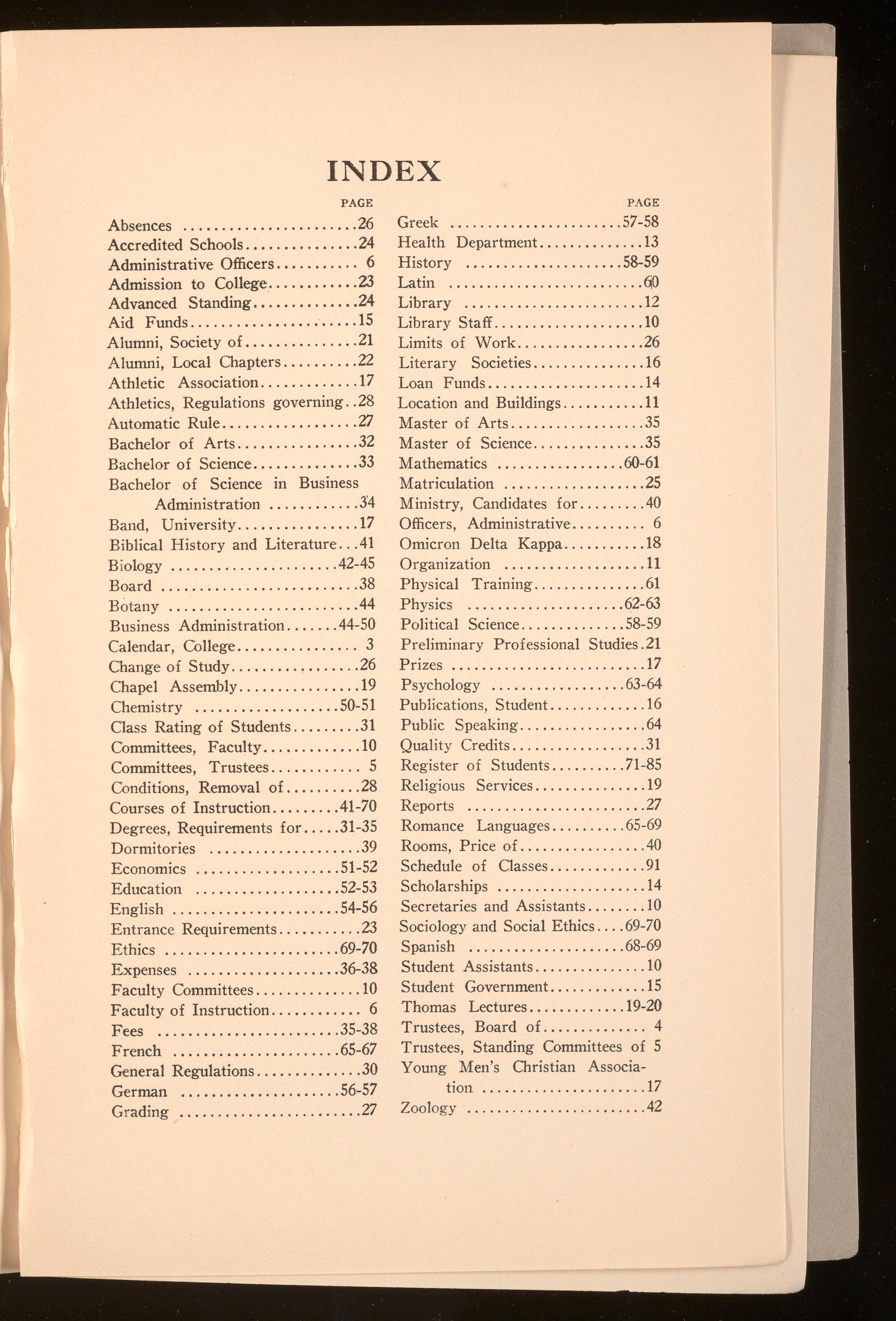
Health Department .............. 13
..................... 58-59 Latin .............. ........... qO Library ........................ 12 Library Staff .................... 10 Limits of Work ................. 26 Literary Societies ............... 16 Loan Funds ..................... 14 Location and Buildings ........... 11 Master of Arts .................. 35 Master of Science ............... 35 Mathematics ................. 60-61 Matriculation .................. . 25 Ministry, Candidates for ......... 40 Officers, Administrative .......... 6 Omicron Delta Kappa ........... 18 Organization ................... 11 Physical Training 61 Physics ..................... 62-63
Political Science .............. 58-59
Preliminary Professional Studies .21 Prizes .......................... 17 Psychology .................. 63-64
Publications, Student ............. 16
Public Speaking ............ 64
Quality Credits .................. 31 Register of Students .......... 71-85
Religious Services ............... 19 Reports ........................ 27
Romance Languages .......... 65-69
Rooms, Price of. ............... .40
Schedule of Oasses ............. 91
Scholarships .................... 14
Secretaries and Assistants ........ 10
Sociology and Social Ethics 69-70
Spanish ..................... 68-69
Student Assistants ............... 10
Student Government. ............ 15
Thomas Lectures ............. 19-20
Trustees, Board of. . . . . . 4
Trustees, Standing Committees of 5
Young Men's Christian Association ...................... 17
Zoology ........................ 42
